Four Men in Their Boots, Day 7
... Keswick ...
By the morning a gale had blown the rain away. But we were left with the wind ... and what a wind it was! We were buffeted about as we walked through the streets of Keswick and could hardly imagine what it would be like on the fell tops. We passed the world famous Cumberland Pencil Museum, struggling hard to resist the attractions of the World’s Longest Pencil, 7.91 metres, to be exact. After the difficulties on Skiddaw, the maps had been left
in my hands, without comment. Across the bridge we took a
footpath through Portinscale and Ullock and on to Braithwaite,
where we found the rather fine looking Coledale Inn. Harry
had done well arranging our accommodation for the nights
and here we seemed to have something a bit special, perhaps
to mark our halfway point.
I looked forward to returning for a good night’s rest,
after our walk around the Coledale horseshoe. We jettisoned
everything we didn’t need, which did not include our wind-proof walking gear, and set off brightly.
After the difficulties on Skiddaw, the maps had been left
in my hands, without comment. Across the bridge we took a
footpath through Portinscale and Ullock and on to Braithwaite,
where we found the rather fine looking Coledale Inn. Harry
had done well arranging our accommodation for the nights
and here we seemed to have something a bit special, perhaps
to mark our halfway point.
I looked forward to returning for a good night’s rest,
after our walk around the Coledale horseshoe. We jettisoned
everything we didn’t need, which did not include our wind-proof walking gear, and set off brightly.
The storm and gale had brought a crystal clarity to the air. Looking back, we could see every detail of Skiddaw, none of which we had seen the day before. However, we didn’t look back much because we were inspired by the view ahead. Our route seemed laid out before us, no distance at all.
... Grisedale Pike ...
As we battled our way up to Grisedale Pike, Harry began waxing lyrical, as all waxing is, about the wonders of the natural world. He seemed on the verge of becoming overcome with emotion. Now I have as much appreciation of the natural world as the next person but it seems unmanly to me to get over-emotional about it. I blame those poets, again. So, in order to restore a proper perspective, I began to focus on the unnatural elements of the scene.I pointed out the miles and miles of the Whinlatter Forest conifer plantations visible off to the right and also the ruins of Force Crag Mine, far below us to the left. This led to a protracted discussion about the origins and purpose of the forest and mine, the conclusion of which was that they must have been involved in the manufacture of the esteemed Cumberland Pencils, the lead or graphite from the mine being enclosed in wood from the forest.
This isn’t true but the others were so satisfied with their explanation that I was content to leave them with it. In fact, although lead was mined from Force Crag Mine in the 1800s the pencil-makers used graphite from Borrowdale. The mine functioned, on and off, until the 1990s. Today, the mine is owned by the National Trust, who are not enamoured of mines in the Lake District and will no doubt ensure that the mine stays off.
... Hopegill Head ...
We walked on past Grisedale Pike to Hopegill Head, keeping well clear of the edge to avoid being blown over Hobcarton Crags. I began to notice the number of people who shouted a “Hi Harry” to Harry. His purple-pink outfit made him easily recognisable but I was surprised that, even with his exceptional affability, he had managed to get on first-name terms with quite so many people during our walk. Some even added “Keep going, Harry, you’ll make it” or “Hope the blisters aren’t too bad, Harry” as though they were fully familiar with the nature of his expedition.Most of what was said was lost in the wind, which whipped the words and much else besides over the mountain edge. “How the wind doth ramm!” floated into my mind, which, I remembered, is part of ‘Winter is Icumen In’:
Winter is icumen in,
Lhude sing Goddamm,
Raineth drop and staineth slop,
And how the wind doth ramm!
Sing: Goddamm.
This is a parody of the 13th century English round ‘Sumer is Icumen In’ by the American poet Ezra Pound. Americans are proud of their liberty, and it is a liberty to mock our ancient songs just because they don’t have any, and to adopt our currency as a surname, too.
I began to sing the song, to the tune of the mice in Bagpuss, confident that nobody would hear me in the gale. Richard, however, noticed my lips moving and thought that I was speaking to him. I explained that I was singing a song appropriate to the conditions and, after persuasion, I sang it aloud to them all.
Given their interest, I tried to get them to join in the round, but they couldn’t get the hang of it at all. They seemed incapable of entering at the correct point, on the “Lhude”, and if I ever did get them all going together they tended to treat it as a race to the “Sing: Goddamm”.
After a while, I suspected that they were failing on purpose but, as they seemed to enjoy the ending so much, we settled on me singing the song and them all joining in loudly on the “Sing: Goddamm”. It was almost as if the Goddamm were directed at me. And so singing, we strode from Hopegill Head down past Eel Crag, the “Goddamm”s alarming a few nervous walkers.
... Grasmoor ...
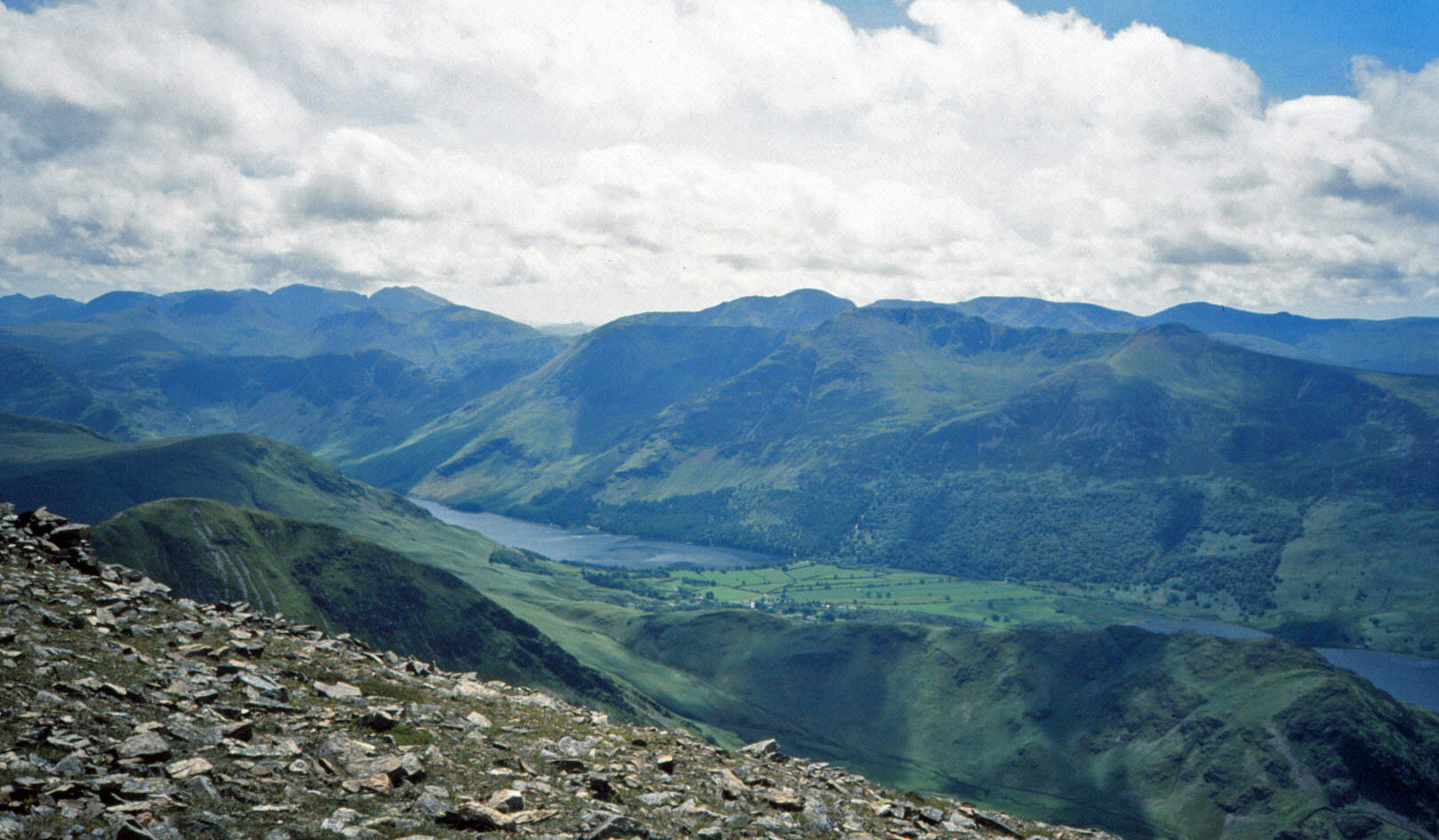 With the team in good spirits, I mentioned the detour that I
had planned to Grasmoor and, with no-one daring to decline,
we struggled up the long grassy slopes against the ferocious
gale. At the top, we stood, braced against the wind, to survey
the scene, with our imminent challenges of Pillar, Scafell and
Bowfell arrayed to the south.
We turned, prepared to be blown back down Grasmoor,
only to find that the backpacks of Tom and Richard were no
longer with us. They had put them down at the summit cairn
and, being much lighter than on previous days, they had been
whisked by the wind over Dove Crags.
With the team in good spirits, I mentioned the detour that I
had planned to Grasmoor and, with no-one daring to decline,
we struggled up the long grassy slopes against the ferocious
gale. At the top, we stood, braced against the wind, to survey
the scene, with our imminent challenges of Pillar, Scafell and
Bowfell arrayed to the south.
We turned, prepared to be blown back down Grasmoor,
only to find that the backpacks of Tom and Richard were no
longer with us. They had put them down at the summit cairn
and, being much lighter than on previous days, they had been
whisked by the wind over Dove Crags.
I condescended to wait while they scrambled down the precipitous cliffs to retrieve them. After all, it was not my fault that they were foolish enough to lose them. Harry, ever the helpful colleague, opted to scramble down with them. I sat day-dreaming at the panorama for quite a while. I forgot all about them but after about forty-five minutes I began to be a little concerned that they hadn’t re-appeared. I tentatively peered over the edge of the crags, fearing being blown over myself, but they were nowhere to be seen.
I became quite worried and began to think about calling out the Mountain Rescue Service, for the three of them were not really equipped for rock-climbing. And then I saw them, far off to the right, on the slopes of Grasmoor, having emerged from the crags much further east than where they went down. I walked fast to catch them up. They blithely explained that they had taken a short-cut on the crags in order to catch me up on Crag Hill. I had distinctly said that I would wait for them at the Grasmoor cairn and I am not used to my instructions being misunderstood. I was quite miffed but the other three seemed in even better spirits than they were as we strolled along the long ridge to and over Causey Pike.
... Braithwaite ...
On our return to the inn, there was an embarrassing incident with the receptionist. There had, it appears, been some misunderstanding as a result of Harry having asked for two doubles. She had thought he was referring to beds rather than rooms, a perhaps reasonable inference in this day and age. I, however, would not countenance the former.After a long wrangle with the manager, it was eventually agreed that I would have a room with a double bed and the other three would share the other room, into which an extra bed would be moved. So that was satisfactorily resolved and, after a fulsome meal, I departed from the others to enjoy the restful night that I had looked forward to all day.
Photos: The Cumberland Pencil Museum; The view as I waited on Grasmoor.
The Tale of Squire Ruskin
Little Johnnie Ruskin was always little when he was little. But he had big ideas. When his parents brought him to the Lakes for a holiday at the age of eleven he didn’t just say thank you: he wrote a poem of over two thousand lines to do so.His father had big ideas for little Johnnie too. More importantly, he also had a lot of money, which he had earned by selling alcohol. He sent little Johnnie to the best universities, although Johnnie didn’t feel the need to do much studying there.
As he grew bigger, little Johnnie didn’t know what to do, he was so good at everything. But his father was rich enough that he didn’t really need to do anything anyway. So he went on a few tours. He met lots of famous people, who all said “Who are you?”. When he got back he resolved to become famous too.
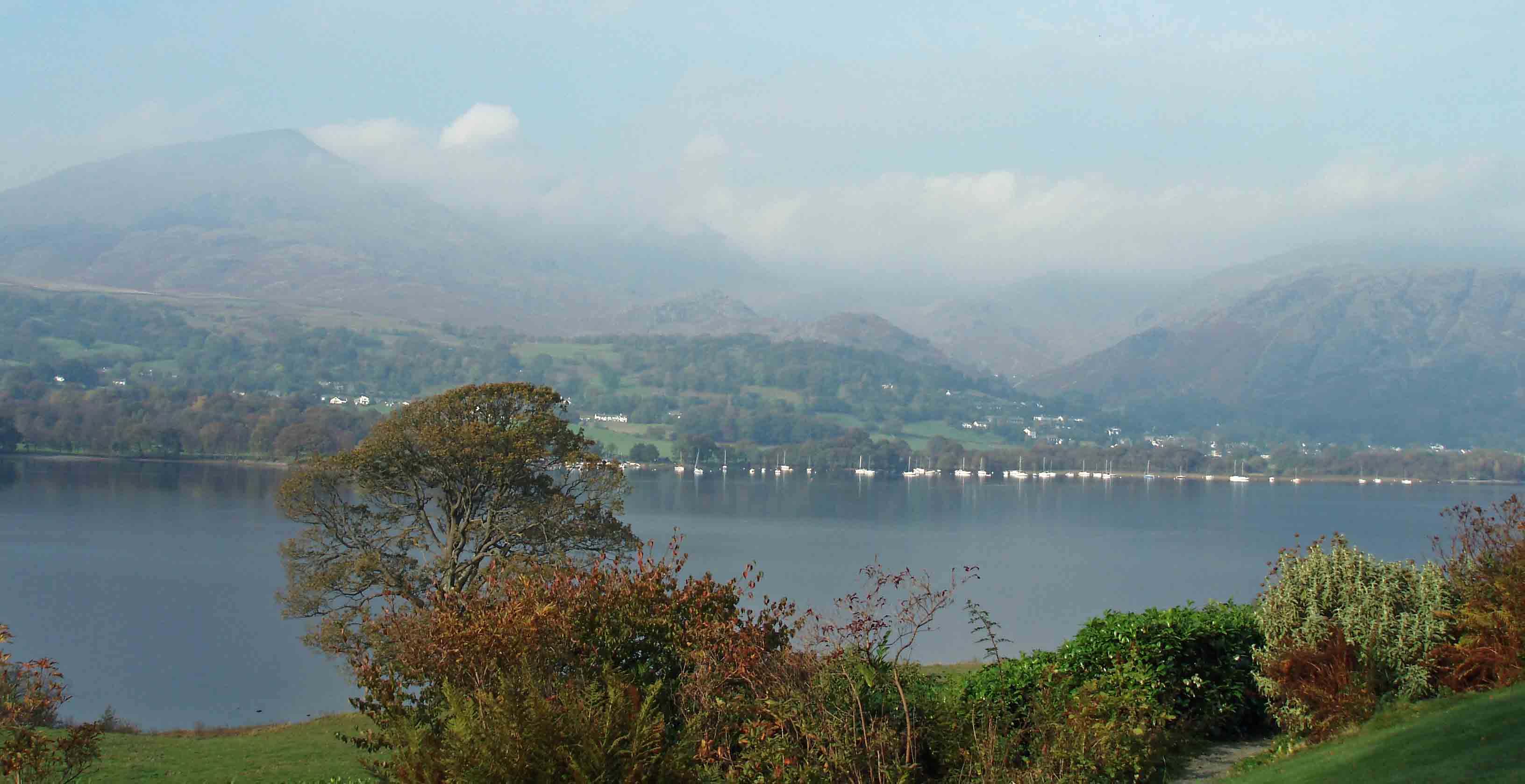
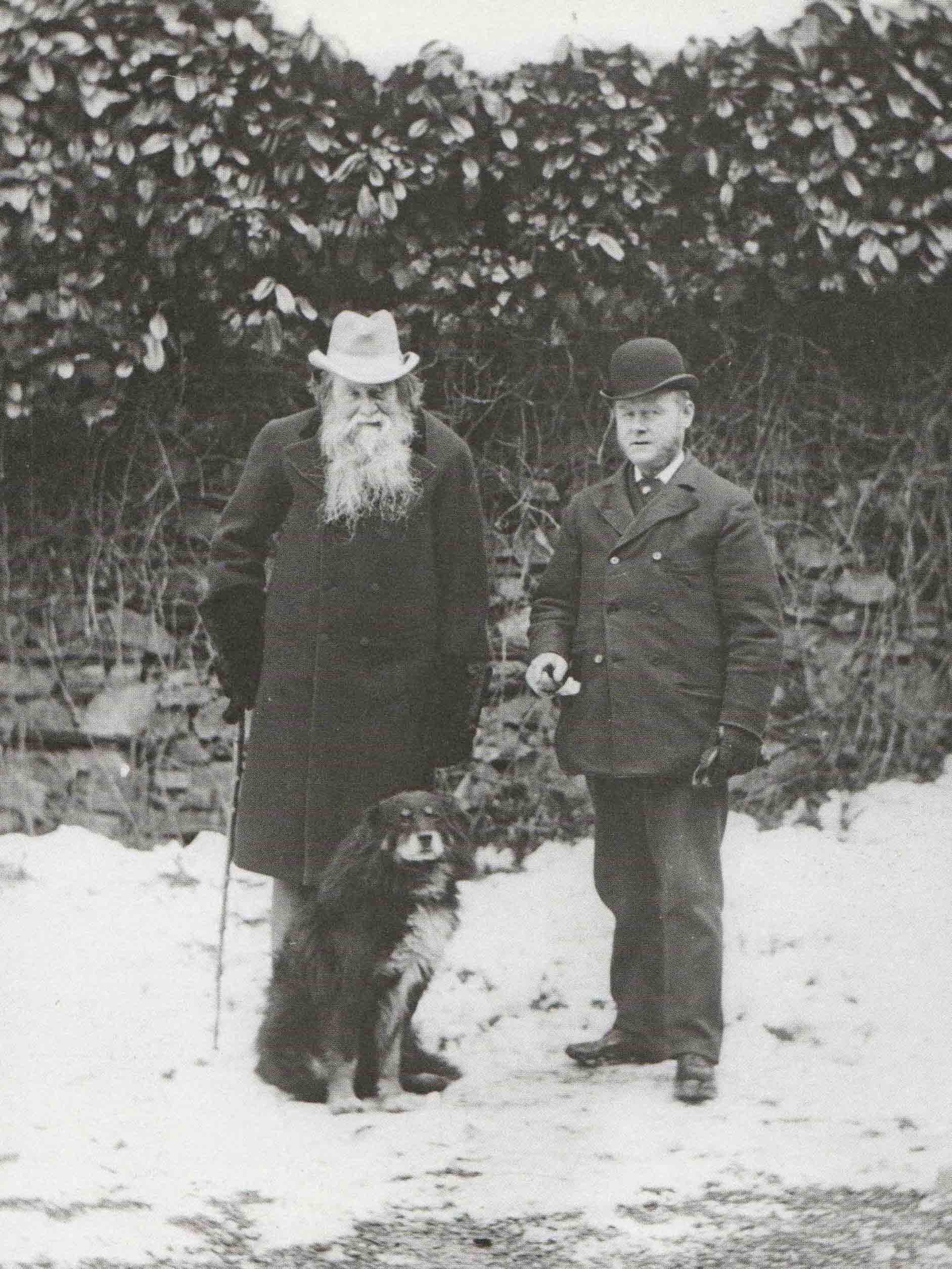
He liked to paint, but his paintings weren’t particularly good. He liked to write, but to begin with he was too shy to put his own name on what he had written. He liked little girls, but they didn’t like him. But most of all he liked to tell other people what to like.
He began by telling people what buildings they should like. And then what paintings they should like. He said that the old masters such as Michelangelo were too old: youngsters like Joe Turner were much better. Joe’s paintings were so vague that ordinary people couldn’t see that they were good.
As he became famous, he married Miss Effie. But they were never close, and they became even less close when she ran off with one of his friends.
This upset him. He began to tell people what paintings they should not like. But some painters didn’t like it when he told people not to like their paintings. Jimmy Whistler, a butterfly artist from over the pond, even took him to court. So he gave up art. Instead, he began to tell people how to live.
This was much more difficult. After all, he hardly knew how to live himself. He liked to spend all day looking at lichens. So he said that they shouldn’t make poor people work in dirty factories: they should be able to look at lichens all day too. Unfortunately, poor people didn’t really want to look at lichens much: they preferred to drink alcohol, like his father sold.
He wrote lots of letters, which he called Fors Clavigera, to the poor people. We, who have studied Greek, know exactly what he meant. But the poor people threw the letters in the bin.
Johnnie became even more fed up. So, to cheer himself up, he bought a nice, big house overlooking a lake. He was a bit lonely but he liked to look out of his windows at a beautiful scene not spoiled by any of those poor people that he tried to help.
People asked who lived in the big house on the hill. They were told “The squire, Ruskin”. Some people wondered what rusking involved.
He made up a word ‘illth’ to mean ill-being, the opposite of well-being, and he began to suffer more and more from it. Eventually he died, as even good people like Squire Ruskin must do. But his ideas, whatever they were, live on. They have influenced many important people, including Leo Tolstoy, Marcel Proust, Mahatma Gandhi, Nelson Mandela and John Prescott.
Photos: The view from Squire Ruskin's house; Squire Ruskin, his valet and his dog.
Hawkshead 3 Windermere 4
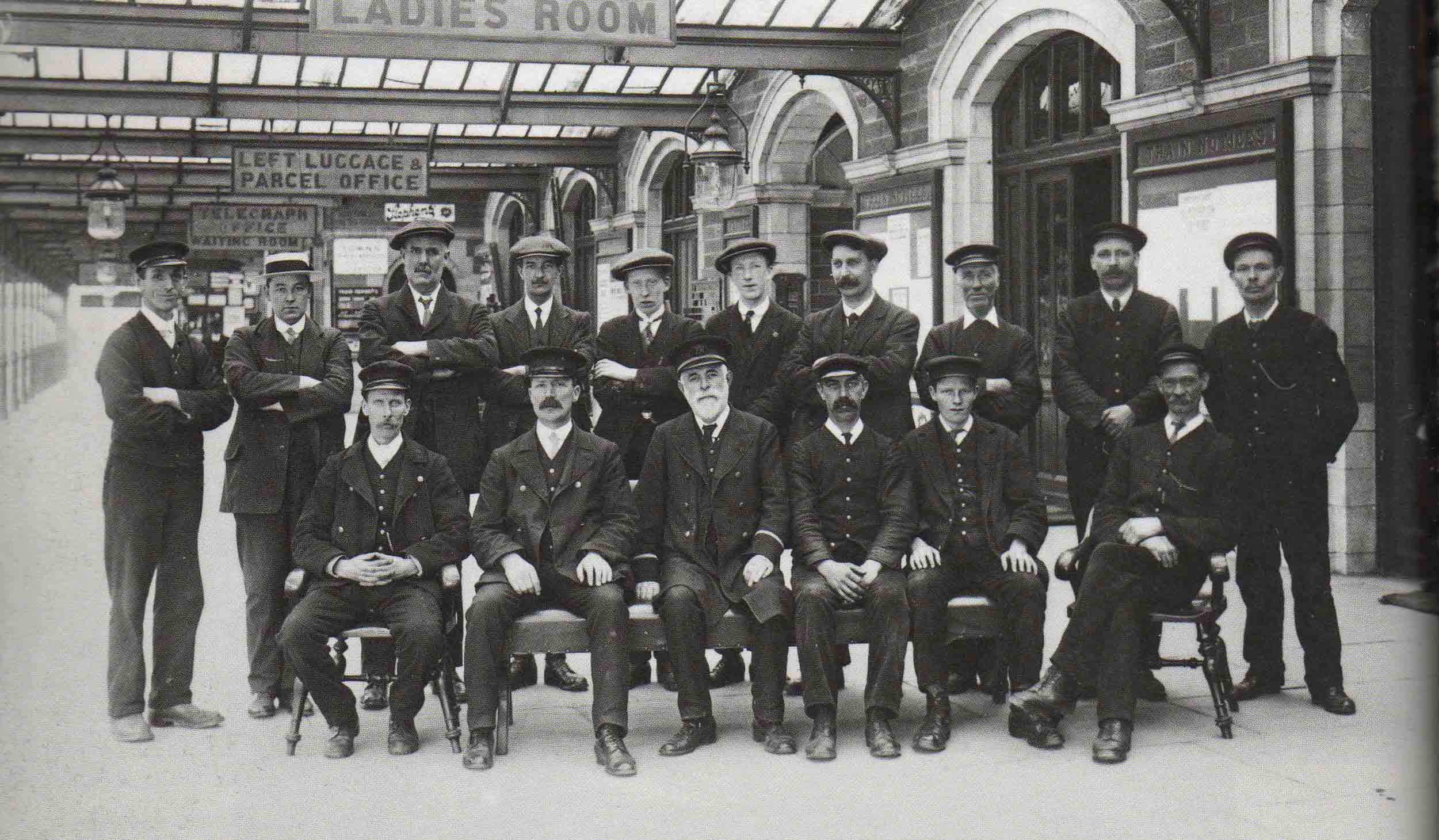 The Hawks were desperately unlucky to lose an action-packed
seven-goal thriller at the rain-soaked Gillie Ground, after the
man in black failed to spot a blatant infringement in the dying
seconds by the Wanderers’ custodian. Three times the brave Hawks
had fought back to parity with the table-toppers, only to succumb
to a late own goal.
The Hawks were desperately unlucky to lose an action-packed
seven-goal thriller at the rain-soaked Gillie Ground, after the
man in black failed to spot a blatant infringement in the dying
seconds by the Wanderers’ custodian. Three times the brave Hawks
had fought back to parity with the table-toppers, only to succumb
to a late own goal.
Manager Harry Hopkins said “I’m proud of all the lads. I couldn’t ask for any more. They worked their socks off. We’ll take the positives and move on to the next match”.
The game kicked off with the rain and wind blasting down Langdale ...
Sorry to interrupt your flow, but doesn’t this belong on the sports pages?
What of it? I’ve infiltrated all the other sections of this paper before. I’ve written reports on weddings, funerals, concerts and fights outside the Harassed Herdwick; I’ve contributed recipes, horoscopes, letters to the editor, advertisements and weather reports. Our readers, deficient in gorm, cannot tell the difference. Or perhaps they find that my efforts provide more entertainment for their fifty pence than the real thing.
Yes, but we don’t want to waste your unique talents on football reports. Anybody can write that stuff.
This is not a football report. I am making an attempt on the world record for clichés, currently held by Barry Bollinger of the Daily Mirror, who recorded 27.3 clichés per 100 words on the Germany 1 England 5 game. I have a theory that clichés are better for more mundane games, and you can’t get more mundane than Hawkshead versus Windermere.
I see. Let us pray proceed.
A bright opening from the Hawks forced the promotion favourites onto the back foot, before a breakaway goal on the half-hour silenced the Hawks’ faithful supporters. The Hawks responded immediately when Nobby Drummond nodded home unmarked, with the Wanderers defence appealing vainly for off-side ...
Photo: Hawkshead Athletic football team.
Pen Your Pimp: Another Book for Offcomers
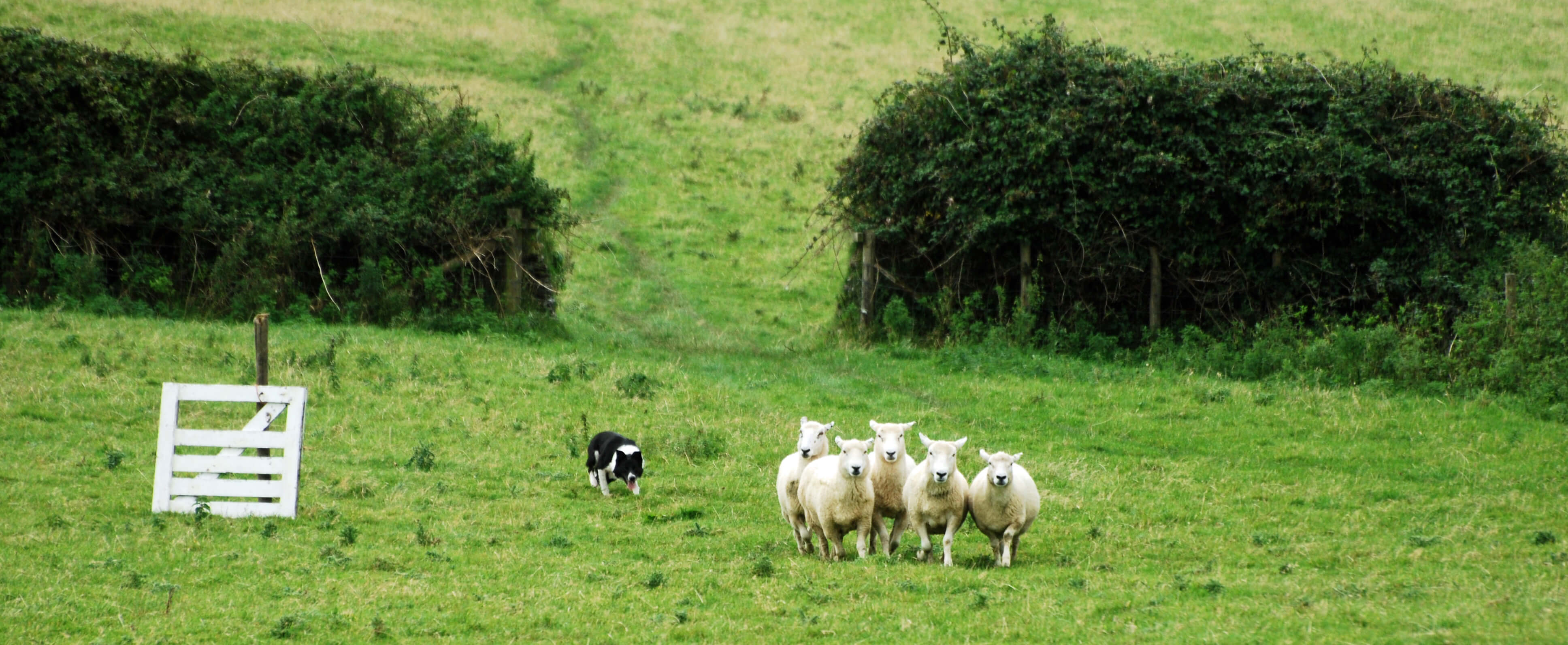 Pen Your Pimp, by Tom Bumfit (Strudelgate Press, £14.99), 235 pages
with 15 intricate pen-and-ink drawings. There is also a Pen Your
Pimp DVD (£14.99), showing all the manoeuvres in detail, with
commentary by Tom Bumfit.
Pen Your Pimp, by Tom Bumfit (Strudelgate Press, £14.99), 235 pages
with 15 intricate pen-and-ink drawings. There is also a Pen Your
Pimp DVD (£14.99), showing all the manoeuvres in detail, with
commentary by Tom Bumfit.
Offcomers may be excessively excited by this title. In the Cumbrian dialect, pimp is five (in the Keswick version: yan, tyan, tethera, methera, pimp, ... ) when shepherds count their sheep. And five sheep is the usual number penned in Cumbrian sheep-dog trials. So, Pen Your Pimp is a description of the traditional Cumbrian sport of sheep-dog trialling. This book presents all the rules and techniques of trialling but the majority of readers will enjoy most the anecdotes through which Tom Bumfit enlivens the text.
There was, for example, the controversial occasion when several sheep-dogs were disqualified from the National Championships for being colour-prejudiced. They had been trained only with white sheep. If, in the competition, the dogs were presented with five sheep one of whom happened to be black then they were flummoxed. They sometimes penned only the four white sheep and left the black sheep out. The judges realised that this would not look good on One Man and His Dog and promptly banned the dogs. The dog owners duly objected, arguing that there was nothing in the rules to stop them insisting on only white sheep. The judges banned them too for being colour-prejudiced.
In another chapter, Bumfit explains whistling techniques via the story of the ventriloquial whistler who disrupted many trials in the 1970s. Several sheep-dogs, not to mention their handlers, became permanently depressed as a result of the antics of the ventriloquial whistler. He was only identified in 1978 after a detailed statistical analysis of the results of the previous decade. It was realised that the culprit could not ventriloquially whistle his own dog and that he would probably resort to this practice only after an unsuccessful run of his own. He was hounded out of Cumbria.
The Duke of Westminster’s A to Z
 When the dear 6th Duke of Westminster sadly departed from us he left his estate
and title to Hugh, the 7th Duke of Westminster. As the latter was a mere stripling of 25 the 6th Duke also left
an A to Z of advice on how to cope with unwanted and unwarranted celebrity and wealth. Here it is:
When the dear 6th Duke of Westminster sadly departed from us he left his estate
and title to Hugh, the 7th Duke of Westminster. As the latter was a mere stripling of 25 the 6th Duke also left
an A to Z of advice on how to cope with unwanted and unwarranted celebrity and wealth. Here it is:
A is for Aunt Miriam, whom you have never met because she has been incarcerated in the east wing since she set fire to Harold Macmillan’s trousers after he rejected her advances in the summer of 1962. Poor Harold never recovered from this incident. He was still rather off-kilter when in the notorious ‘Night of the Long Knives’ he decapitated seven members of Cabinet.
B is for boots. It is jolly muddy around our little country house at Abbeystead. Since you have infinite wealth buy the best boots there are. I recommend Le Chameau’s Jameson Unisex Standard at £385. You buy one and get one free. Jolly generous. I’ve said ‘unisex’ because I’m not sure of your inclinations in that direction. We never did have that chat. Sorry.
C is for charities. You will need to be patron of a few hundred of them, to show your commitment to society, whatever that is. I used to enjoy the board meetings of the Society for the Preservation of English Real Men, which aims to stick up for men in our increasingly female-dominated world. The japes we got up to! But it may not be your kind of thing?
D is for Daniel Snow, who is one of your brothers-in-law. He’s in television, which is something ordinary people look at. If he turns up with cameras and what-not turf him out. People have no business looking at what we do here.
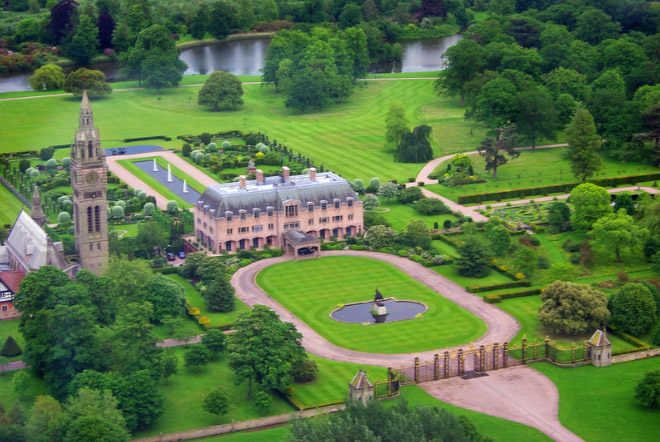 E is for Eaton Hall, our home in Cheshire.
It is jolly big. You'll need to get more familiar with it than I managed.
Staff hide away. One girl had a five months holiday there. I
eventually found her wandering in the old stables, where she said that she had become lost and was
living on a diet of mice and hay.
Unfortunately, the wretch was unable to resume her duties, which involved the daily combing of the Duchess’s wigs.
E is for Eaton Hall, our home in Cheshire.
It is jolly big. You'll need to get more familiar with it than I managed.
Staff hide away. One girl had a five months holiday there. I
eventually found her wandering in the old stables, where she said that she had become lost and was
living on a diet of mice and hay.
Unfortunately, the wretch was unable to resume her duties, which involved the daily combing of the Duchess’s wigs.
F is for fishing, an activity for the real English gentlemen. Your great-great-grandfather Arthur – known to all as Bendor or ‘bend or’ or azure, a reference to the family armorials lost in the famous case of Scrope v Grosvenor heard before the Court of Chivalry in 1389 – was a jolly good fisherman. They say that in his old age, as he spent more and more time standing in the river, he took on the characteristics of his beloved fish. But not sufficiently so, for he drowned whilst grappling with a large trout. Even so, after his partial cremation he was considered to be delicious.
G is for George, of whom you are the godfather. I need hardly say that it is your duty to inculcate in him the habits of the English gentleman (his parents will be much too busy explaining the complexities of royal life). In particular, the sooner he is given a gun to shoot grouse the better. If he should inadvertently dispose of some of the lesser members of the royal family then I am sure that his parents wouldn’t mind.
H is for Horse and Hound, my complimentary subscription to which should pass on to you. It has been in the family since the magazine began in 1884. It is nearly all about horses nowadays, with little about hounds – although there are jolly interesting pieces about fox-hunting from time to time. Essential reading. My dear wife is a close friend of the editor, Lady Levershoome. They were at Eton together. The teachers never noticed them but the boys did.
I is for inheritance, which is all yours. If your elder sisters should come knocking asking for fair shares then tell them that fairness has nothing to do with it. That equality nonsense does not apply to dukedoms, and it never will as long as esteemed eminences such as our dear friends Jacob Rees-Mogg and Lord Dallyrymple have a say in the matter.
J is for je ne sais quoi. We superior men have that indefinable quality that raises us above lesser men. As with a balloon, it is better not to try to pin it down.
K is for knickerbockers. I leave you four wardrobes full of knickerbockers. They were my favourite garments for the lower limbs until they unaccountably fell out of fashion, the garments, that is, not my limbs. I tried to make knickerbocker glories with them but with only modest success. If you cannot find a use for them take them along to the next golf club jumble sale.
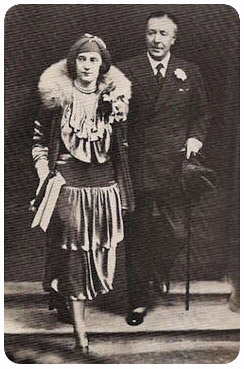 L is for Loelia Ponsonby, the most exotic leaf on the family tree. She was the
third wife of the second Duke, but the marriage, despite getting off to a flying start with Winston Churchill
as best man, was described as “a definition of unadulterated hell” by James Lees-Milne (whoever he was). After
her divorce, Loelia became a needlewoman and magazine editor. She sewed every copy herself.
She is known for saying “Anybody seen in a bus over the age of 30
has been a failure in life” – but what the age of the bus has to do with it, I don’t know.
L is for Loelia Ponsonby, the most exotic leaf on the family tree. She was the
third wife of the second Duke, but the marriage, despite getting off to a flying start with Winston Churchill
as best man, was described as “a definition of unadulterated hell” by James Lees-Milne (whoever he was). After
her divorce, Loelia became a needlewoman and magazine editor. She sewed every copy herself.
She is known for saying “Anybody seen in a bus over the age of 30
has been a failure in life” – but what the age of the bus has to do with it, I don’t know.
M is for marriage, which I am sorry to say you must contemplate if only to perpetuate the dukedom in the traditional manner. The only advice I can give is to avoid anyone called Loelia, if such a person exists.
N is for nodding acquaintance, on which you must be with all you see about the estate. A nod is enough. It shows that you have acknowledged their existence, which is all they need to lighten their dreary lives. On no account address anyone by name. It is impossible to remember them all and mistakes can cause untold misery. I was once mangling with a young maid in the laundry and at a sensitive moment moaned “Oh, Joan”, causing Jean to storm off leaving my underwear unmangled.
O is for Ouija board. You will find mine in the twelfth bedroom. It has been a great comfort to me, to be able in times of stress to seek advice from my forebears. If you ever think I can help please get in touch.
P is for parsimony. Look after the pennies and the billions will look after themselves, my granny used to say. Ordinary people know that we are jolly rich but they don’t like us to flaunt it. It is better not to offer to pay for anything if you are ever in the unlikely situation that a payment is required. Ordinary people are, I find, extraordinarily grateful for the opportunity to show that they are momentarily on a par with us.
Q is for queue. This is probably something that you will never encounter yourself but you may be puzzled by the behaviour of ordinary people. It seems that when they want something that is not immediately available they stand behind someone who has already wanted it. Very strange! Once, when I lost my valet at Covent Garden, I had to stand in a queue for the lavatory. The unaccustomed delay led to an unfortunate accident. On balance, though, sitting in the foyer in wet knickerbockers was preferable to sitting through the third act of Gotterdammerung.
R is for rattlesnake. I trust that you will look after my pet rattlesnake. I found it great company on those dreadful occasions when we were visited by people from something called Natural England. They go on and on about things we’re not supposed to kill on the estate. What do they think an estate is for? However, they were always charmed by the rattlesnake. Once it escaped during luncheon and the Minister for the Environment nearly stuck her fork in it, which would have been the end of her, and no bad thing too.
S is for shooting stick. I have been given many of these but I haven’t managed to shoot anything with any of them.
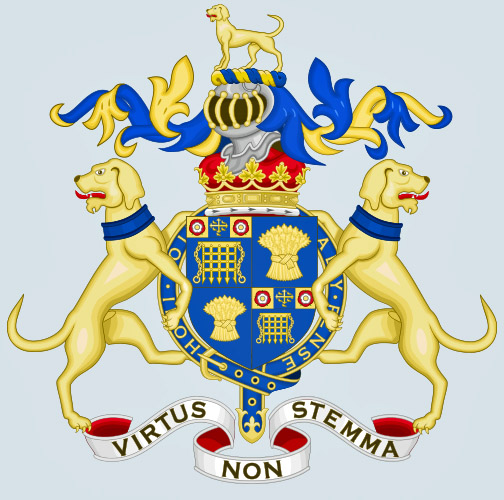 T is for tweed, essential wear for all occasions, even, or especially, in bed.
My father, who was one of identical twins, was known as Tweedledee because he was not dum, unlike his twin sister.
T is for tweed, essential wear for all occasions, even, or especially, in bed.
My father, who was one of identical twins, was known as Tweedledee because he was not dum, unlike his twin sister.
U is for upper crust. Someone who was ushered off the moor at gun-point shouted at me that I was a member of the ‘upper crust’. I asked our chief cook what on earth that meant. He said that it’s better than being a member of the lower crust or even the side crust. Since then I have never dared to eat the crust of any loaf.
V is for virtus non stemma, the family motto. As you know, it means ‘virtue not pedigree’. Whichever of our ancestors devised this motto may have had a great sense of irony but it is best to assume that he just got his Latin back to front.
W is for Westminster, where we have a palace and 650 specially appointed people to work on our behalf. However, some of these are distressingly independent-minded. The like-minded ones, however, are always jolly good company for a chin-wag and a touch of venison.
X is for xenodochium. This is the room in the servants’ quarters at Abbeystead where we quarantine any strangers found wandering on the estate. They keep saying they have a right to roam, whatever that is. The ones with binoculars are particularly shifty. Our head groundsman returns them to Preston Lost Property Office on the first Monday of the month.
Y is for yesterday, my favourite day.
Z is for sleep, of which we deserve plenty. The third Duke was a great sleeper. He usually needed eight hours sleep a day, and nine hours a night. He fell asleep on the eve of the war in 1914. He awoke eight days later, a couple of hours before his funeral. The Duchess thought of the many great and good people who had travelled far for the occasion despite the sombre national mood and decided not to disappoint them because of a technicality.
Four Men in Their Boots, Day 8
... Braithwaite ...
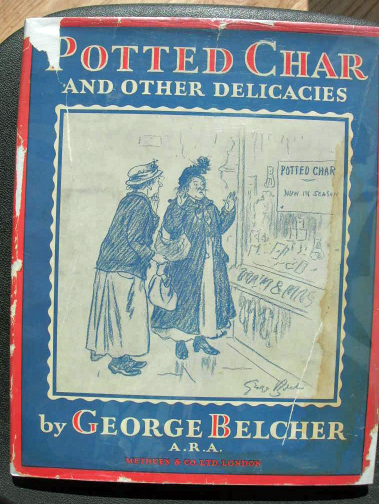 I came down to breakfast in my normal timely fashion
and waited for the others. They arrived half an hour late,
dishevelled and argumentative. I dared not ask if they’d had a
good night.
Tom glared at the breakfast menu and immediately
confronted the waiter.
I came down to breakfast in my normal timely fashion
and waited for the others. They arrived half an hour late,
dishevelled and argumentative. I dared not ask if they’d had a
good night.
Tom glared at the breakfast menu and immediately
confronted the waiter.
“Is the potted char available today?”
“Yes, indeed, and delicious it is.”
“Is it local char?”
“Oh, yes, everything on the menu is local if it is possible to be so.”
“How local?”
“How do you mean, sir?”
“Well, I assume the char comes from some lake. Do you know which one?”
“Er, no. I don’t think so. Does it matter?”
“It matters to me.”
“Well, in that case I think I’d better get the manager. Please excuse me.”
I interrupted before he dashed off. “Before you go, could I say what I would like. We’re a little behind schedule. I’d like the potted char, followed by the full English, with black pudding and mushrooms, with coffee, black.”
“And the same for me” said Richard. “And me” added Harry.
After five minutes, the manager came to our table. “How may I help you?” he beamed.
“Well, I’m interested in your potted char” said Tom. “I’d like to know where it comes from.”
“It comes from Jim Sproke’s Furness Fish Supplies. And Jim supplies only the best fish. You may rest assured of that.”
“No, no. Which lake does the char come from?”
“Oh, I see. I’m afraid I don’t know. Does it matter?”
“It matters to me.”
“Well, in that case I’d better ring Jim Sproke. Please excuse me.”
The three of us polished off our potted char. “Delicious” we agreed.
After ten minutes, the manager returned. “Jim says that the char comes from Windermere. I trust that is satisfactory, sir.”
“It may be satisfactory for Jim, and for you, and for these three. But what about the char?”
“What about them?”
“Aren’t you aware that the char were trapped in Windermere at the end of the last Ice Age and it is one of England’s rarest fish? And it is becoming rarer still through being caught and fed to ignorant buffoons like these three.” We tucked into our black pudding.
“No, I wasn’t aware of that” said the manager.
“Well, you should be. It should be an offence to serve endangered species as food. I suggest that you return the char to Windermere, where they belong.”
“But they’re dead, sir. In pots.”
“Well, return them to Jim and tell him where to stick them. It’s a disgrace.” And he stormed off without having any breakfast, especially not the potted char.
I think the strenuous exercise was beginning to affect the emotions. Tantrums from Richard on Blencathra, sentimentality from Harry on Grisedale Pike, and now this. At least I remained in full command.
Half-an-hour later we gathered on the steps of the inn, with fully-loaded rucksacks. I thought it best to try to clear the air. “What was that all about, Tom” I said.
“Thomas to you” he said.
“OK. Thomas. What’s the problem?”
“Well, I’m as fond of good food as anyone, but we should all be aware of what we are eating. Char should not be eaten. And if you knew what was in that black pudding you wouldn’t eat that either.”
I preferred not to know, so we set off, at last, from Braithwaite.
... High Spy ...
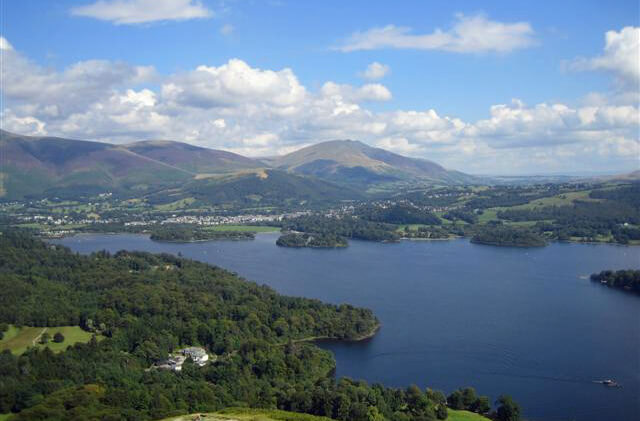 We made our way across Newlands Beck and soon reached
the slopes of Catbells. We paused briefly at the top so that
we could admire the view over Derwent Water whilst Harry
chatted to all the grandmothers and infants that Wainwright
promised.
We hadn’t time to dally so I hurried the team on down
to Hause Gate and up to Maiden Moor, the top of which we
passed over without being quite sure where it was. It didn’t
matter, as we pressed on to High Spy, where I permitted a
refreshment break.
I sat there admiring the view of peaks we’d already
conquered such as Helvellyn, Skiddaw and Grasmoor, and,
ahead, the dome of Great Gable, with Scafell and Scafell Pike
to its left. The highest peaks of our expedition were well and
truly in my sights now.
We made our way across Newlands Beck and soon reached
the slopes of Catbells. We paused briefly at the top so that
we could admire the view over Derwent Water whilst Harry
chatted to all the grandmothers and infants that Wainwright
promised.
We hadn’t time to dally so I hurried the team on down
to Hause Gate and up to Maiden Moor, the top of which we
passed over without being quite sure where it was. It didn’t
matter, as we pressed on to High Spy, where I permitted a
refreshment break.
I sat there admiring the view of peaks we’d already
conquered such as Helvellyn, Skiddaw and Grasmoor, and,
ahead, the dome of Great Gable, with Scafell and Scafell Pike
to its left. The highest peaks of our expedition were well and
truly in my sights now.
My companions, inspired by the name of High Spy, began - would you believe it? - a game of I Spy. The childishness of grown men never ceases to amaze me. Here we were, perched on one of the finest viewpoints of the central fells, and all they were interested in was I Spy. I ignored them. But after Harry had stumped them for 10 minutes with ‘L’ I thought it was time to move on. L, it transpired, was for Helvellyn. I suspect Harry really thought it was.
As we set off, I said “I’ve got one for you .. I spy with my little eye something beginning with A”. I knew that would distract them while we dropped down to the tarn and then clambered up the steep slopes to the top of Dale Head. As we strode along Hindscarth Edge, I thought I’d put them out of their misery. “Give up?” I said. “OK, A is for Aystacks”.
They groaned, in not too friendly a fashion, I felt. Then after a few minutes deep thought Richard said “I don’t believe you could spy Haystacks back there on High Spy”.
“Would you like us to go back and check?” I said.
Of course, he didn’t. You can’t, in fact, see Haystacks from High Spy but I knew that they wouldn’t think of Haystacks anyway. They reacted as though I had violated the spirit of the game. How childish can you get?
... Buttermere ...
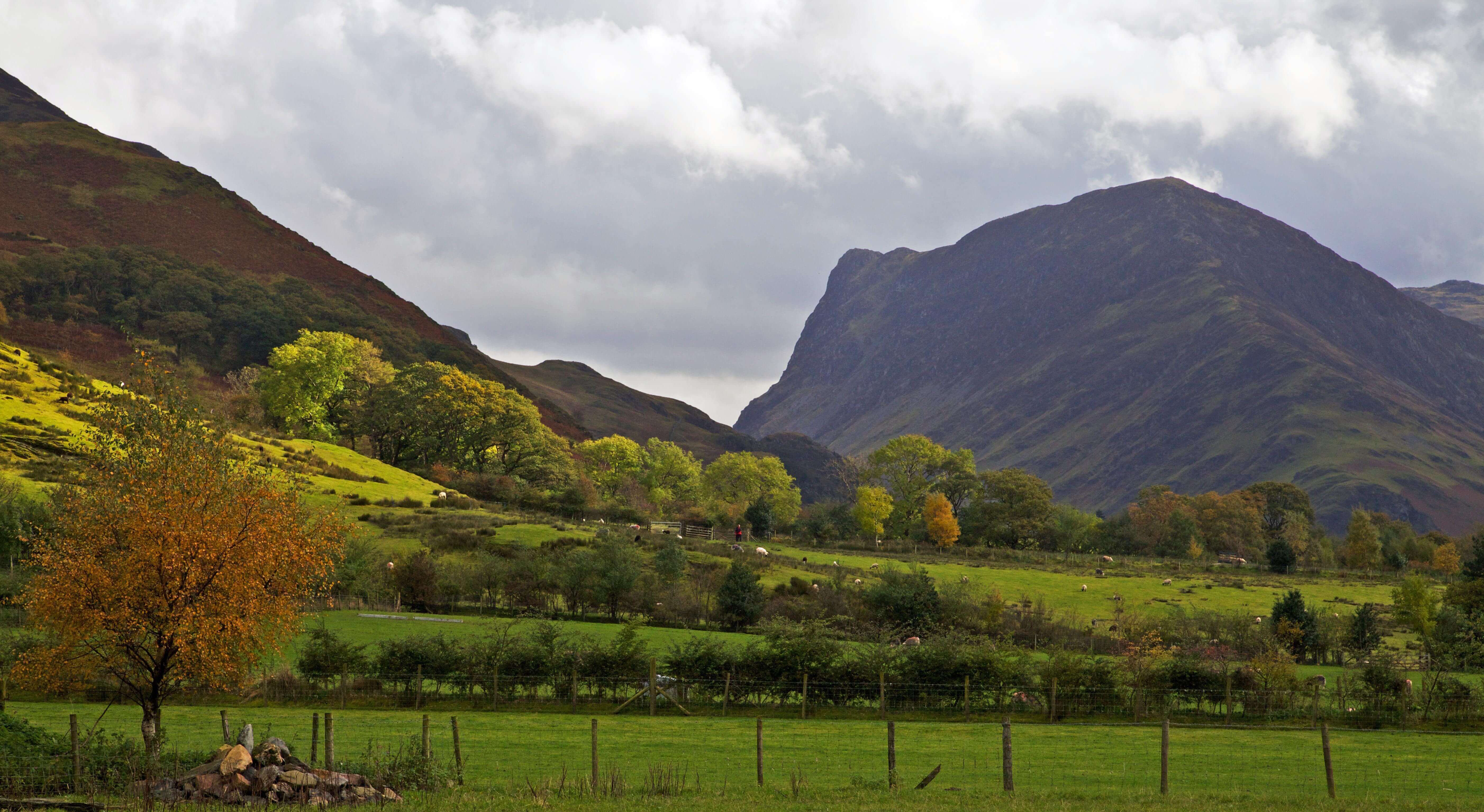 Despite an air of mutiny, we detoured slightly to the peaks of
Hindscarth and Robinson. One has a duty, I feel, to visit all the
tops that one passes near by, although my companions didn’t
seem to agree.
They said that they preferred to walk in a direct line. So
I marched them all straight through the bog of Buttermere
Moss, on the slope from Robinson to our hotel in Buttermere.
They complained bitterly as our boots filled with mud but it
didn’t concern me in the slightest.
Because I anticipated that a large parcel awaited me at
the Fish Hotel.
Despite an air of mutiny, we detoured slightly to the peaks of
Hindscarth and Robinson. One has a duty, I feel, to visit all the
tops that one passes near by, although my companions didn’t
seem to agree.
They said that they preferred to walk in a direct line. So
I marched them all straight through the bog of Buttermere
Moss, on the slope from Robinson to our hotel in Buttermere.
They complained bitterly as our boots filled with mud but it
didn’t concern me in the slightest.
Because I anticipated that a large parcel awaited me at
the Fish Hotel.
If, like me, you avidly study the descriptions of great expeditions to, say, the North Pole or into the jungles of Africa, you will know that there is one thing that is left undiscussed. That is clothing. It goes without saying that the great explorers travelled for months on end without a change of clothes.
Harry, as was becoming increasingly clear, was following the same policy. Richard, on the other hand, thoroughly washed his one set of clothes every night. Some mornings they were still wet as we set off, which may explain his grumpiness. Thomas had brought sufficient clothes that he could change them regularly, but that meant that he was carrying twice the load of the rest of us.
With my superior insight into such matters, I realised that, unlike the Arctic or the African jungles, the Lake District is not isolated from our wonderful Post Office. So, beforehand, I had parcelled to myself at the Fish Hotel a complete change of clothes for the rest of our walk. I spent a pleasant evening parcelling up my dirty clothes to send home whilst the others scrubbed the mud of Buttermere Moss off theirs.
Photos: Potted Char and Other Delicacies; Derwent Water from the slopes of Catbells; The view from my window at the Fish Hotel.
A Word’s Worth
Major Dalbeigh-Smythe: I don’t mind if I do. Thank you, Ernest.Ernest Ackland (Privy Councillor, Master of the Toilet Rolls): Jack, my good man, top us up if you would be so kind.
Major Dalbeigh-Smythe: Now, Ernest, do you know that railway over Ravenglass way?
Ernest Ackland: Yes, I believe so. I took my grandson there last summer.
Major Dalbeigh-Smythe: Do you remember the name?
Ernest Ackland: Joseph, Joshua, something like that.
Major Dalbeigh-Smythe: No, not the lad. The train.
Ernest Ackland: Oh. Ah. Something a bit rum. Real Tatty. Something like that.
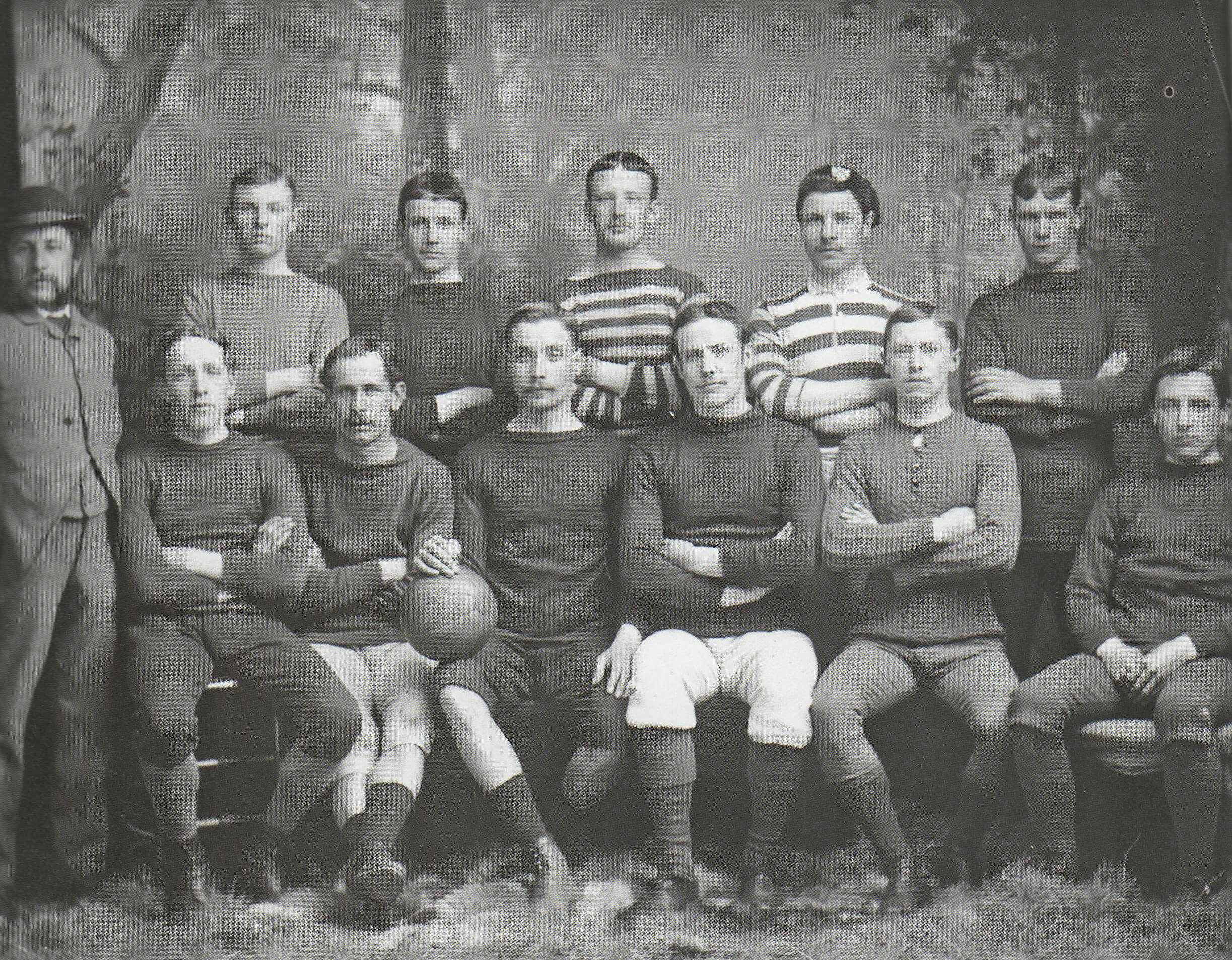
Major Dalbeigh-Smythe: Jack will know. He’s lived here all his life. Jack, what do you call that railway over at Ravenglass?
Jack (barman of the Crowing Cockerel): La’al Ratty.
Major Dalbeigh-Smythe: Could you spell that please?
Jack: L A A L and R A T T Y.
Major Dalbeigh-Smythe: You sure about that?
Jack: No, not really. We say the words. We don’t need to spell ’em.
Major Dalbeigh-Smythe: Could there be an apostrophe in laal? L A apostrophe A L?
Jack: Could be. Yes, now you mention it, yes, I think there is.
Ernest Ackland: If there’s an apostrophe it must stand for something left out. What could that possibly be?
Major Dalbeigh-Smythe: ckadaisic perhaps. Anyway, it doesn’t matter, as long as there’s an apostrophe. And you think there is, Jack?
Jack: Yep, think so.
Major Dalbeigh-Smythe: Splendid! Serve the bounder right!
Ernest Ackland: What are you talking about, George?
Major Dalbeigh-Smythe: Well, you know my good woman runs the guest house. I told her when I retired up here that if she wanted a guest house to keep herself amused then it would be entirely up to her. I’d help spread some bonhomie in the bar but apart from that I haven’t got the time for that sort of people.
Ernest Ackland: Quite right too.
Major Dalbeigh-Smythe: To tell the truth, I don’t know how she manages to pass the time: a spot of cooking, a bit of cleaning, a smidgin of finances, a smattering of general repairs. I left her up on the roof this morning. Anyway, it gives her a purpose in life.
Ernest Ackland: Yes, that’s always important for a woman.
Major Dalbeigh-Smythe: But sometimes, when I get back at night, she looks quite fatigued, as attractive as soldiers’ pants after a long march. I don’t impose upon her on such occasions, and I’m sure she appreciates that.
Ernest Ackland: I know what you mean.
Major Dalbeigh-Smythe: Unfortunately, she has bright ideas from time to time. She thought ‘themed weeks’ were the current fashion and so for last week she organised a ‘Scrabble Week’.
Ernest Ackland: I wouldn’t have thought that would appeal much.
Major Dalbeigh-Smythe: You’d be surprised. I asked them in the bar and they said that they normally come to the Lakes with the intention of taking lots of invigorating walks but it always rains so much that they end up playing lots of scrabble. So this time they reckoned that if they came intending to play lots of scrabble then it would be fine and sunny so they could go on lots of invigorating walks.
Ernest Ackland: And was it?
Major Dalbeigh-Smythe: No. Anyway, having had the bright idea, my good woman then considered that she is too busy doing whatever she does all day so she asked me to be referee. Well, if I say so myself, my military bearing rather suits the role of referee, so I agreed as long as I could referee in the bar and await any disputes, which I didn’t expect as most of them were dear old ladies.
Ernest Ackland: I bet they were fierce scrabblers, though.
Major Dalbeigh-Smythe: Well, yes. Vicious. And then my good woman had another bright idea: to add a little local flavour to the event, she defined a Cumbrian variant, by adding a rule that any word of the Cumbrian dialect would score quadruple points. Now, a chap called Seamus Donnybrook wasn’t happy with this ...
Ernest Ackland: Donnybrook? Wasn’t he the fellow we had to have evicted from the golf course?
Major Dalbeigh-Smythe: The very same. He got more and more annoyed at all these sweet biddies getting extra points for ‘snig’, ‘radge’, ‘glisky’, and so on. I had to leave the bar to see what all the kerfuffle was about. We generously allowed him Irish words such as ‘colcannon’ and ‘hooley’ provided they were in our dictionary, but of course he didn’t get quadruple points for them. Suddenly, he jumped up, shouting “Got you, you cheating witches: laal - four, triple word, quadrupled, 48 points. Stuff that in your cauldrons”.
Ernest Ackland: Ah.
Major Dalbeigh-Smythe: Well, dear Marjorie Primps quietly said “Rule 8 - no words with apostrophes”. You should have heard him. His words may be in the dictionary but I don’t think you’d dare use them at scrabble with these dear ladies. Now, I had no idea if laal had an apostrophe or not, but I didn’t like the cut of his jib, so I turfed him out.
Ernest Ackland: Not before time, from the sound of it.
Major Dalbeigh-Smythe: Top up, Ernest?
Ernest Ackland: I don’t mind if I do.
Photo: The staff at Ravenglass railway station.
One Fell Swoop
This extract from the recently-published memoirs of the celebrated Cumbrian climber Stanley J. Accrington describes the first solo ascent of Helvellyn by the western arête (well, the first solo ascent by Stanley J. Accrington anyway).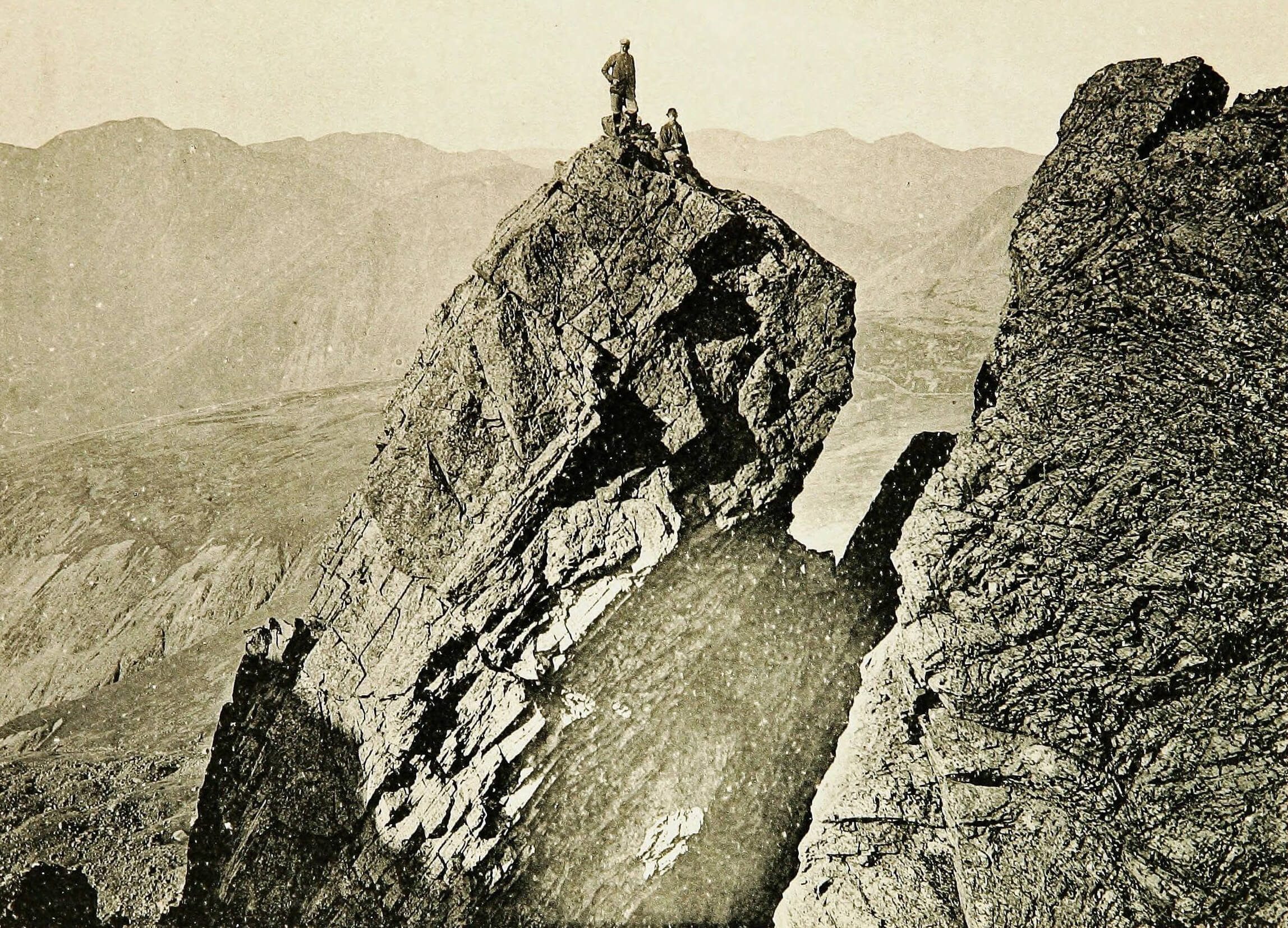 I slept intermittently. Visions of the impending peril infiltrated
my unconscious. I looked at my watch. 3.48! In the morning.
With that fortitude for which British mountaineers are renowned, I
forced myself to lie slumbering in bed for a few more hours until I
sensed the aroma of sizzling bacon.
I slept intermittently. Visions of the impending peril infiltrated
my unconscious. I looked at my watch. 3.48! In the morning.
With that fortitude for which British mountaineers are renowned, I
forced myself to lie slumbering in bed for a few more hours until I
sensed the aroma of sizzling bacon.
Outside, the wind raged ferociously. I would need every item of warm clothing that I had, plus any I could purloin. I carefully calculated the minimum provisions required for the expedition: mint cake, energy bars, a tin of apricots, lemon juice, water, plus a small bottle of spumante, just in case fortune should enable me to celebrate reaching the summit.
Breakfast over and the necessary ablutions performed, I braved the wind which was still blowing hard. Delay would only reduce the hours of daylight available. Leaving base camp I tramped slowly up the long lower slopes to reach the great ‘hole-in-the-wall’ by midday. Here were scattered the remains of previous expeditions, with echoes of earlier failures adding an air of desolation. But it provided a wonderful prospect of the fearsome arête ahead.
I continued on up the ridge, taking it slowly and steadily, because of my great burden and the reduced oxygen. I appreciated the mountaineers’ whimsy in calling this arête Striding Edge, for striding is one thing you cannot do upon it. I was beginning to tire and looked around for a suitable lunch-time ledge, but there was none. Somewhat desperate, I traversed across the steep slope on the sheltered side to find eventually a relatively flat spot overlooking Red Tarn far below.
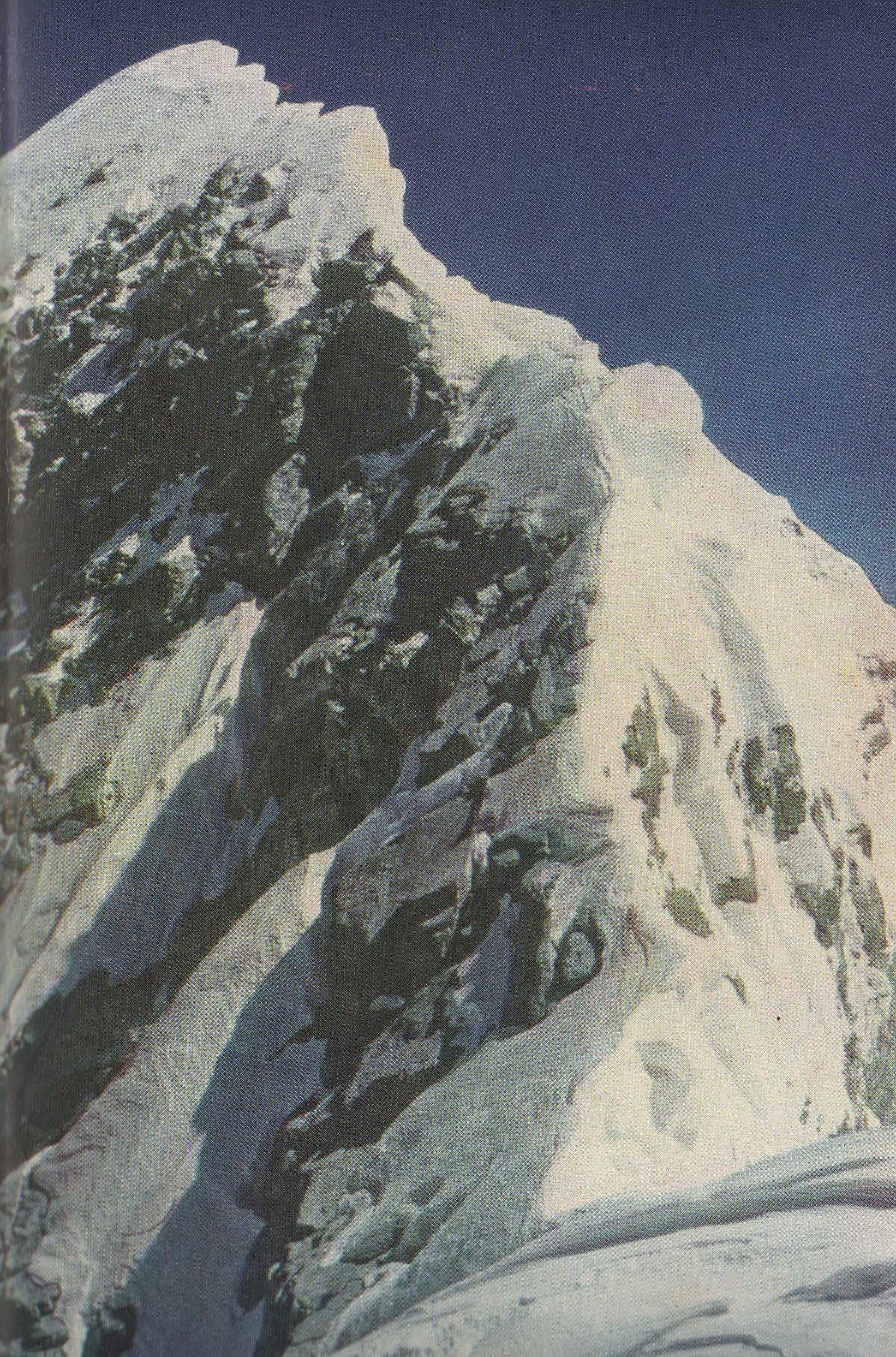 Well satisfied with lunch and the height already gained, I
pressed on. Vertiginous slopes plunged down on both sides of
the knife edge, slopes down which, sadly, many less competent
mountaineers have also plunged.
The altitude and wind took my breath away, the latter
occasionally upsetting my balance and my morale. After some
determined scrambling, I reached an awkward rock chimney,
beyond which I could see the arête rising yet more steeply.
Well satisfied with lunch and the height already gained, I
pressed on. Vertiginous slopes plunged down on both sides of
the knife edge, slopes down which, sadly, many less competent
mountaineers have also plunged.
The altitude and wind took my breath away, the latter
occasionally upsetting my balance and my morale. After some
determined scrambling, I reached an awkward rock chimney,
beyond which I could see the arête rising yet more steeply.
As all responsible mountaineers must do from time to time, I considered the advisability of carrying on. It is unwise to mountaineer alone and on those occasions when I cannot avoid it I invent a companion, whom I call YetI. As a team, I and YetI can climb higher and yet-higher. YetI is an extension of myself: wise, brave, athletic, charming, and with all his own teeth - like myself, only more so. The ideal companion. I asked YetI about the wisdom of continuing and he replied, as he always did, “Just as you wish”. I decided to go on.
I focussed my attention on the rock chimney, the notorious step that often made the difference between success and failure. No doubt, it would be a minor problem to expert rock climbers on Everest but here it was a barrier that needed all my considerable strength and will-power to overcome. With fervent prayers that the rocks I grappled with would stay attached to the mountain, I inched myself along, finally dragging myself onto a ledge, where I lay for a while regaining my breath and composure.
But now the challenge of the steeper slope became apparent. At first glance it was impressive and rather frightening, even to a man of my self-effacing courage. We checked our provisions, our bearing, and our sanity and, finding all sufficiently in order, carried on. The ridge was narrow and difficult, made even more so by the many mountaineers passing in the opposite direction.
At this point, I have a suggestion for the authorities. You should not allow so many inexperienced mountaineers to wander about at will. Insist that they ascend this arête only on odd days of the month and descend it only on even days, and obviously vice versa for other arêtes. Problem solved. I often find that I have solved many of life’s major problems during expeditions such as this.
We climbed slowly, but safely, which was the main consideration. Steep rock slopes arose ahead of us. It was tempting to seek an easier way to the side, but that way disaster lay. Time was passing and the cliff seemed never-ending. Our original energy had long gone and it was now a grim struggle. We rested every fifteen minutes to regain our breath and a little vigour.
And then suddenly there was grey sky rather than black rock ahead. We had reached the end of the arête, and there, curving to the right, was a more gentle slope leading to the summit, our Shangri-la (Editor: isn’t that a valley?). Finding extra reserves of energy, we staggered to the top. My initial feelings were of relief, rather than triumph.
But then the realisation of what we had achieved sunk in. Somehow, I shook YetI’s hand vigorously and slapped him on the back. We sipped the spumante. I surveyed all around, to the great peaks surrounding us and down into the far-off valleys, where dull people were going about their dull routines. I couldn’t wait to get back to impress them with the life-enhancing insights gained on an expedition such as this. I asked YetI if he was ready to descend. “Just as you wish” he said.
Photos: Stanley J. Accrington in his prime, on Scafell Pinnacle; Helvellyn’s western arête.
Four Men in Their Boots, Day 9
... Buttermere ...
We departed from the Fish Hotel in good spirits, all of which belonged to me, freshly attired as I was. As we peered across the choppy lake towards the steep slope of Fleetwith Pike, it was apparent that this was a day for which the word changeable would be an understatement. Patches of cloud were being whipped across the tops, with the gaps between the clouds enabling the sun to highlight islands of bright green, which likewise tore across the hill-sides. The clouds themselves released whirling rain-storms enlivened by temporary rainbow colours.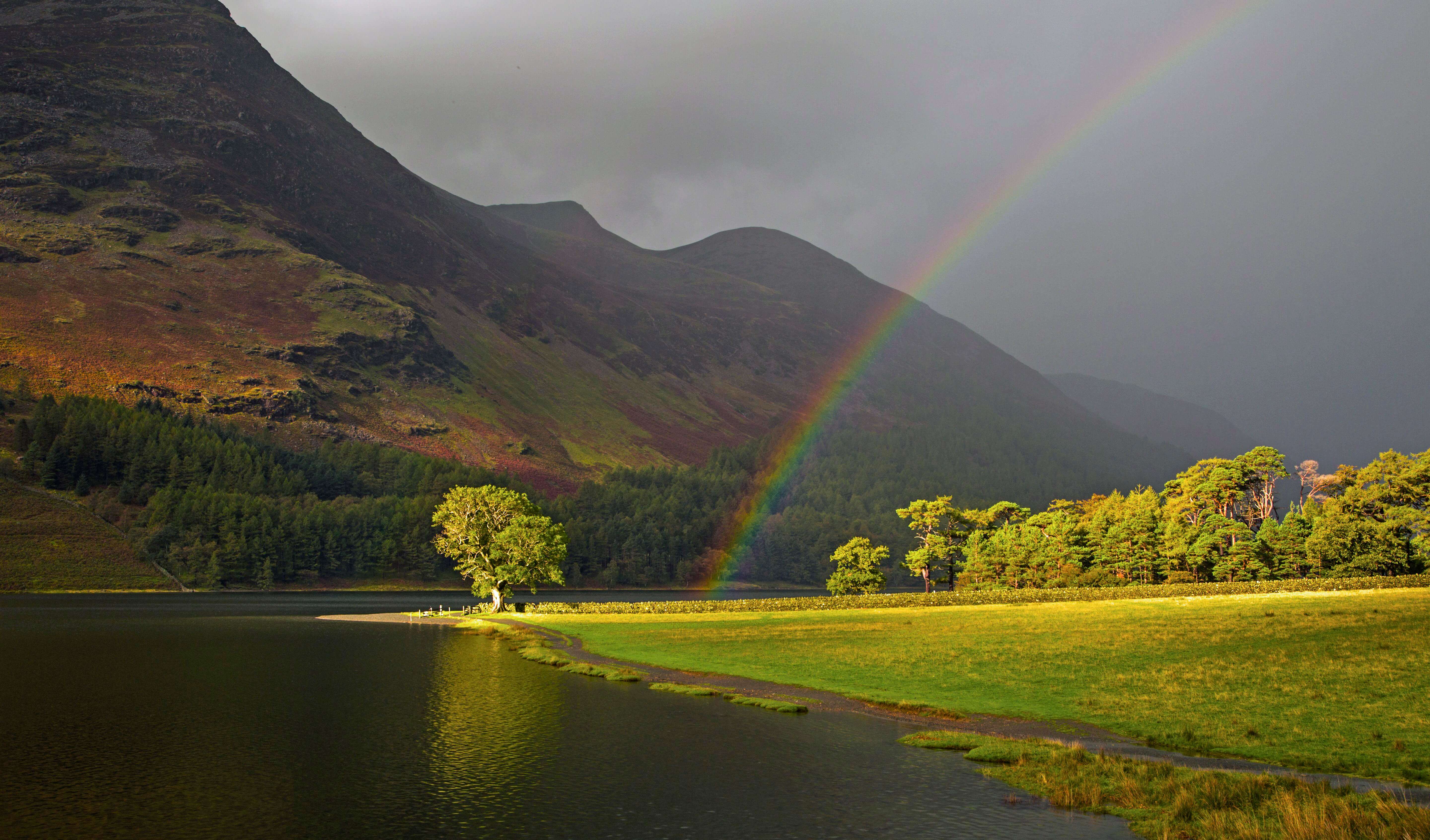 We strode along the well-worn path through Burtness
Wood towards Bleaberry Tarn. In the sun the ridge up to Red
Pike did indeed look red; in the cloud, it didn’t. As we crested
the top of Red Pike we were engulfed in what I suspected
would be the first of many rain clouds. We hurriedly donned
our wet-weather gear and continued briskly along the broad
ridge to High Stile and High Crag.
We strode along the well-worn path through Burtness
Wood towards Bleaberry Tarn. In the sun the ridge up to Red
Pike did indeed look red; in the cloud, it didn’t. As we crested
the top of Red Pike we were engulfed in what I suspected
would be the first of many rain clouds. We hurriedly donned
our wet-weather gear and continued briskly along the broad
ridge to High Stile and High Crag.
Every few minutes the clouds parted to give us tantalising glimpses down the excitingly precipitous crags towards the village and the lake of Buttermere. In the other direction, our future targets of Pillar and Scafell made fleeting appearances. Somehow, the ephemeral nature of the view enhanced its appeal. We knew that if we didn’t appreciate it whilst we had the chance we might not get another one.
We scrambled down the unpleasant scree to Scarth Gap and on towards Ennerdale Forest, which was, at last, being allowed to revert to natural woodland. Arriving at the Black Sail Hut, we found large numbers of people gathered, preparing to set off on their hike, obviously after a more leisurely start to the day than my well-trained team had managed.
Again, many of them seemed to know Harry, who was soon acknowledging their best wishes and shaking hands with all and sundry. With a nod towards me, one of them shouted “Ist dat mein führer?”, or something similar, to the merriment of everybody. It was rather perplexing but it seemed good-natured enough, so I waved, rather stiffly, in acknowledgement, which provoked further gales of laughter.
... Great Gable ...
Eventually, I was able to drag Harry away. We needed to focus on what I knew would be one of our most challenging climbs - that up Great Gable from Beckhead Tarn. I had intended to take us up Kirk Fell en route to Beck Head but, after our long delay at the hut, I decided to be less demanding of my colleagues. Instead, I took us along the contour below Boat How Crags.There was, however, no way to avoid the rough, steep slope of great boulders on the northwest flank of Great Gable. Here, unfortunately, the cloud settled in, making it difficult to determine the way ahead. After the misadventure on Hart Crag, I kept the team closely together. This was not terrain in which to let anyone get lost, or to have to search for them.
We paused at the top of Great Gable to pay our respects to those named on the plaque as having died in the 1914-18 war. A ceremony every November does likewise. It felt incumbent upon me to lead a small service and, taking Genesis 22 as my text, I extemporised a sermon about Abraham taking his son up a mountain in Moriah for a burnt offering.
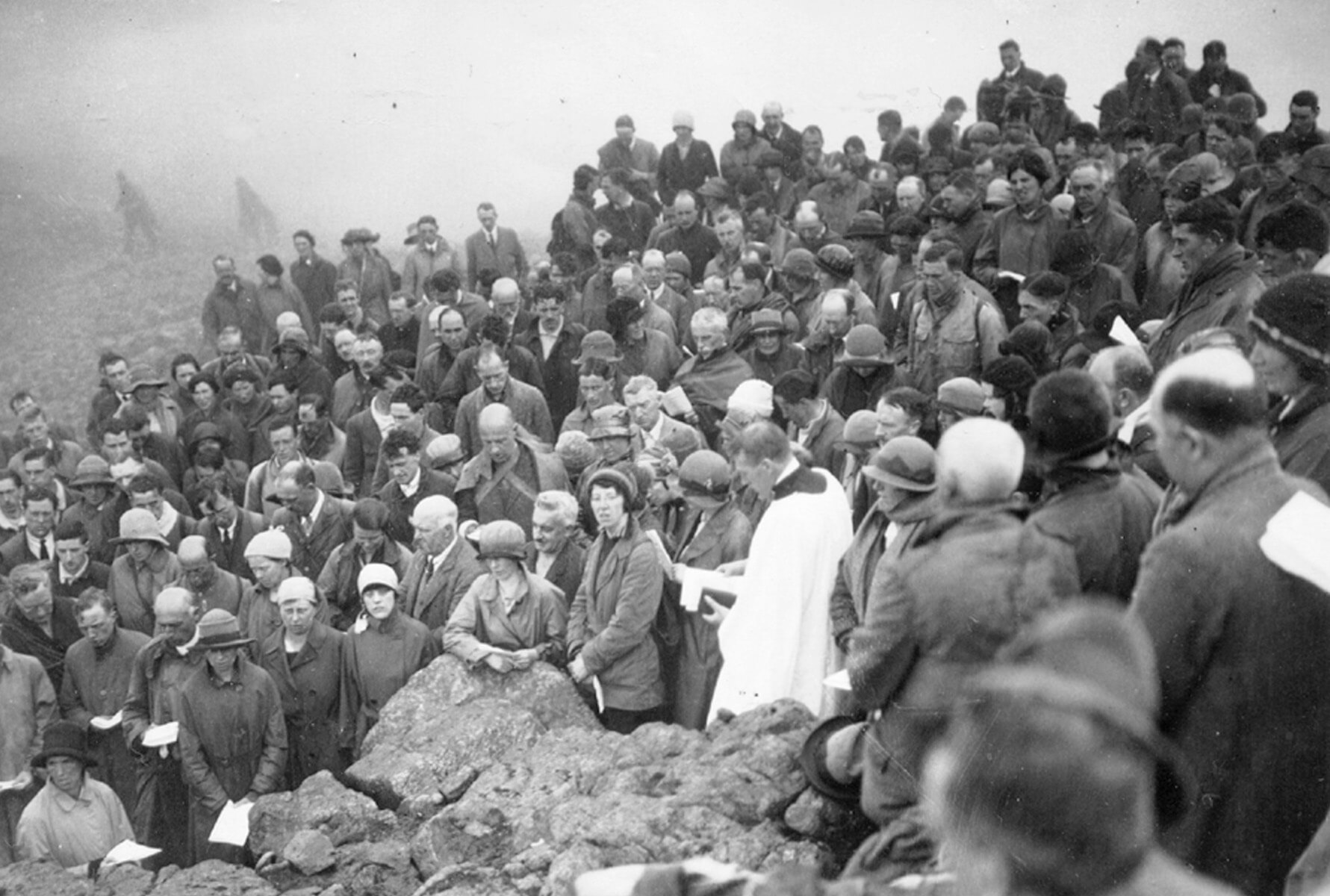 Other hardy souls arrived at the top and they too
gathered around. As the fate of Abraham’s son seemed
to depress them, I moved on to Exodus 3, where Moses is
entreated by God to climb the mountain over and over. This
prospect did not enthrall the assembled throng much either.
So, with the congregation now nearing a hundred or so, I
turned to Luke 9, where Jesus and his disciples take to the
mountain. “While he thus spake, there came a cloud, and
overshadowed them: and they feared as they entered the
cloud.” This, at last, they could relate to, and thus uplifted the
multitude dispersed.
Other hardy souls arrived at the top and they too
gathered around. As the fate of Abraham’s son seemed
to depress them, I moved on to Exodus 3, where Moses is
entreated by God to climb the mountain over and over. This
prospect did not enthrall the assembled throng much either.
So, with the congregation now nearing a hundred or so, I
turned to Luke 9, where Jesus and his disciples take to the
mountain. “While he thus spake, there came a cloud, and
overshadowed them: and they feared as they entered the
cloud.” This, at last, they could relate to, and thus uplifted the
multitude dispersed.
... Green Gable ...
We solemnly made our way down the remains of the path towards Windy Gap and up Green Gable, the insignificant sibling of Great Gable. Again, the top was in cloud and as we wandered about trying to locate the topmost point, a strange vision appeared before us. A young couple, clad only in sandals, shorts and tee-shirts, emerged from the mist. They seemed in high spirits, oblivious of the wet clouds scuttling past them. I couldn’t at first understand a word they said but with Harry’s careful interpretation it turned out that they were asking if this was Great Gable.I do despair, sometimes. I have no time for those who set out to walk in the Lake District completely unprepared for the difficulties that they may face. And when they don’t even know where they are, I give up. Harry, however, took them under his wing. He asked to see their map, presumably so that he could point out where they actually were. I was no longer taking any interest but I saw that they produced from a pocket a scrappy piece of paper with only a few tops marked and some dotted lines between them, with no indication of contours, cliffs or anything else. They did not know what a compass was, let alone possess one.
With great solicitude, Harry explained where they had arrived and elucidated from them where they hoped to go - on up to Great Gable, down the treacherous ridge that we had struggled up, and then along Moses Trod back to Honister. He also discovered that they were from Holland, which may explain their limited knowledge of mountain walking. And that they were on honeymoon, which may explain their limited interest in anything except one another.
Harry, fearful that their marriage, or even themselves, might not survive an expedition up Great Gable in these conditions, wearing so little, began to describe the fearsome, dangerous mountain ahead of them. They couldn’t see the mountain, of course, but could only listen in astonishment at the alarming ordeal ahead of them, as described in the most vivid, eloquent fashion by Harry. After several minutes of this, they began to think, as Harry intended, that perhaps it would be better if they returned safely the way that they had come. Once they had persuaded themselves, Harry gallantly volunteered to escort them back.
The others were also, by this stage, becoming quite fond of these foolish Dutch youngsters. Richard said that he’d go along with them too, ostensibly to keep Harry company. Thomas seemed about to join them but he thought better of it once I made it clear that the maps stayed with me. If others chose to depart from my ordained route without permission that is up to them. It is not my responsibility to look after all the waifs and strays that one encounters on the Lake District hills. I’d feel like the Pied Piper of Hamelin if that were the case.
Thomas and I walked down to Seathwaite in silence, entranced by the transitory glimpses of sun in the valley. Predictably, the others were late to meet us in Seatoller, having become lost on Brandreth.
Photos: Buttermere; The Great Gable memorial service.
Border Conflicts
From a Cumbria Council MeetingDiana Dubble-Barrell (chair): Our good friend Charles Smarm, the head of Cumbria Tourism Services, joins us again for the next item. Would you like to introduce the discussion document that you kindly prepared for us, Charles?
Charles Smarm: With the greatest pleasure, Diana. My guiding principle is that in these difficult economic times we must all pull in the same direction, and that is to make Cumbria the number one tourist attraction in Europe, if not the world. That is the most important thing, the thing to which all our efforts should be focussed.
Joss Jenkinson (Cartmel ward): Not sure that we farmers would agree with that.
Diana Dubble-Barrell: Please. Let Charles finish.
Charles Smarm: It’s ok, Diana. I appreciate that point of view. The punters like to see a few sheep in the landscape. And the odd yokel leaning over a farm-gate is always welcome. Now, I don’t intend to go through the detail of my document, as I’m sure that you’ve all read it thoroughly, but I’d be very happy to answer your questions.
Josh Jenkinson: Excuse me, everybody, but I’ve just remembered that I have some yokelling to do.
Harry Cowan (Furness ward): Mr Smarm, I see that you say that we should, wherever possible, emphasise Cumbrian products. Could you give some examples?
Charles Smarm: Certainly. I think, for example, that we should pass a by-law that says that all sausages to be sold in Cumbria must be Cumberland sausages.
Harry Cowan: Rather difficult to enforce, don’t you think?
Charles Smarm: Not at all. We could employ an army of inspectors to tour butchers, hotels and restaurants, tasting sausages to see if they cut the mustard.
Harry Cowan: I wouldn’t mind that job. Any other examples?
Charles Smarm: Erm. How about: all cakes sold in Cumbria must be Kendal mint cakes.
Harry Cowan: Kendal mint cake isn’t a cake.
Charles Smarm: Isn’t it? What is it, then? We mustn’t leave ourselves open to accusations of misleading the punters.
Harry Cowan: Haven’t you tried it?
Charles Smarm: I’m afraid that I haven’t been to the Kendal Mint yet.
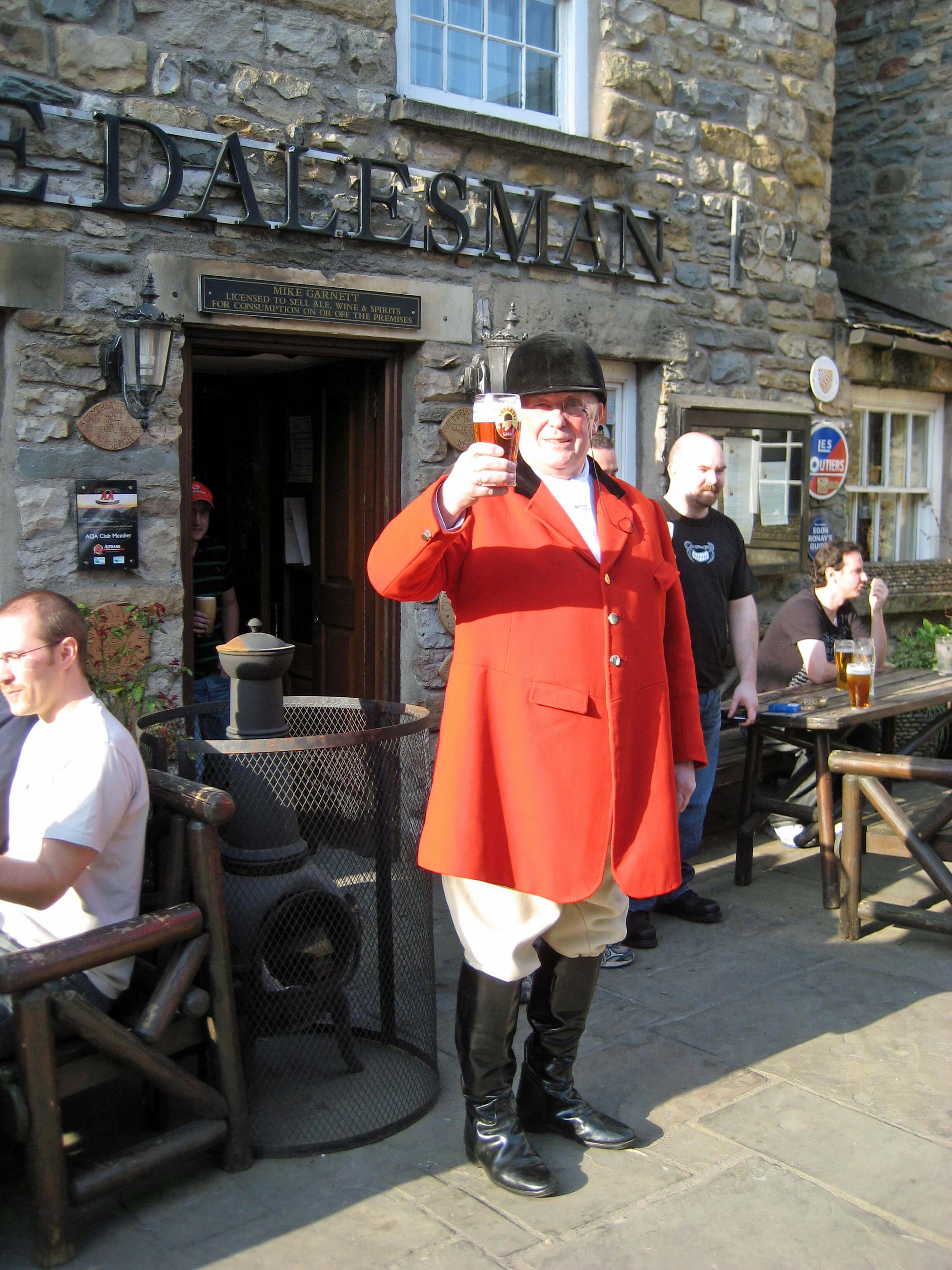
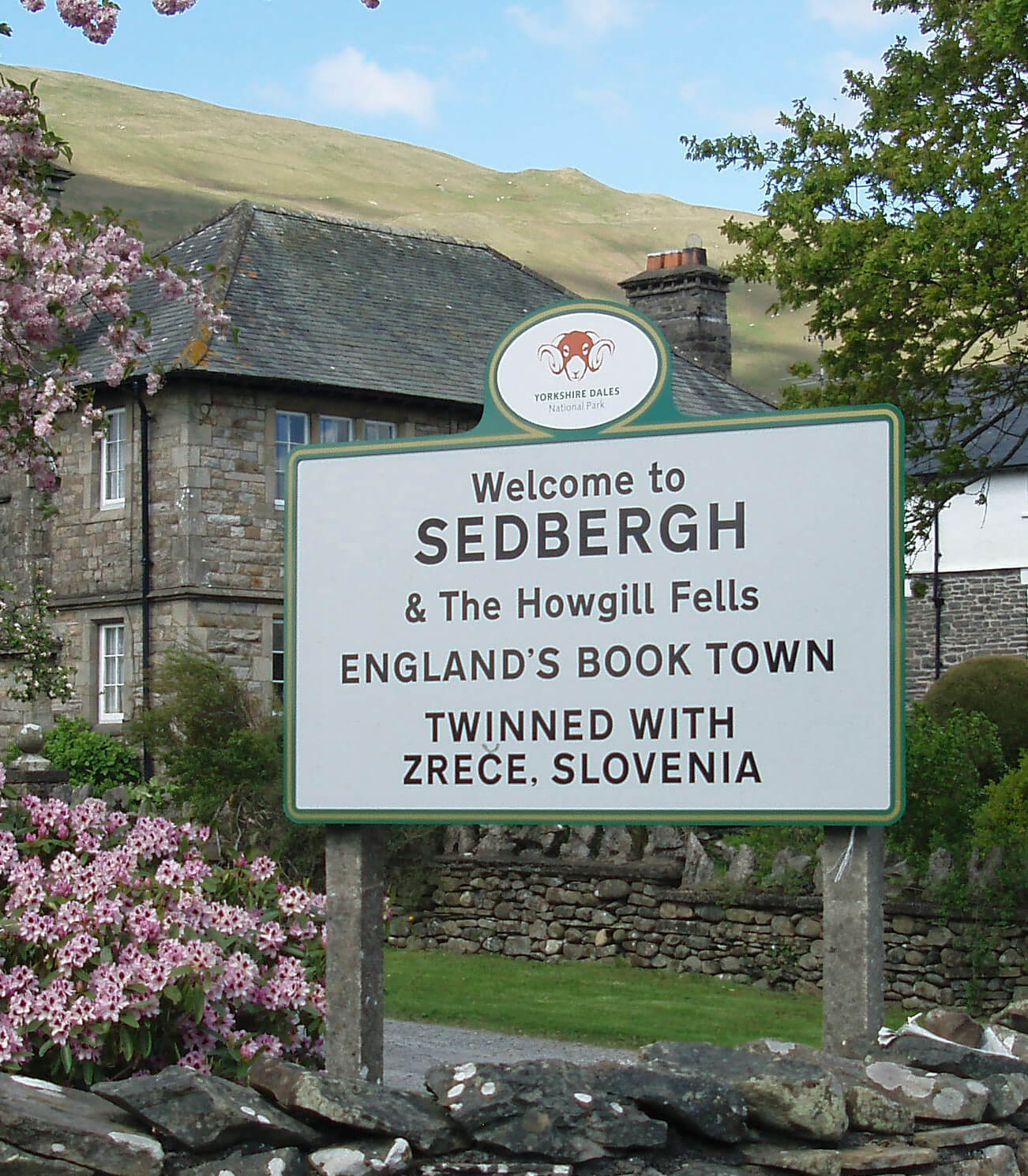 Margaret Tyson (Grayrigg ward):
Um. Excuse me. Your document makes some oblique comments
about those of us on the fringes of Cumbria. What do you have
in mind?
Margaret Tyson (Grayrigg ward):
Um. Excuse me. Your document makes some oblique comments
about those of us on the fringes of Cumbria. What do you have
in mind?
Charles Smarm: Well, if Manchester City were to acquire John Terry from Chelsea they would expect 100% allegiance from him. They would not expect him to keep going on about the delights of Stamford Bridge.
Margaret Tyson: Eh? Terry who?
Charles Smarm: Please let me explain. For example, I notice that in Sedbergh there is a popular hostelry called The Dalesman. Now, Sedbergh has been in Cumbria for over thirty years. It is high time that it stopped referring to the Yorkshire Dales. The inn should be renamed as The Lakesman. And the Tourist Information Centre there should only have books about Cumbria. And ...
Margaret Tyson: Hold on a minute. Sedbergh is still in the Yorkshire Dales.
Charles Smarm: Be that as it may, Sedbergh is within the District Council of Cumbria. It receives its funding from here. It should therefore give total allegiance to Cumbria. In these times of limited funding, the Council should prioritise those areas that fully support Cumbria.
Dick Howarth (Kirkby Lonsdale ward): That sounds like a threat to me. In Kirkby Lonsdale we are closer to the Yorkshire Dales National Park than we are to the Lake District National Park. And we are right next to the Lancashire border too. Some of my best friends are from Lancashire and Yorkshire. Are you saying that when we have visitors to Kirkby Lonsdale we should direct them all to the Lake District?
Charles Smarm: Exactly. That is precisely what I mean.
Dick Howarth: You blithering oaf. I bet there aren’t many Smarms in our telephone directory. Not exactly a local, are you? Some of us have lived here for centuries. It’s only a few months since you came here from the Norfolk Broads. What the hell do you know about our priorities?
Charles Smarm: Don’t you start ...
Diana Dubble-Barrell: Gentlemen, please. A good time for a tea break, I think. But without any of that Kendal mint cake.
Photos: The Dalesman; Sedbergh (Cumbria), with its Yorkshire Dales sign.
Fell-Walking Tip 15
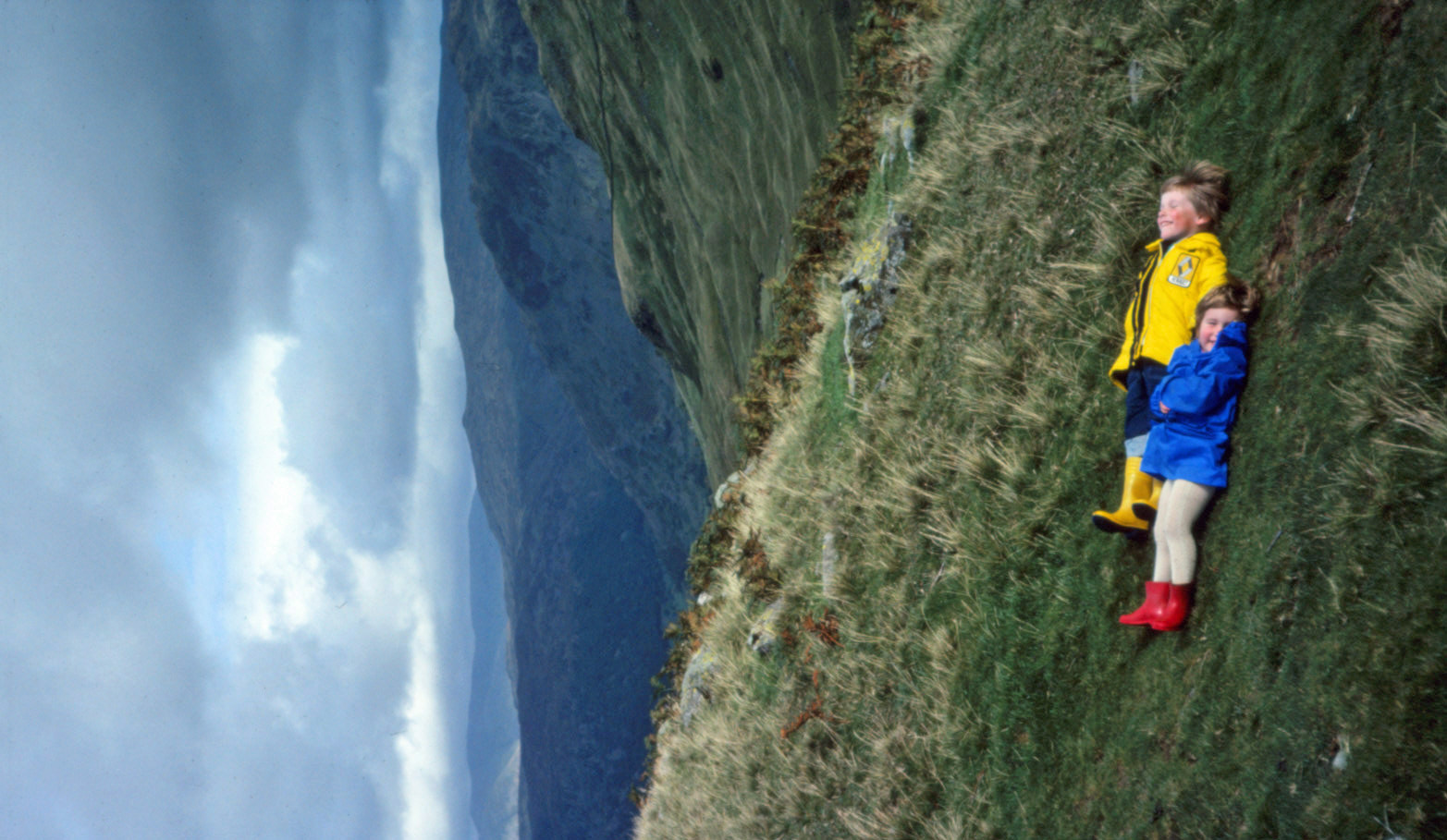 According to a recent medical study reported in the International
Journal of Peripatetic Osteopathy, people who are unaccustomed
to fell-walking and who spend two weeks clambering up high
mountains carrying a heavy backpack lose, on average, 11cm (over
4 inches) of height.
According to a recent medical study reported in the International
Journal of Peripatetic Osteopathy, people who are unaccustomed
to fell-walking and who spend two weeks clambering up high
mountains carrying a heavy backpack lose, on average, 11cm (over
4 inches) of height.
This is because the intercostal muscles of people unused to pedestrianism with a vertical dimension are, in precise medical terminology, flabby. They collapse under the extra strain - the muscles, that is, and the people too, sometimes.
To prevent this, novice fell-walkers are recommended to pause after one hour of walking and to lie for two minutes on a gentle downward slope, head downhill, so that gravity may restore the spine and ribs to their original shape.
It is not advisable to lie for more than two minutes otherwise the blood will run to the head causing even more serious problems. Or you may just fall asleep, which is not the purpose of a fell-walk at all.
The optimum degree of slope is between 5 and 10 degrees. On no account lie on a slope of greater than 15 degrees. If you do, you may slide head-first off the mountain and this is, generally speaking, a once-in-a-lifetime experience.
Photo: A demonstration of the recovery position.
A Week in the Lake District
Saturday: All arrived by half-six. Some misunderstanding about who was invited. I’d booked the cottage for the five of us, to celebrate ten years since graduating. But Charles brought Annie and Richard Tara. We’d all not met since Charles’ third marriage (to Fiona, I think it was). Drinking, chatting, late night.Sunday: Late breakfast. Light rain. Gentle stroll up Cat Bells to loosen up. All in good spirits. Particularly lively between Richard and Tara at the back. Heard a cuckoo. Small blister on the right big toe.
Monday: Showery. Charles, Malcolm, Peter, Annie, Richard and I walked up Skiddaw. Tara opted out (didn’t sleep well; Richard slept in lounge, I think). Could have been a wheatear. Blister made walking uncomfortable - now have a sore knee.
Tuesday: Low cloud. Malcolm, Peter, Annie, Richard and I conquered Great Gable. Charles didn’t think it right to leave Tara on her own. Very chivalrous of him. Lost Malcolm and Peter for a while in the cloud. Saw a woodpecker in Seathwaite. Both knees painful now.
Wednesday: Very windy. Charles slept in the kitchen, I think. Peter, Annie, Richard and I walked up Loughrigg - an easy walk, because of my knees. Tripped over a rock, injuring my hip. Peter rather morose. Malcolm had stayed in the cottage: ‘personal things’ to sort out, he said. Pied flycatchers by the lake.
Thursday: Squally showers. Peter stayed to help Malcolm with his problems. Annie, Richard and I did the Buttermere Horseshoe. They strode ahead; I hobbled behind. A couple of times they forgot about me. Watched ring ouzels on Brandreth. Had a tumble on Haystacks: dislocated shoulder.
Friday: Steady rain. Nobody slept in the lounge or kitchen, I think. Annie said she was too tired to walk today. Richard and I tackled Helvellyn. He talked of Annie the whole way. Four buzzards above. The walk was a bit bold, with my injuries, but I thought “last day, go for it”. Fell off Swirral Edge. The Rescue Service wasn’t long.
Saturday: Sunny. Charles and Tara, Malcolm and Peter, Richard and Annie had separate walks up Cat Bells. Watched a great tit on the bird table. “Must make it an annual event” they said. Nobody offered me a lift home.
Many Happy Returns to Bassenthwaite
“Nearly there, at last. Soon we’ll have to make our big decision, my turtle dove”.“I’ve told you: I’ve already made it. I’m not going there again. And I’m not your turtle dove”.
“But why? What’s wrong with the old place? They always look after it so well for us. Any spot of damage in the winter and they’re up straightaway to repair it”.
“Typical. You’re just too lazy to repair it yourself, like all the others do”.
“But they’ll be so disappointed. They look forward so much to us turning up”.
“That’s their problem. They should have better things to do”.
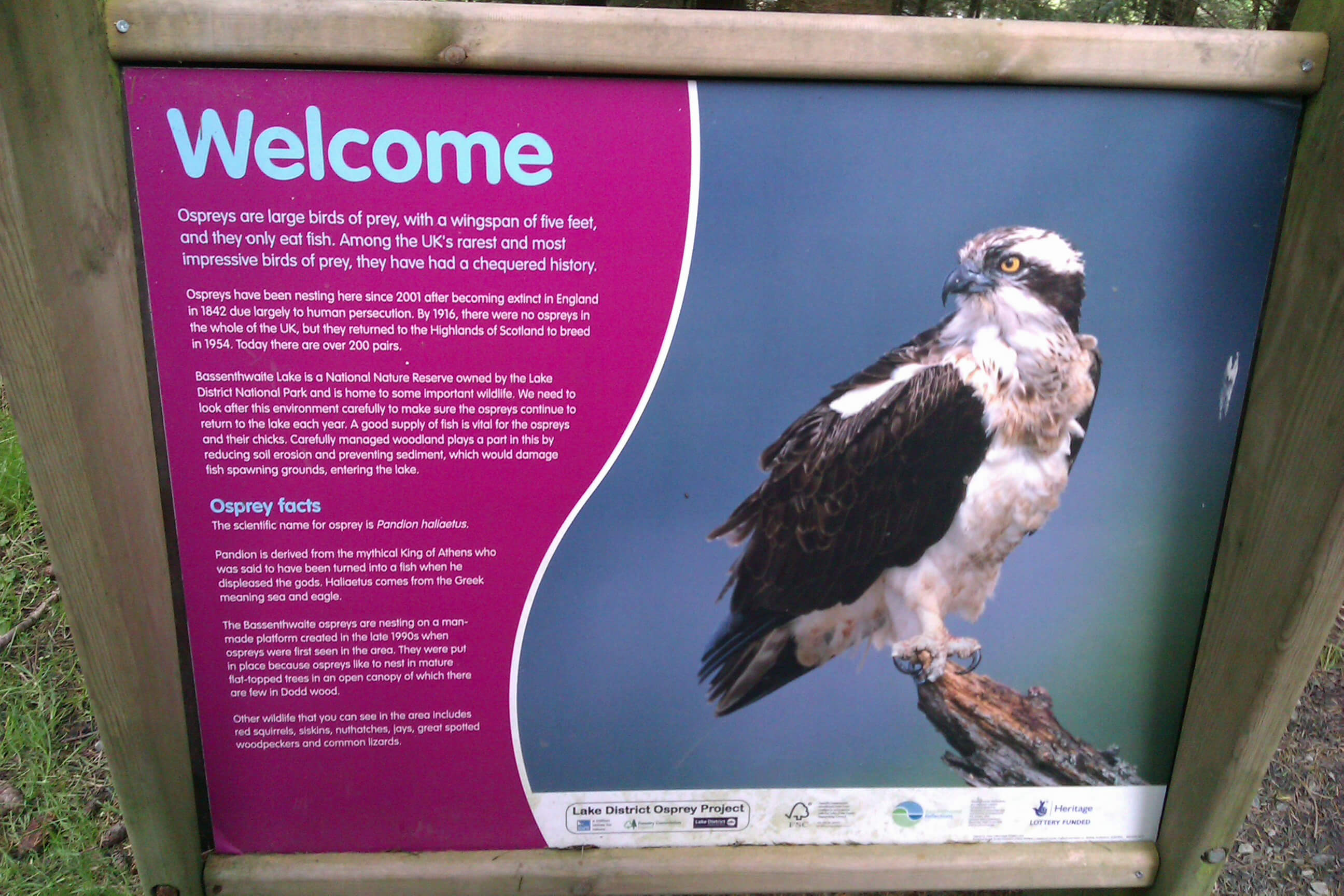 “But my previous bird liked the place. Seven years in a row we
went there. Never a peep of complaint from her”.
“But my previous bird liked the place. Seven years in a row we
went there. Never a peep of complaint from her”.
“Your previous bird can get stuffed. I make the decisions now. And I’m not going there again”.
“But it’s always so tidy. All mod cons. Lovely view. Why don’t you like it?”
“Well, for a start, I don’t like all the cameras. No privacy at all. Every second of the day they’re watching and analysing everything I do. It gets on my nerves”.
“Oh, come on, you’re exaggerating”.
“It’s all right for you. You’re off gallivanting about most of the time”.
“Hardly gallivanting. I keep you well supplied, don’t I? Anyway, that’s part of the deal: they look after us and we entertain them”.
“You can entertain them if you like. I’ve got more important things to do”.
“Well, I enjoy it. Do you remember that time when I circled round and round them so much that they became too dizzy to stand?”
“Yes, served them right”.
“And last year when I ‘accidentally’ dropped that trout on them?”
“Even better”.
“Anyway, I can see the place coming up now. So, what are we going to do?”
“Well, I’m not going there, that’s for sure”.
“OK, then, if you insist. You’re the boss. On to Scotland it is”.
“Scotland? Who said anything about Scotland? There’s too many of us up there already. I’d rather be somewhere near here, on our own. Quiet and peaceful”.
“Ah. Well, in that case, how about a starter home on the other side of the lake?”
“Starter home?”
“Yes, they built a few of them last year, hoping to attract some first-time fliers”.
“What? Aren’t we good enough for them? What a cheek! I’ve a good mind to teach them a lesson”.
“How do you mean?”
“Well, let’s go to the old place and get them all a-twitching. And while they’re dashing about with their binoculars and cameras, we can sneak off in the dark to one of the new places. Then we can have weeks of fun watching them getting in a muddle, trying to find out where we’ve gone, working out how to put up some new cameras, making new viewing points, and all that palaver”.
“And I can still drop trout on them?”
“Certainly. And next year we can do it all again, and the year after, and so on”.
Four Men in Their Boots, Day 10
... Seatoller ...
This, we knew, would be a day to savour! - the kind of Lake District day that we dream about. Not only would we climb to the highest point of England but, as we set off from Seatoller, we could see that we would be blessed with one of those bright, perfectly clear days that we always hope for but are rarely given.Rather than tramp along the familiar valley through Seathwaite, I led the team up through the wood and on to Thornythwaite Fell. Seathwaite is the wettest inhabited place in England (140 inches a year) but I had no fear of rain on such a day. I just felt that the sooner we were on the tops and able to enjoy the fabulous views the happier we would be. And so it proved.
... Glaramara ...
Glaramara is described as a long, sprawling, heavy, plum-coloured hump in the Herries Chronicles of Hugh Walpole. But the name is irresistible. It is a mountain that just has to be climbed. We paused at the higher of the two summits of Glaramara to take in the view, perhaps the best from any Lake District top, with its central position and relatively modest height providing a 360-degree panorama of higher fells: to the east, the Helvellyn ridge, with High Street in the distance; to the north, Derwentwater with Skiddaw and Blencathra beyond; to the west, a fine prospect of Green Gable and Great Gable, where conditions had been so different yesterday - all terrain that we had already conquered, as we proudly reflected.Then our eyes turned south to peaks still to be tackled: Coniston Old Man, Crinkle Crags, Bowfell. But could we see our main target for today, Scafell Pike? We didn’t argue - but we couldn’t agree. It seemed to me that the great buttresses of Ill Crag and Great End obscured the very top of Scafell Pike but it was hard to be sure.
So, although it would have been very pleasant to stay a few hours debating the matter and absorbing the multi-faceted view in all its glory, we set off to investigate. We walked south along one of the most delightful ridges in the Lake District, with a succession of neat little tarns tucked into grassy depressions below minor stony peaks, all the while surrounded by the evolving panorama.
We paused again when we reached the summit of Allen Crags, still entranced by the views. Helvellyn, Skiddaw and Great Gable could still be seen, the last boldly portrayed behind the most attractively-named Lakeland tarn, Sprinkling Tarn. The visibility was so good that it was easy to pick out on the flank of Great Gable the silhouette of the famous Napes Needle. To the south and west the forbidding prospects of Great End and Ill Crag confronted us, now undoubtedly obscuring the Scafell Pike peak. We lingered for quite a while at the Allen Crags haven as we surveyed below us a series of walkers toiling up the thoroughfare towards Esk Hause and on to Scafell Pike.
... Scafell Pike ...
Eventually, we accepted that it was time for us to do the same. We scrambled down the southern slope and up to Esk Hause, one of the busiest crossroads in the Lake District. Following the multitude heading south-west, we skirted Ill Crag, where at last the summit of Scafell Pike came definitely into view, still some distance away but, on a day such as this, presenting little difficulty.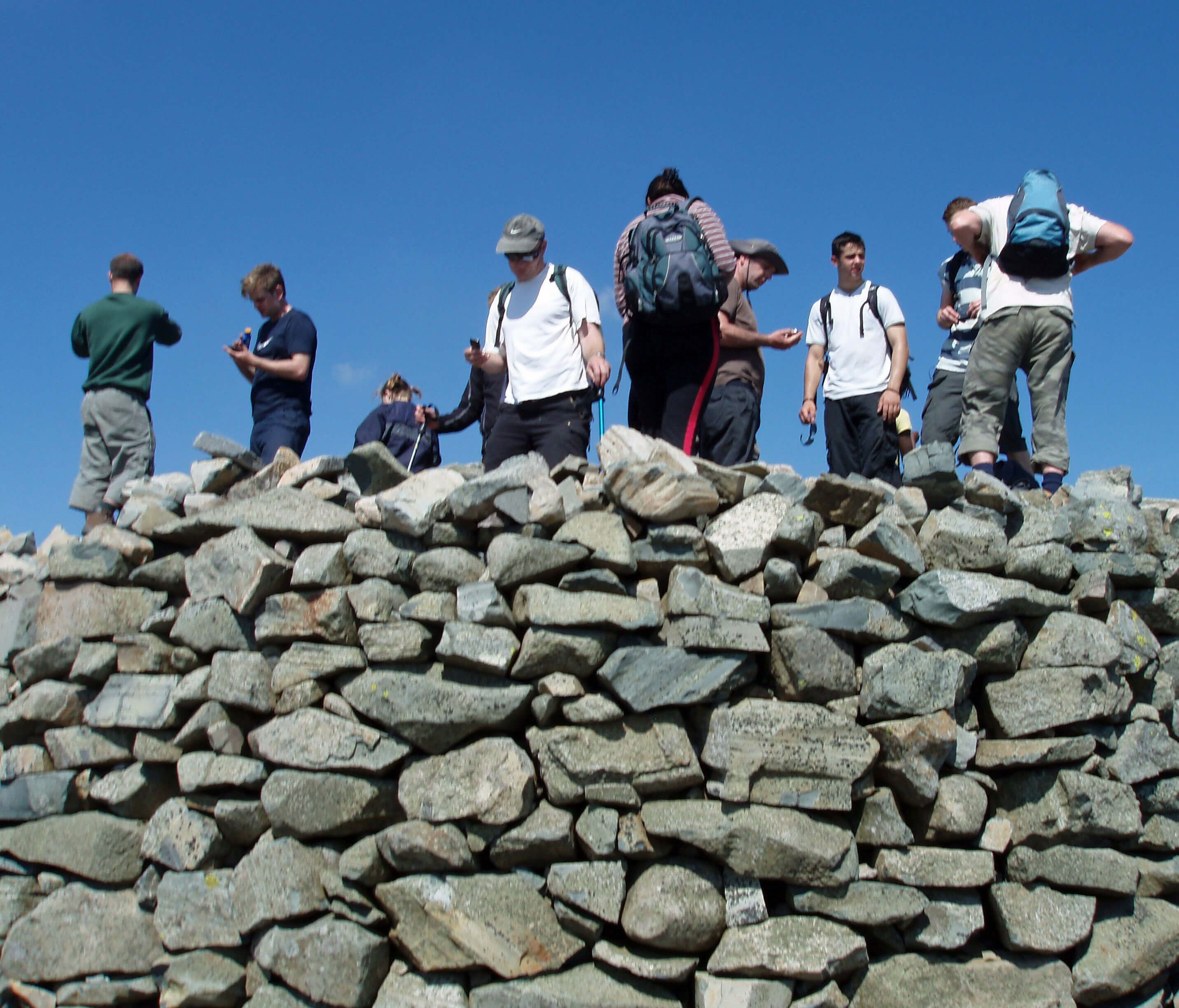 I briefly delayed the exhilaration of conquering England’s
highest summit by leading the team off the standard route to
cross the rough jumble of rocks on Broad Crag in order to take
in the view, which could never be better than it was today,
from a northern perch, looking across to Great Gable.
Now, the climactic moment could be postponed no longer.
We jubilantly reached the huge circular cairn that makes the
highest point of England yet higher. Needless to say, the view
was all-encompassing. We looked down upon previously-majestic heights - except perhaps to the south where Scafell
looked as high (but we’d worry about that later).
I briefly delayed the exhilaration of conquering England’s
highest summit by leading the team off the standard route to
cross the rough jumble of rocks on Broad Crag in order to take
in the view, which could never be better than it was today,
from a northern perch, looking across to Great Gable.
Now, the climactic moment could be postponed no longer.
We jubilantly reached the huge circular cairn that makes the
highest point of England yet higher. Needless to say, the view
was all-encompassing. We looked down upon previously-majestic heights - except perhaps to the south where Scafell
looked as high (but we’d worry about that later).
So, this unforgettable day was all but over. It was all downhill from here. We headed towards Lingmell and down by Lingmell Gill to Wasdale, content that, whatever adventures the days ahead held, the walk to Scafell Pike had been perfection.
... Wasdale Head ...
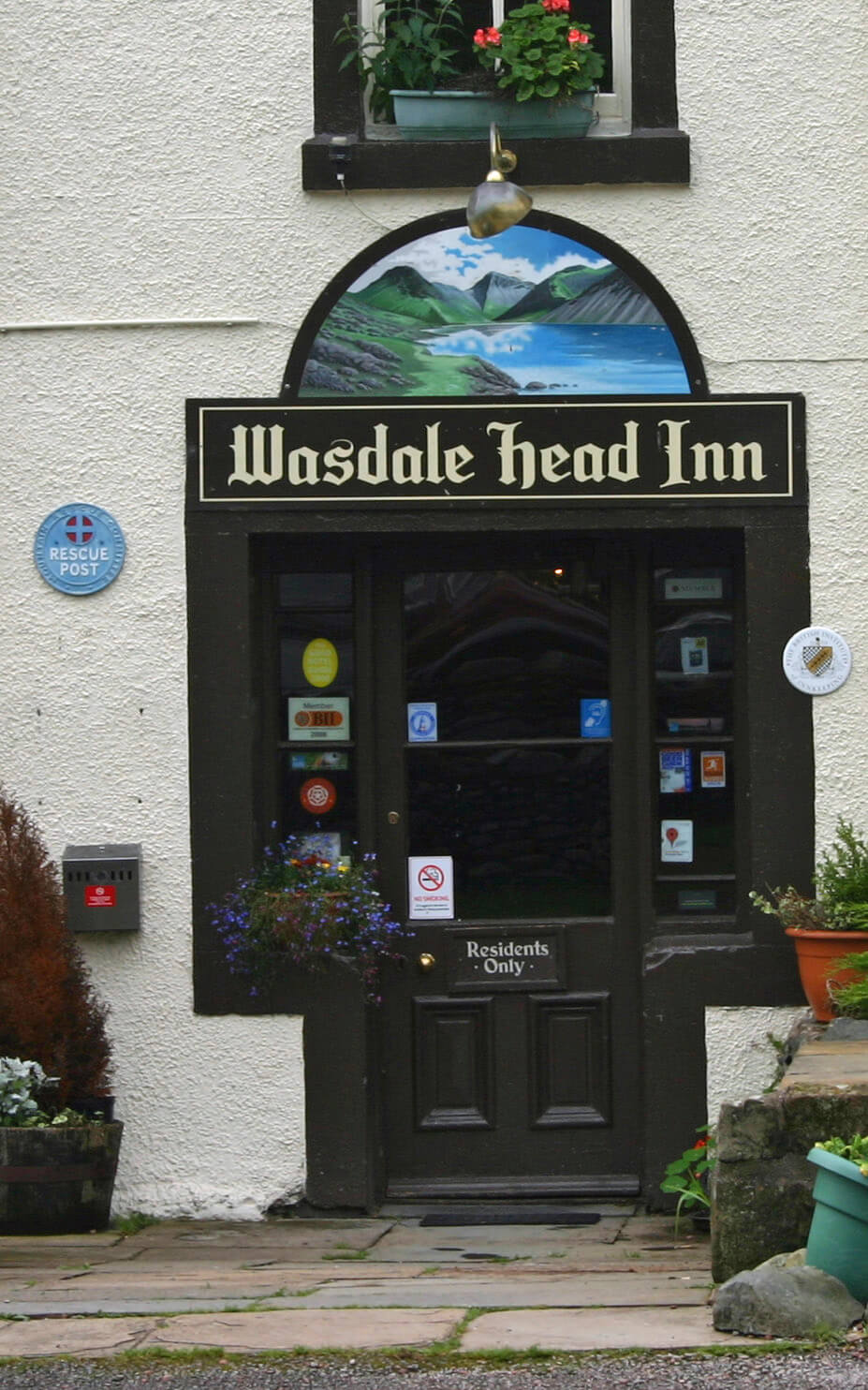 After a convivial repast at Wasdale Head I expected to sleep
the sleep of the fully contented. But it was not to be. I was
tormented by a dreadful nightmare. I dreamt that I was
awoken by a fearful wailing and shouting outside.
In my dream, I gave up trying to sleep through this
terrible noise and peered out of the window. It was a clear,
cloudless, moonlit night but I could see nothing, at first. But
then I made out a light moving on the slopes of Scafell Pike,
and then several of them, some moving up, some down. And
over on Lingmell I could see yet more lights moving about, all
to the accompaniment of diabolical yelling.
After a convivial repast at Wasdale Head I expected to sleep
the sleep of the fully contented. But it was not to be. I was
tormented by a dreadful nightmare. I dreamt that I was
awoken by a fearful wailing and shouting outside.
In my dream, I gave up trying to sleep through this
terrible noise and peered out of the window. It was a clear,
cloudless, moonlit night but I could see nothing, at first. But
then I made out a light moving on the slopes of Scafell Pike,
and then several of them, some moving up, some down. And
over on Lingmell I could see yet more lights moving about, all
to the accompaniment of diabolical yelling.
What was going on? Why were so many people up on the hills at night? Was it a search party? Had there been some catastrophe on the fells? Had a plane crashed perhaps?
In the dream I felt compelled to awaken my colleagues. We surely needed to do something to help. My team could make no sense of it either but, on balance, preferred to return to bed. I would not let them, however, and dragged them along to awaken the hotel owner to call the emergency services.
He had the briefest glance out of the window, and said “*!!*%£!* three-peakers”. Harry realised what he meant. It seems that every night of summer people attempt to raise money for charity by climbing the three peaks (Ben Nevis, Scafell Pike, Snowdon) within 24 hours. Being the middle of the three, Scafell Pike is usually tackled at night.
“It shouldn’t be allowed” I said “making such a racket in the middle of the night. Selfish buggers.”
“But it’s in a good cause” Harry replied. “They’re doing nobody any harm. It’s a tough challenge they’ve taken on.”
I tossed and turned in my bed as I argued this out with Harry. During this nightmare Harry made the startling revelation that he himself was, in fact, using this two-week Lake District expedition as a sponsored walk. What a liberty! How could Harry let me put all the work into arranging this trek and then secretly support a charity that I might not even approve of. Richard and Thomas were none too happy either.
It is strange how a dream can make sense of odd events during the day. It explained why Harry ‘hopped behind a rock’ every few hundred yards. He was not responding to excessively frequent calls of nature. He was creating calls of his own, ‘tweets’ I believe they’re called, to his many ‘followers’. He had thousands of them, he said. They were tracking his progress on the fells, literally in many cases, it seemed, judging from all the apparent friends we met. So that’s why he wore such a uniquely colourful outfit - in order to be easily recognisable. He even admitted that in his tweets he refers to me as ‘mein führer’.
In real life I am, of course, a man of the most equable temperament. I cannot understand those people who, at the mildest - or even the severest - provocation, resort to violence. There is no disagreement that cannot be resolved by reasonable discussion, I always say. But in a dream our inhibitions are loosened. Mine are, at least. I punched Harry. Hard. On the nose. Twice.
At all events, that is how I remembered the dream when I awoke too early after an unpleasantly fitful night’s sleep.
Photos: The rest of the crowd on the Scafell Pike cairn did not admire the view but spent their time consulting their technology to check that they were indeed on the top of Scafell Pike; Wasdale Head Inn.
At Your Beck and Fell
Cumbrian Mountain Service: Executive Directors’ Annual ReportThis has been a very successful and profitable year for the CMS. The number of incidents was 1834, up 285% on the previous year, with the number of injuries or deaths down to 0, a decrease of 100%. The number of person-hours spent on incidents was 36,355 (up 47%) but the welfare of our service teams was much improved, with no cases of post-traumatic stress disorder. This improvement is largely due to the changes instituted last year, when we dropped the word ‘rescue’ from our title and adopted a policy of only responding to calls where no injury was involved.
All companies have to evolve to meet the changing demands of its customers and, in our case, this meant responding to the numerous mobile phone calls from people whose day out on the fells might otherwise be spoilt by some minor inconvenience. To enable this, it was necessary to eliminate the resource-expensive and dangerous call-outs to seriously injured people. Scores of people are injured on football pitches every weekend and they all call on NHS ambulances. Why should it be different for walkers and climbers in Cumbria? The NHS receives billions of pounds of government money; the CMS receives nothing.
The morale of the CMS teams is much better. The strain of coping with 28 deaths and 415 serious injuries (as in the previous year) should not be underestimated. Our men and women are delighted to have achieved a 96% success rate this year, and look forward to helping in any way required in the future. It should perhaps be emphasised that the teams still assist people who are lost on the fells, as these generally provide an enjoyable and challenging outing.
As is customary, I conclude by thanking all those organisations with whom we have worked this year, especially the Lifeboat Association, which, after some persuasion, has taken over all incidents on the lakes. Clearly, a lake is not a mountain, and therefore incidents there are nothing to do with CMS. It was absurd to list deaths by drowning in the mountain rescue service report, as we did in the past. We are also very grateful to those members of the public who have supported our work, including those who have bought a copy of our new book At Your Beck and Fell, which gives details of all our new services. It is available for £19.99 from all good bookshops, and many bad ones as well.
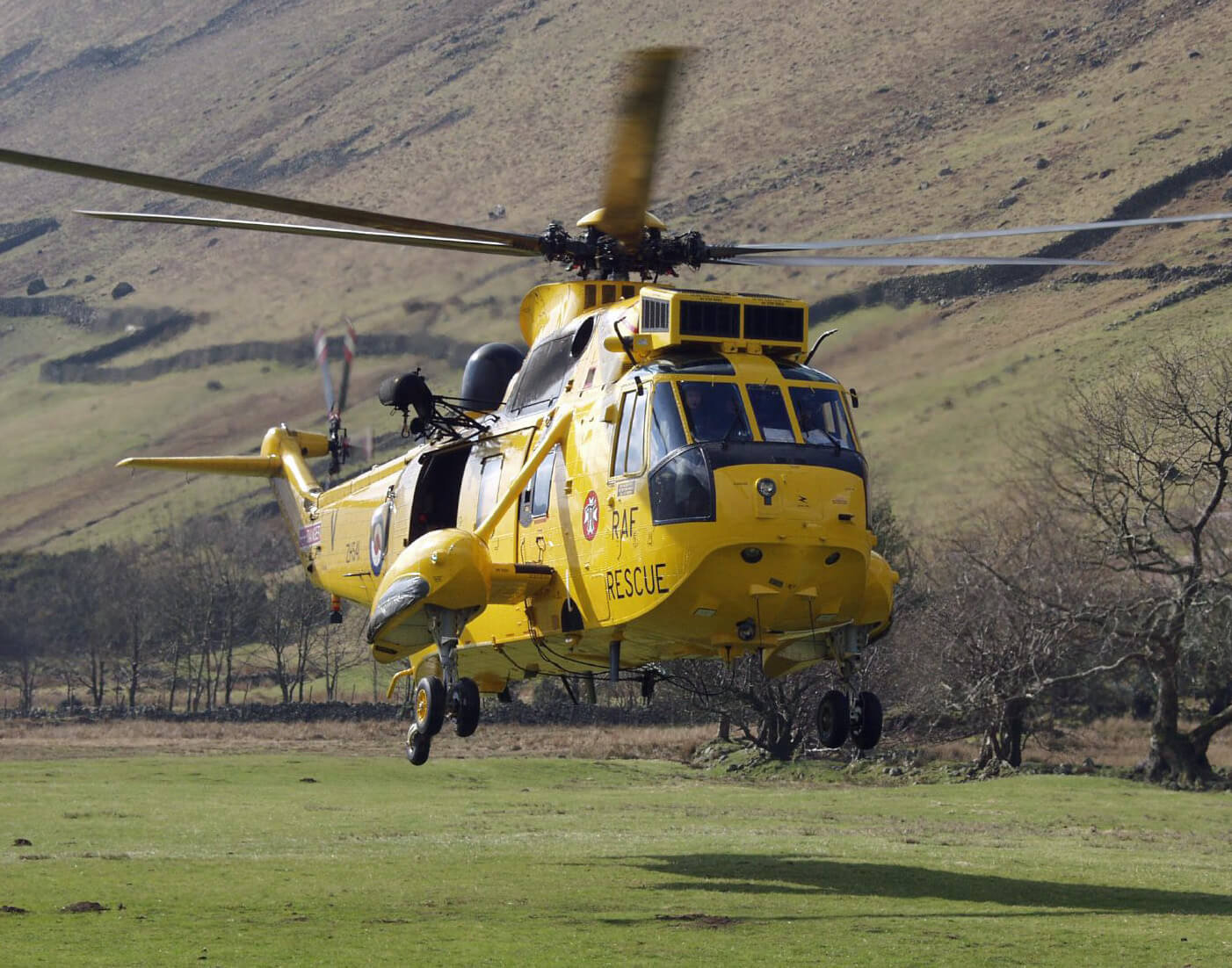 Here follows details of the 1834 incidents:
Here follows details of the 1834 incidents:
001 January 1st 10.35; Whiteside NY173220;
Very windy, dry;
Walking; Man (56);
Hat (red with green ribbon) blown off;
Retrieved from Gasgale Gill and returned;
Wasdale 2; 3 hours; Gannet SAR helicopter.
002 January 1st 11.15; Loadpot Hill NY457182;
Windy, light rain;
Strolling; Man (23);
Confused whether it was the minute hand or the hour hand of the compass that was painted red;
Advised by telephone;
Coniston 1; 14 minutes.
003 January 1st 13.15; Caw SD231945;
Windy, dry;
Ambling; Men (48, 52), Women (23, 49);
Found that they had forgotten to bring sugar for their tea;
Sugar delivered;
Duddon 2; 2 hours; Boulmer helicopter.
004 January 3rd 12.20; Great Calva NY291312;
Low cloud;
Striding; Men (32, 41);
Fighting after disagreement over location, CMS called by rest of group;
Order restored, no injuries (unless you count a bloody nose);
Keswick 5; 10 hours.
005 January 3rd 15.00; Latrigg NY275246;
Cloudy, rain;
Dawdling; Woman (76);
Distressed, confused, lost husband; Assisted back to hotel, had lost her husband a fortnight ago, card of condolence sent;
Keswick 2; 3 hours.
continued underleaf
Photo: Sea King in Wasdale
Away With the Councillors
It was like the first day of term at school. Everybody was excitedly chattering away to people they had been pleased to escape from for months. Diana brought them to order, as usual.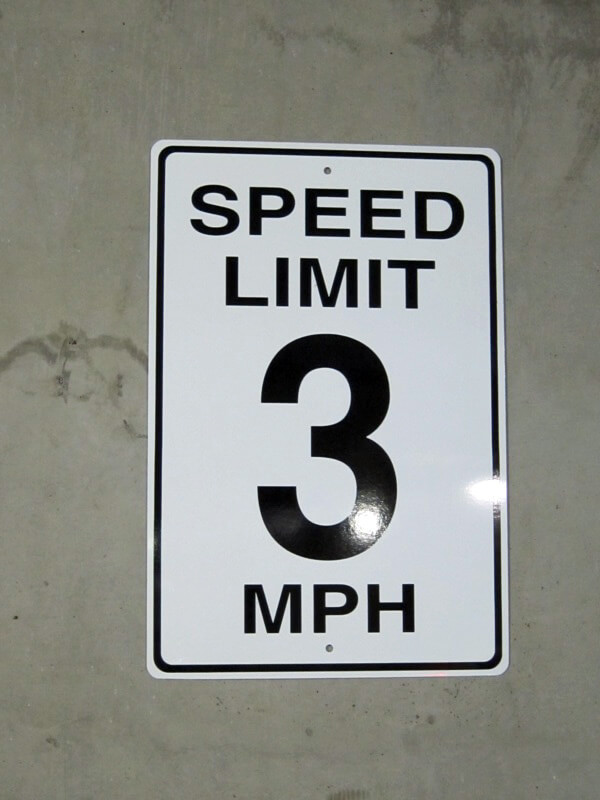 “Right, everyone, quieten down. Let’s get to work. This is our
annual away day, our one day of the year when we can put aside
our day-to-day problems, isolate ourselves from the real world, and
take a more strategic view ...”
“Right, everyone, quieten down. Let’s get to work. This is our
annual away day, our one day of the year when we can put aside
our day-to-day problems, isolate ourselves from the real world, and
take a more strategic view ...”
The Z-cars theme rang out from a mobile phone and someone clattered out of the room.
“... a time for lateral thinking, for pushing the box outside the envelope. In this first session, up till coffee time, we’ll look at Cumbria’s traffic problems. I’ve asked along Mr Dick Burrow, head of our Transport Services, to help keep our thinking on the straight and narrow, unlike our roads which are narrow but not straight. Dick, perhaps you could kick things off by saying what the problems are, as you see them”.
“He’s outside on his mobile” said someone.
“In that case” said Joss “I’ll say what the problems are: too many cars”.
“Thank you, Joss. Admirably succinct, as usual” said Diana. “Do you have a solution, too?”
“Yes, get rid of the cars” replied Joss.
“Well, since our surveys show that the average visitor spends three hours 23 minutes every day in a car and doesn’t move more than, on average, 147 metres from the car, I don’t think that’s really feasible, do you?” said Diana.
Harry intervened: “Let’s get into the spirit of this and freewheel a bit. Our roads were never intended for modern traffic and most of them cannot be widened or straightened. We can’t carry on pussyfooting around with a by-pass here and a new traffic light there. We need a bold vision: a plan of where we might be in twenty years time, so we can begin to work towards it. So let’s imagine that we did get rid of the cars, or, to be precise, that we restrict the roads of inner Cumbria to permit holders, that is, to a few special people, like us. How would we manage?”
“Well, I wouldn’t get all these fools stuck up my lane, so I’d manage fine” said Joss.
“But how would the visitors manage?” said Mary. “If they couldn’t drive themselves to Hilltop or Dove Cottage we’d have to provide shuttle buses or taxis”.
“Taxis. You know, I haven’t seen a taxi in Cumbria since 1983” mused Margaret. “We were invited to a wedding at Grange, and we thought we’d go on the Barrow train. But when we got there, we found out that the wedding was at Grange in Borrowdale not Grange-over-Sands, so, along with two dozen others, we had to hire a fleet of taxis to dash across the Lakes. We got there in time for the cake and champagne, which was the main thing. Lovely day”.
“Well, thank you, Margaret” said Diana “but let’s get back to our lateral thinking”.
“OK” said Mary. “We’d need shuttle buses and taxis to all the tourist spots. But we’d have to think where the buses would come from ...”
“Well” said Harry “my impression is that most visitors just like pootling around the lakes, stopping here and there for an ice-cream or a cup of tea or a photograph or an energetic amble to the nearest bench. So, we could have buses running from visitor parking places by the lakes”.
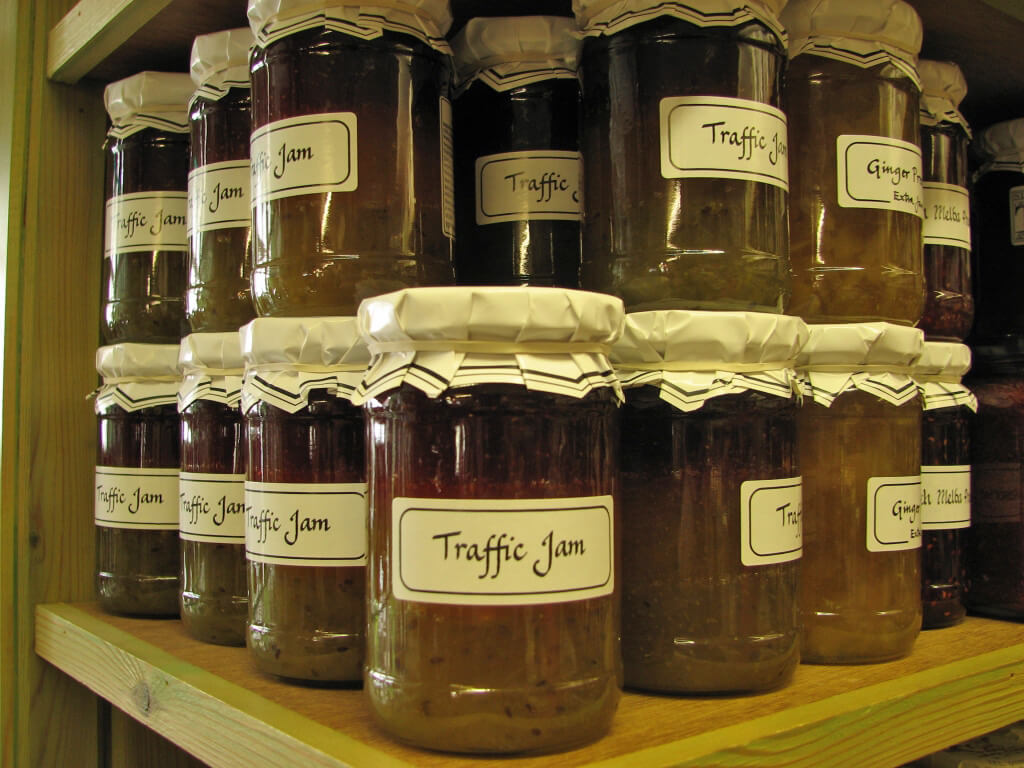 “Yes, I think it would be reasonable to allow visitors to drive
around the lakes” said Mary. “After all, that’s why they come.
Perhaps we should improve the roads around the lakes and ban
them from all the other roads”.
“Yes, I think it would be reasonable to allow visitors to drive
around the lakes” said Mary. “After all, that’s why they come.
Perhaps we should improve the roads around the lakes and ban
them from all the other roads”.
“OK. But we can’t widen the roads, so why don’t we make them one way?” said Harry. “Everyone would have to drive round the lake in a clockwise direction, say. After all, it’s not as though they’re trying to get anywhere particular”.
“Yes, I think we could manage that” said Sam. “Most of our lakes have some sort of road more or less round them already. I was in Switzerland in the summer and you should see what they do with the roads around lakes there. Motorways, underpasses and fly-overs round the lot of them. We wouldn’t need to go that far. A simple one-way road with lots of parking places is all we need”.
“Right” said Diana. “To summarise: we’d let visitors drive one-way around the lakes, where we’d have lots of parking, provide shuttle buses to tourist attractions, taxis to anywhere else, and leave the other roads for locals. Sounds good to me. Now, how do the visitors get to the lakes”.
“Well, I suppose we’d need some sort of ring road going around the bottom of the lakes - Pooley Bridge, Bassenthwaite, Santon Bridge, Ennerdale Bridge, Newby Bridge, and so on” said Harry.
“Like the M25 round London, you mean?”
“Yes, but better, as they would at least have some scenery to look at when they’re stuck in a jam”.
“Right, so we’d have a Cumbria Orbital, getting visitors smoothly round to the lake of their choice and out of our way” said Diana “and they’d leave the Orbital to drive round the lake, getting a shuttle bus to somewhere like Hilltop if they wished”.
Margaret, still in reflective mood, said “You know, I’ve been doodling a map of this ring road going round outside the lakes, with each lake having a one-way road around it, and do you know what it reminds me of? A pearl necklace, with the lakes being our pearls”.
“Thank you, Margaret” said Diana. “So that’s the answer, then, the Cumbria Necklace”.
Just then the door clattered open and Dick Burrow barged in. “Hello, Dick. Welcome, at last” said Diana. “I hope you don’t mind but we’ve pressed on. I think we’ve come up with a solution to all your problems. Show him, Margaret”. Margaret thrust her doodle into his hand.
“What’s this?” said Dick. “It looks like one of those medieval collars with spikes on them, used for garrotting”.
Photos: The present maximum speed on Cumbrian roads; Traffic jam, available at a shop in Hawkshead, made of gooseberry (at the bottom), apricot (in the middle) and raspberry (on top).
Mrs Mudderdale’s Diary (September 22)
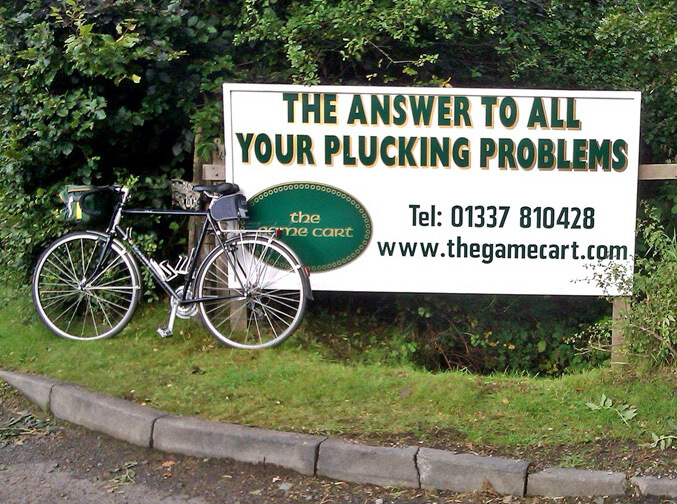 This morning I was gazing absent-mindedly out of the kitchen
window, admiring the view, as I rarely find time to do nowadays,
when I saw a smart car splash up the track. A man hopped out,
gathered a pile of letters and parcels from the boot, and strode up
to the door.
This morning I was gazing absent-mindedly out of the kitchen
window, admiring the view, as I rarely find time to do nowadays,
when I saw a smart car splash up the track. A man hopped out,
gathered a pile of letters and parcels from the boot, and strode up
to the door.
“Mrs Mudderdale? I believe these are yours” he said, looking as pleased as punch (note: check if that needs a capital P). He plonked them on the kitchen table. I wondered what had happened to the regular postie, but even on a bad day he never brings a pile like this.
I looked at them. They were all for “Tom Udderdale”, with the addresses all garbled.
“Yes, I am Tom Udderdale” he beamed. I was bemused. So he went on “I was reading the Courier with my Sunday tea when I noticed that Tom Mudderdale of Raddle Bridge Farm had won the best-looking sheep prize at the Cumberland Show ...”.
Yes, he had. But the paper didn’t say that Tom was the only entrant this year. Sheep know where they are on their own fells. Whisk them off to Torver or wherever for the Show and they are disorientated for a month. After the trouble with Joe Greene’s sheep last year, the others didn’t think the prize worth the bother. But Tom likes perming his sheep.
“... assumed they must have been intended for your Tom. I was puzzled by all these bills for sheep dip, the documents about bio-security, the pheasant-plucking machine, ...”.
The pheasant-plucking machine! I’d rung about that a few times but they insisted they’d posted it and refused to send another one. I wonder if it does ducks, geese and chickens too. I hate the job, but Tom always says “I kill ‘em, you pluck ‘em”.
“... Post Office must have guessed they were for me. I did try some of the equipment” he admitted sheepishly (though not like any sheep of ours) “but I couldn’t find a use for them. So they’re all yours”.
Well, of course, I had to thank him with a cup of tea. He was just about to be off when I remembered ... all those strange letters and parcels we’d received. The contents had made me blush. I wanted to burn them but Tom said we’d best hang on to them for a while, just in case. I found them in the study (well, we call it a study, but there’s only the computer and a couple of books there). They’d got a bit grubby somehow.
Tom Udderdale was so pleased. He gave me a great hug. And then I thought about what was in his letters and parcels, realised that my Tom probably wouldn’t be back for hours, and quickly extricated myself, saying “Excuse me, lots of pheasants to pluck”. I left him to find his own way out. If that’s what they get up to in a big city like Keswick I think we’re better off here at Raddle Bridge.
Four Men in Their Boots, Day 11
... Wasdale Head ...
We were surprisingly quiet at breakfast, considering that we had just enjoyed a mountain walking day that could not be surpassed. Perhaps that was the problem. We realised that the best was over. From now on it was mainly a matter of completing our commitment, to walk on to Windermere. Harry was late joining us for breakfast, and when he did so he was strangely taciturn. He averted his gaze from us. When, at last, I managed to catch his eye I saw that his nose was badly bruised.I looked at Richard; Richard looked at Thomas; Thomas looked at me. We all looked at Harry. Nobody said anything. Could it be? Surely not. But things were beginning to make sense. As the realisation sank in, I felt the urge to punch his nose again but this was no longer a dream. Instead, I continued not to speak to him.
The day ahead was a simple one. We were to complete the Mosedale Horseshoe, which meant that we did not have to carry all our gear with us. Or rather, the day would have been simple if the clouds were not halfway down the mountains. It is one of the delights of the Lake District that the weather on one day bears little relation to the weather on the next day. Yesterday, it was clear, blue sky; today, we could not see the sky at all. The basin of Mosedale was completely enclosed by dark, foreboding mountains cut off below their prime.
As we set off alongside Mosedale Beck Harry loitered far behind. He found it difficult to do so because our progress was halted every few yards by Richard, who wanted to study a wheatear ahead of us with his binoculars and to take many photographs of it. The wheatear was a perky companion, settling by the path about ten yards ahead of us and, once Richard had completed his studies, flying on ahead as we approached. It was as if it was showing us the path forward.
Fascinating though a wheatear may be, it grew increasingly frustrating to have to stand and wait while Richard completed his operations (and Harry feigned some reason to linger behind us). Eventually, Thomas and I found a side-path that enabled us to detour ahead of Richard and up towards the Black Sail Pass.
... Black Sail Pass ...
As we walked along, Thomas explained Richard’s deep interest in bird-watching, which I had not previously been aware of. As a youth, Richard had become seriously addicted to birds. He became besotted with rare, exotic, vagrant birds and at the slightest whisper that such a bird had arrived in the UK he would be off on his motor-bike to spot it. He developed a reputation as a bird photographer, a skill which it takes many years of patient practice to perfect.He got to know all the leading British ornithologists and, over the years, he began to find this strange set of men (and a few women) even more fascinating than the birds. They had the most peculiar habits and customs. He began to take photographs of the bird-watchers rather than the birds. He became a bird-watcher-watcher.
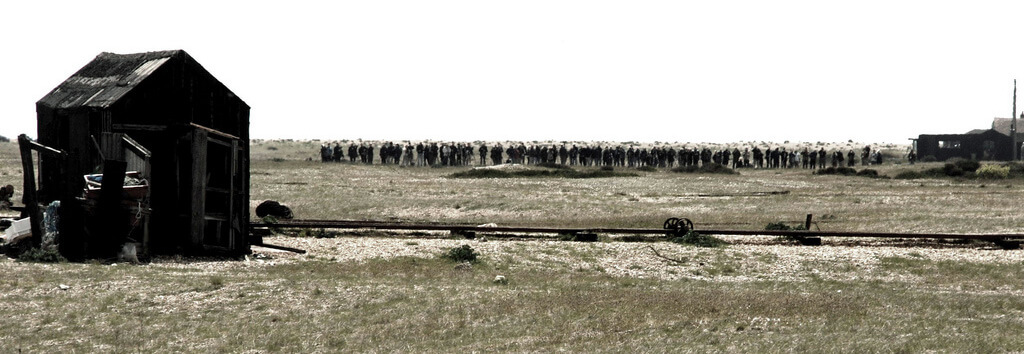 The bird-watchers didn’t mind too much. They were
generally too engrossed in their birds to notice what Richard
was up to. Richard, however, began to feel that there just
weren’t enough opportunities for his bird-watcher-watching.
And they were often many hundreds of miles away, on the
Scilly Isles or in the Orkneys, for example, and by the time he
arrived the bird-watchers, as well as the birds, had flown.
The bird-watchers didn’t mind too much. They were
generally too engrossed in their birds to notice what Richard
was up to. Richard, however, began to feel that there just
weren’t enough opportunities for his bird-watcher-watching.
And they were often many hundreds of miles away, on the
Scilly Isles or in the Orkneys, for example, and by the time he
arrived the bird-watchers, as well as the birds, had flown.
So Richard began to spread ‘whispers’ of his own, that a particular rare bird had been spotted at some location convenient to him. He set himself up there in advance, so that he could take photographs of the bird-watchers as they arrived and set about their bird-watching rituals.
Eventually and inevitably, Richard was rumbled. He was banished in disgrace. Since that day, Richard has never gone bird-watcher-watching or even bird-watching. He does, however, retain a deep interest in birds. It’s just that nowadays the birds have to come to him. He has no interest in building up a long tick-list of seen birds. He prefers to study in depth the behaviour of the individual birds that he sees in his own garden. He maintains meticulous records for every single bird, all of which he comes to consider a personal friend. By the time we reached Black Sail Pass he had gained a wheatear as a friend.
... Pillar ...
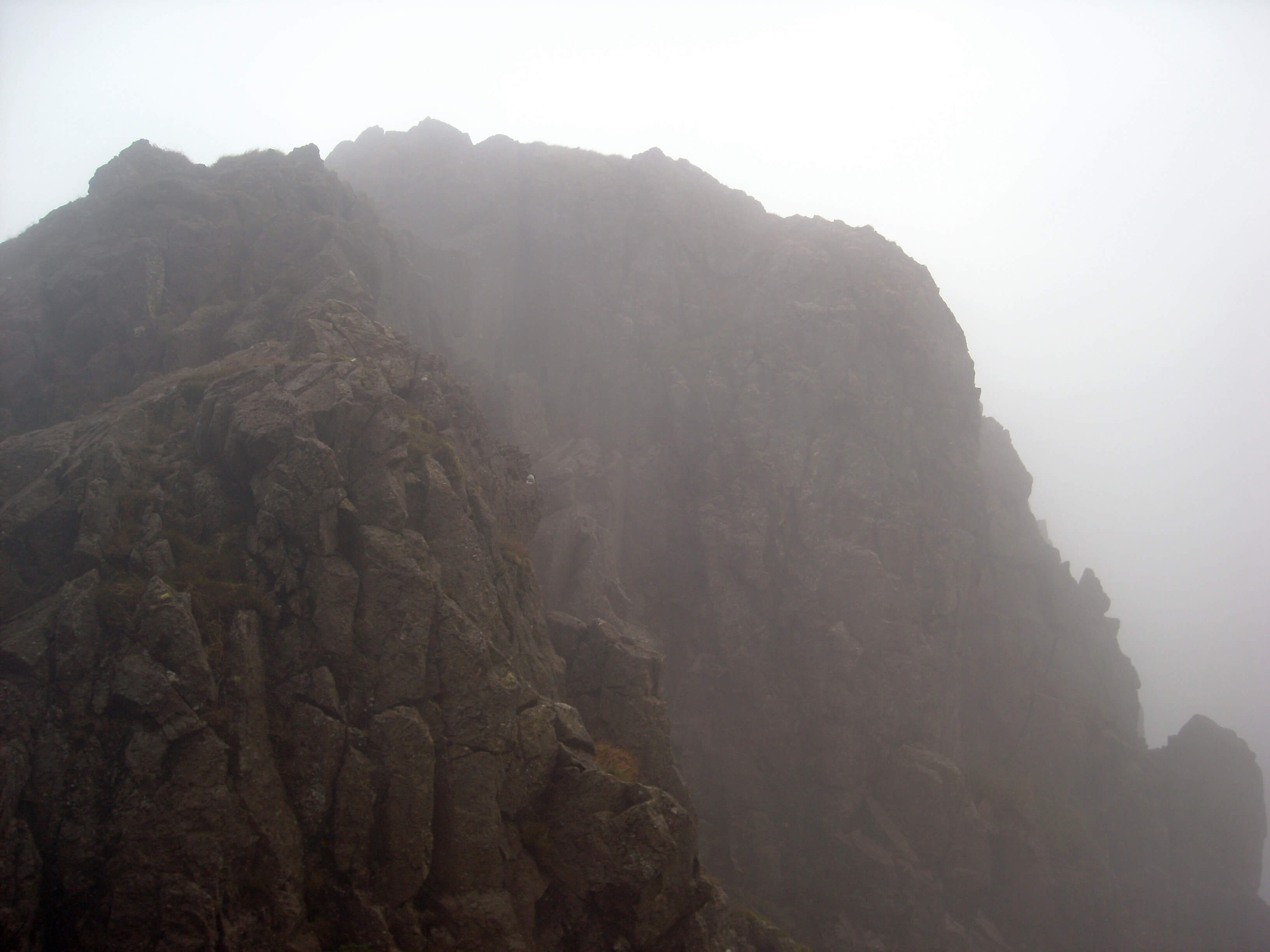 We waited in the cloud at the crest of the pass. I didn’t want
a repeat of the Fairfield fiasco. Then, however, the cloud was
stationary, forming a thick mist. Here, it was swirling about,
providing fleeting glimpses into the distance. It was like a
thick, breezy drizzle.
We waited in the cloud at the crest of the pass. I didn’t want
a repeat of the Fairfield fiasco. Then, however, the cloud was
stationary, forming a thick mist. Here, it was swirling about,
providing fleeting glimpses into the distance. It was like a
thick, breezy drizzle.
It then struck me that Harry had allowed me to be wracked with guilt at my irresponsible leadership in letting him get lost on the way to Fairfield, when in fact the incident was entirely due to him surreptitiously tweeting his followers. And I remembered that incident at the Black Sail Hut a few days ago when I was made a subject of ridicule. The bastard! I felt like losing him again, if I had the chance.
When the three had at last gathered, I ostentatiously manipulated the map and compass, for I wanted them to appreciate the mastery with which I tackled these difficult conditions. In due course, I led them up the broad slope of Pillar but that, I felt, would not provide a worthy challenge, so I soon took them off onto the side path to Robinson’s Cairn.
Needless to say, they had no idea who Robinson is or was, so I enlightened them. John Robinson was a local man who was part of the first rock-climbing fraternity. As the cairn’s plaque says “he knew and loved as none other, these his native crags and fells” - particularly the massive pinnacle of Pillar Rock, which we were approaching.
I am sure, however, that I myself would have been more at ease with most of his co-climbers than with John Robinson, who was, no doubt, a rough local fellow. They were civilised men, like professors, who regarded rock-climbing as an academic challenge to their modest courage. If by some mishap one was left dangling by their finger-tips over some precipice he was liable to utter mild imprecations in Greek, with some apt quotation from Homer.
One particular pioneer, Walter Haskett-Smith (I always feel that a man’s worth is proportional to the number of hyphens in his name +1 (the +1 is because I wouldn’t wish to imply that a hyphenless man is worthless)) considered that ‘artificial aids’ such as ropes, spikes and ladders should not be used because they were “a means by which bad climbers were enabled to go where none but the best climbers had any business to be”.
I know exactly what he means. Although I haven’t given rock-climbing the benefit of my expertise, I often feel the same when walking the Lakeland fells. These are places that only the best fell-walkers have any business to be. I also approve of their diffident descriptions of their dangerous and difficult exploits, a tradition that continues to this day in the British ranking grades for the severity of rock-climbs, from ‘a doddle’ (actually, a real challenge) to ‘a trifle tricky’ (impossibly severe).
The path to Robinson’s Cairn was narrow and exposed. The occasional glimpses of the cliffs nearby induced some trepidation in my colleagues. As we moved up a rock ridge and across some scree, fearsome visions of Pillar Rock itself reared ahead. I pointed out the steep cliffs and Walker’s Gully, so named because a man named Walker had fallen to his death there. This did not reassure them, as I anticipated. I sensed that they feared that I was leading them up Pillar Rock itself, a misconception that I was content to let lie. The face of Pillar Rock loomed ahead, appearing to block our way. We clambered up a traverse, with the head of the pinnacle to our right. Only then did I indicate the steep path up to the left.
We soon reached the top of Pillar, where I paused for lunch and to give my team the chance to express everlasting gratitude for saving them from the extreme dangers of Pillar Rock. The rest of the walk passed uneventfully. As we dropped down to Wind Gap the cloud began to lift and by the time we reached Yewbarrow we could see late afternoon sunshine casting shadows over the magnificent valley of Wasdale.
Photos: Bird-watcher-watching: bird-watchers in ‘action’; A glimpse of Pillar Rock as the cloud briefly lifted.
Cumbrian Weather: Another Book for Offcomers
Cumbrian Weather: A Psychosociohistorical Study, by Jeremy Winder (Keswickian Press, £24.99), 378 pages with innumerable tables, charts, diagrams, figures, photographs and maps (and quite a few words).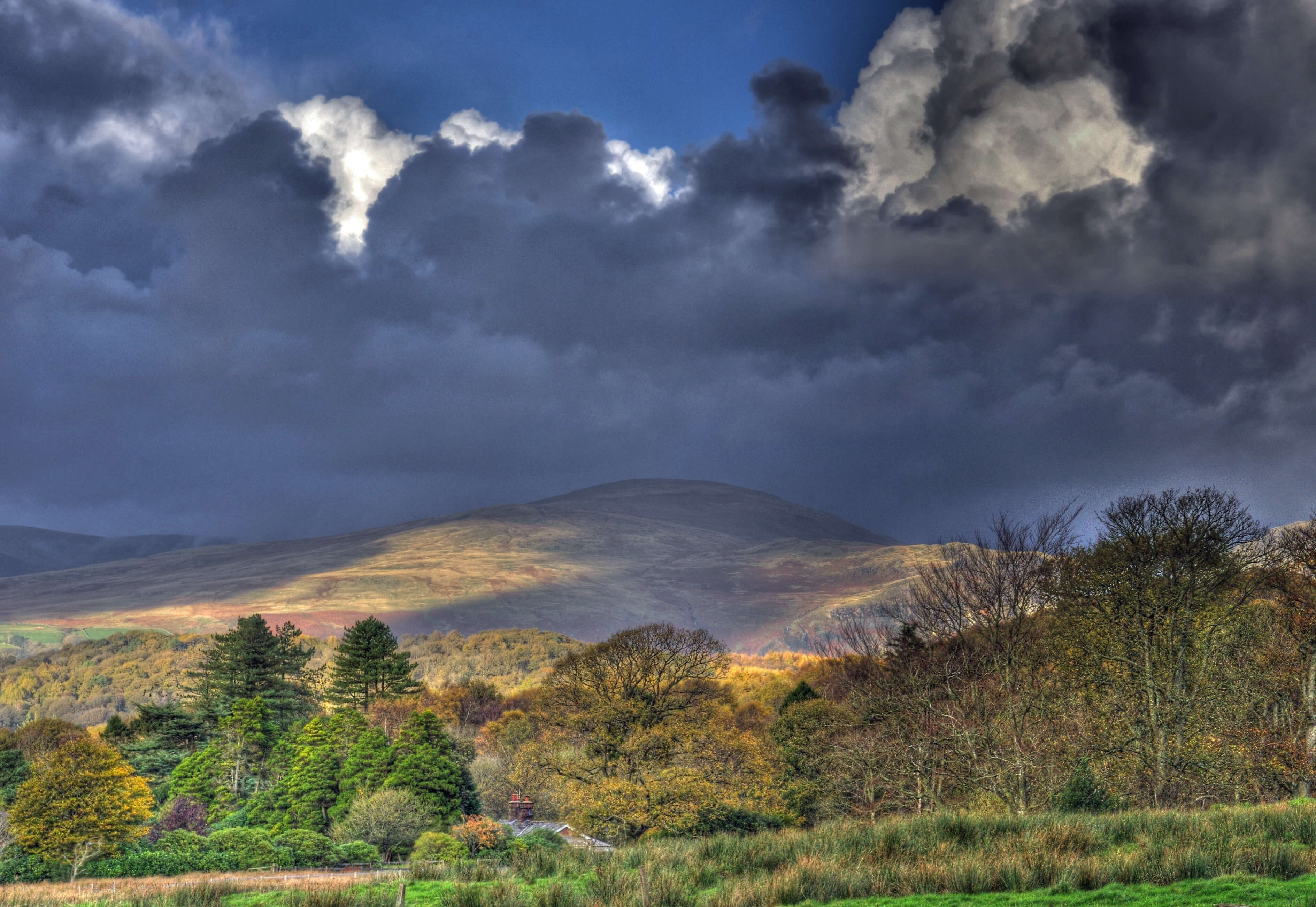
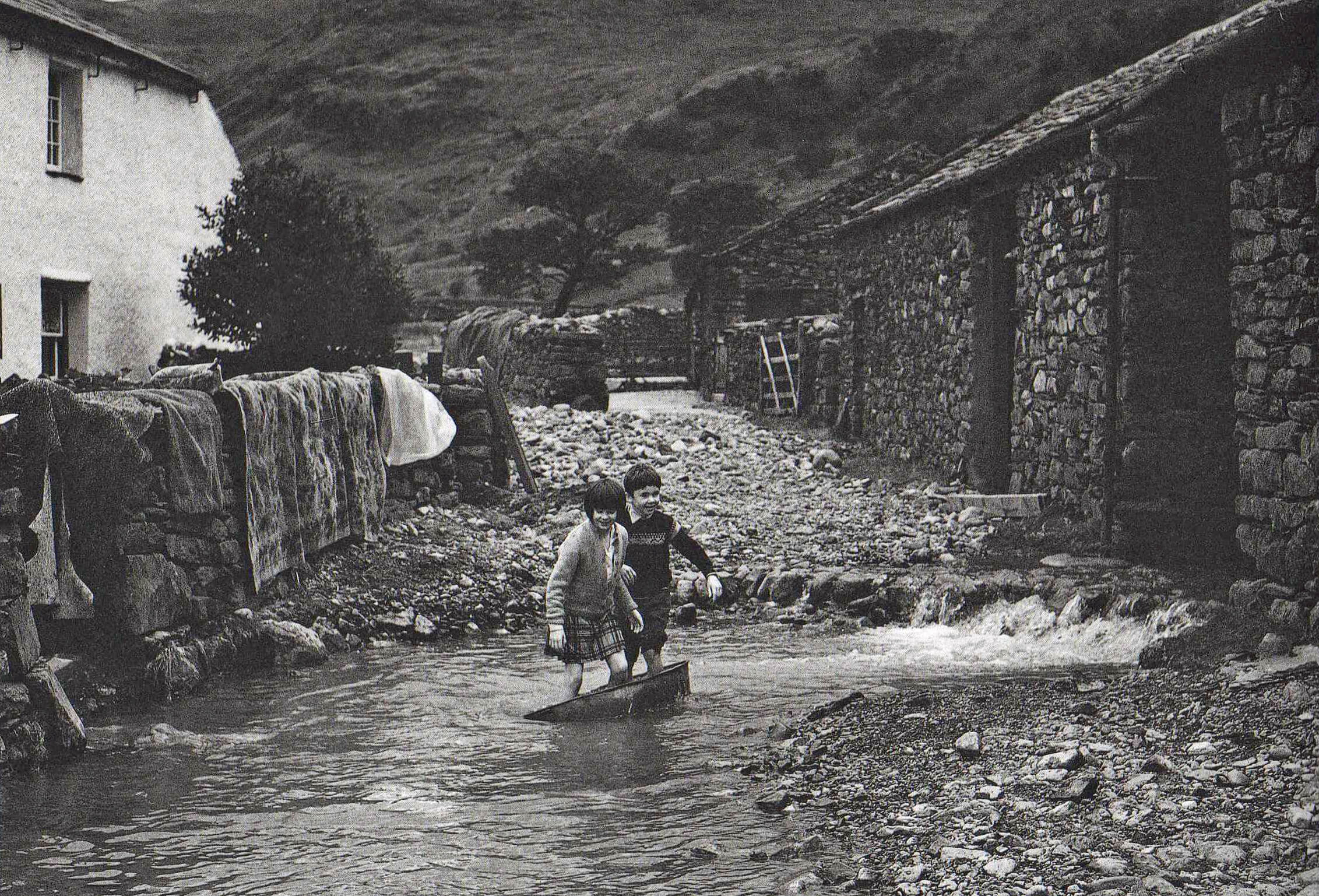 Gaining admission to the fine county of Cumbria is only the
first step on the long and treacherous road to assimilation. The
natives are rightly wary of aliens from places such as Letchworth
and Worksop. It requires extensive study and careful application to
begin to gain acceptance. This in-depth monograph on Cumbrian
weather should prove more than useful.
Gaining admission to the fine county of Cumbria is only the
first step on the long and treacherous road to assimilation. The
natives are rightly wary of aliens from places such as Letchworth
and Worksop. It requires extensive study and careful application to
begin to gain acceptance. This in-depth monograph on Cumbrian
weather should prove more than useful.
Cumbria has 35% more weather than any other English county and the natives are proud of all of it. In your first two or three decades in the county do not offend the natives by pretending more familiarity with the weather than you have. Do not, for example, refer to the Great Deluge of 1966 because the natives will know that you did not directly experience it: they will dismiss you as an ingratiating ingrate. Just say “a bit nippy today” or “at least it’s not raining as hard as yesterday” or “they say it’ll stop snowing tomorrow”, as appropriate.
Eventually, however, you will be able to employ the voluminous facts provided by Cumbrian Weather. For example, you might manage something like the following:
Neighbour: A bit wet today, Jim.
You: Sure is, but not as wet as forty years ago today.
Neighbour: Really? What happened then?
You: That was the day of the Great Deluge of 1966, when five inches of rain fell in half an hour and old Mrs Hargreaves at High Dudgeon had two barns washed away.
Neighbour: Oh, yes. I remember. And Fred Brisket’s horse was buried under an avalanche of mud.
And so on and so forth. Of course, you can only carry this off if you’ve been around long enough for your neighbour to have forgotten that you weren’t here for the Great Deluge. Emboldened by this triumph, you can then move on to the really fascinating parts of Jeremy Winder’s study of the impact of the weather on Cumbrian life and psyche. His general point is that, for Cumbrians, weather does not just happen: it has a meaning and a purpose. You can integrate this philosophical insight into your exchanges. For example:
 Neighbour: Not doing too well in the Test Match, eh, Jim.
Neighbour: Not doing too well in the Test Match, eh, Jim.
You: Aye. And it’s all our fault.
Neighbour: Our fault? What do you mean?
You: Well, there’s never been a Cumbrian test cricketer.
Neighbour: Really? Why’s that then?
You: Partly because there are only three places flat enough for a cricket pitch. But really because of the weather. Did you know that in summer, in the hours we could be playing cricket, it is raining 43% of the time. And when it’s not raining the pitch is still waterlogged for another 26% of the time. So really it’s not worth the bother of putting the pads on. Mind you, if we Cumbrians had stood in a field all day long we wouldn’t have got on with more important things, such as ...
And on and on and on. I have paraphrased this monologue in order to fit it within the confines of this column, but, after a thorough study of Jeremy Winder’s book, you could easily extend it to last an hour or two. Take care, however, for although Cumbrians love their weather they hate a smart-arse. But at least at the end of it you will feel like a real Cumbrian, especially if it is raining and you are soaked through.
Photos: More Cumbrian weather on the way; Seathwaite Farm in Borrowdale after the Great Deluge of 1966, when they had to live upstairs for seven months while downstairs dried out; A car that says "Kendal's professional cricketer Ross McMillan" on its side.
The Loneliness of the Long-Distance Fell-Runner
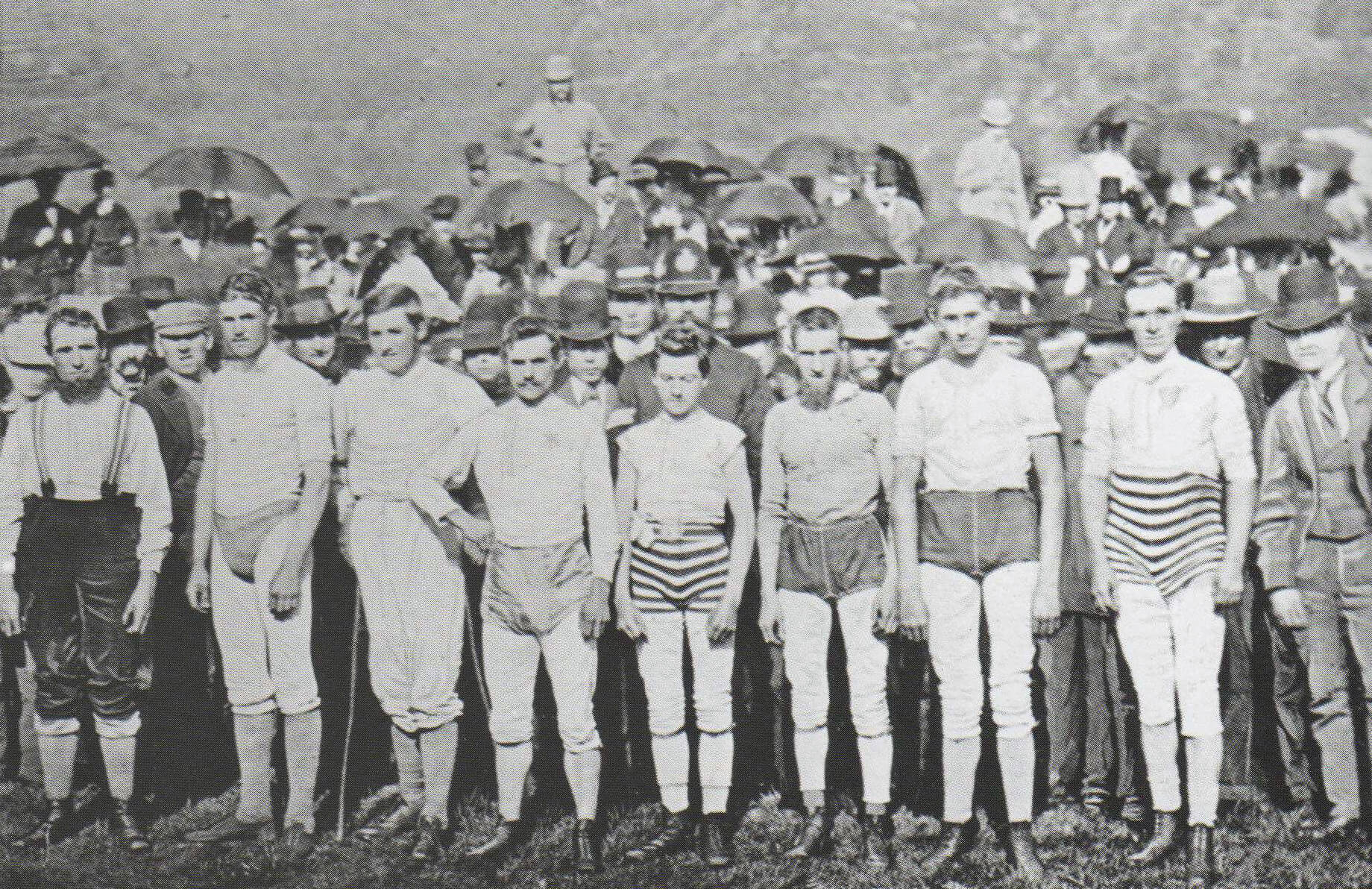 “Hi, Joe, how’s things?”
“Hi, Joe, how’s things?”
“Bit of a niggle in the groin. Hope it’s ok”.
“Hello, Jimmy, alright?”
“Had a touch of flu. Coughing all night”.
“Bill, good to see you. How’s it going?”
“Ankle’s still hurting. I’ll see how it goes”.
Bob had heard it all before. Many times. He didn’t believe a word of it. If you did you’d think you were among the largest group of invalids in the country. In fact, they were about to run for three hours up and down craggy mountains. Nobody asked Bob how he felt. They knew he’d say “Great, raring to go”. Because he was, and they knew it. Bob wouldn’t need excuses afterwards.
Bob knew nearly all of them, and they certainly all knew him, or, rather, knew of him. Every two weeks, rain or snow, the same bedraggled group turned up at the foot of some mountain. They never said much. Ever. To anyone. The men all looked like they strangled chickens for a living; the women all looked like strangled chickens. Their skin, what little we could see of it, was red raw, weather-flailed from running around in driving sleet. They milled about near the starting line, like horses at the start of the Grand National.
The race always began with a ferocious sprint. Twenty miles to go, but you had to get to that narrow gate across the field first. After that, overtaking would be as hard as in the Monaco Grand Prix. Bob had a unique running style, easily identifiable at the head of the pack as it disappeared into the clouds, and then re-emerged three hours later. Uphill, he ran with his head between his knees. He didn’t need to look where he was going: he knew the tracks better than his own back garden. Downhill, his four limbs operated independently. Legs flew in all directions, fleetingly touching rocks; arms shot out wherever necessary for balance. Anybody nearby risked serious injury. But there never was anybody nearby.
“Hi, Joe, how’d it go?”
“Alright till Great Grimace, and then the groin starting playing up”.
“And you, Jimmy?”
“Didn’t have any puff today”.
“How’d you get on, Bill?”
“OK, but I had to go a bit carefully with my ankle ... But what happened to you, Bob?”
“Well, as I came into the field at the end, I tripped over a sheep. I hobbled to the finishing line but they thought I should be checked at the hospital. The nurses are very nice. They say they’ve never seen legs like mine before. Well, they can’t see that one now, now it’s in plaster. But it’s great to see you guys. It’s really good of you to come here. Shouldn’t you be getting home to your wives and kids? ... Do you actually have wives and kids?”
And after chatting for three hours, they were all the best of friends.
Photos: The start of the Ennerdale Horseshoe fell race (Bob is fourth from the right. PC Penistone, in the second row, came third. Women runners often ran with their umbrellas, which could be a considerable advantage in windy conditions.)
Barking up the Wrong Tree
An Email from the Editor of the CourierAt 13:44 3/10/2006, you wrote:
Greetings from an American cousin!
If you are a cousin of mine you are far removed! But greetings in return.
I am mailing to ask you and your readers for help in tracking down my ancestors. I have managed to work out a complete family tree back five generations, that is, to my 32 great-great-great-grandparents. 31 of these were worthless vagabonds, crooks and ne’er-do-wells. It follows that all my genes are inherited from the 32nd great-great-great-grandparent, Jeremiah Garfield-Grigg, who hailed from Cumberland. Have you heard of him?
No, I’m afraid not.
Don’t be misled by the Garfield, by the way. It was the custom for immigrants without a middle name to invent an impressive new one, to help make a better start in the New World. When he set off for the United States in 1889 he was a plain Jeremiah Grigg.
Still never heard of him, sorry.
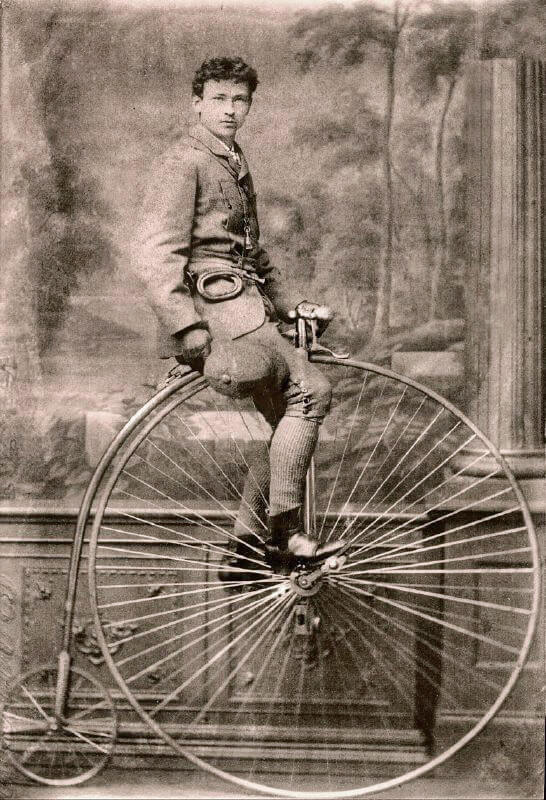
 He hyphenated the Garfield when he set up Garfield-Grigg’s
Guns, or GG Guns, as it became known throughout America.
He made millions manufacturing bespoke blunderbusses from
the spokes of recycled penny-farthings. He was, by all
accounts, a warm, generous man of great energy and wisdom.
I am his sole living descendant, and I have inherited his vast
fortune as well as his genes!
He hyphenated the Garfield when he set up Garfield-Grigg’s
Guns, or GG Guns, as it became known throughout America.
He made millions manufacturing bespoke blunderbusses from
the spokes of recycled penny-farthings. He was, by all
accounts, a warm, generous man of great energy and wisdom.
I am his sole living descendant, and I have inherited his vast
fortune as well as his genes!
Congratulations indeed!
I am trying to find out more about the Grigg family and the circumstances of Jeremiah Grigg’s emigration. The Griggs are, I understand, from Greygarthwaitedale, which I’m told is pronounced ‘Grdl’.
Yes, but do you pronounce ‘Grdl’ how we pronounce ‘Grdl’?
I have spent many hours searching through on-line databases of censuses and church archives back to the 17th century but it is hard to make sense of them. All the Griggs had about a dozen children (must be the long, rainy nights), about half of whom immediately disappear (die, I suppose). They all seem to marry relatives, some of whom are also called Grigg. And Grigg is sometimes spelled Grig, Greg, Gregg or even Grogg. Are there any Griggs about nowadays?
Yes, they often appear in the Courier, in the court proceedings. There is still an enclave of them in Greygarthwaitedale, a disgrace to the region. They live on turnips and tourists.
If so, I expect that, being from the same stock as Jeremiah Garfield-Grigg, they are all senators and lords (or ladies) now.
Sinners and layabouts, more like.
I have found an on-line microfiche of the Cumberland Courier dated April 22nd 1889. This has a brief enigmatic item entitled ‘Grigg Case Suspended’. Do your files have any further information on this?
I have just spent a few hours consulting the files and, yes, here I can help you. The report to which you refer was brief probably because the case involved scandalous matters concerning Sir Digby Denvers, the then owner of the Courier. There’s stuff in those files that my predecessor editor would never have dared to print! To cut a long story short: George Grigg (Jeremiah’s father) was a gamekeeper on the Denvers estate at Satterthwaite. Jeremiah, then 15, shot Sir Digby with George’s blunderbuss after finding him ‘dallying with’ his sister Mollie, then 13. George was charged. Jeremiah and Mollie ran off, taking all the Grigg’s money (about £300, a large amount in those days). They drowned crossing Morecambe Bay (or so it was believed at the time). George hanged himself in prison. Martha, the wife, became deranged. The remaining children were left motherless, fatherless, Jeremiahless, Mollieless and penniless.
I would be very grateful if you would put something in the Courier to help me track down my relatives, past and present.
Certainly. I will serialise this melodrama over the next ten weeks. It has everything: class, sex, money, trauma, death. Circulation will increase no end. Thank you for bringing it to my attention. By the way, do you know what happened to little Mollie? I am sure our readers would like to know.
Could you give me the addresses of any present Griggs. I am so much looking forward to becoming part of the English nobility!
Of course. I am sure that they will be delighted to hear from you. That £300, with inflation and interest since 1889, will yield them a fortune, not as vast as yours no doubt but adequate perhaps to help them towards the nobility you desire.
Thank you. Eleanor Garfield-Grigg
You’re welcome.
Photos: This is believed to be Jeremiah Garfield-Grigg on a penny-farthing similar to those he converted into blunderbusses, a fine example of which, showing the artistry for which GG Guns was renowned, is shown to the right.
Four Men in Their Boots, Day 12
... Wasdale Head ...
At last I had them where I wanted them: completely in thrall to my supreme fell-craft. After I had single-handedly saved them from the perils of Pillar Rock, I would no longer have the irritation of my authority being challenged. I could not yet avoid the irritation of their company. Harry, of course, was persona non grata to us all after the revelation of his walking for charity. Richard’s pernickety ways were increasingly getting on my nerves. I strive for perfection too - and often achieve it - but I feel that fell-walking requires a certain amount of adaptive give-and-take. And Thomas was increasingly belly-aching at the continuing lack of the gourmet food to which he was accustomed.Mentally I had their measure now - and physically too. While I felt that I was only now getting into my stride, the others found more and more to complain about. Blisters, sore ankles, bad backs, dodgy knees. They had only a few more days of pain and misery, so I didn’t sympathise.
I resolved not to take advantage of their misfortunes. Victory was in sight but I must be magnanimous. I decided, for example, to spare them the terrors (to them) of Lord’s Rake in reaching our first objective of Scafell. Instead, we would walk up the broad flank above Burnmoor Tarn, safe but dull though it is to a seasoned fellwalker like myself.
As we set off along the path that leads to the tarn we caught up an elderly couple who were walking a dog. Caninology is one of the few subjects upon which I am not an expert. I cannot tell one breed of dog from another. I think, however, that I can safely call this dog a ‘pooch’. It was an overly cute, dainty dog, quite unsuited to fell-walking.
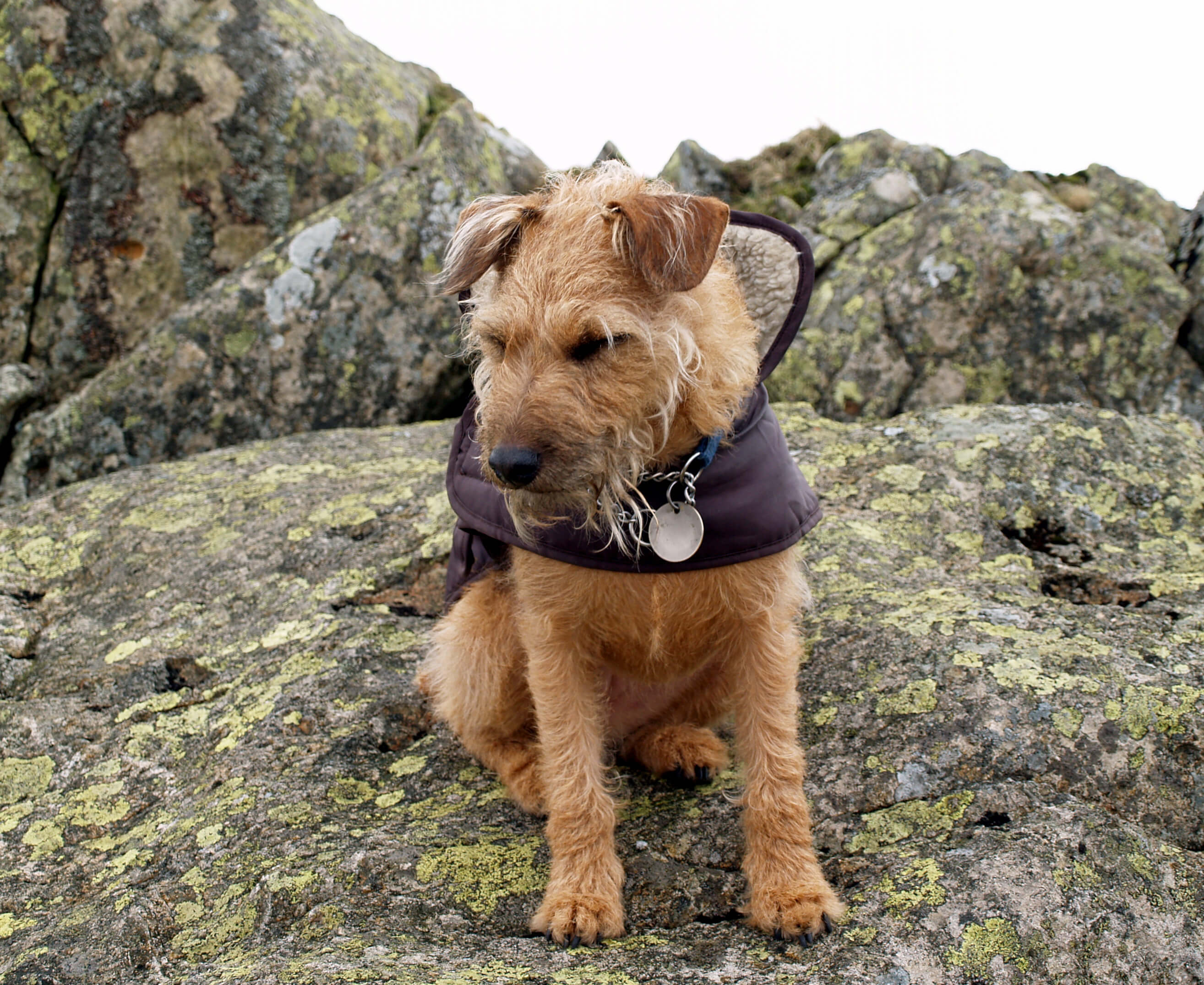 Harry soon fell in with them, as is his custom. At least, he
fell in with the woman and the pooch. The man - no doubt,
the husband, as he was silent from decades of practice - kept
apart. The woman was remarkably jovial and chatty, and was
delighted to regale Harry with details of the pooch’s history,
nature, customs, and so on. The pooch itself bounded happily
about the path. I was hardly listening but even I couldn’t help
feeling that it was a fine dog indeed.
Harry soon fell in with them, as is his custom. At least, he
fell in with the woman and the pooch. The man - no doubt,
the husband, as he was silent from decades of practice - kept
apart. The woman was remarkably jovial and chatty, and was
delighted to regale Harry with details of the pooch’s history,
nature, customs, and so on. The pooch itself bounded happily
about the path. I was hardly listening but even I couldn’t help
feeling that it was a fine dog indeed.
And then it bit Harry. He had absent-mindedly reached out and the pooch had clamped its teeth around a finger. It was yanked off the ground as Harry tried to shake his finger free. Harry, naturally, let forth a stream of swearwords. I assumed that the woman, a dignified lady, would be quite offended but as soon as she had the opportunity she replied in kind. If I may censor her response, the gist of it was that it served Harry right: the poor dog was understandably alarmed by the hideous purple-pink outfit. I had become accustomed to it by now but I felt that she had a point.
Meanwhile, Richard leapt into action. This was the moment he had come prepared for. A real emergency, at last. He rummaged in his vast backpack and soon found his first-aid kit and immediately attended to the wound. While the argument raged between Harry and the woman, the husband continued to stand apart. He looked over to the depths of Wastwater, perhaps reflecting that he wouldn’t be the first to drop a wife there. I joined him, but I didn’t interrupt his profound thoughts.
As we ignored the argument, a noise gradually intruded upon our thoughts. A farmhand, shouting, was racing a buggy up the track. In this commotion, we had forgotten the pooch. Then I saw it, way up the fell, racing around, yapping at the heels of the Herdwicks. Hardy sheep though they are, they are not used to sheepdogs gathering them up in such a fashion and as a result they were careering headlong down the slope.
The buggy stopped and, without a pause, the farmhand raised a rifle and shot the dog. The argument abruptly stopped. He drove up to collect the corpse and returned to us. “Was this yours?” he said. The woman began to swear at him and he swung round to her, brandishing his rifle and I thought for a brief moment that he was going to shoot her as well. The husband became alert with anticipation. But he just dropped the dog at her feet and drove off, muttering, with some pride it seemed, “Twenty-three this year”.
... Scafell ...
I got the team moving up the Green How flank. We made steady progress but I noticed that Richard had extricated one of those little books from his backpack, as he often did, and was perturbed about something. So I asked him and he said “According to Wainwright, this route ‘is as much out of fashion as the Victorians who favoured it’.”“Well, so what?” I said. It was as though we were not allowed to walk somewhere without Wainwright’s approval. “Do you want to get stuck in Lord’s Rake? Do you want to climb Broad Stand? Do you want to walk through Mickledore to Foxes Tarn and up the other side?”
He didn’t. We continued to Scafell where we did not linger but pressed on down the fine ridge to Slight Side. As we dropped down from Slight Side I began a lecture about the Hard Knott Roman camp that we were approaching: AD 120; Mediobogdum; 100 yards square; 500 soldiers; cohort of Dalmatians; between Ambleside and Ravenglass camps; 5 feet thick wall; earth embankment; abandoned by AD 400. I felt it my duty to enlighten my colleagues as we went along.
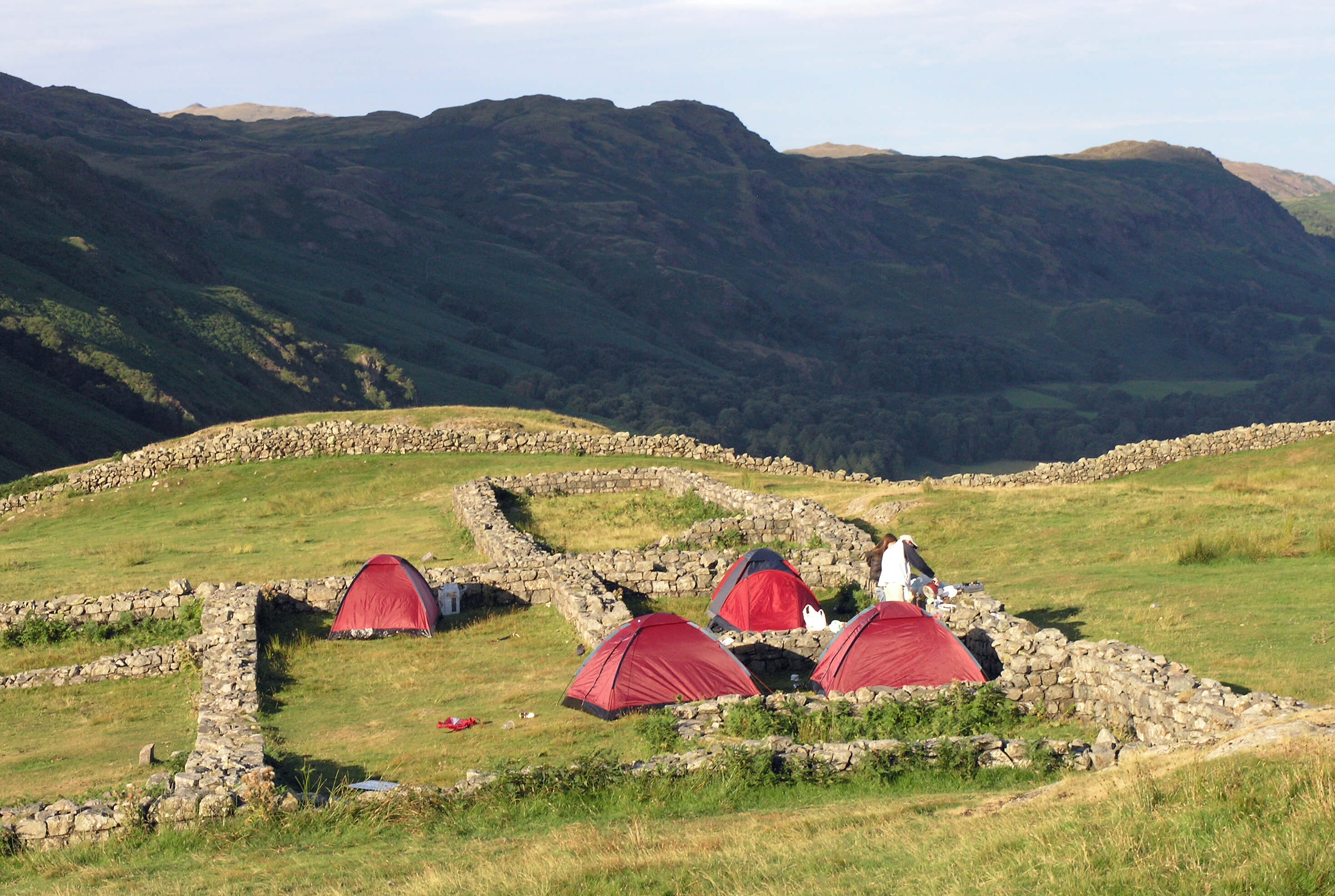 Every so often Richard would pause and study the camp
ahead with his binoculars. All these little stops were quite anoying,
so I asked him what the problem was this time. He said
“Well, it looks like the Romans are still there.”
Every so often Richard would pause and study the camp
ahead with his binoculars. All these little stops were quite anoying,
so I asked him what the problem was this time. He said
“Well, it looks like the Romans are still there.”
... Hard Knott ...
What was he talking about now? I took the binoculars. It was very strange. There were four pinkish blobs on the site of the camp. It was desecration: it was like someone had pressed their bubble-gum on the Mona Lisa.As we approached the camp, it gradually became clearer. There were four tents within the camp site. Surely people were not so stupid as to think that a Roman camp is a camp site for tents? As I surveyed the scene, I became quite angry. These people had ruined the tour of the site that I had planned. Not only that but they were showing disrespect for our heritage. Can you imagine a family having a barbecue in the middle of Stonehenge or tobogganing down Silbury Hill? Yes, actually, I think I can. People today do not appreciate the past. If it is not illegal to camp at Hard Knott then it should be.
The tents appeared to be deserted but as we neared them we noticed two people sitting on a wall - a Roman wall that has stood here unmolested for nearly 2000 years! I was livid. I told them what I thought but they seemed incapable of understanding. I began tearing out all the tent pegs. They stepped up to stop me but my three men, at last providing the support I deserve, stood before them. I soon had all four tents flat, in crumpled heaps. Unfortunately, there was no wind to blow them away but at least they were unusable in that condition. I stuffed the tent pegs in my backpack and marched off, my men hurrying after me. I only recovered after an evening at Black Hall farm of the type that only traditional Cumbrian farmhouses provide.
Photos: The pooch; The Hardknott camp site.
Bluebird Flies Again
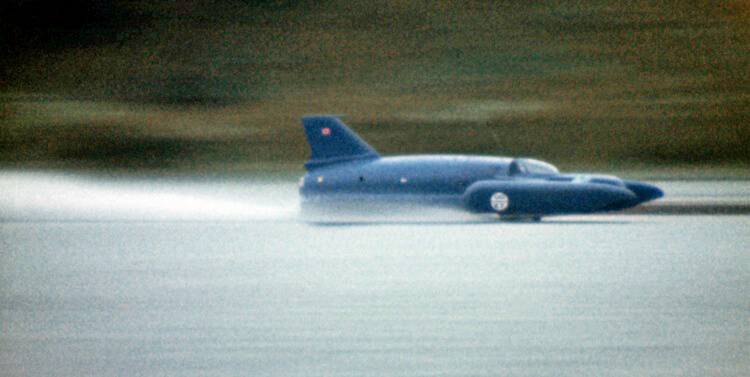
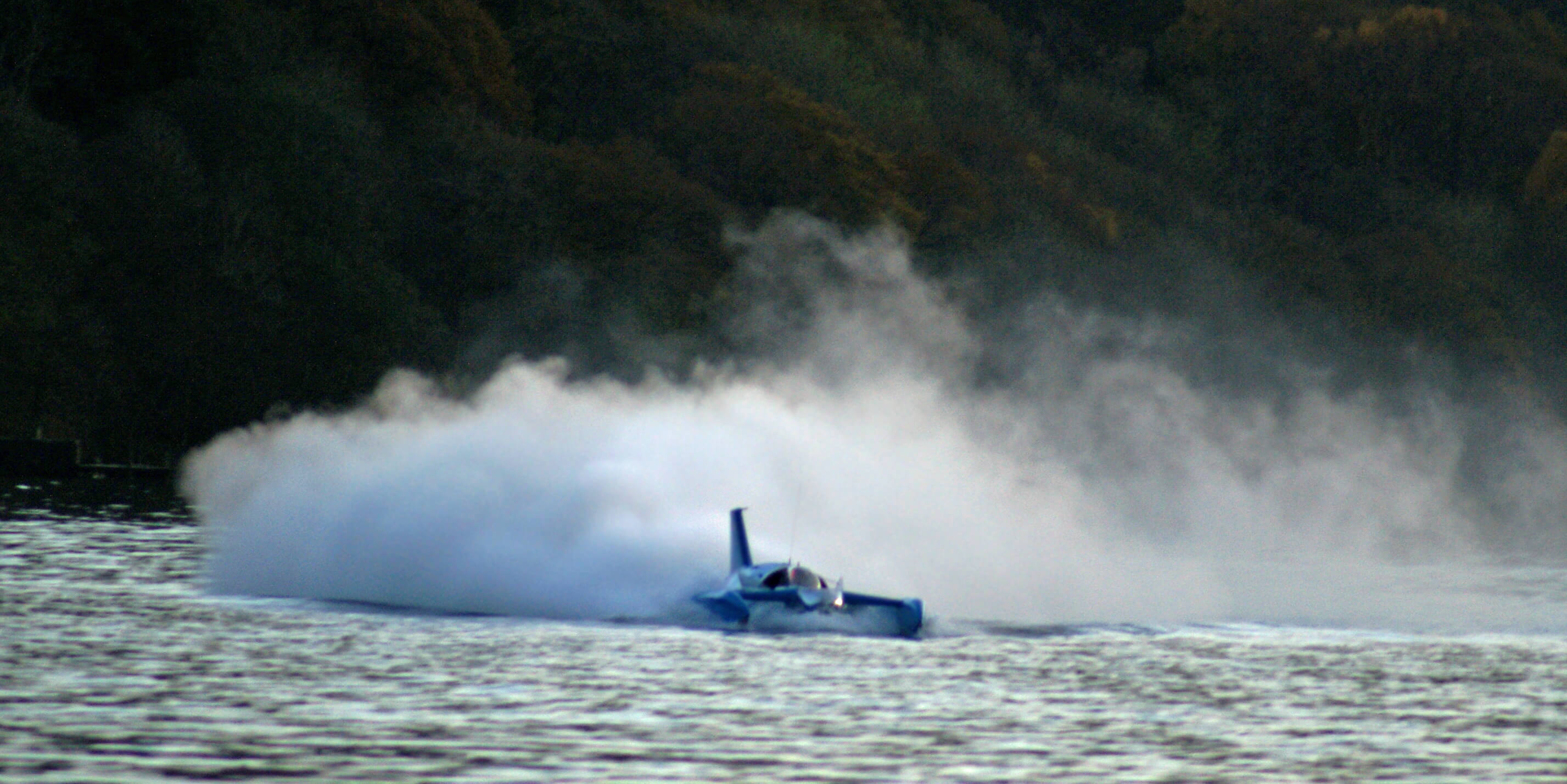 January 4th 1967: an iconic day in the history of Cumbria. The day
when Cumbria at last emerged from its slumber of slates, sheep,
poets, daffodils and Beatrix Potter into the modern, technological
age. The day when Bluebird bravely tackled the world water speed
record.
Who can forget the images of that graceful somersault, as
Bluebird plunged into the depths of Coniston Water, never to be
seen again?
January 4th 1967: an iconic day in the history of Cumbria. The day
when Cumbria at last emerged from its slumber of slates, sheep,
poets, daffodils and Beatrix Potter into the modern, technological
age. The day when Bluebird bravely tackled the world water speed
record.
Who can forget the images of that graceful somersault, as
Bluebird plunged into the depths of Coniston Water, never to be
seen again?
Or so we thought. For yesterday, over forty years later, Bluebird once again raced over the waters of Coniston and repeated its graceful somersault to once more lie shattered at the bottom of the lake.
The original craft had been recovered from the lake and, over many years, painstakingly restored to a working condition. Bill Grackle, head of the restoration team, said “We’re absolutely thrilled. We never thought we’d see the day when Bluebird flew again. And to see the somersault in exactly the same place as before was beyond our wildest dreams”.
The head of Cumbria Tourism Services, Charles Smarm, almost overcome with emotion, commented that “This is a magnificent day for tourism in Cumbria. This will really put Cumbria on the tourist map at last. This is the sort of thing that punters nowadays want to come and see.
“We did, of course, think long and hard whether to allow Bluebird back onto Coniston Water. We had to insist that, in order to comply with Health and Safety Legislation, the craft be driven by auto-pilot, under computer control. We realised that the craft was likely to exceed the present 10mph limit but we made an exception for this very special case.
“We are delighted that our decision has been so gloriously vindicated. Bill Grackle and his splendid team are confident that, with the experience that they have gained, they will be able to recover and restore Bluebird again in no time at all.
“In order to confirm Bluebird’s central position within Cumbria’s cultural heritage and within our tourist programme, I am pleased to announce a new event, the Bluebird Somersault, to be held on Coniston Water, weather permitting (which it rarely will), every year on January 4th”.
Photos: Left: The final run of Bluebird in 1967; Right: The new Bluebird in action.
Farrago in Court
From the Cumbria Magistrates’ Court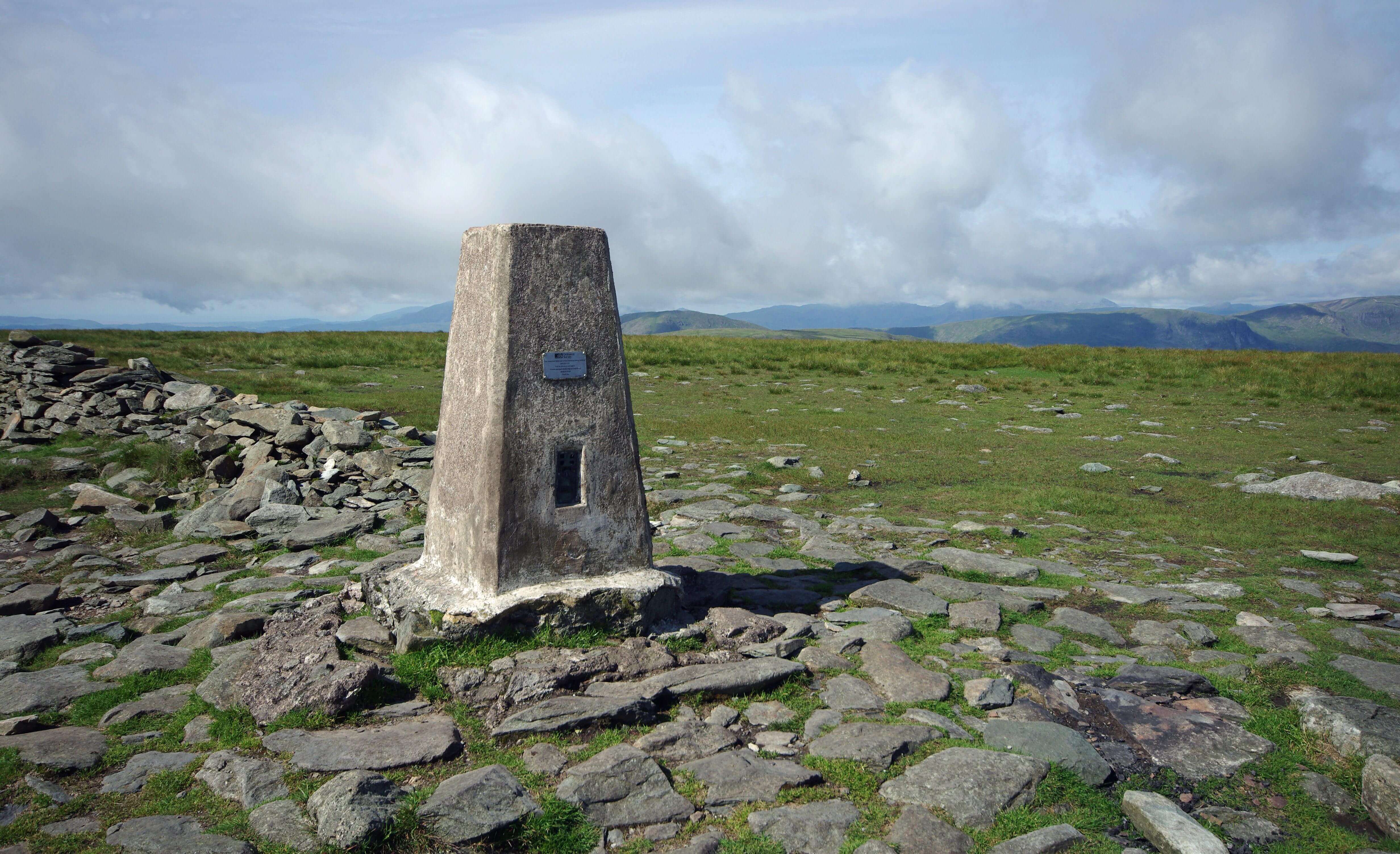 Mr Mucklethwaite (magistrate):
Mr Frederico Farrago, you have been charged under by-law
843(a) of the Countryside and Rights of Way Act, sub-section
54.2, of straying from the concrete path of the Calle Alto. What
do you have to say in your defence?
Mr Mucklethwaite (magistrate):
Mr Frederico Farrago, you have been charged under by-law
843(a) of the Countryside and Rights of Way Act, sub-section
54.2, of straying from the concrete path of the Calle Alto. What
do you have to say in your defence?
Senor Farrago: Estoy diciendo nada.
Mr Mucklethwaite: What? Mr Sneezeweed, what did he say?
Mr Sneezeweed (counsel for the accused): I’m saying nothing.
Mr Mucklethwaite: What? You’re here to speak for the accused, are you not?
Mr Sneezeweed: Indeed. ‘I’m saying nothing’ is what Señor Farrago said. I’ll say plenty, if you wish.
Mr Mucklethwaite: Why is he saying nothing? Does he not realise the gravity of his alleged offence?
Mr Sneezeweed: Indeed. But he is a Basque. The EU does not recognise the Basque Country, so he does not recognise any court under EU jurisdiction.
Mr Mucklethwaite: Are we under EU jurisdiction?
Mr Sneezeweed: Indeed we are.
Mr Mucklethwaite: I wish someone would tell me these things. Let me ask you then, Mr Sneezeweed, did Mr Farrago leave the concrete path, and, if so, why?
Mr Sneezeweed: Indeed, he did. He wished to sit upon the trig point. The trig point is ten yards from the path. He believes that it is every fell-walker’s duty to sit upon the trig point, if there is one. Señor Farrago has travelled all the way from San Sebastian with the specific aim of sitting upon as many trig points as he can in his fortnight’s holiday. You cannot say that you have conquered a mountain unless you sit upon its trig point.
Mr Mucklethwaite: Very true. But why does the path not lead to the trig point?
Mr Sneezeweed: Indeed, a wise question. It seems to be because the authorities thought it better to follow the line of the Roman path.
Mr Mucklethwaite: Did the Romans not wish to sit upon the trig point?
Mr Sneezeweed: Indeed not. There was no trig point then.
Mr Mucklethwaite: Really? Well, I think I have heard enough of this absurd case. If it is within my power, I order the authorities to extend the concrete path to the trig point immediately, and in the meantime Mr Farrago is bound over to keep the peace.
Mr Sneezeweed: That hardly seems necessary.
Photo: The Calle Alto trig point.
The Legends of Lakeland 26: The origin of mountain-climbing
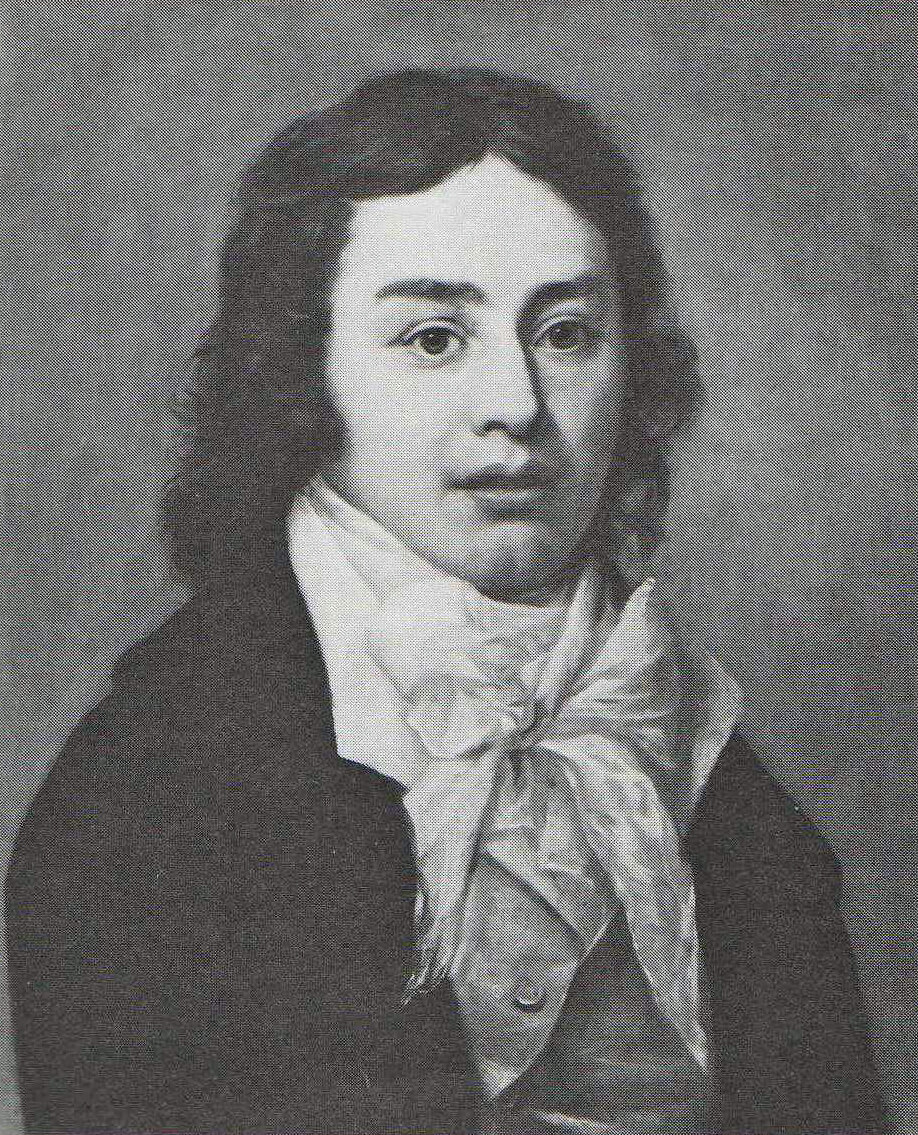 Once upon a time there was a young man called Sam and ...
Actually, if I may interrupt myself here, Sam was no longer a
young man at the time I’m thinking of - August 5th 1802. He was
thirty years old, with a wife and son.
In his twenties, unhinged by the French Revolution, which
had nothing to do with him, and an unhappy love affair, which
did, he had gone off to fight for the 15th Light Dragoons, calling
himself Silas Comberbache, which just shows how confused he
was, because, as I have already said, he was really called Sam.
Once upon a time there was a young man called Sam and ...
Actually, if I may interrupt myself here, Sam was no longer a
young man at the time I’m thinking of - August 5th 1802. He was
thirty years old, with a wife and son.
In his twenties, unhinged by the French Revolution, which
had nothing to do with him, and an unhappy love affair, which
did, he had gone off to fight for the 15th Light Dragoons, calling
himself Silas Comberbache, which just shows how confused he
was, because, as I have already said, he was really called Sam.
And if I may interrupt my interruption, I wonder: What’s wrong with the 1st, 2nd, and so on Light Dragoons?; What’s ‘light’ about them?; Do you have to be dragooned into fighting for the Dragoons?; Did they know that dragoons are fancy pigeons?; Was it a misprint for Dragons?
Where was I? Ah, yes, not-so-young Sam. After the Light Dragoons, he dreamed of setting up a utopian commune in New England, old England being quite unsuitable for such a concept. When this came to 0, his dreams turned to nightmares: he married Sarah, which seemed a good idea at the time, as his friend Robert wanted to marry her sister Edith, and they could halve the wedding expenses.
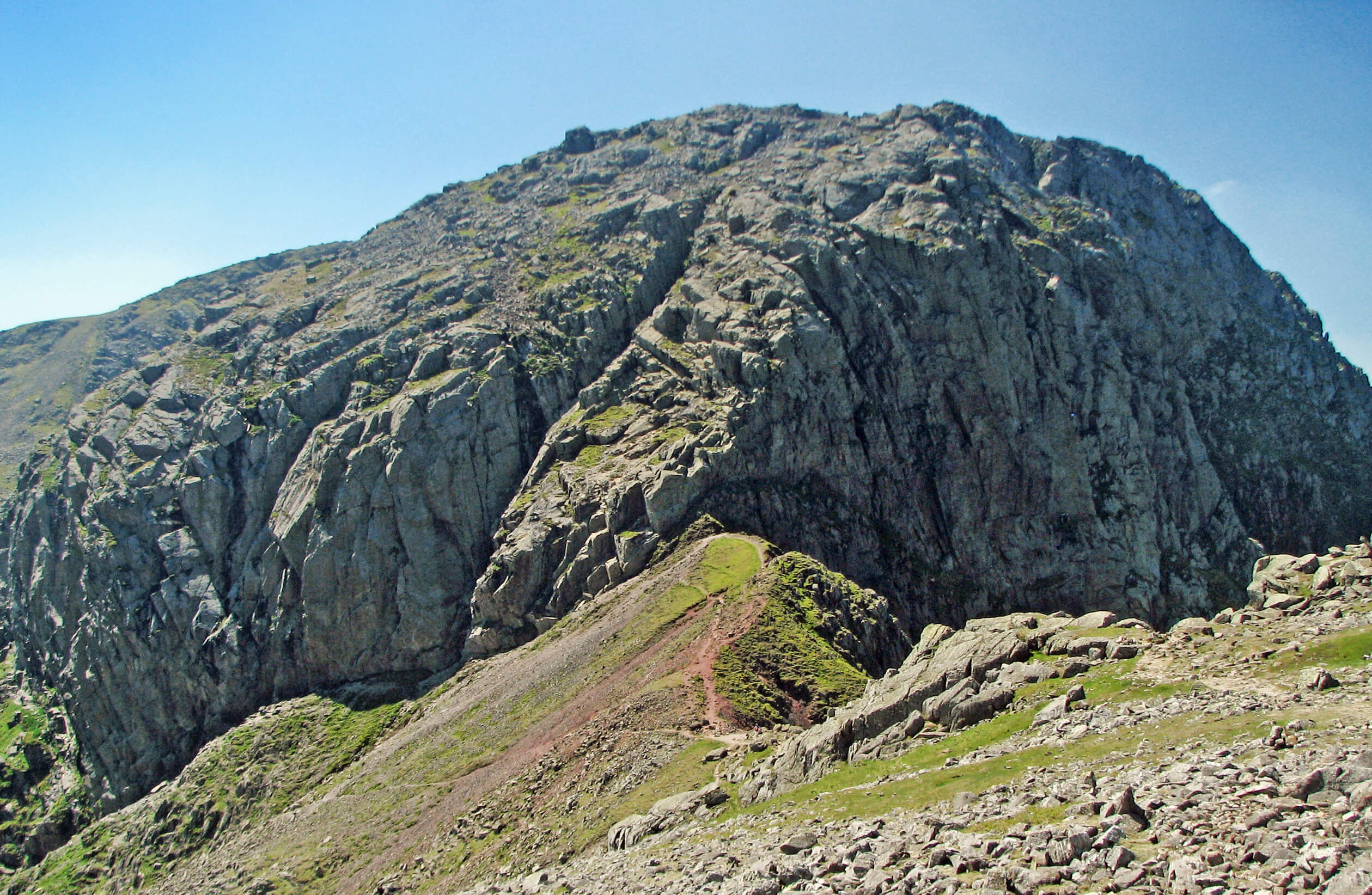 Later, another friend,
William, fell in love with and married a Mary, who happened to have a sister called Sara, without
an h. Following tradition, Sam felt duty-bound to fall in love with
her, which he did, although he could not, of course, marry her as
well. Still, at least he could murmur in his sleep and his wife would
suspect nothing.
Later, another friend,
William, fell in love with and married a Mary, who happened to have a sister called Sara, without
an h. Following tradition, Sam felt duty-bound to fall in love with
her, which he did, although he could not, of course, marry her as
well. Still, at least he could murmur in his sleep and his wife would
suspect nothing.
Unfortunately, young Sara - and she really was young, unlike Sam - was not convinced by Sam’s outpourings of love, expressed in innumerable poems. Besides, there was Sarah.
So, dreamer that he was, Sam decided on an exploit to demonstrate the depths of his affection: he would go to the highest point of England and proclaim his love for Sara to all points of the compass. He toiled up from Wasdale by the Green How route to the top of Scafell and there, after writing a long letter to his beloved (Sara, that is, not Sarah), he stood up to bellow
“I, Samuel Taylor Coleridge, avow to the whole of England that I am deeply enamoured of you, my dearest Sara”.
He shouted it to the west, and then again to the south, and again to the east, and ... “Shit” he said, for even poets have their moments of indelicacy. He saw, over to the northeast, some rocks that looked even higher than where he stood. There was nothing for it: to complete his exploit he needed to get over there quickly, as the light was fading and a storm was looming. He made a bee-line for the new top, dropping down the sheer cliffs of Broad Stand. Many times he was very nearly head over heels in love. As he descended he realised, looking back up, that he could not possibly re-climb the cliffs. He had no choice but to continue down. Eventually, he somehow reached the safety of what we now call Mickledore. But with shaky legs and heat bumps and, thinking that Sara would never know he hadn’t got to the real top of England, he retreated into Eskdale.
But Sara was not so foolish as to fall for a man who sets out for the top of England without knowing where it is. Poor Sam, increasingly addicted to opium, became suicidal and therefore moved to Wiltshire and then London.
Still, all was not in vain. His ridiculous expedition on Broad Stand is now regarded as the first recorded instance of mountain-climbing in the Lake District. In fact, he didn’t mountain-climb at all: he mountain-descended, rather precipitately. And in another fact, although he became a revered man of literature he is better known in the Lake District for his epic descent of Broad Stand than he is for any of his poems about the Lakes. So, if you want to be remembered as a literary man do not drop your hs.
Photos: Sam Coleridge in his mountain climbing gear; Broad Stand, scene of the Lake District’s first mountain descent.
Four Men in Their Boots, Day 13
... Black Hall ...
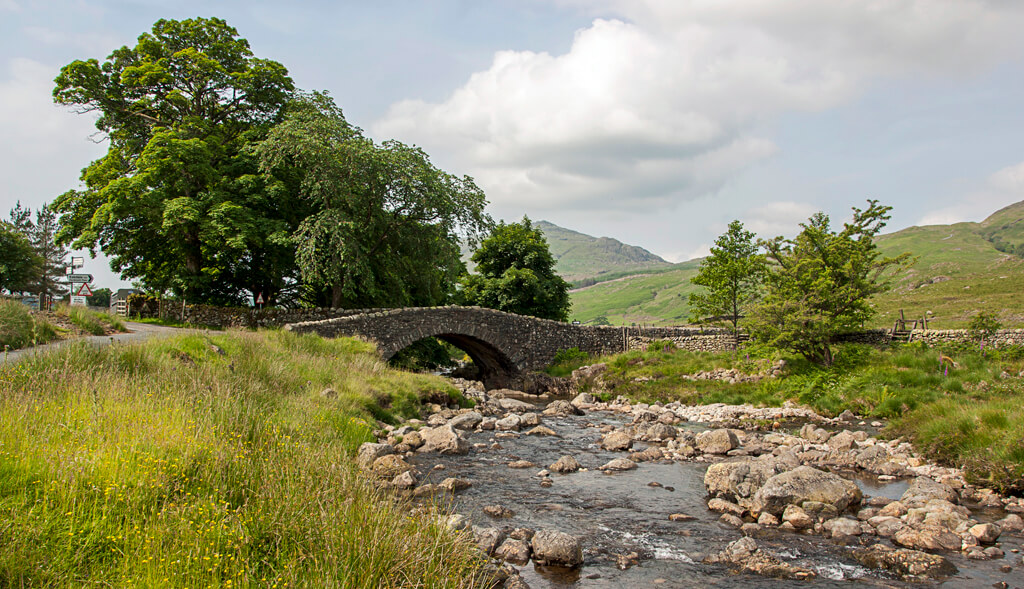 We set out promptly, crossed Cockley Beck Bridge, and headed
straight up the slopes of Grey Friar. That’s the way to tackle
Grey Friar - immediately, to get it over with. Grey Friar is
one of those hills that lacks distinction. The slopes are dull.
There is little of interest on the top. And it is not on the way
anywhere (unless you are tackling it from an odd direction, like
us).
We set out promptly, crossed Cockley Beck Bridge, and headed
straight up the slopes of Grey Friar. That’s the way to tackle
Grey Friar - immediately, to get it over with. Grey Friar is
one of those hills that lacks distinction. The slopes are dull.
There is little of interest on the top. And it is not on the way
anywhere (unless you are tackling it from an odd direction, like
us).
So we were surprised to find, when we reached the top, that a couple were already there, sipping champagne in some sort of celebration. I couldn’t imagine why anyone would celebrate reaching the top of Grey Friar, but Harry soon found out why. It seemed that the man had just completed a challenge to reach the top of the 60 highest peaks of the Lake District in the 60 days before his 60th birthday.
How ridiculous! Why do people set themselves these challenges? Can they not appreciate fell-walking for its intrinsic merits, taking the rough with the smooth, accepting rainy days as well as sunny days, without feeling the need to tick off mountains on some arbitrary list? It never occurred to me to count the mountains conquered in our two weeks. That was not the point at all. But at least I could understand why Grey Friar was the last of his 60 peaks.
I let my men join the celebration for a while as I surveyed the scene. The only thing to say in Grey Friar’s favour is that it provides a fine view, especially towards the Scafell region. Here, arrayed before us, were the peaks that we had so recently climbed. It was with some pride that I pointed this out to my colleagues, and even they were impressed with what they had achieved. I then turned our gaze 180 degrees towards our main objective for the day, the Old Man of Coniston. It looked easy walking, so we set off in good spirits.
... Old Man of Coniston ...
First I took the men on a slight detour to the cairn on Swirl How, in order that they may appreciate the view into Greenburn. We then strode south, over the gentle rise of Brim Fell, and on to the Old Man. The name alone ensures that the Old Man is many people’s favourite fell, almost a member of the family. For many fell-walkers it is recalled fondly as the first Lake District hill they walked up, for it is a favourite expedition for tourists staying in the village of Coniston. The large platform on the top is usually awash with walkers, some of whom no doubt are there taking pride in that first conquest. I wandered apart to look at what we had mastered: High Street, Fairfield, Helvellyn, Blencathra, Skiddaw, Scafell Pike and, yes, even Grey Friar.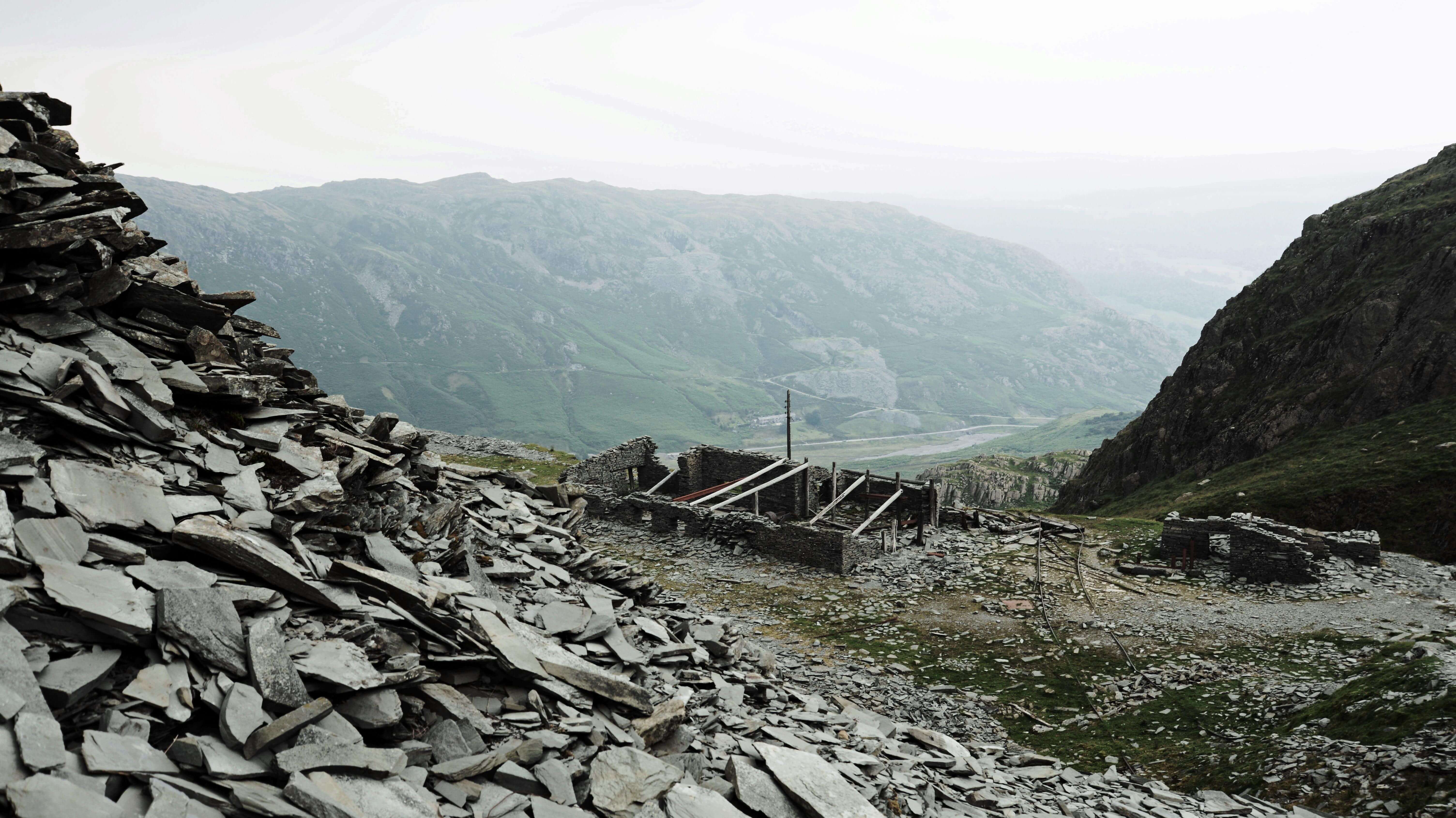 However, as I looked south, over Coniston Water, I could
see clouds approaching. I moved the men on, towards the path
to Low Water. We were soon in amongst the dereliction of the
abandoned quarries.
The other three were intrigued by the huge piles of slates,
the rusty old machinery, and the various fenced-off shafts.
They even found a shaft that was not fenced off and asked me
for permission to have a look inside. We were well ahead of
schedule and coasting home on our last couple of days, so I let
them wander in.
However, as I looked south, over Coniston Water, I could
see clouds approaching. I moved the men on, towards the path
to Low Water. We were soon in amongst the dereliction of the
abandoned quarries.
The other three were intrigued by the huge piles of slates,
the rusty old machinery, and the various fenced-off shafts.
They even found a shaft that was not fenced off and asked me
for permission to have a look inside. We were well ahead of
schedule and coasting home on our last couple of days, so I let
them wander in.
I settled myself nearby to wait for them. I surveyed the desolation around me. The clouds were now closing in, to help augment this scene of utter bleakness. It is ironic that perhaps the most popular Lake District walk should pass this region so unlike our image of idyllic Lakeland. But, of course, there are old mines, quarries and other industries on many Lake District hills. Most have been so long abandoned that they have almost merged back into the hills. But not here on the Old Man.
As I sat there, my mind wandered to think of the many men, perhaps up to a thousand on the Coniston hills, who had such a hard life mining these tough hills. Perhaps my three colleagues were getting a stronger impression of this hard life. Where were they? Fifteen minutes had passed.
I returned to my reveries. I wondered what they mined here. The Coppermines ex-Youth Hostel gives us a clue. Perhaps there was more than copper. The different colours of the tarns suggests many different minerals.
Where were they? Another ten minutes. I was getting cold: a drizzle was settling in. I peered into the shaft. I could see a tunnel at the end of the light. Beyond that, nothing. I could hear nothing either. I shouted in. An echo, but no response. This was most unreasonable. They couldn’t expect me to just sit and wait. So I shouted in that I’d set off for Coniston. I’d dawdle along, so that they could catch me up. They couldn’t possibly get lost on a path as clear this.
... Coniston ...
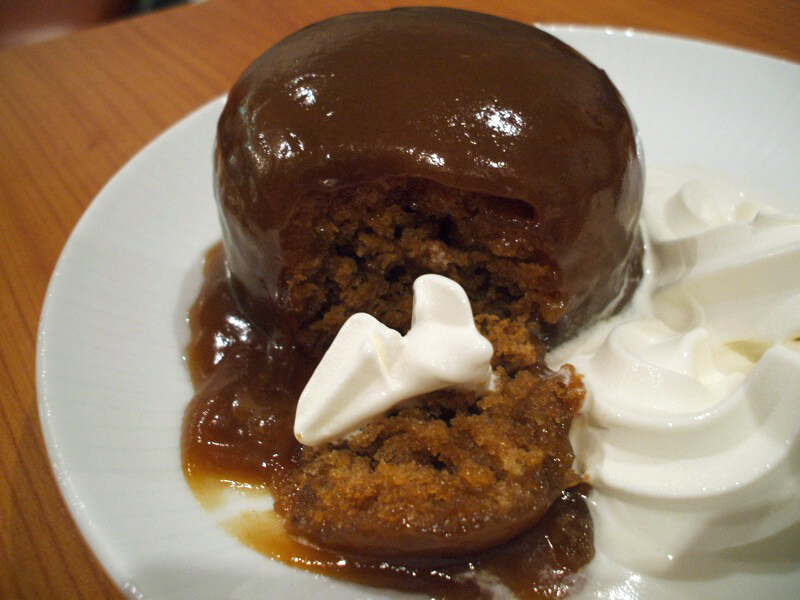 I reached our hotel in Coniston and signed in.
“Will your friends be joining you?” asked the man.
I reached our hotel in Coniston and signed in.
“Will your friends be joining you?” asked the man.
“They’ll be along in a minute” I said. I went up to my room and had a leisurely shower. I then wandered down to the bar.
“Will your friends be joining you?” asked the man.
“They’ll be along in a minute” I said. I was quite enjoying the solitude. It made a pleasant change after the enforced company of the last thirteen days. I had learned to tolerate their strange ways, despite the many difficulties they had caused me. Now I had the opportunity to relax and reflect on all the fine walking that I had done. I strolled into the restaurant and sat down at a table set for the four of us.
“Will your friends be joining you?” asked the man.
“They’ll be along in a minute” I said. I partook of a rather challenging mulligatawny. And then a Westmorland sausage (I do like to flout convention sometimes). Followed, as always, by sticky toffee pudding, which is said to have been ‘invented’ at Sharrow Bay in the Lake District in the 1970s.
Afterwards I retreated to the bar. Where were they? It was not like them, especially Thomas, to be late for their evening meal. I thought that I had better check with the man at reception. No, they had not signed in. He asked when I had last seen them and I explained about the mines on the Old Man - at which point he became rather concerned. “You’d better ring Mountain Rescue” he said, passing me the number and a phone.
It all seemed a bit melodramatic to me but I did as he suggested. I told them exactly where the men had gone and without so much as a ‘thank you’ they said “We’re on our way”. I didn’t even have time to offer to help them but I don’t think I intended to anyway. I’m sure Mountain Rescue know what they’re doing. So, confident that I had done everything that I possibly could to help, I went to bed, where I had my most contented sleep for some time.
Photos: Cockley Beck Bridge; An old Coniston mine; Sticky toffee pudding
Drama in Court: Ladies’ Bigamy Case Halted
The Eleven Ladies of the Lakes bigamy case was abruptly halted at the start of the second day when the magistrate, Mr Mucklethwaite, said “I have slept on the complexities of this case and, after a sleepless night, have concluded that my legal training is totally inadequate. Moreover, as a result of our numerous encounters in recent years, I have developed an affection for the Ladies that makes the necessary neutrality impossible. I therefore step down from the bench”. Which he did.The first day of the trial had been spent enjoyably reviewing the background to the case and less enjoyably trying to determine the precise nature of the alleged offence. The Eleven Ladies of the Lakes, as the tabloids and then everyone else called them, had become national icons after their legendary run over the Old Man of Coniston. The subsequent appearances on TV, film and YouTube had made their names so familiar that children in their playgrounds chanted “Annie Bensal, Celia Clapperclowe, Sheila Corkin, Mary Drissin, Sue Kelk, Linda Ledder, Meg Powse, Helen Slaister, Sandra Targe, Liz Whezzle and Dorothy Yedder”, much like boys of a previous generation intoned the names of the 1966 England World Cup winning team.
The Ladies went beyond celebrity-hood, a concept tainted with wanton excess and triviality. The Eleven Ladies of the Lakes were a preternatural essence that permeated the nation’s collective conscience, suffusing homely, comely Cumbrian attributes. Their status as national emblems was confirmed by their appearance on Celebrity Big Brother, when they showed how people may support one another in harmony. This revolutionised the moral culture of the country. When they left the Big Brother house, the Prime Minister, Tony Blair, commented “What a night for sound-bites! They are truly the people’s Ladies, and we are the Ladies’ people. Their values must become our values. They become us, as we must become them. Forever and ever. Amen”. Then he melted.
The Celebrity Big Brother DVD became essential course material in all schools, despite the protests of the Society for the Preservation of English Real Men, who felt that the DVD confirmed that men were an irrelevant and disruptive influence on society. The Ladies’ tremendous contribution to the nation did not come without its side-benefits. Their inevitable neglect of their housewifely duties led to marital tension, and in due course they all freed themselves of this distraction.
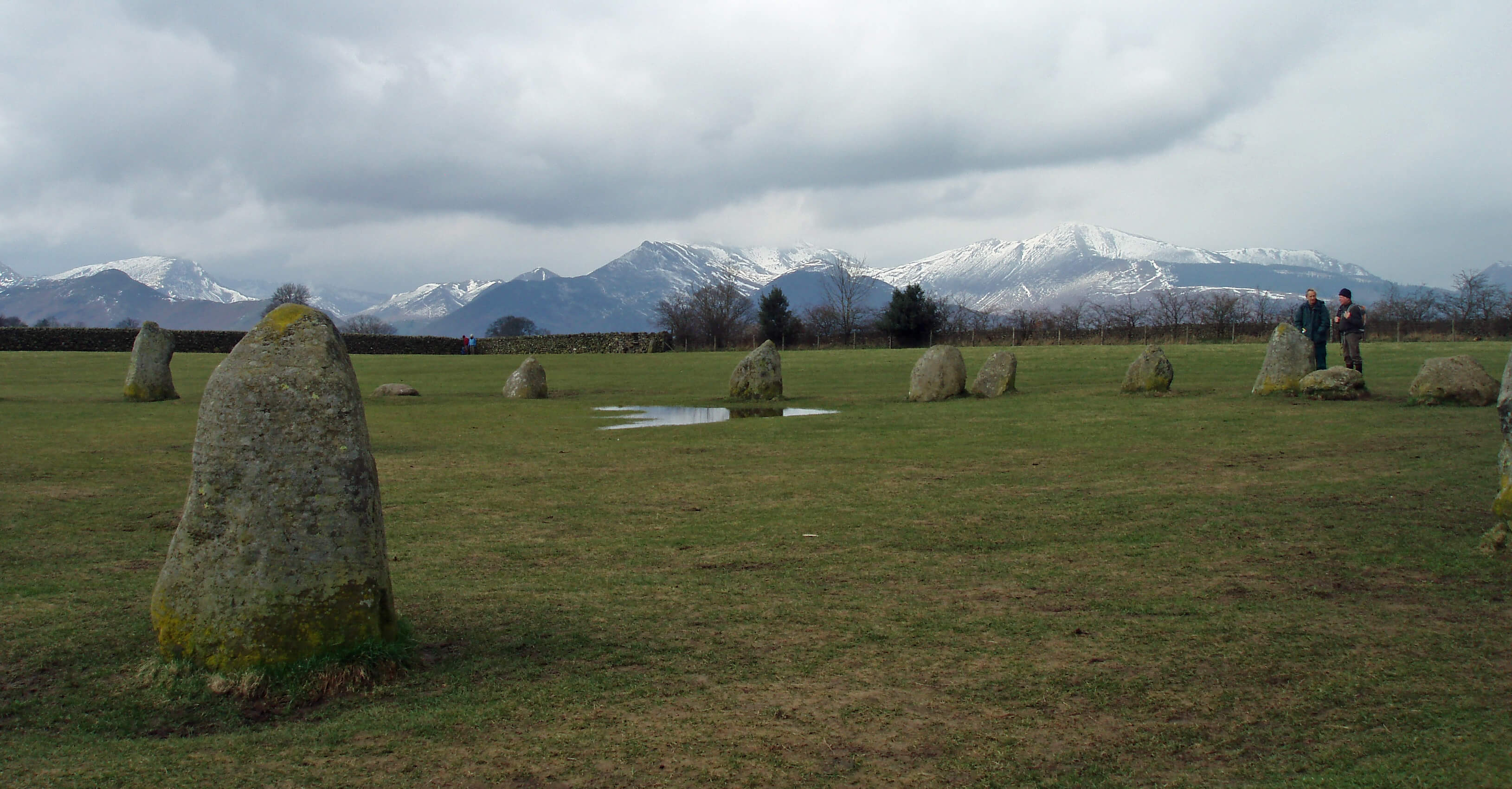 The Big Brother experience had confirmed the Ladies in their
mutual love and, to national rejoicing, the Rev. Fenella Fenestra of
Keswick carried out a day-long ceremony at Castlerigg Stone Circle
at which all pairs of Ladies were joined in a civil partnership.
This communal euphoria was, however, somewhat deflated
by the Home Secretary, who said on Newsnight “While I share the
nation’s happiness, I do wonder if this kind of event is quite what
New Labour had in mind when it passed the Civil Partnership
Act in 2004”. The Crown Prosecution Service wondered too, and,
to be on the safe side, thought that it had better bring a charge of
bigamy.
The Big Brother experience had confirmed the Ladies in their
mutual love and, to national rejoicing, the Rev. Fenella Fenestra of
Keswick carried out a day-long ceremony at Castlerigg Stone Circle
at which all pairs of Ladies were joined in a civil partnership.
This communal euphoria was, however, somewhat deflated
by the Home Secretary, who said on Newsnight “While I share the
nation’s happiness, I do wonder if this kind of event is quite what
New Labour had in mind when it passed the Civil Partnership
Act in 2004”. The Crown Prosecution Service wondered too, and,
to be on the safe side, thought that it had better bring a charge of
bigamy.
Mr Sneezeweed, defence counsel, immediately objected when the trial opened, saying “How can you say that these Ladies are guilty of bigamy when it is impossible for you to point to any particular partnership and say that it is an instance of bigamy?” This abstruse point was further muddied by mathematicians from the University of Cumbria who proved that there had been 55 civil partnerships enacted at Castlerigg, that between 50 and 54 of them had involved a possibly bigamous relationship, and that there were a total of 99 possibly bigamous acts. But they couldn’t say which they were, as there was no record of the order in which the partnerships had been sealed. Every time the word ‘bigamous’ was used Mr Sneezeweed leapt to his feet. On each occasion, reading from legal precedent or from a dictionary, he argued that ‘bigamy’ meant ‘twice married’ and a civil partnership is expressly not a marriage under the law.
An exasperated Mr Thornbush, prosecuting counsel, said “If we were to allow multiple civil partnerships, where would that leave those of us in traditional uncivil partnerships? In fairness, we would have to permit multiple uncivil partnerships, a prospect that doesn’t bear thinking about”. At this point, Mr Mucklethwaite complained of a severe migraine and adjourned the court. And, as we now know, on his return he announced his retirement from the case and, indeed, from the judiciary. He will be sadly missed, at least, by me.
Photo: Castlerigg Stone Circle.
But what about the Ladies? Was there a re-trial?
Who cares?
I do. This could set an important legal precedent.
Well, the case has lapsed. Now we have same-sex marriages partnerships and marriages are clearly different.
Oh. So you can have multiple partnerships? Can you have a partnership with one person and a marriage with another?
I feel a migraine coming on.
The Way We Were, with Solomon Seal
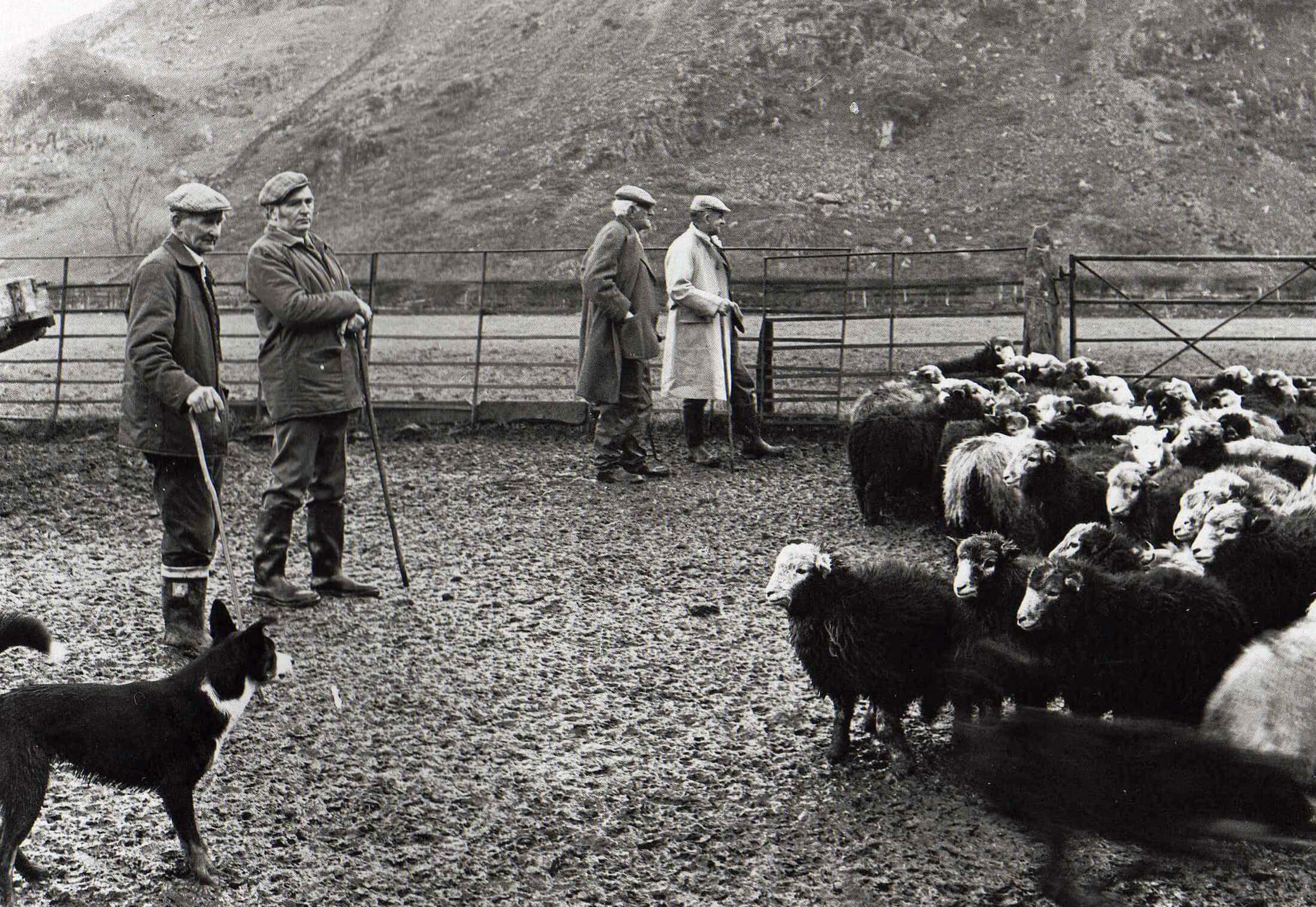 Continuing the series to remind ourselves of the debt we owe to
our Lakeland pioneers, here, extracted from an ancient edition
of the Cumberland Courier, are some words of Solomon Seal,
Westmorland’s first sheep sharer.
Continuing the series to remind ourselves of the debt we owe to
our Lakeland pioneers, here, extracted from an ancient edition
of the Cumberland Courier, are some words of Solomon Seal,
Westmorland’s first sheep sharer.
“I have always been fascinated by sheep. Ever since I were a lad I’ve keep records of all the sheep on our farm. I can’t read or write, so my records are drawings. You may think that all my drawings of sheep would look the same but they don’t. Every sheep is an individual. I can recognise any of my sheep by sight. In fact, by any other sense as well: by sound, by feel, by smell, by taste - oh, no, not by taste. I wouldn’t taste any of my own sheep. I add little sketches to my records to show all the events in the sheep’s life: where he goes, who he meets, what he eats, what his ailments are: what a rich tapestry of life it is!
“I have tried to understand why a sheep wanders off our fields. People think that a sheep stays where it belongs on the fells, but we shepherds know that this is not quite true. Every so often, for some reason, a sheep will escape to a neighbouring farmer’s field. I have found, after years of study, that a sheep is always in a serious state of distress to take such a step, to leave his friends and family and to face unknown dangers in an alien field. With careful monitoring, vulnerable sheep can be given protective care to prevent this happening.
“We shepherds have known about wandering sheep for centuries. That’s why we have shepherds’ meets every autumn. Each shepherd brings along all the sheep that have strayed onto his fields and they are returned to their owners. Usually, after a lot of argument! You may wonder why we bother - lose some sheep, gain some sheep, it should all balance out in the end. But, of course, every shepherd thinks his own sheep are the best, and he wants them back.
“After a particularly rowdy meet, when the shepherds couldn’t agree whose sheep were whose, someone said ‘We need the wisdom of Solomon to sort this mess out.’ Everyone agreed, and I was therefore appointed official sheep sharer, responsible for sharing sheep out if amicable agreement could not be reached. They realised that, with my deep knowledge of sheep, I would probably know whose sheep were whose anyway.
“The first thing I did was to try to reduce the number of wandering sheep. All the shepherds came on a one-week sheep counselling course, at which I trained the shepherds to recognise danger signals. This had limited success, as, I’m sorry to say, not all shepherds are prepared to spend hours each day looking at their sheep. So, I thought, if we have to accept that there will be wandering sheep, let’s at least make it easier to identify them. Let’s paint all the sheep of each shepherd a colour that is different to other shepherds’ sheep.
“They all thought I was barmy, but I was determined to try it. I bought 151 different colours of paint, one for each shepherd in the region, and I went round painting every sheep myself. It worked perfectly. There was absolutely no argument at the meet. It was obvious whose sheep were whose. But there were two problems. First, it was hard to find 151 different colours. Now, my records had shown that sheep gain such a psychological release by escaping that they never wandered beyond the neighbour’s field. Therefore I only needed enough different coloured paints to ensure that no two adjacent shepherds’ fields had the same colour.
“So what was the minimum number of colours of paint that I’d need? I spent weeks shifting colours around on a map on the kitchen table trying to solve this problem. I managed to convince myself that I only needed to buy four colours of paint: red, blue, green, yellow. But I didn’t really prove it.
“The other problem was that wool-buyers didn’t want to buy wool that had coloured splotches. They preferred wool to be wool-coloured. So I discussed this with the paint-makers and they said that they’d try to develop a paint that could be washed off just before we shear the sheep. Unfortunately, they haven’t got the formula right yet, to take account of all the rain in the Lakes. Usually, the paint has all gone after a week.
“That suits me, really, as I then still have plenty to do at the meets, and, you know, having 150 shepherds buying you drinks so that you treat them kindly is rather pleasant”.
Photo: Solomon Seal (in the white coat) at work.
The Wild Places: Another Book for Offcomers
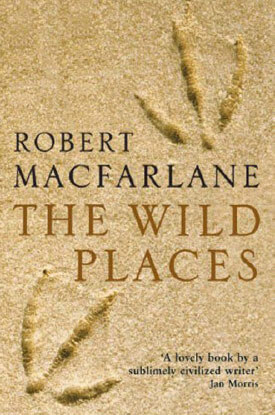
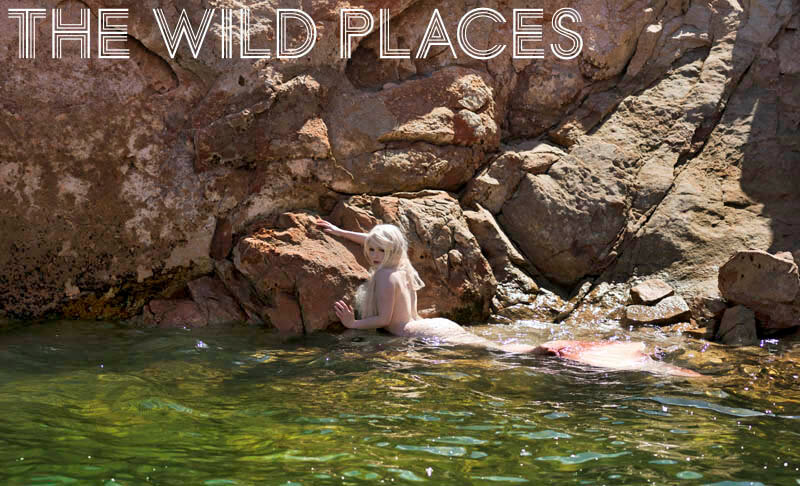 The Wild Places, by Robert Macfarlane (Granta Books, £18.99), 340
pages with 16 black-and-white photographs and 1 upside-down map.
The Wild Places, by Robert Macfarlane (Granta Books, £18.99), 340
pages with 16 black-and-white photographs and 1 upside-down map.
This book should help offcomers to develop an appreciation of the wilder regions of the Lake District. Following the tradition of Homer’s Odyssey, the Norse sagas, Cervantes’s Don Quixote and Lear’s The Owl and the Pussycat, The Wild Places describes a series of fantastical adventures during which our hero (the author) muses upon wilderness and the nature of nature.
The narrative takes the form of mythological outings to actual wild areas of the British Isles, from the peak of Ben Hope to the salt-marshes of Dengie. Chapter 10 is of particular interest to would-be Cumbrians, being based upon the standard walk from Buttermere to Red Pike and High Crag. Of course, for our hero the standard walk would not be wild enough. He must walk at night, alone, and in a blizzard.
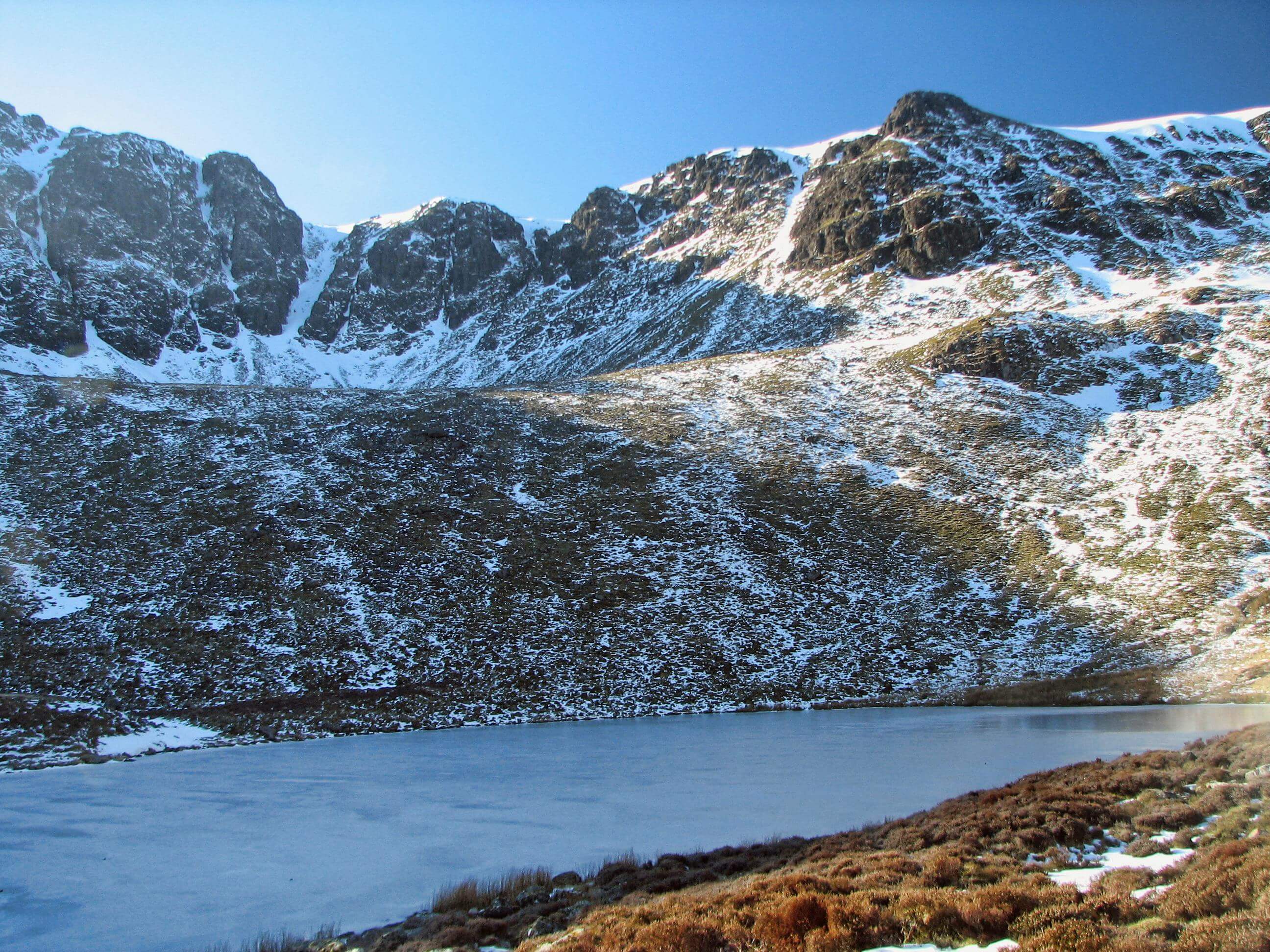 The metaphorical nature of the expedition is first emphasised
by the surreal discovery of a trail of one-inch high red pinnacles
sticking from the snow. These, we are told, are formed by drops
of blood freezing in the snow, which has then been blown away.
This, of course, is allegorical: it is intended to convey the mortality
of man, who may, with fortitude such as that of our hero, rise above
the severest conditions.
The metaphorical nature of the expedition is first emphasised
by the surreal discovery of a trail of one-inch high red pinnacles
sticking from the snow. These, we are told, are formed by drops
of blood freezing in the snow, which has then been blown away.
This, of course, is allegorical: it is intended to convey the mortality
of man, who may, with fortitude such as that of our hero, rise above
the severest conditions.
The explanation for this imaginary phenomenon is nonetheless intriguing. Nowadays, whenever it snows, I take my wife for a walk and, as we stroll along, I prod her with a fork (a fork, I find, is better than a knife as it produces four drops not just one). I then return along the path at three-hourly intervals, hoping to find little red pinnacles. So far, I have only seen rather unpleasant red blotches. This may be because my wife has donated so much blood that what she has left is too dilute to stand firm.
To return to the narrative of Chapter 10, our hero continues his walk up Red Pike only to find that the blizzard is so strong that he cannot distinguish land from sky or even stand up. So he decides to have a nap upon a frozen tarn. Now, for the benefit of offcomers, I must emphasise that this is a fantasy. Survival handbooks do not recommend going for a lie-down on a frozen tarn if caught in a blizzard. Anyone familiar with the reminiscences of Silas Jessop (Editor: see above) will know that this is fraught with danger. Our hero, however, sleeps “for some hours” and on awaking finds that he has melted a sarcophagus in the ice. In reality, he would awake to find rigor mortis had set in.
This, however, is not reality. Our hero now finds that the blizzard has miraculously abated. He walks towards High Crag to find that he has moonlit views of winter hills all around him. He reflects at length on the deeper optical sensitivity and the profound insight that this experience affords, with extra wildness conferred on a metallic landscape. However, in a slight inconsistency in the tale, when he reaches High Crag he decides to pitch his bivouac and have another sleep. Now, walkers in inferior day-time conditions would think little of continuing over Haystacks and Fleetwith Pike and maybe even around to Robinson. But our indolent hero, after only a one hour walk from Red Pike, has apparently had enough of the unique experience that he has just eulogised.
He awakes before dawn and makes a seat in the snow to watch the sun rise. Of course, it is not an overwhelming surprise when the sun does appear but a sunrise invariably stimulates those of a poetic bent, like our hero, to an excess of romantic effusions. That obligation over, he walks down to the lake, where there is a bizarre episode which encapsulates the spirit of the book. He picks up a rock and contemplates the manifold ways that it is actually moving in the universe and the manifold forms of radiation that are bombarding it (you can see why he walks alone). He then purges himself of such idle thoughts by stripping off and sitting up to his neck in icy water. This is clearly intended to symbolise the return from wilderness to the cold reality of our tame modern life.
After a number of such epic adventures, our hero comes to the conclusion that it is, after all, unnecessary to indulge in such extreme behaviour to experience true wilderness. It can be found rather more easily in local woods and hedgerows, which I am sure will come as a relief to offcomers.
Photos: The Wild Places book cover; Bleaberry Tarn, where Macfarlane had a sleep.
Four Men in Their Boots, Day 14
... Coniston ...
I came down to breakfast with quite an appetite. And there they all were. I had forgotten about them. They stood as one, to shake my hand and thank me profusely for saving them from disaster in the Coniston mine. I insisted: “It was nothing”. But, no, they were adamant. They were most impressed by my wisdom in not entering the shaft myself to find them. That way, they said, all four of us might have been lost forever. “Yes, of course” I said.It seemed that they had walked into the shaft using a torch that Richard had with him. But when they were far inside Harry had dropped the torch into a deep pool. The mine became pitch black. They had kept together, struggling along trying to find a way back, but had become more and more lost. Eventually, they had decided to sit tight to save energy, knowing that their leader outside would know exactly what to do in this emergency. “Quite right” I said. It was very sensible, they said, to call the expert Mountain Rescue team. “Yes indeed” I agreed.
After breakfast, Thomas quickly replenished our stocks, for the last time. “One day to go” he said. There were two actually, but an end-of-term feeling had crept in, so I didn’t correct him. Today, however, we had a long walk ahead of us. From Coniston we walked first to Wetherlam. The route I had planned for the whole walk did not involve any retracing of steps but I made an exception this morning. My companions had come down the Coppermines path in the dark last night, so I thought it only fair to return that way and then cut over Lad Stones to Wetherlam. From Wetherlam I took us down the edge past various pits, shafts and workings on Tilberthwaite Fell but my companions were somewhat disinterested in them. From the abandoned mine buildings below the reservoir we walked below Rough Crags to Wrynose Bridge and then up Pike o’ Blisco.
... Crinkle Crags ...
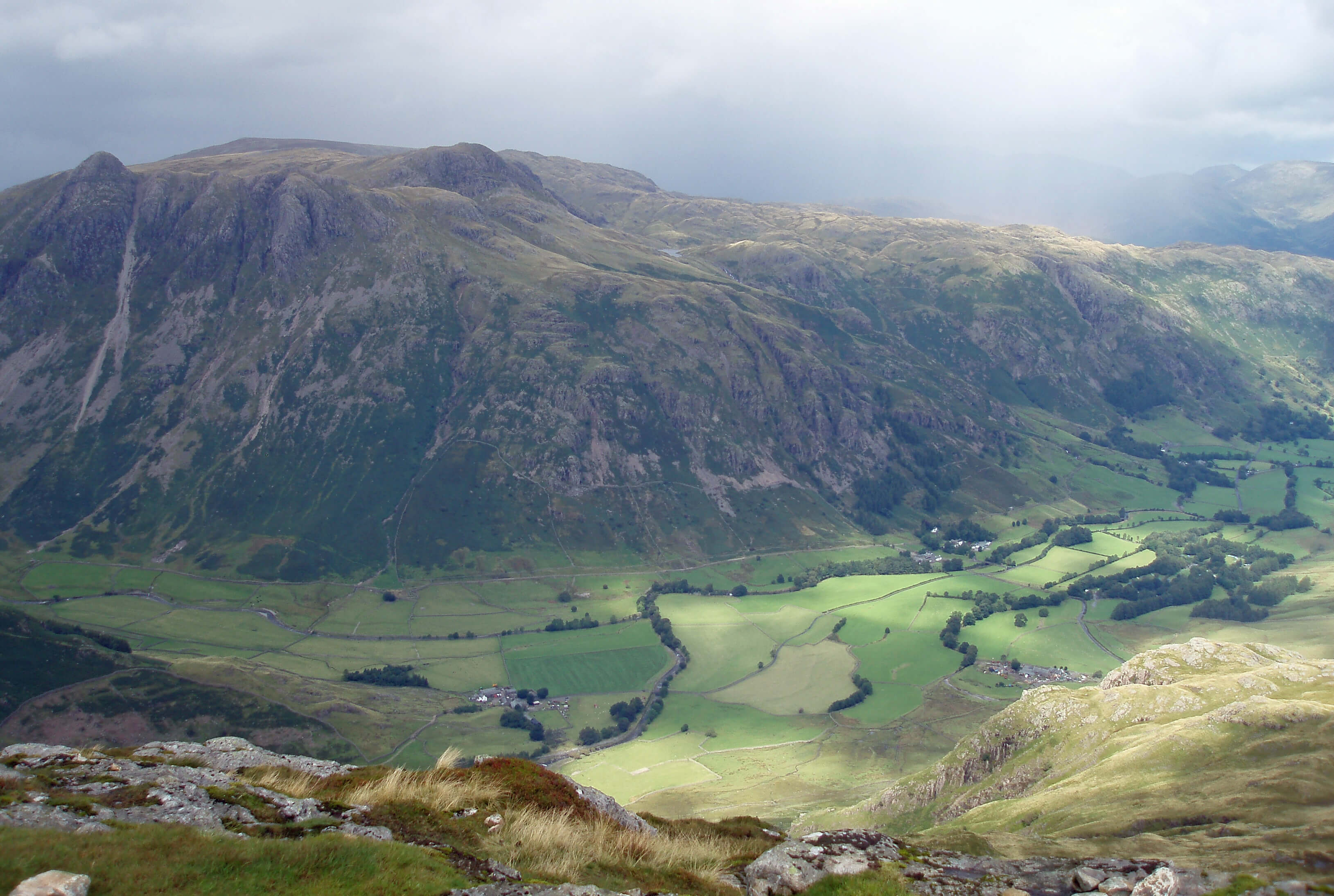 We paused at the top of Pike o’ Blisco (which Richard noticed
the Ordnance Survey, as pedantic as himself, insists is Pike of
Blisco) to admire the classic view of Langdale, with thin rain
clouds adding a rainbow tinge to the hills opposite. Over to the
left was arrayed our next objective, Crinkle Crags.
We paused at the top of Pike o’ Blisco (which Richard noticed
the Ordnance Survey, as pedantic as himself, insists is Pike of
Blisco) to admire the classic view of Langdale, with thin rain
clouds adding a rainbow tinge to the hills opposite. Over to the
left was arrayed our next objective, Crinkle Crags.
I could see a large party of walkers toiling up the path to the first crinkle. They seemed to be making slow progress. In fact, as I studied them, they seemed to be making no progress at all. Some seemed to be lolling about, perhaps having a snack break. Others were milling around as though they were looking for something. I couldn’t work it out at all. We set off in their direction and as we approached I realised that they were workers, not walkers. They were repairing the worn footpath by setting large slabs that had been deposited on the hillside by helicopter.
This admirable work, sadly so necessary in the Lake District nowadays, was being funded by a European disdisablisation programme, whereby popular footpaths are made usable by the disabled. Very commendable, I thought. The Council had naturally decided to tackle the most popular paths, such as that over Crinkle Crags, first. I was a little puzzled how the disabled would get up here to appreciate this fine work but I didn’t ask any awkward questions to cast any doubt upon it.
However, as we continued to chat to the workers, we found out that the plan was to continue this smooth, almost level, path all the way over Crinkle Crags to the foot of Bowfell. ‘Decrinkling’ they called it. This, I felt, was many steps too far. You can’t smooth out the crinkles! The workers assured me that they would leave the Crinkle Crags profile unchanged, so that it may continue to be admired from Langdale and elsewhere. Their path for everyone would be hidden behind.
Harry, Richard and Thomas seemed to regret that the path didn’t exist already, especially as they confronted the second crinkle. I let them grapple with the difficulty of climbing the mini-cliff before leading them safely round the side. The up-and-down traverse was its usual delight: I could scarcely believe the sacrilegious plan to smooth it out. I, for one, would ignore the new path if it ever existed.
... Bowfell ...
On the top of Bowfell we observed a curious incident. A man who had been sitting having a snack there stood up and before he had taken more than a step or two to continue his walk he tripped himself up and completed an ungraceful somersault, landing with a considerable thud. I had no sympathy for such a clumsy oaf but Richard and Harry hurried over. Richard patched up a nasty gash on his hip but could not help solve the main problem, which was that the fall had broken the man’s belt. Appearing none the worse for his tumble (he was no doubt somewhat simple at the best of times), he set off with an “Only ten miles to go: I’ll be alright”, hoisting up his trousers every few yards. Perhaps those workers are right: maybe we do need safe paths everywhere. I took it as a warning to avoid silly accidents, so near the end of our pilgrimage.... Dungeon Ghyll ...
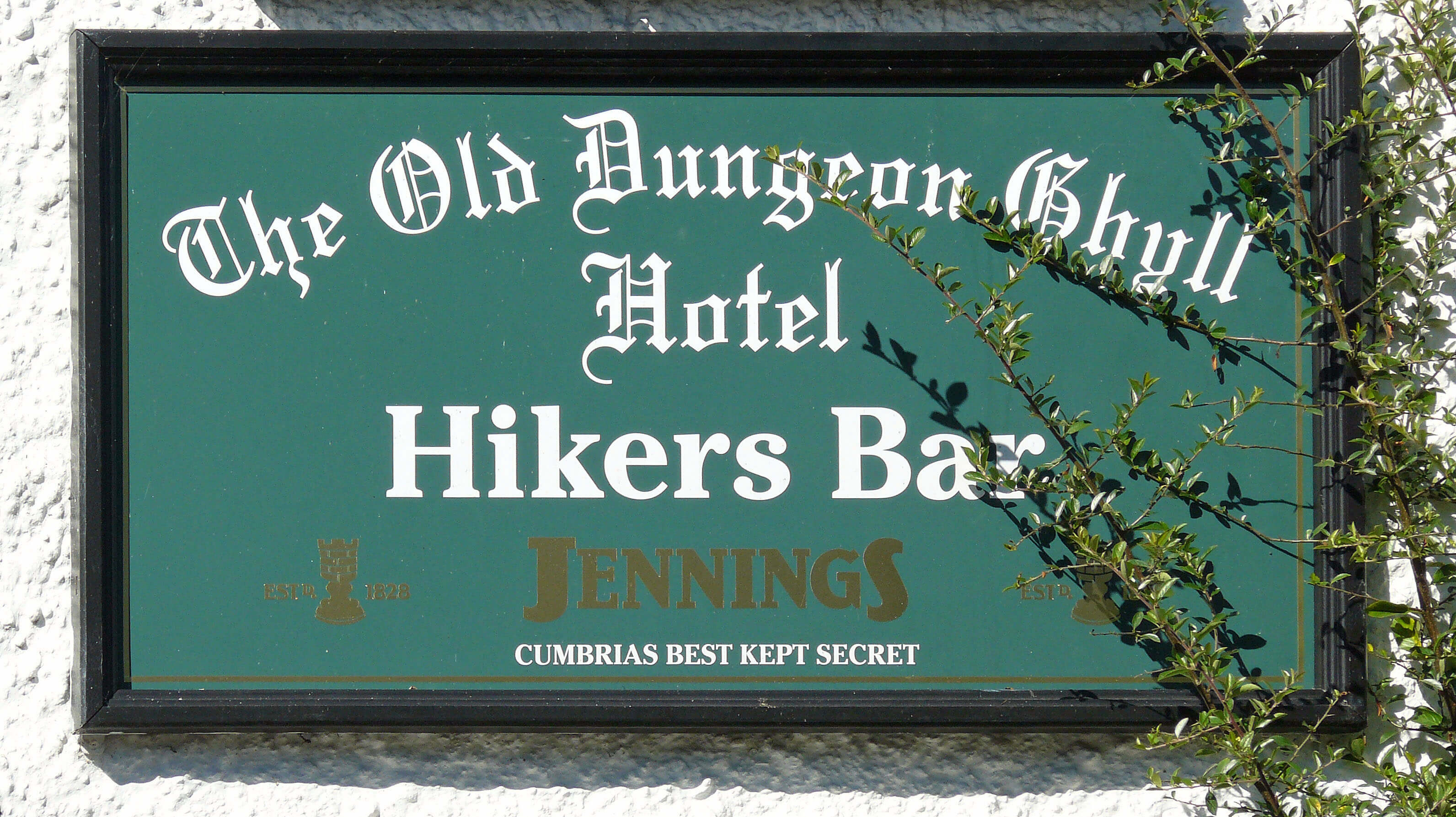
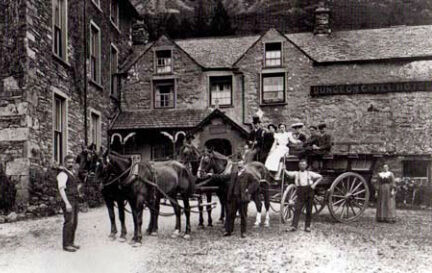 From Bowfell we walked down The Band into Langdale. We
dropped into Dungeon Ghyll for a well-deserved pint in what
the owners advertise as “Cumbria’s best kept secret”, which
is rather self-defeating. It was all very relaxed and convivial.
Richard perplexed the owner by asking to see the dungeon but
otherwise all was well.
From Bowfell we walked down The Band into Langdale. We
dropped into Dungeon Ghyll for a well-deserved pint in what
the owners advertise as “Cumbria’s best kept secret”, which
is rather self-defeating. It was all very relaxed and convivial.
Richard perplexed the owner by asking to see the dungeon but
otherwise all was well.
Until we went to sign in. Then we found out, as the owner insisted, that we had no booking. So far, I must concede, my team had carried out their duties well. Apart from our little misunderstanding in Coledale, our evening stays had gone smoothly. Thomas had kept us adequately nourished; and Richard had been fully prepared for all eventualities (apart from Harry dropping his torch in a pool).
Harry was not the most organised individual but eventually he managed to extract from his backpack a scrap of paper confirming the booking. The owner looked at it and immediately put it down. “This is The Old Dungeon Ghyll” he snapped, and turned away. Harry’s booking was for The New Dungeon Ghyll, which was a mile or so down the valley. This, I felt, was a shame as I was rather fond of the original Dungeon Ghyll. I don’t know the history of the two Dungeon Ghylls in detail, or whether there is or was any animosity between them, but of course originally there was only one Dungeon Ghyll. It didn’t need to call itself ‘Old Dungeon Ghyll’ then. But when the second place set itself up and had the nerve to adopt ‘New Dungeon Ghyll’ as its name the first must have felt obliged to add the ‘Old’. I don’t see why myself: York didn’t call itself Old York in response to New York.
Photos: Langdale from Pike o’ Blisco; Cumbria’s best kept secret (it says so along the bottom); The Dungeon Ghyll Hotel (it says so on the wall).
The Lake District National Park-and-Ride Scheme
From a Cumbria Council MeetingDiana Dubble-Barrell (chair): For the next item we are joined again by our dear friend Charles Smarm, the head of Cumbria Tourism Services. Another idea for the progress of Cumbria, Charles?
Charles Smarm: Yes indeed, Diana. This proposal is based upon my guiding principle, which is that we should seek to maximise our visitors’ input to the Cumbrian economy.
Joss Jenkinson (Cartmel ward): I’d go along with that, for a change.
Diana Dubble-Barrell: Please. Let Charles finish.
Charles Smarm: Did you know that 32% of the 12 million visitors to Cumbria every year contribute nothing at all to our economy?
Harry Cowan (Furness ward): Really! That’s 4 million people wearing away our mountains without spending a penny.
Charles Smarm: Yes and no. Anyway, I was at Sainsbury’s the other day and I noticed that they had quite a nifty car-parking scheme. You pay to park but you get your fee back if you can show a receipt from the supermarket. Now, as you know, we will soon have barriers on all the roads into Cumbria with a compulsory park-and-ride scheme. I propose that we charge each punter £10 to park and then give them their money back if they can show a receipt for at least that amount.
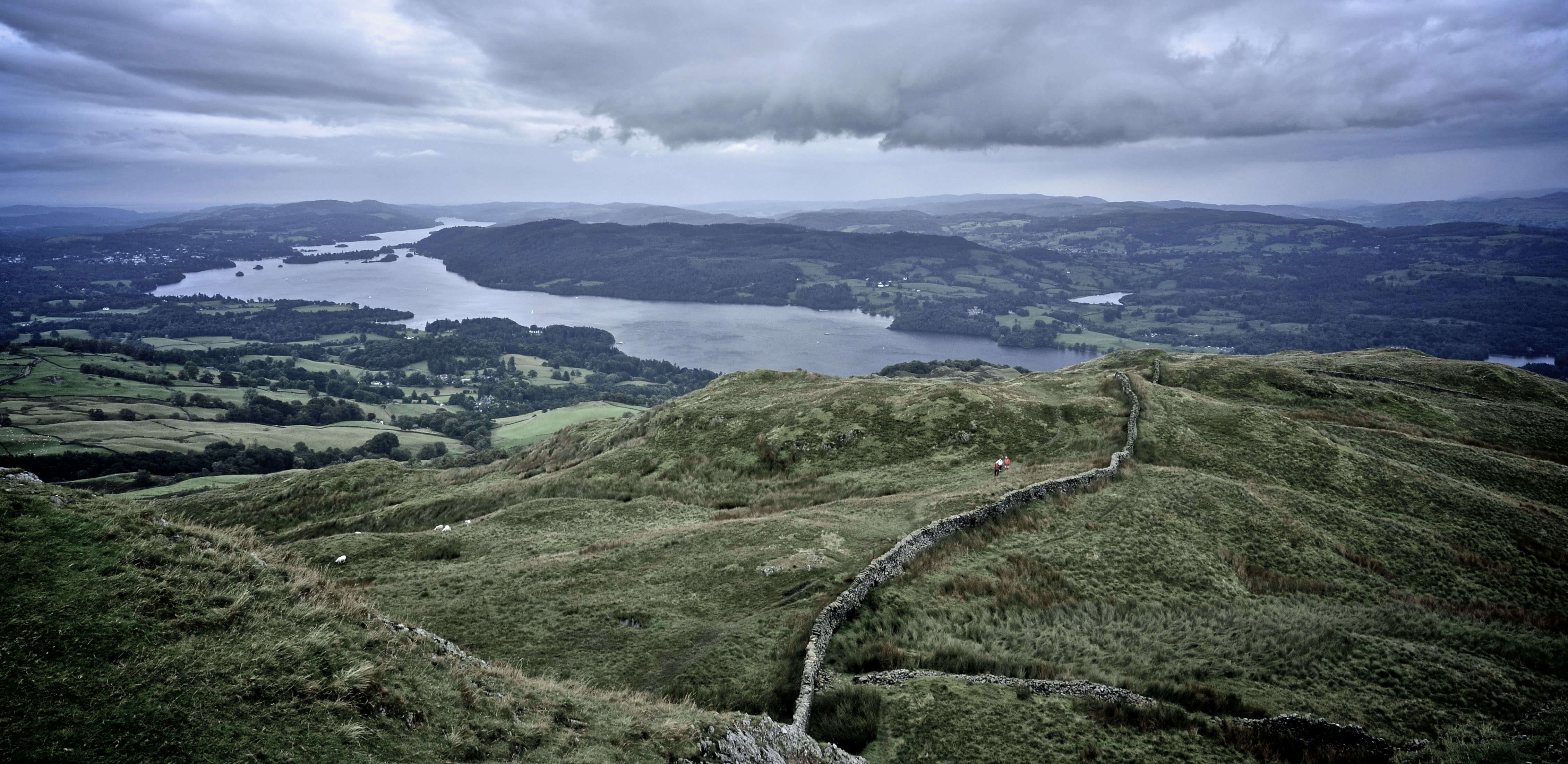 Harry Cowan:
I think I get it ... let me see if I’ve understood it. Those who now
drive to Ambleside, walk up Wansfell, have a cuppa from a flask
in the car-park, and then drive home (having paid nothing to us),
would instead have to park by the A591, pay £10 each, and then
in Ambleside think they might as well buy a new pair of gloves
to replace the ones they’ve just dropped on Wansfell and have a
tea and scone in Sandra’s Shed to get their parking fee back.
Harry Cowan:
I think I get it ... let me see if I’ve understood it. Those who now
drive to Ambleside, walk up Wansfell, have a cuppa from a flask
in the car-park, and then drive home (having paid nothing to us),
would instead have to park by the A591, pay £10 each, and then
in Ambleside think they might as well buy a new pair of gloves
to replace the ones they’ve just dropped on Wansfell and have a
tea and scone in Sandra’s Shed to get their parking fee back.
Charles Smarm: Exactly. An extra £120 million at least for Cumbria. Think what you could do with that.
Harry Cowan: And they’ll spend a darn sight more than £10 in Sandra’s Shed.
Charles Smarm: In any case £10’s an absolute bargain, for Europe’s No. 1 tourist attraction. Why, a family of four spends much more than £40 at Alton Towers or to see Bellini’s Norman at Convent Garden.
Mary Bland (Hartsop ward): Um ... I’ve been thinking ... if I go to the garden centre and spend £10 buying my aubrietias can I sell my receipt to a visitor for £5?
Charles Smarm: I suppose so. It’s not illegal to sell a receipt, I suppose. It’s only a piece of paper after all.
Mary Bland: And if I bought a TV in Comets, could I sell that receipt for £5 to another visitor?
Charles Smarm: I suppose so.
Mary Bland: So I could get £5 off anytime I went to a shop? The visitor would pay me £5 and get his £10 back from the car park.
Charles Smarm: I suppose so ... looks like it’s back to the drawing board, then.
Sam Windscale (Broughton ward): No, hold on a minute. I like it. After all, it’s us locals who have to put up with the inconvenience of all these visitors, barging us off the pavements with their rucksacks, clogging up the pubs every weekend. Why shouldn’t we get some financial recompense?
All and sundry: Hear, hear. (Spontaneous applause, and calls of “three cheers for Charlie”.)
Diana Dubble-Barrell: Well, I think you’re onto a winner this time, Charles. At last.
Photo: The view from Wansfell.
The Original Twelve Days of Christmas
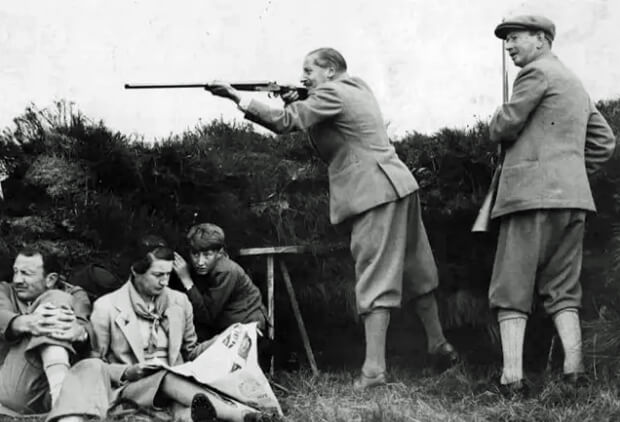 It is not widely known that the traditional song “The Twelve Days
of Christmas” began as a lament sung by the wives of Pennine
gamesmen. In the 19th century, as indeed today, men of means
deserted their homes at Christmas in order to massacre wildlife
upon the moors. The no-longer-wildlife was brought home
in order to mollify the wives. “The Twelve Days of Christmas”
records the increasing disillusionment of one wife, Lady Mossdale,
at this carnage and, as such, it is believed to be the first anthem
of the conservation movement. The song itemises the day-by-day
offerings of the Lady’s ‘true love’, Lord Mossdale:
It is not widely known that the traditional song “The Twelve Days
of Christmas” began as a lament sung by the wives of Pennine
gamesmen. In the 19th century, as indeed today, men of means
deserted their homes at Christmas in order to massacre wildlife
upon the moors. The no-longer-wildlife was brought home
in order to mollify the wives. “The Twelve Days of Christmas”
records the increasing disillusionment of one wife, Lady Mossdale,
at this carnage and, as such, it is believed to be the first anthem
of the conservation movement. The song itemises the day-by-day
offerings of the Lady’s ‘true love’, Lord Mossdale:
On the first day of Christmas my true love gave to me a partridge in a pear tree.
This refers, of course, to the grey partridge, not to the French, or red-legged, variety. Thanks partly to the efforts of the likes of our Lord, the grey partridge is now greatly reduced in numbers. Indeed, there cannot have been many about in our Lord’s time if he could only bring one home. Since then, many red-legged partridges have been reared and released to be shot, which someone as expert as our Lord would have found easy to do, as the silly birds are reluctant to fly. Neither partridge is known to be fond of roosting in pear trees. Originally, the line was “a partridge and a pear tree”, indicating that our Lord brought the pear tree to supplement his meagre offering of a single partridge.
On the second day of Christmas my true love gave to me two turtle doves and a partridge in a pear tree.
Experienced gamesman that he was, our Lord would not normally have shot sitting ducks like turtle doves. However, the dove is regarded as a symbol of love, which our Lord was anxious to demonstrate after his faltering first day. Thus, he brought two birds to his Lady. She, however, was no fool. She knew that turtle doves disappear from our hills in the autumn but she saw no harm in humouring her dear, if gormless, husband. They were really pigeons.
On the third day of Christmas my true love gave to me three French hens, two turtle doves and a partridge in a pear tree.
The Faverolles, or French hen, is, like all things French, much better than the English version, at least gustatorially. At that time, the French hen had only recently been introduced to the UK. It is a gentle, plump bird that does not present much of a challenge to a gamesman but no doubt our Lord shot the birds through habit rather than necessity. But he may have bought them at Penrith market. Either way, the exotic French hens indicate a commendable determination to satisfy his Lady.
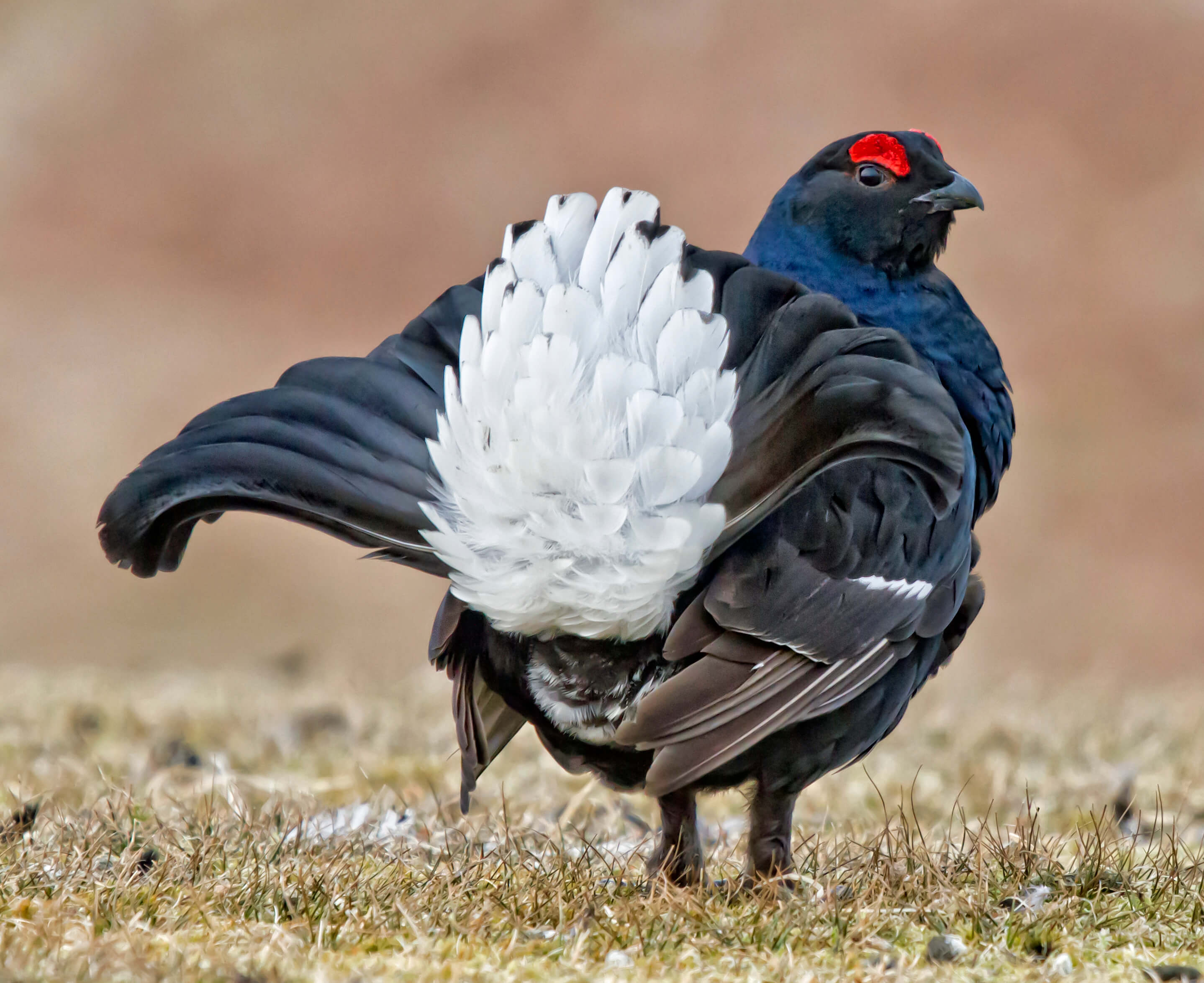 On the fourth day of Christmas
my true love gave to me
four calling birds,
three French hens,
two turtle doves
and a partridge in a pear tree.
On the fourth day of Christmas
my true love gave to me
four calling birds,
three French hens,
two turtle doves
and a partridge in a pear tree.This is a corruption of the original ‘colly birds’, ‘colly’ being an old English word for black. This, then, is a reference to black grouse, which at that time were common upon the Pennine hills. If our Lord brought back four black grouse, and presumably all the other gentry in his shooting party did likewise, then that’s rather a lot of black grouse. Not surprisingly, black grouse are no longer to be found in any numbers on the Pennines. This is a trifle sad for us but the black grouse provided more than a trifle for Lady Mossdale.
On the fifth day of Christmas my true love gave to me five golden rings, four calling birds, three French hens, two turtle doves and a partridge in a pear tree.
Disappointingly for our Lady, these were not really gold rings. They were gold ring-necked pheasants. Our Lady and friends still had plenty of French hen and black grouse to consume - this was, of course, before the invention of freezers. The ring-necked, or, as we call it, common, pheasant was introduced from Asia many centuries ago and became, well, common. It is still common, despite the endeavours of our gamesmen, because estates breed them in great numbers to be shot.
On the sixth day of Christmas my true love gave to me six geese a-laying, five golden rings, four calling birds, three French hens, two turtle doves and a partridge in a pear tree.
This is an indication that our Lord was beginning to find game thin on the ground, and in the air, on the hills. He seems to have joined the wild fowlers on Morecambe Bay. Perhaps he shot predecessors of the pink-footed geese that winter there now. The ‘a-laying’ could mean laying, dead, on a slab. Or perhaps the ‘a’ is a prefix, as in asymmetric, atonal, and so on, meaning ‘not’. By this stage, our Lady’s family was somewhat sated with its ornithic repasts and could not stomach six geese.
On the seventh day of Christmas my true love gave to me seven swans a-swimming, six geese a-laying, five golden rings, four calling birds, three French hens, two turtle doves and a partridge in a pear tree.
Despite our Lady’s pleadings, our Lord was back on the fields by Morecambe Bay the next day. I expect that he had seen many swans there and could not restrain himself from going back and shooting some of them. At this stage, I should say that I don’t agree with the usual interpretation that, for example, on the seventh day our Lord shot not only seven swans but also six geese, five pheasants, four black grouse, three French hens, two pigeons, and a partridge. I believe those items are mentioned again just as a reminder. It would have been physically impossible for our Lord to get up on the hills and along by the bay in one day, without a car.
On the eighth day of Christmas my true love gave to me eight maids a-milking, seven swans a-swimming, six geese a-laying, five golden rings, four calling birds, three French hens, two turtle doves and a partridge in a pear tree.
Of course, our Lord did not shoot eight maids. That would be a preposterous accusation. He was only interested in shooting anything that flew. The original version was ‘eight mallards a-quacking’. Over the years the mallards became ‘ma’ards’ and hence ‘maids’. The ‘a-quacking’ then became ‘a-milking’ to make it a little less nonsensical. Our Lady’s pantry was now overflowing with all the pheasants, grouse, geese, swans and ducks.
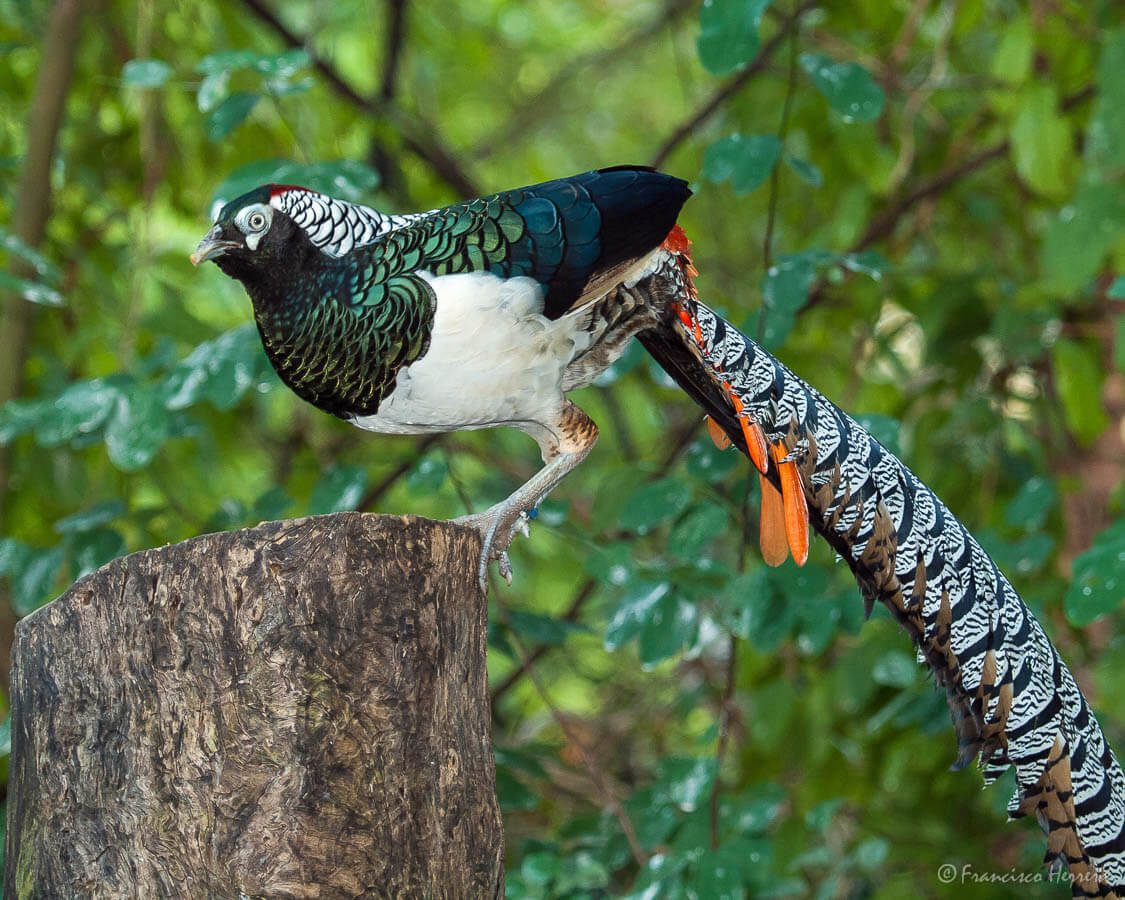 On the ninth day of Christmas
my true love gave to me
nine ladies dancing,
eight maids a-milking,
seven swans a-swimming,
six geese a-laying,
five golden rings,
four calling birds,
three French hens,
two turtle doves
and a partridge in a pear tree.
On the ninth day of Christmas
my true love gave to me
nine ladies dancing,
eight maids a-milking,
seven swans a-swimming,
six geese a-laying,
five golden rings,
four calling birds,
three French hens,
two turtle doves
and a partridge in a pear tree.On the ninth day our Lord shot nine Lady Amherst pheasants. Lady Amherst was none too pleased. She had brought them back from China to adorn her garden, not to be shot. But our Lord did not differentiate - to him, a pheasant was a pheasant and therefore existed only to be shot. Lady Amherst sympathised with our Lady, who was by now approaching the end of her tether: “My Lord Amherst is the same. Out all hours, shooting anything that flies. It is an addiction. They need our help and support, poor dears.”
On the tenth day of Christmas my true love gave to me ten lords a-leaping, nine ladies dancing, eight maids a-milking, seven swans a-swimming, six geese a-laying, five golden rings, four calling birds, three French hens, two turtle doves and a partridge in a pear tree.
Here the ‘lords’ are lapwings, whose leaping, tumbling flight was thought to resemble our Lord’s antics after a few drinks, invariably taken after a successful shoot and before an unsuccessful one. Lapwing are no longer shot, partly because there are fewer of them and partly because modern gamesmen do not have our Lord’s supreme skill. By now, our Lady had had enough: “This cannot go on. It is not sustainable. You have shot everything that is worth shooting. Our cooks need four-and-twenty blackbirds to make a decent pie. What do you expect them to do with ten lapwings?”
On the eleventh day of Christmas my true love gave to me eleven pipers piping, ten lords a-leaping, nine ladies dancing, eight maids a-milking, seven swans a-swimming, six geese a-laying, five golden rings, four calling birds, three French hens, two turtle doves and a partridge in a pear tree.
Our Lord did not listen. He was out again the next day, returning with eleven pipits, which provided an even less substantial feast than ten lapwings. The pipits do, however, demonstrate what a hotshot our Lord was. It takes considerably more skill to shoot a tiny pipit than it does to down a grouse. The ‘piping’, incidentally, is short for ‘piping cold’. Nowadays, we have the expression ‘piping hot’ but in the 19th century all pipes were cold. Our Lady begged him one last time not to shoot any more birds.
On the twelfth day of Christmas my true love gave to me twelve drummers drumming, eleven pipers piping, ten lords a-leaping, nine ladies dancing, eight maids a-milking, seven swans a-swimming, six geese a-laying, five golden rings, four calling birds, three French hens, two turtle doves and a partridge in a pear tree.
On the twelfth day our Lord came back with twelve woodpeckers, probably great-spotted, although they are lesser, or fewer, now. Our Lady was nonplussed but our Lord explained that there were no more birds on the fells to shoot because the ominous drumming of the woodpeckers had, he said, scared all the birds away. So he had shot the woodpeckers. Our Lady realised that it did not occur to him to attribute the absence of birds to the fact that he and his friends had shot them all. Our Lord was beyond help. No bird in the land was safe.
On the thirteenth day of Christmas his true love gave to him thirteen bullets killing.
Photos: Lord Mossdale (Lady Mossdale (seated) refused to accompany the Lord on his shoots after this occasion when she was expected to sit in the mud for four hours with loud bangs in her ear every minute. The other two seated look none to happy as well, although the two shooters are having a spiffing time); Black grouse; Lady Amherst pheasant.
The Life of Dame Mary Merewether
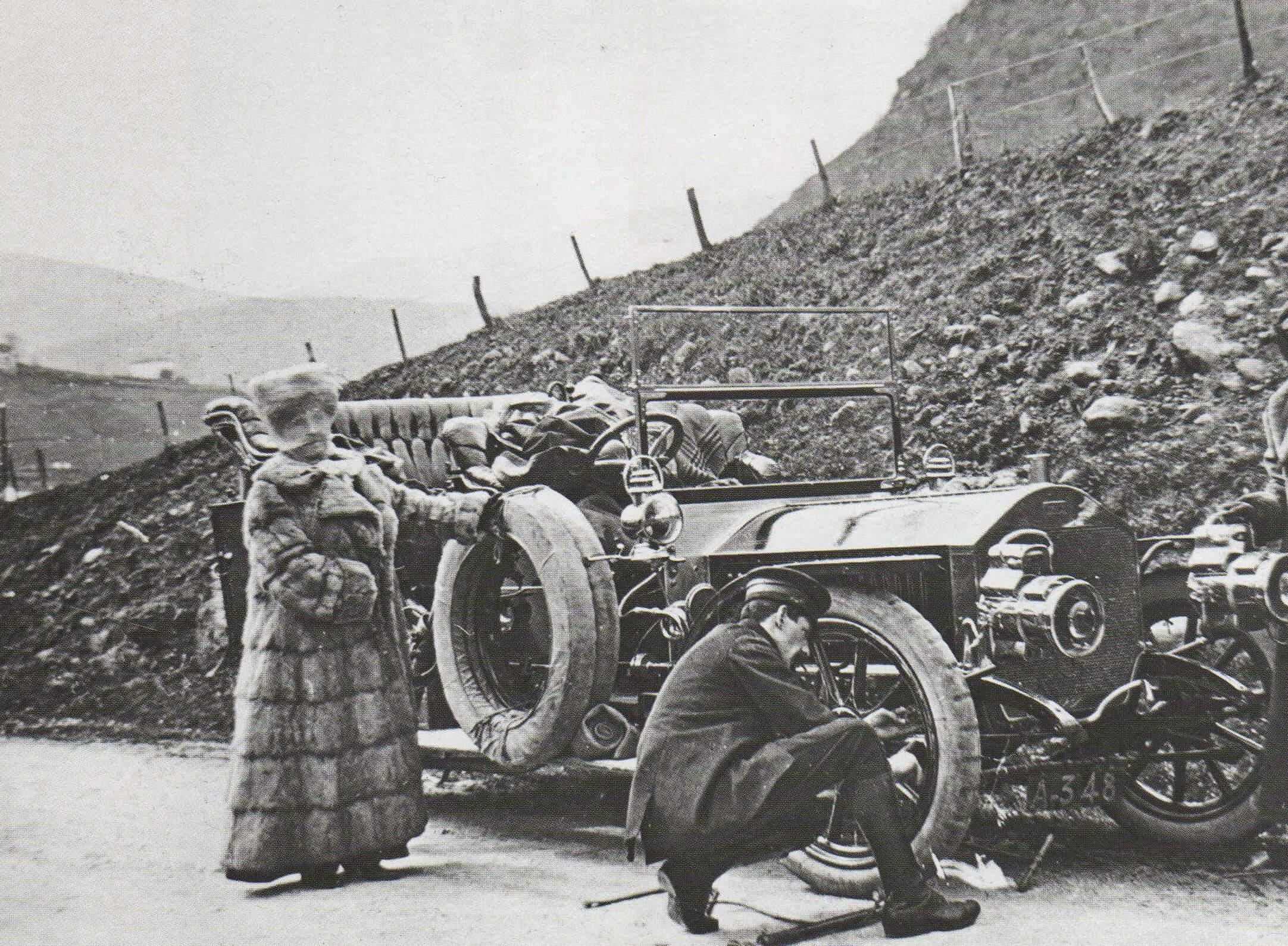 Dame Mary Merewether, the redoubtable feminist fell-walker
and environmentalist, yesterday passed away reluctantly at
the Swineshead Nursing Home, Kendal, aged 83.
Dame Mary Merewether, the redoubtable feminist fell-walker
and environmentalist, yesterday passed away reluctantly at
the Swineshead Nursing Home, Kendal, aged 83.
Dame Mary always objected to being described as a fell-walker but she is in no position to do so now. “This is the Lake District not the Peak District, so focus on the lakes, not the peaks” she said. Up until the unfortunate accident when she slipped off the gangplank of the Coniston Gondola, she walked one hundred furlongs every day, and for every step she insisted upon being able to see at least one lake. Somebody once asked her what counted as a lake. She replied “Young man, if you do not know a lake when you see it, you have no business to be in the Lake District”.
She had no truck with the masculine obsession to get on top of everything. She ridiculed the revered Albert Rainwhite, who she considered to have wasted thirteen years working out 924 ways up 214 mountains with only the merest reflection on the meres. “Twelve ways up Blencathy for a worse view of Derwentwater than what you get from Skiddorf, for heaven’s sake” she harrumphed.
Mary was born at Leighton Hall, renowned for its buzzard. She was the sixth child of the Hon. Henry and Agatha Merewether, who had already fled from the first five children to live in Mauritius. She was brought up by her eldest sister, who later wrote a best-seller Parenting without Parents which provided a too-intimate portrait of Mary’s childhood.
Mary was trained as a doctor but abandoned her course when she realised that the sight of blood so entranced her that she was in danger of harming her patients. So she turned to frogs. As she sliced them up, she gradually fell in love with them. Her interests broadened from amphibia, and she moved closer to the wetlands of the Lake District, in order to study its unique wildlife. She was forever, dawn to dusk to dawn, browsing the waters’ edges. Many startled visitors reported sighting a magenta hippo. She remains the only person to have gained any benefit from visiting the slopes of Sourfoot Fell, where she discovered that the Sourfoot mayfly may not fly at all.
Her publications led to a lectureship at the University of Lancaster, where she patrolled campus in her billowing magenta cape. Mary had few qualifications for academia: nightmarishly untidy, belligerent beyond belief, and utterly disdainful of students. But these particular qualifications stood her in good stead in the academic world and she rose inexorably to become the first Ranarian Professor at the University of Cumbria, sponsored by Eco-Retreats.
Her work on the flora and fauna of the lakes’ shores led to her endamement in 1985. Dame Mary leaves no offspring, of course, but legions of admirers who march like Amazonian warriors along her well-worn paths.
Her ashes will be scattered, as she wished, in her two favourite lakes - her top half in Buttermere and her bottom half in Creamy Water.
Photo: Dame Mary Merewether and her beloved Bertie (the car).
Corrections and Elucidations
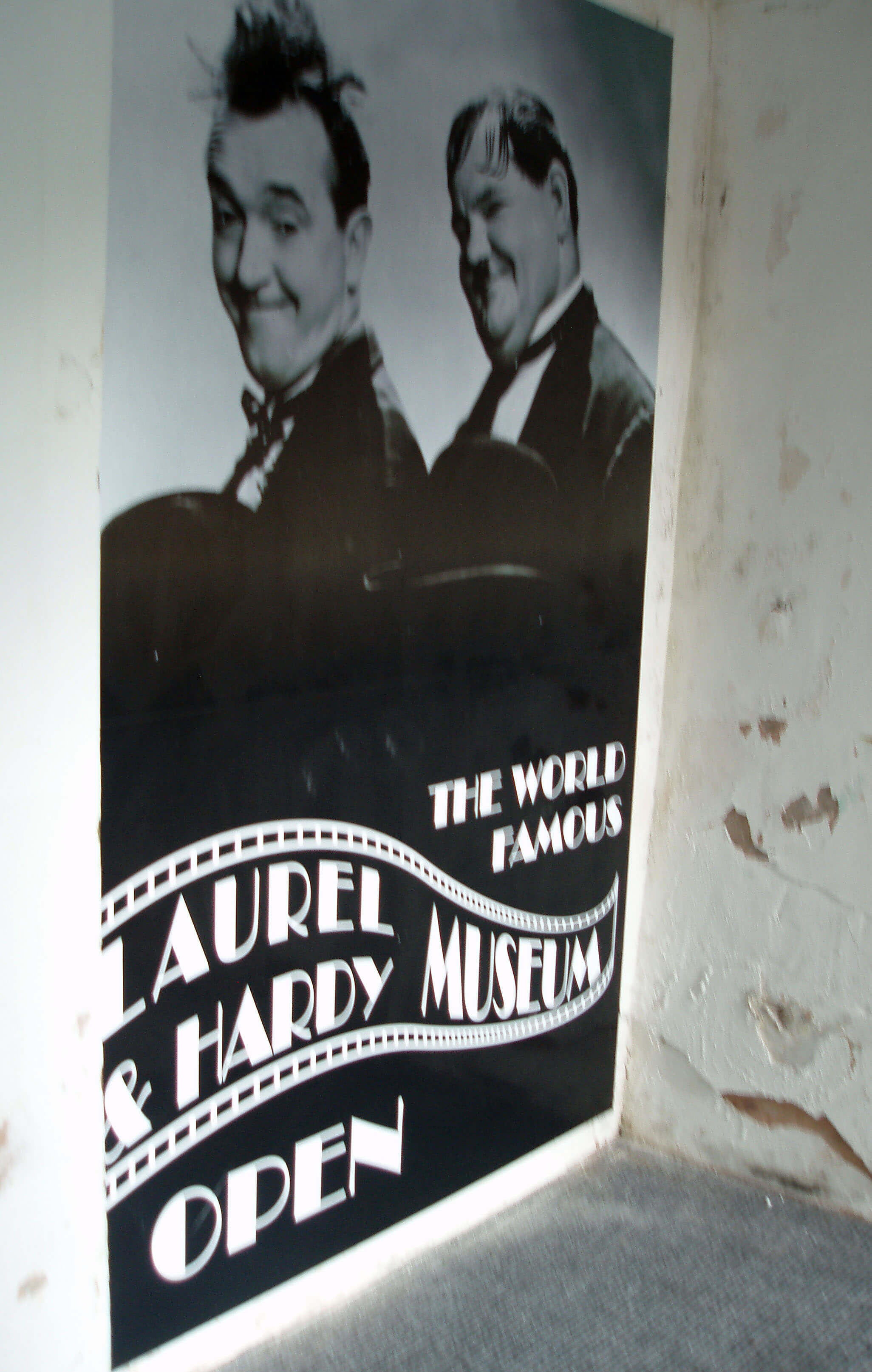 • We announced (Mar 8, p3) the opening of a new museum in
Ulverston concerned with Cumbrian laurel and hardy perennials.
We should have announced the re-opening of the Laurel and
Hardy Museum.
• We announced (Mar 8, p3) the opening of a new museum in
Ulverston concerned with Cumbrian laurel and hardy perennials.
We should have announced the re-opening of the Laurel and
Hardy Museum.
• We reported (Mar 15, p23) that the veteran climber Stanley J. Accrington was unhurt after falling 20 feet on Small Snack. In fact, he fell 200 metres off Great Gobble, which is a very different kettle of fissures.
• A reader wrote to ask if the old saying "Don't cast a clout till May be out" referred to the bush or the month - to which we responded "both" (Feb 28, p54). The reader has replied "Ah, ah. It was a saying but I wrote it out with a capital M, so it must refer to the month." She May be right.
• In our report (Mar 8, p25) of the wedding of Mr William Binks of Threlkeld and Miss Zoe Jackson of Ulpha we stated that the groom is a plasterer. He is in fact an estate agent. He was plastered. We also reported that the groom had said that they were honeymooning near the bride's father's residence when in fact they were staying near the Old Man (of Coniston).
• We have been informed by Sellafield Power Station Authority that we were mistaken in writing (Mar 1, p5) that “150 workers were temporarily laid off because of statutory outrages carried out by management staff”. We should have written “outages” apparently, although it is not a word in our dictionary.
• We said (Feb 13, p13) that the safest position for a mountaineer who falls off a vertical cliff is to try to land on slightly bent, rather than braced, legs so that the thighs are less likely to be driven into the abdomen. However, we have been advised that any faller who has the time to think about and act on this will have already fallen too far to survive.
• Several readers have written to complain about our statement that "Rainwrite's inimitable style has subsequently been imitated by several writers" (Jan 29, p60). We meant to say "imitated unsuccessfully" and so unsuccessfully that they were hardly imitations at all.
• On Mar 17 (p1) we reported that because of a malfunction of the zip-wire at the Brockholes Visitor Centre five children were left strangled, suspended in mid-air for over an hour. They were stranded, not strangled, we're pleased to say.
Four Men in Their Boots, Day 15
... Dungeon Ghyll ...
Invigorated by the thought that this was our last morning, we set off up the steep path to Stickle Tarn. Steep it was but also brief compared to many earlier climbs and we were soon beside the tarn. I had intended that we should climb at least one of the Langdale Pikes but when it came to it there were rather a lot of nobbles to choose from, so we didn’t. We felt no need to exert ourselves now. Instead we turned right and made our way over the undulating, indistinct ridge of Blea Crag, Swinescar Pike and Spedding Crag. It made a change to be off the beaten path and away from other walkers. Here, we could amble across, with nothing to worry about, lost in our own thoughts.... Loughrigg ...
Cutting above Redbank Wood, we reached the Loughrigg Terrace above Grasmere. This is the most touristic setting but nonetheless appealing. I stirred the men for one last effort, to climb the modest peak of Loughrigg Fell in order to better appreciate the view.Grasmere and Rydal were a picture below but the real reason I had persuaded them up here was higher. This lowly eminence provided a surprisingly wide-ranging view of many of the hills we had walked upon. To the east lay the Yoke - Ill Bell - Froswick ridge that we had strode upon on our first full day, so long ago. High Street was hidden but next we could see on the horizon Red Screes to Fairfield, where we had lost Harry. We could see the beginnings of the Helvellyn ridge and, through the Dunmail Raise gap above Grasmere, Skiddaw, where we had been drenched. So far away ... had we really walked all the way there and back in a great loop?
We sat there for some time reliving our adventures. We could not see Grasmoor, High Spy, Great Gable or Pillar, but we remembered well what happened there. Next on the horizon were the Langdale Pikes, where we were but this morning, and then Bowfell and Crinkle Crags of the day before. They obscured the highest point of Scafell Pike, where we had our glorious day, but there was a glimpse of Scafell. And then, further round, the Old Man of Coniston, where I saved the men from tragedy.
We savoured the scene and our many accomplishments within it. It was Harry who, in an unusual spasm of urgency, moved us on. He led us southwest towards Ambleside, spread out below us. We entered a sheltered hollow by Lily Tarn and came upon a large marquee with many people standing outside, for it was a fine, sunny day.
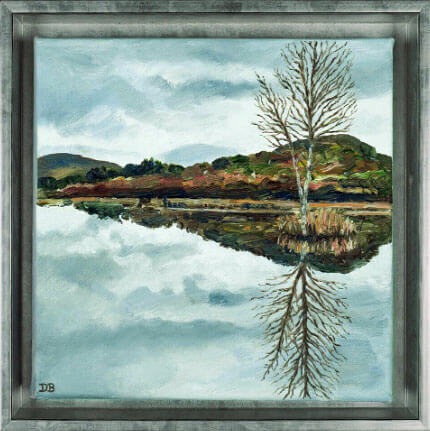 Clearly, this was an event of some significance for it to be
given permission to put up a marquee here. As we neared,
Harry strode ahead and began shaking hands with all and
sundry. We were surrounded by a crowd, thrusting glasses of
champagne into our hands, slapping us on the back, shouting
“Well done”, and so on. I didn’t know what was going on but
I felt relaxed about it all. Nothing could go wrong now, for we
had only a gentle stroll to Windermere railway station ahead
of us.
Clearly, this was an event of some significance for it to be
given permission to put up a marquee here. As we neared,
Harry strode ahead and began shaking hands with all and
sundry. We were surrounded by a crowd, thrusting glasses of
champagne into our hands, slapping us on the back, shouting
“Well done”, and so on. I didn’t know what was going on but
I felt relaxed about it all. Nothing could go wrong now, for we
had only a gentle stroll to Windermere railway station ahead
of us.
I fear that I had rather too much champagne too quickly for an empty stomach and I did not fully absorb what Harry said when eventually he introduced us to the people he had shaken hands with. Some were officials of the charity for which he had gained sponsorship. They were most grateful to me for all I had done on their behalf.
There were also a number of local dignitaries. A Mrs Bubble, who was something to do with the council, thanked us on behalf of the county of Cumbria. Someone who was introduced as Charles’s mother (although I never found out who Charles was) gave a little speech about a magnificent contribution to tourism in the Lake District. A nice young girl called Abigail said something about our adding to the culture of the Lake District but I have no idea what she meant. Not sure she did either. And then a Major Dobby Smith, and a Judge, Michael Thwaite ... who were all these people?
I was increasingly befuddled and bewildered by all this nonsensical adulation. In my haze I began to recognise some faces among this great crowd of people. Over by the barrels (where else?) were some Friends of Mardale Green. They waved me over for some beer. It doesn’t really mix with champagne but I didn’t care anymore. I felt like unwinding. After a while I realised, rather too late, that there was a substantial buffet in the marquee.
I noticed, standing alone by the tarn, that young Dutch couple, who I had developed such an affection for on Green Gable. What fine brave youngsters they were! I went over to give them a hug. Standing even more alone was that foolish fellow who broke his belt on Bowfell. He said he had come to say thank you, which I graciously accepted. But I didn’t hug him.
A group chatting to Harry were vaguely familiar. After some prompting, I remembered them as that jolly crowd we had fallen in with at Skiddaw House when we sheltered from the rain. And another group - were they the ones at Black Sail who laughed at me? I found it hard to focus on them. Perhaps I should have gone and sorted them out but I couldn’t be bothered now.
It all felt a bit like the end of a pantomime, when the cast all gather on the stage to take a bow. Most of the characters you’d hardly noticed before. And there were many of them here too. Harry had said hello to so many people I could hardly be expected to remember who they all were. And there were some people here I’m sure I’d not met before. There was a lovely lady, Sheila Corker. Somebody said she liked to run naked on the hills. I asked her to show me but she said “Not here”. I think that means “Yes, somewhere else”. So that’s promising. I have her phone number here, or somewhere.
She was having a laugh, reminiscing with a constable, PC Pennystone, I think. I don’t know why the police needed to be in attendance - perhaps because of the Friends, who are notoriously rowdy, as they were becoming here. There were also a couple of religious people, a Reverend Fenella and a Canon Limpet (ridiculous name but I think that’s what he said!). Talked mainly to each other, which was just as well. No idea why they were here. Nothing remotely religious about our long walk. And there was a jovial Irishman, Seamus Dannybeck. He seemed the life and soul of the whole party. What a credit he was to that fine body of people, the Irish! Another group accosted me. Seemed rather earnest. Didn’t catch all their names - Peter, Sue, Myrtle, I think. Wanted me to be honorarary president of some society or other. Well, I was the worse for wear but they can’t catch me out as easy as that. Said I’d think about it, whatever it was.
And there was dear Sheila. Have I mentioned her? Lovely Sheila. “Sweet little Sheila, you’ll know her if you see her; Blue eyes and a ponytail; Cheeks are rosy, she looks a little nosy; Man, this little girl is fine”. Nice song - by, who was it?, Buddy Holly?, if it wasn’t him it should have been - but not a good description of Sheila. She’s no little girl: she’s a real woman.
Where were my friends? My dear friends. My best friends. I’m always looking for them. Didn’t we have to move on? Which way to Ambleside? There was much cheerio-ing and thankyou-ing but at last we moved on. I think we did. We moved anyway. The path was much rockier than before. I had trouble keeping on it but my three friends grabbed an arm each and walked me along. No, that can’t be right. Whatever, between them, we moved.
... Ambleside ...
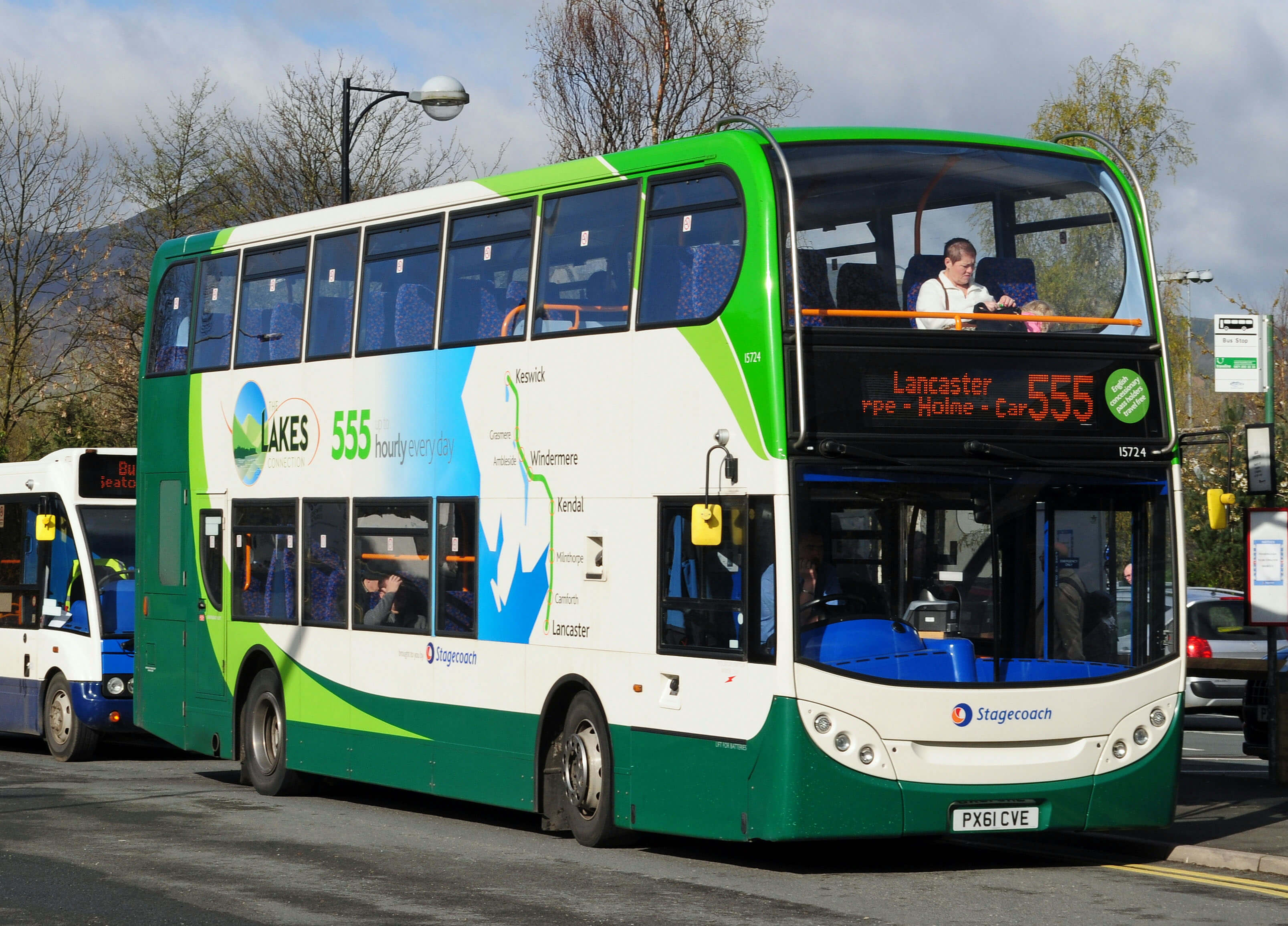 Somehow we were sat in a tea shop in Ambleside with four
black coffees. The others helped me to the toilet, which I made
full use of. I said hi to everybody in the cafe but they weren’t
as friendly as my good Friends of Mardale Green - or super
Sheila (where was she now?, I wondered). They just muttered
“disgraceful”, “appalling”, “this time of day!”. What time of
day was it anyway? No idea.
Somehow we were sat in a tea shop in Ambleside with four
black coffees. The others helped me to the toilet, which I made
full use of. I said hi to everybody in the cafe but they weren’t
as friendly as my good Friends of Mardale Green - or super
Sheila (where was she now?, I wondered). They just muttered
“disgraceful”, “appalling”, “this time of day!”. What time of
day was it anyway? No idea.
I don’t think they knew who I was. So I told them. “While you’ve been sat here for two weeks with your cake and tea, I’ve been to the tippy top of hundreds of mountains. Maybe thousands. And I’ve just been shaking hands with Mrs Bubble, and nice Abby, and Charles’s mum, and Major Dobby and lovely Sheila. 'Never knew a girl like a little Sheila; Her name drives me insane ...'". I was made to sit down.
Richard was studying a piece of paper that he’d got out of his backpack. Various numbers were being batted about: five five five four thirty two six fifteen ... I insisted on paying my share but I was told not to worry. So I didn’t. Next thing I knew I was on a bus. This didn’t seem quite right. Weren’t we supposed to walk to Forrest Head or somewhere? I was told not to worry. So I didn’t. “Me and Sheila go for a ride; Oh-oh-oh-oh, I feel all funny inside; Then little Sheila whispers in my ear; Oh-oh-oh-oh, I love you Sheila dear ...”
I may have dozed off. I don’t remember anything until I was being pushed onto a train. I was told not to worry. So I didn’t. My magnificent three friends would look after me. I was nearly asleep ... YYYYYYYYYYYYYYY ....
Photos: Lily Tarn; 555 bus.
Appendix: Notes on the Rainy Day Rambles Manuscript
The Rainy Day Rambles (RDR) manuscript is best appreciated from afar - from as far afar as possible, in fact. Wainwright, in his little books, drew views from what he called “imaginary ‘space stations’” that used “deliberate distortion in order to show detail clearly”. We need something similar here. So I am sat here in my study in 2115, a vantage point that provides a clearer perspective. Whereas the author of RDR (Arthur) muddled the past, the present and the future, from where I sit it is all in the past.The interpretation of RDR is complicated by the fact that the Lake District underwent a turbulent transition in the 21st century, a transition accelerated by the Great Energy Crisis of the 2060s. It is hard to believe today, now that the emergency measures introduced then have been fully absorbed into our lifestyle, but at the turn of the millennium almost all adults owned a car, that is, a mode of transport which enabled them to travel wherever they wished, with no reason needing to be given to the authorities!
The Prohibition of Public Travel Act of 2066 decreed that no journey of greater than ten kilometres could be undertaken (except by foot, horse or bicycle) without permission and without paying a considerable fee to hire a Government Taxi. The so-called tourists, to which RDR refers, disappeared from the Lake District, completing the trend of the previous decades during which the price of fuel had continued to rise.
Another fact that we find incredible today is that a hundred years ago almost nobody grew any of their own food! For example, their apples came from New Zealand rather than their own garden! At that time the Lake District provided a diet of mutton, damsons, a few char and not much else. The Emergency Coalition Government of 2068 determined that all areas must be self-sufficient in food. Each local council had to ensure that everybody could obtain all the food they needed by walking, riding or cycling to where it was produced.
These draconian measures did, of course, also cause problems. For example, the prohibition on travel meant that the Lake District population was frozen with those who happened to be resident in 2066. Since nearly all the women had moved there on their or their partner’s retirement and were therefore beyond child-bearing age, the population rapidly declined. The subsequent Repatriation Act of 2089 allowed individuals of Cumbrian descent bred in captivity elsewhere to return to re-populate Cumbria.
Overall, then, in order to interpret RDR today we must put aside our familiar sedentary, market-gardening existence and imagine a Lake District where millions of people visited on a whim and where almost everything was geared towards providing them with something to do when they were there. The following notes may help. Or they may not.
These Boots
Scholars cannot agree whether the photograph in Wastwater Hotel shows some of Arthur’s boots, or whether some of these boots are Arthur’s, or both (see JoCH, 155, 44-57, 2106). There are more than twenty boots shown but of course Arthur may have bought boots other than at These Boots ....The photograph is by George Abraham. The fact that there is no indication of any permission to use the photographs in RDR rather confirms the theory that it was written for self-amusement not publication. (Please see the ‘Note about the Photographs’ at the end.)
Save Our Sausage
The Bureaucratiat eventually decreed that the sausage may only be made in Cumbria. Unfortunately, Cumbria also includes parts of old Westmorland and Lancashire. Cumbrian butchers in old Cumberland appealed to the European Supreme Court to prohibit butchers in the non-Cumberland parts of Cumbria from making Cumberland sausages. The outcome is still awaited.Tak Hod: A Book for Offcomers
The photograph of synchronised wrestlers was taken by William Baldry. Cumbrian wrestlers were a favourite subject for pioneering photographers because their stances, often maintained for hours, were ideal for the long exposures that the first cameras required.Four Men in Their Boots
Controversy rages over whether the Four Men saga is by the same author as the rest of the RDR manuscript. The recent application of psycho-authorial analytic techniques (JoCH, 158, 1-33, 2109) has suggested that the ‘Four Men’ author has a personality disorder not shown in the other documents. The majority view, however, is that this is simply Arthur relaxing, revealing his natural self whilst reminiscing about an actual expedition. It is, no doubt, an entirely factual account, unlike most of the other items, where there is sometimes a suspicion of exaggeration. Since the narrative is truthful there is little to add to the events that befell the four men. However, Arthur’s status as a self-proclaimed route-planning expert has come into doubt after the discovery that the route is but a minor variation on that presented in Tom Calvert’s The Lakeland Ridges Challenge Walk (1995, Hawes: Leading Edge Press).You Don’t Need a Weatherman ...
... to know which way the wind blows, according to the esteemed poet Bob Dylan. The report of the Flimby Wind Turbines Enquiry is an historically significant document, giving an insight into the early stages of the energy problems that led eventually to the Great Energy Crisis of the 2060s. It is revealing that people remained obsessed with trivial issues despite the looming crisis, which must have been plain for all to see (for further discussion see the Journal of Cumbrian History (JoCH), 156, 456-477, 2107).Plane Sailing on Windermere
The Rotary Club of Windermere began an Air Show in 2000. Rotary Clubs were secular organisations with the stated aim of helping to build goodwill and peace in the world. Air shows (now long prohibited) hardly brought peace. They wasted fuel on unnecessary flights purely so that people could look at planes, even though the skies were full of them anyway.The Way We Were, with Silas Jessop
This photograph of Silas Jessop was taken by Herbert Bell. The names of the other two characters are not known.The Fairy Fell Roundelay
The ‘Fairfield Round’ was a popular walk when fellwalking was common. The route was as described, from Ambleside by High Pike to Fairfield and back over Great Rigg. The fouetté rond de jambe en tournant is most famously performed in the pas de deux of Swan Lake. But as the idea is to perform many turns without one’s toe moving a centimetre it would have been useless for getting off the mountain.Mrs Mudderdale’s Diary (June 15)
‘Activity weeks’ were a short-lived manifestation of urban guilt at the way rural lifestyles had been ruined. Their popularity rapidly waned as everybody became farmers, of a sort.What Bare-Faced Cheek?
Painstaking research by Alice Ackerman (JoCH, 157, 113-136, 2108) has revealed that the resonantly Cumbrian surnames of the ladies are not from Arthur’s imagination, as it may seem. They are in fact all old Cumbrian dialect words for ‘beat’ or ‘hit’. They are among 130 such words (there must have been a lot of beating in old Cumbria) listed in Land of the Lakes (1983) by the obscure writer Melvyn Bragg.‘Peter Blunt’ could be a mis-reading of Pete Bland, once a running specialist shoe shop in Kendal.
Nature Notebook
As the ‘foxes’ item is introduced as a dull news story, some readers have assumed that “foxes are never seen on a Sunday” is an old Cumbrian saying. In fact, no old Cumbrian has ever been heard saying it.High Society
Albert Rainwhite is, of course, a very-thinly-veiled Alfred Wainwright, whose books are still in print today, 150 years after they were written, even though nearly all the walks described are now illegal. Readers adore the quaint pictures, scarcely believing that anyone could possibly have bothered to make every little mark by pen-and-ink.Wainwright’s ashes were scattered on Haystacks, an act that the Health and Safety Ministry has since made illegal.
Low Brow Opening
Low Brow was closed shortly after it opened. A wall fell on four visitors. The National Truss wanted to restore the building to its previous unstable state but planning permission was refused.Mrs Mudderdale’s Diary (August 13)
Arthur was mistaken in his belief that this photograph was of Mrs Mudderdale. It is now known to be of a Ms Beatrix Potter, a farmer-writer, or writer-farmer, whose books about anthropomorphised animals were once quite popular with children, their parents and the Japanese.How Pathétique
Musicologists have rejected Arthur’s theory about Tchaikovsky’s 6th Symphony on the grounds that, although Tchaikovsky did visit England in 1893 (the year he composed the symphony) there is, as yet, no evidence that he travelled to the Lake District.Nun the Wiser
After years of acrimony, a court case decreed that the rock should be painted as a Bishop in even years and a Nun in odd years. Thus was true equality achieved. Although the Ladies were not altogether happy to be considered odd.The Tale of Squire Ruskin
Dr Reginald Hollis, Director of the Ruskin Research Institute at the University of Cumbria, has recently provided a detailed analysis of ‘The Tale of Squire Ruskin’ (JoCH, 159, 23-58, 2110). He concluded that the tale is riddled with accuracies (young Ruskin did write a very long poem; his father did sell alcohol; ...; Ruskin did invent ‘illth’; and John Prescott did study at Ruskin College) but “is wholly lacking in the respect due to an intellectual giant who has a world-class research institute devoted to his study. In comparison, Arthur is a pygmy - no disrespect to pygmies, who I am sure are all fine, brave and wise people, unlike Arthur”.Arthur is a little confused about the ‘butterfly artist’. The American-born artist James Whistler (1834-1903) used a stylised butterfly as a signature for his paintings. Of no account today, Whistler was a respected painter in the 19th century. His case against Ruskin was a cause célèbre in 1877. Whistler won the case but was awarded only a farthing (0.1p) in damages.
The photograph of Ruskin was taken by George Abraham. Where to is not known. It is also not known whether the ‘his’ in ‘his dog’ refers to Ruskin or the valet.
Hawkshead 3 Windermere 4
Here we appear to have an instance of Arthur’s slipshod scholarship. Most authorities believe him to have muddled the photograph of the Hawkshead Athletic football team with that of the Ravenglass railway station staff (see below) - but see JoCH, 152, 143-145, 2103.Pen Your Pimp
Yes, that really is how shepherds used to count. Researchers have, however, been unable to find any record of a ventriloquial whistler.The Duke of Westminster’s A to Z
Before the lawyers begin sharpening their quills it should be emphasised that Arthur's twenty-six items were entirely fictional. (Between you and me, research has shown that they were not entirely entirely fictional because he seems to have smuggled in at least six nuggets of non-fiction: about Daniel Snow, Eaton Hall, the Scrope v Grosvenor case, George, Loelia Ponsonby (L seems to be entirely factual apart from the bit about the magazine), and the family motto.)A Word’s Worth
The notion of a ‘scrabble week’ may seem rather ridiculous but in fact such things were tried in the 2000s in desperate attempts to lure yet more tourists to the Lake District.See the note above regarding the muddle with the photographs. Railway historians assure us that the previous photograph is in Ulverston, not Ravenglass, railway station.
One Fell Swoop
This photograph is surely another mistake by Arthur. It looks more like Everest than Helvellyn, a suspicion perhaps confirmed by the fact that Sherpa Tensing, who held Edmund Hillary’s hand to the top in 1953, always used to say “Just as you wish” when asked for his opinion.Border Conflicts
The 1974 redefinition and renaming of county borders caused resentment that lingered for decades. Westmorland, Cumberland and Yorkshire disappeared; Cumbria and North Yorkshire were created; Lancashire remained in name but with new borders. Locals were confused; allegiances were challenged; bureaucracy reigned.Many Happy Returns to Bassenthwaite
This flight of fancy refers to the return of the osprey to the Lake District in the 2000s. The sight of an osprey is not a particularly remarkable event today, now that there are so few people around to scare them off, but at that time people came in large numbers to see the single pair of ospreys nesting by Bassenthwaite. Expert ornithologists point out that osprey pairs do not return together. I’m no expert but I believe that they don’t talk to one another either.At Your Beck and Fell
The item on the Cumbrian Mountain Service is another one that the modern reader will have difficulty in understanding, now that the fells are virtually empty. In the 2000s not only did millions of people scramble about on the hills, twisting ankles and breaking legs, but thousands of foolhardy ‘climbers’ deliberately endangered themselves by tackling the most precipitous cliffs. Inevitably, from time to time, they fell off, causing themselves serious injury or death. And they expected the Mountain Rescue Service to pick up the pieces, without any payment whatsoever! The definitive history of the Cumbrian Mountain Service was published in JoCH shortly after it was closed down because of the lack of demand for its services (JoCH, 118, 1-265, 2069).The Loneliness of the Long-Distance Fell-Runner
The fell race photograph is by William Baldry, taken in the 1870s, but at Grasmere not Ennerdale, it is believed. This item has led to considerable confusion and consternation because of the apparent chronological inexactitude of having legs put in plaster in the 1870s. Sheila Gavin (JoCH, 149, 13-15, 2100) argues that the ‘plaster’ then was not as we know it but more like what was used on walls.Bluebird Flies Again
The apparently tasteless item on Bluebird, considering that Donald Campbell died in the accident of 1967, was probably in response to the actual campaign, led by Campbell’s daughter, Gina, to have Bluebird repaired and driven again on Coniston. It is believed that at the time Arthur wrote this item Bluebird memorabilia were on display in the Ruskin Museum (even Arthur’s fertile imagination could not speculate on what Ruskin would have thought of Bluebird memorabilia in his museum).Farrago in Court
The case of Frederico Farrago makes little sense today when the few fell-walkers there are must keep to the reinforced pathways provided. Unbelievable as it now seems, until 2033 walkers could wander at will on the hills, causing erosion everywhere. This case may be a comment on the controversial path built on the line of the Roman road on High Street in 2008.The Legends of Lakeland
The other individuals named in the legend are the poets Robert Southey and William Wordsworth, with the two pairs of sisters being Edith and Sarah Fricker and Mary and Sara Hutchinson. This version of the legend basically accords with Taylor Coleridge’s own account, although he did not admit to shouting from the top of Scafell or even to realising that he was not at the highest point of England.The Way We Were, with Solomon Seal
Solomon Seal independently discovered the ‘four-colour theorem’, first conjectured by mathematicians in 1852 and not proved until a computer did so in 1976. Seal remains the only person to have found a practical application for the theorem.The Wild Places
The Wild Places is a real book, unlikely as it may seem. The previous books reviewed are imaginary, as far as experts have been able to discover. The second The Wild Places book cover (the one with the mermaid) is believed to be of a different book with the same title.The Lake District National Park-and-Ride Scheme
The item about ‘entry fees’ to the Lake District has proved one of RDR’s most contentious. Some critics seem unable to believe that there was a time when anybody could enter the region for free (see JoCH, 155, 34-85, 2106 and JoCH, 156, 296-320, 2107).The Life of Dame Mary Merewether
The photograph of Dame Mary Merewether was taken by Charles Walmsley. The name of the chauffeur-mechanic is not known. Dame Mary always called him ‘you’.Note about the Photographs
Arthur left a large pile of photographs, slides, negatives and newspaper cuttings. Some were attached to textual items presumably with the intention to include them (as I've done above) to brighten up the turgid text. The provenance of all these photographs is not known. There is no indication that Arthur obtained, or even sought, permission to use any of the photographs. Maybe he died, or had to flee the country, before embarking on this tedious task. At all events, it is much too tedious a task for me to embark on now.If any photographer should encounter a photograph of their own here and should object to its use within this frivolous document (and might indeed intend to sue for violation of copyright) please let Arthur know. Failing that, please let me know, at johnselfdrakkar@gmail.com. If you’d like the photograph removed then I will, after gently pointing out that you really shouldn’t have left your photograph lying around for a scoundrel like Arthur to get his hands on, of course reluctantly do so.
If, as seems much more likely, you feel privileged and honoured to have been allowed to contribute to this fine document and would like to see your contribution suitably acknowledged then, again, please let me know and I will add a list of esteemed contributing photographers right here:
© John Self, Drakkar Press
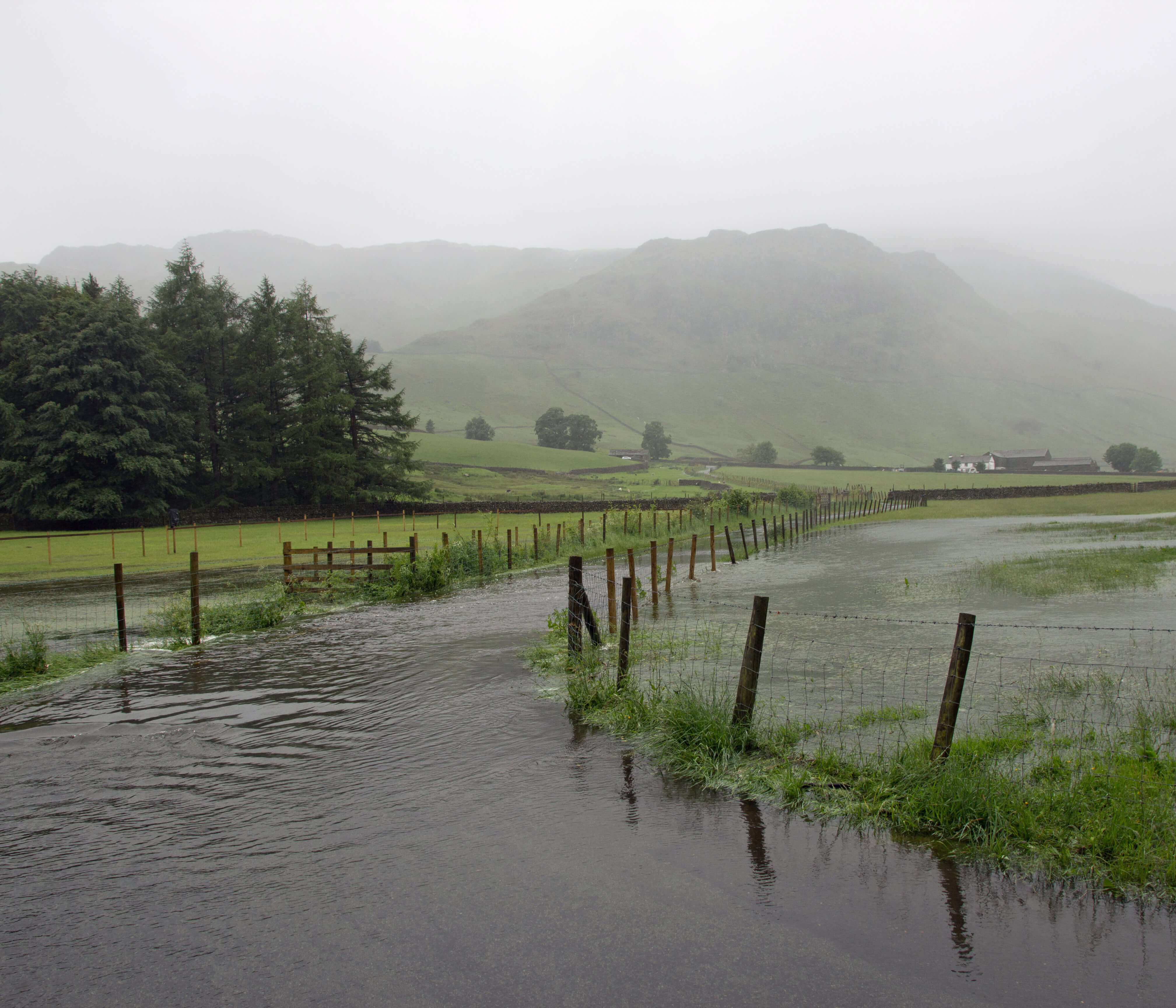 Editorial
Editorial
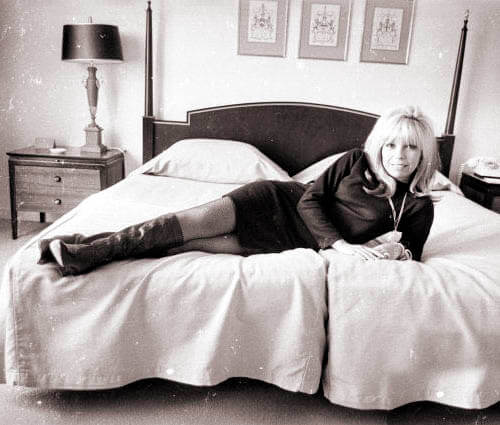 I resolved to be decisive. Yesterday I had wandered the streets of Ambleside, daunted by the shop window displays,
never once daring to go in. Today would be different.
I strode to the first boots shop, took a deep breath, and marched in. It was the chemists.
I resolved to be decisive. Yesterday I had wandered the streets of Ambleside, daunted by the shop window displays,
never once daring to go in. Today would be different.
I strode to the first boots shop, took a deep breath, and marched in. It was the chemists.
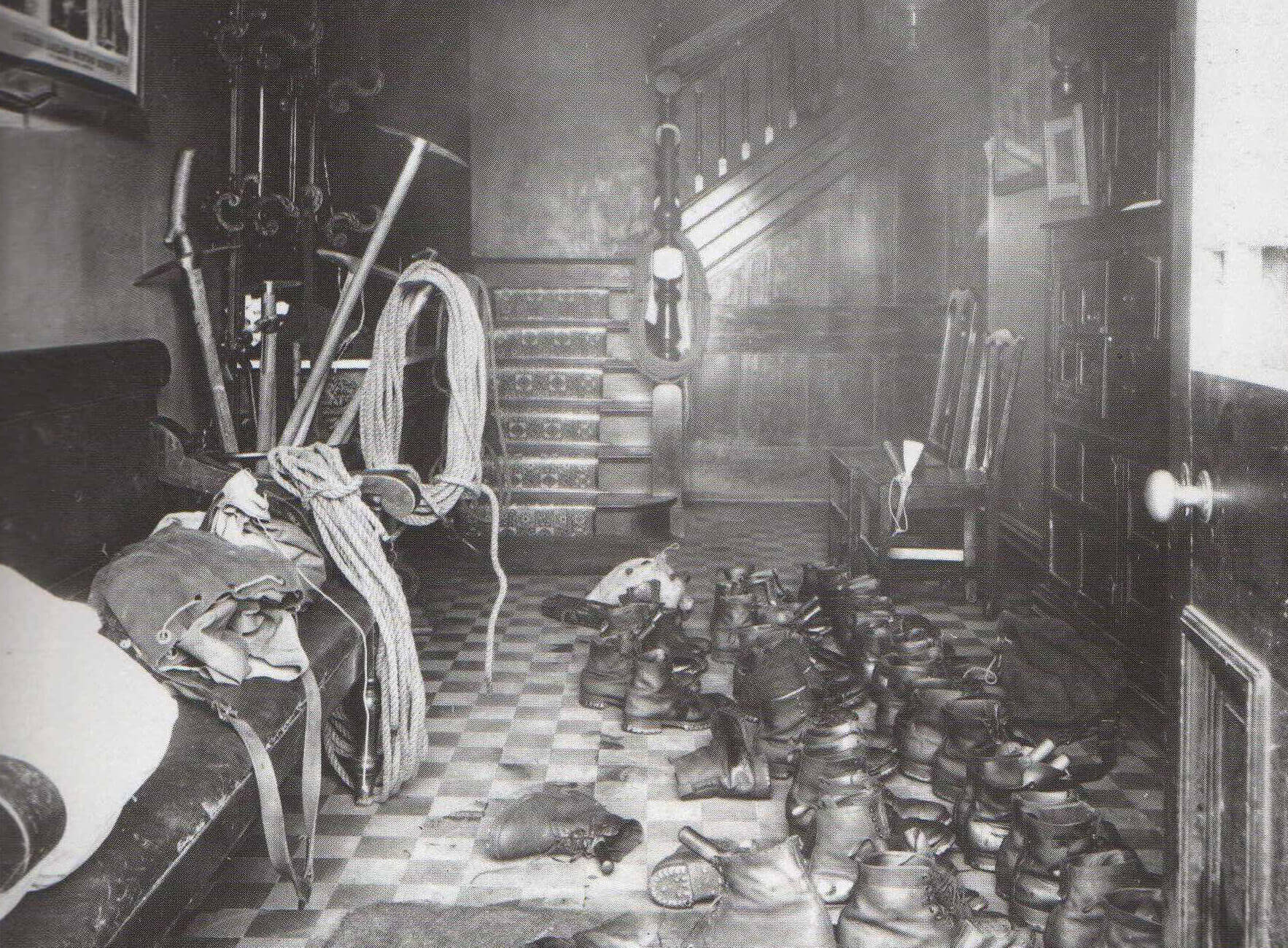
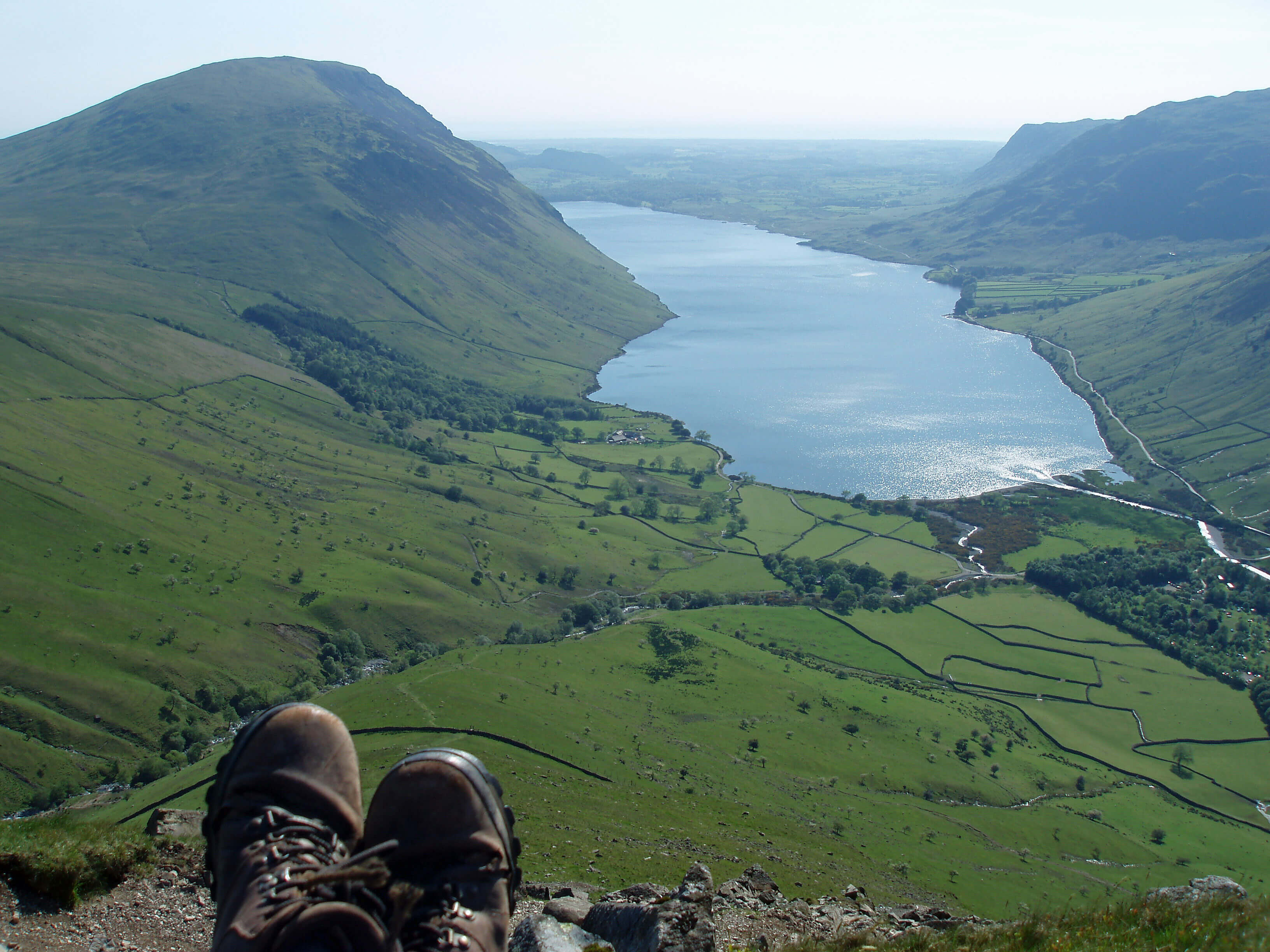
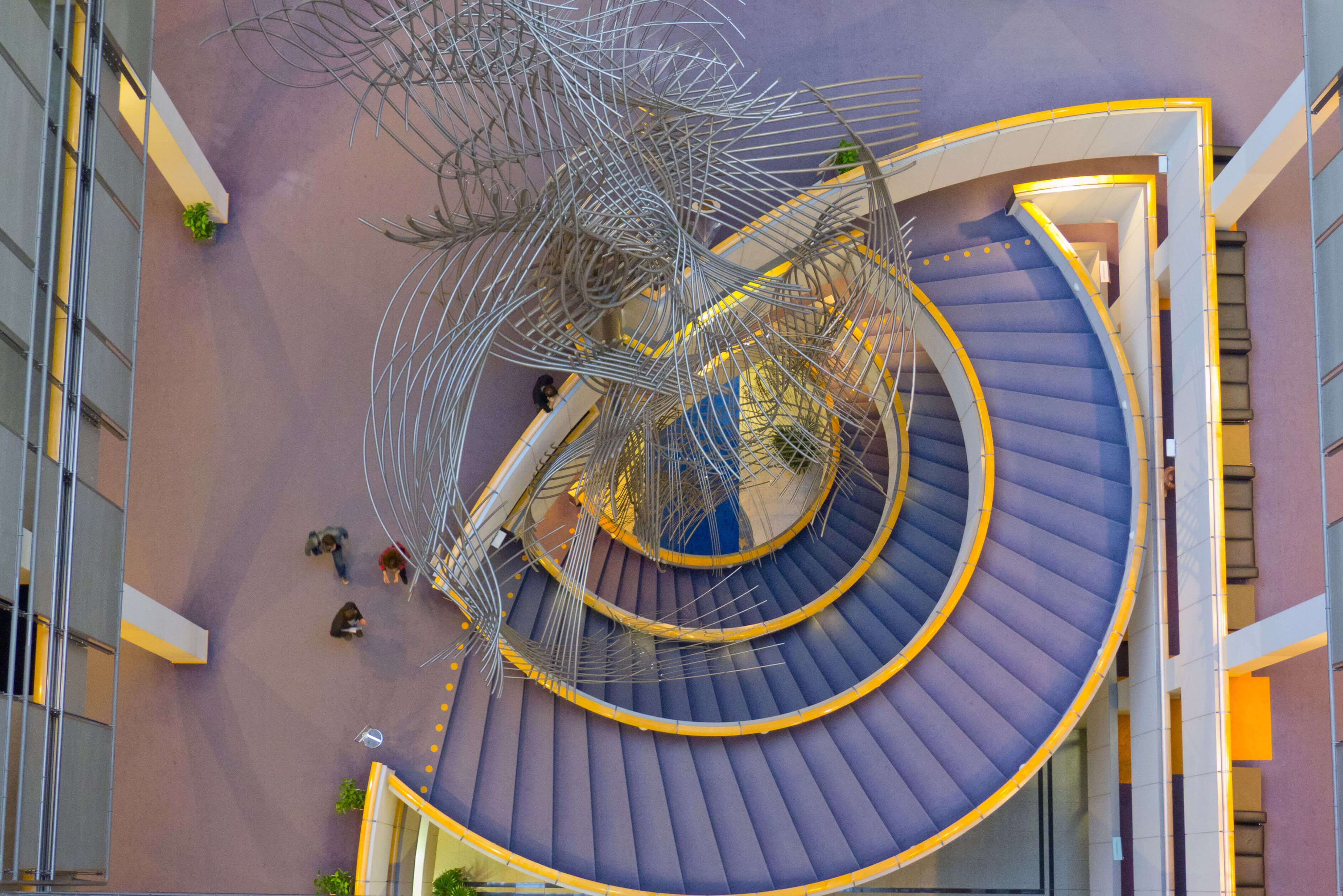 From an Office in Brussels
From an Office in Brussels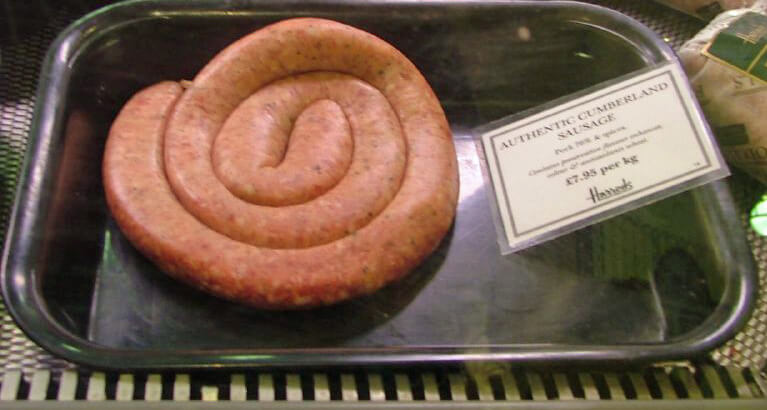
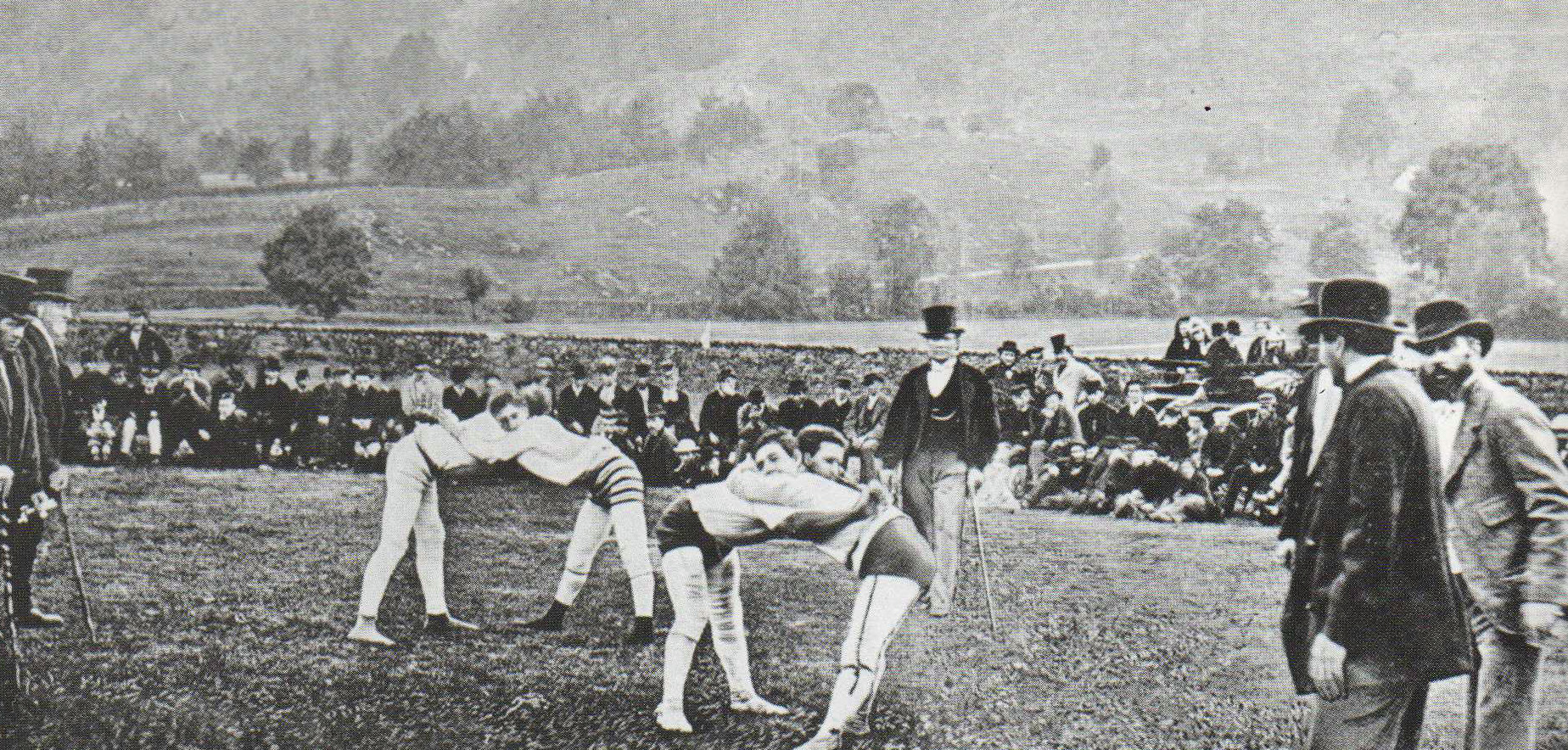
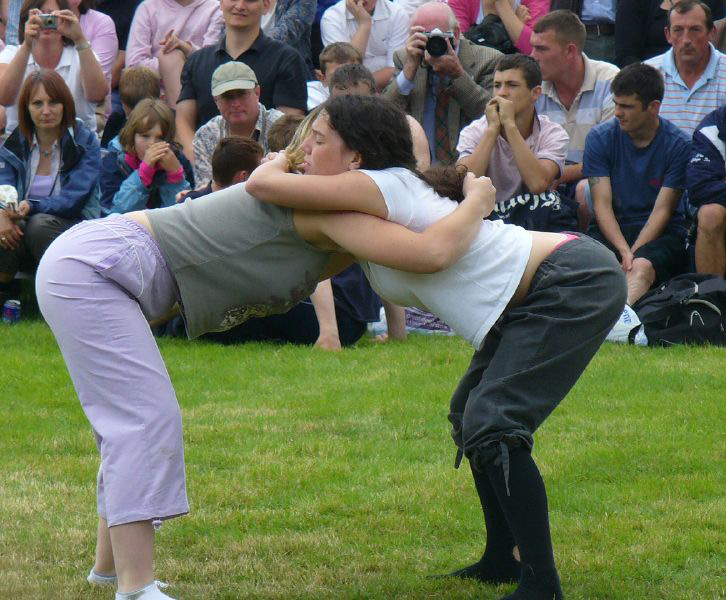 Because of the housing shortage in the Lake District it is necessary
to impose quotas on offcomers. From now on only those who
can show a deep knowledge of Cumbrian history and culture will
be allowed entry permits. In fulfilling my duty to help potential
offcomers with their preparatory reading I will make some
suggestions. Here’s the first:
Tak Hod: The Definitive History of Cumbrian Wrestling, by Abraham
Dodd (Corinthian Books, £99.99), 612 pages with nearly 400 black
and white daguerreotypes, including a 236-page appendix giving
in full the revised rules of the Cumbrian Wrestling Authority, as
defined at the historic meeting in Cockermouth, 1889.
Because of the housing shortage in the Lake District it is necessary
to impose quotas on offcomers. From now on only those who
can show a deep knowledge of Cumbrian history and culture will
be allowed entry permits. In fulfilling my duty to help potential
offcomers with their preparatory reading I will make some
suggestions. Here’s the first:
Tak Hod: The Definitive History of Cumbrian Wrestling, by Abraham
Dodd (Corinthian Books, £99.99), 612 pages with nearly 400 black
and white daguerreotypes, including a 236-page appendix giving
in full the revised rules of the Cumbrian Wrestling Authority, as
defined at the historic meeting in Cockermouth, 1889.
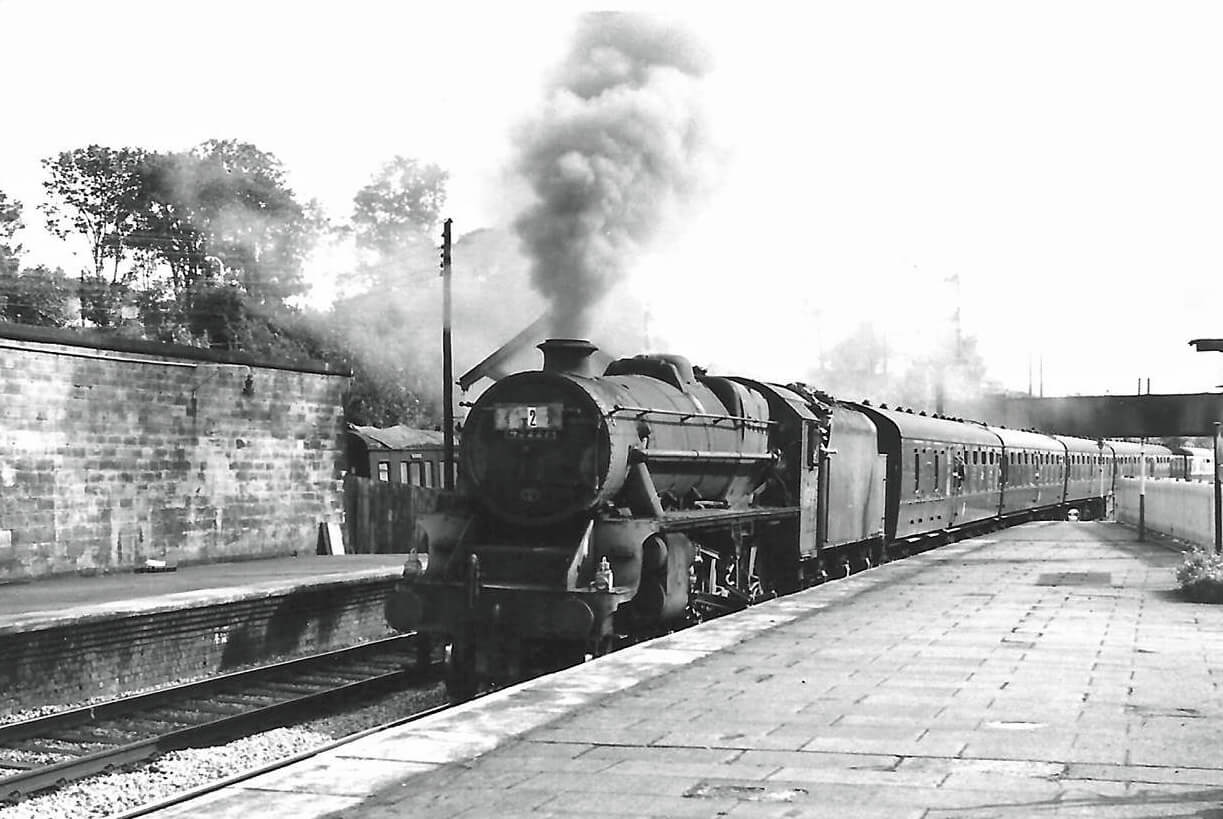
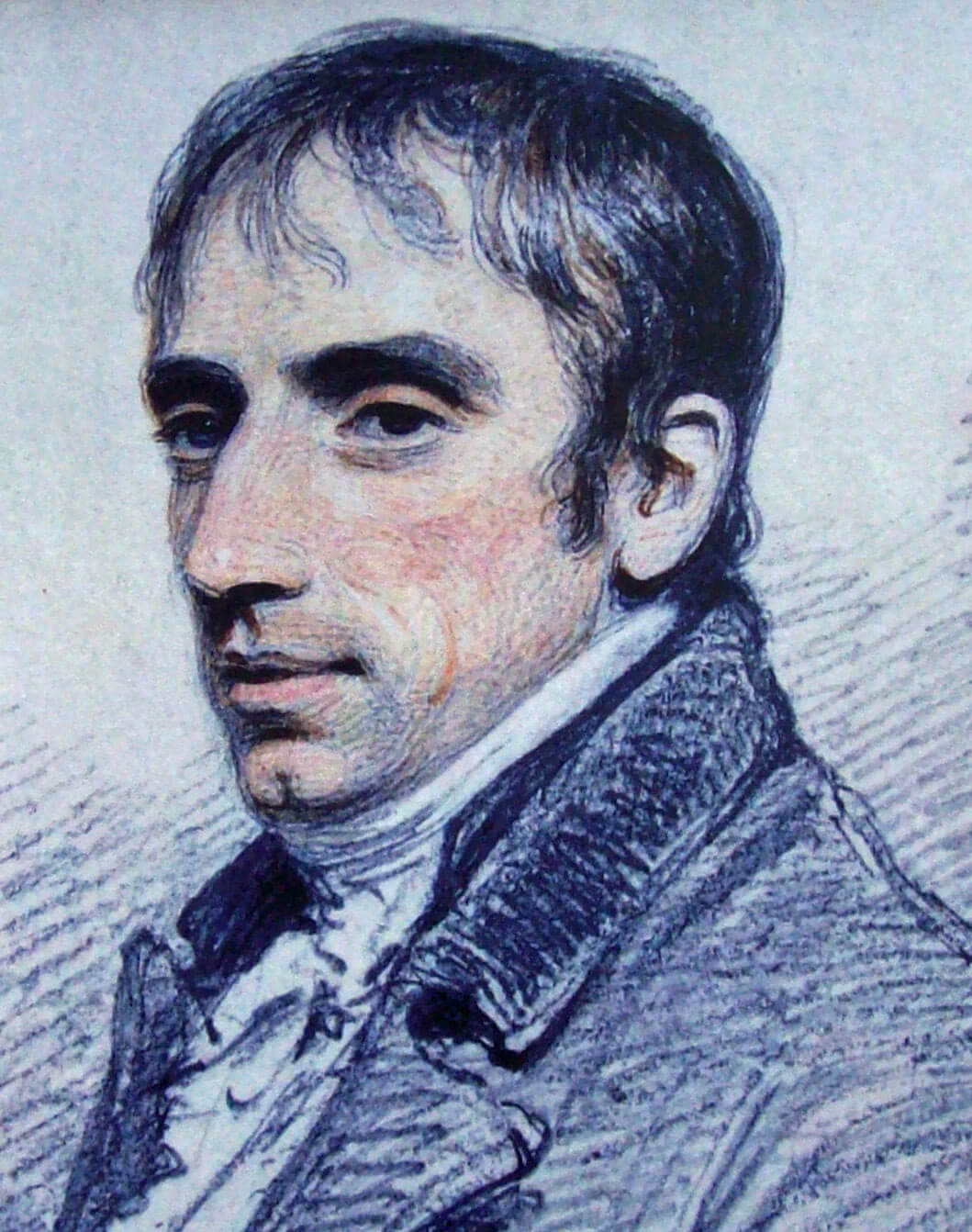
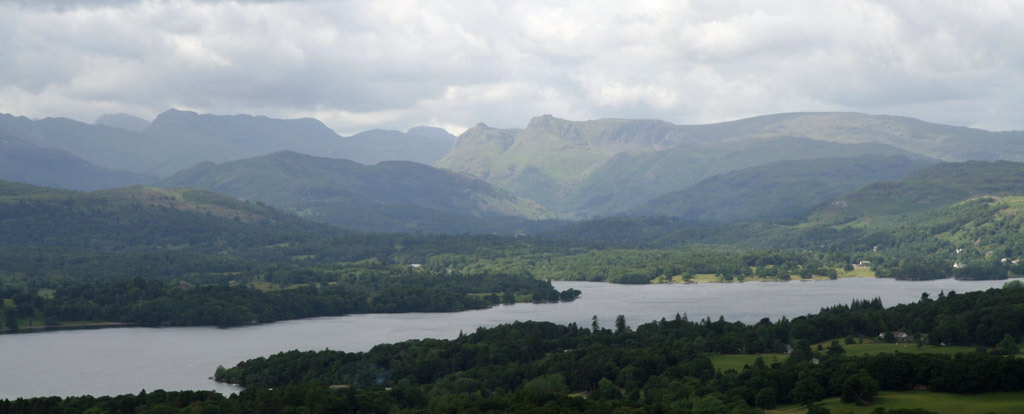
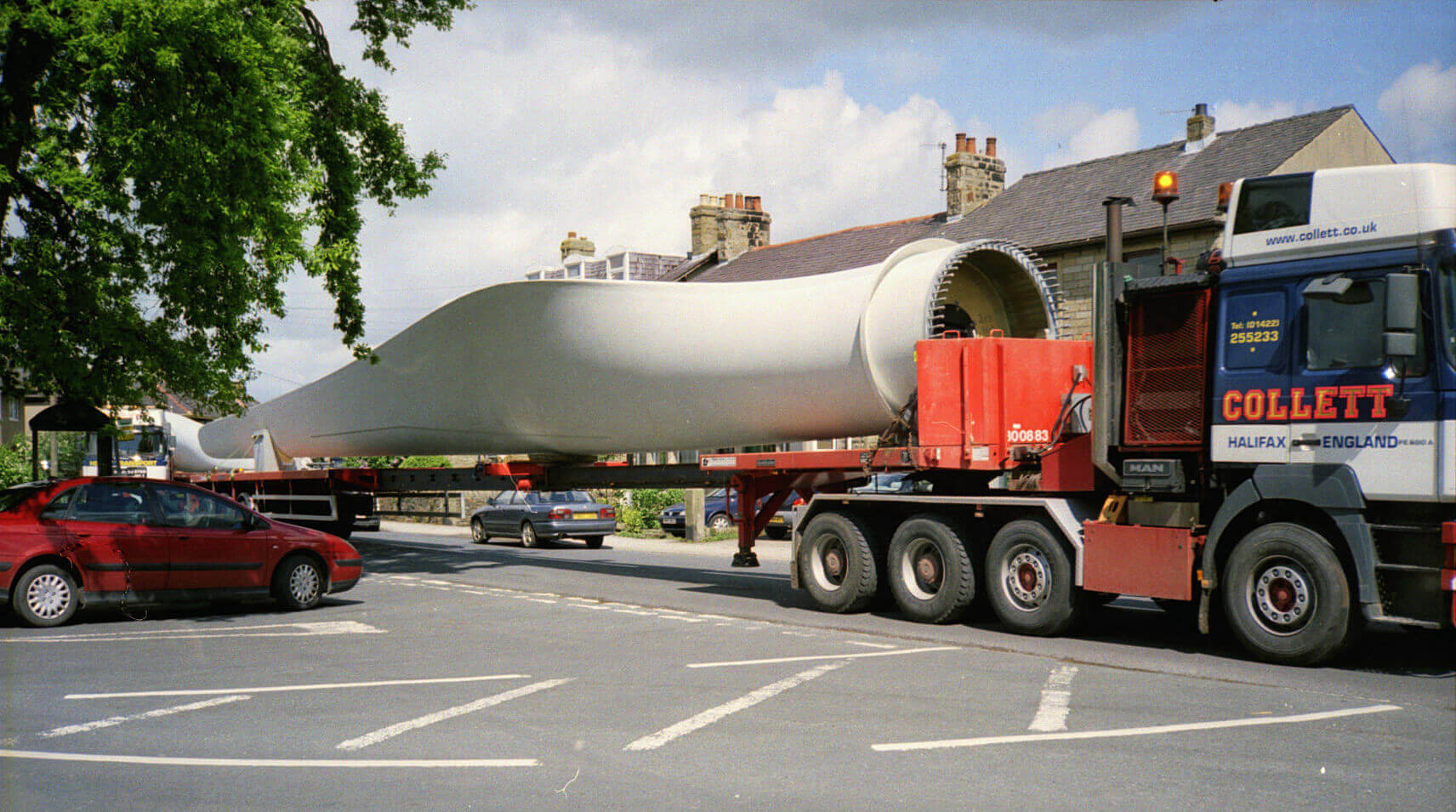
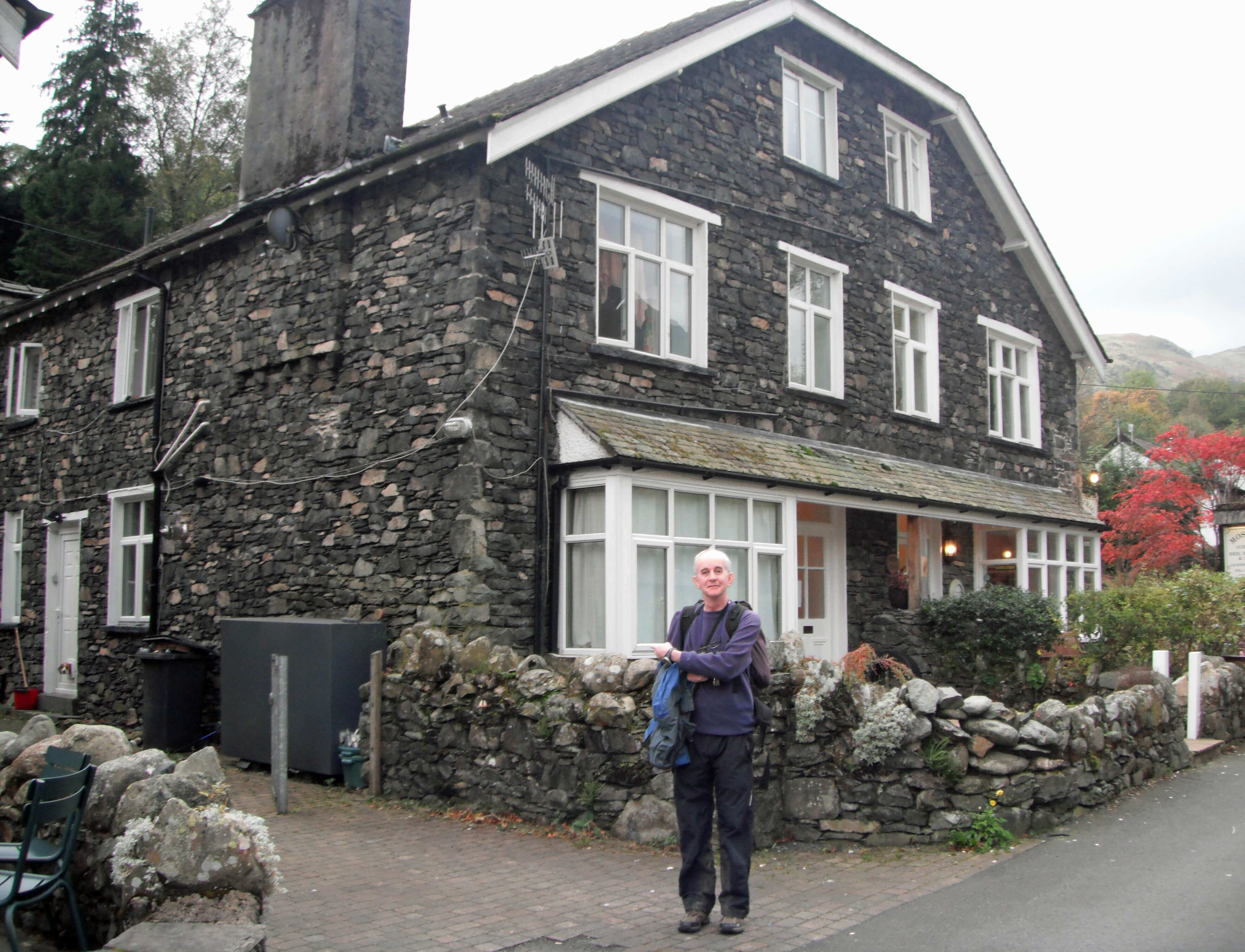 Dear Ed
Dear Ed
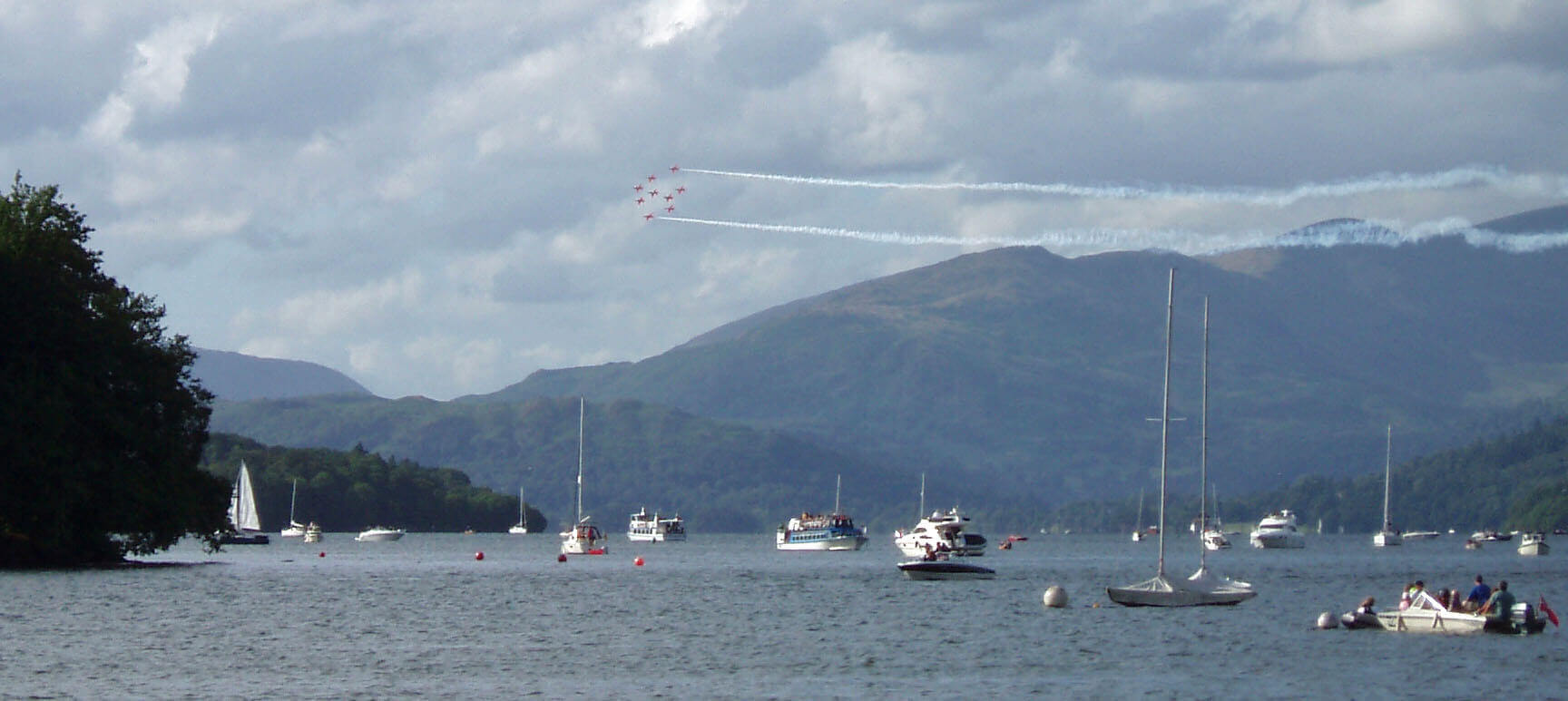
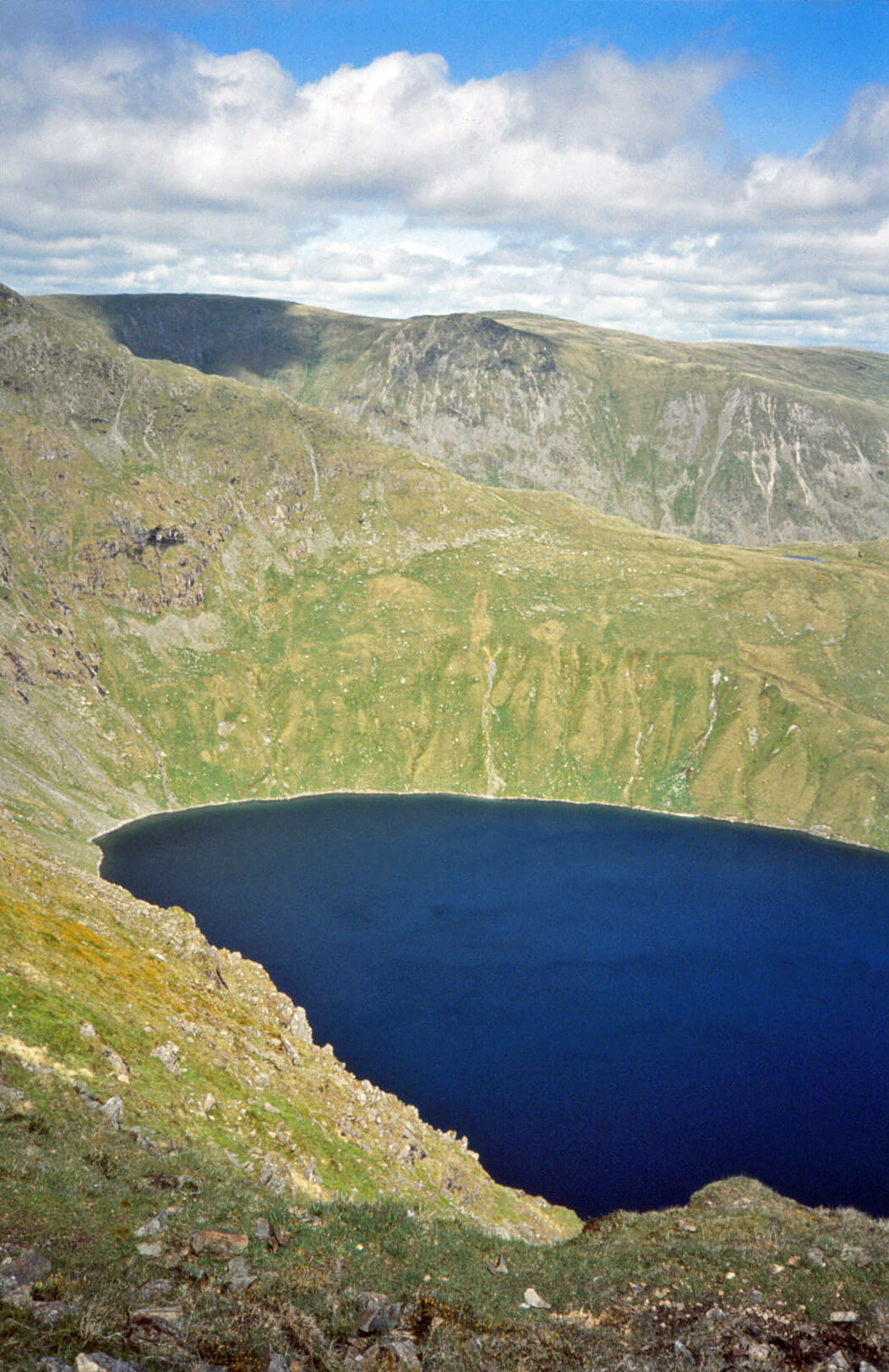
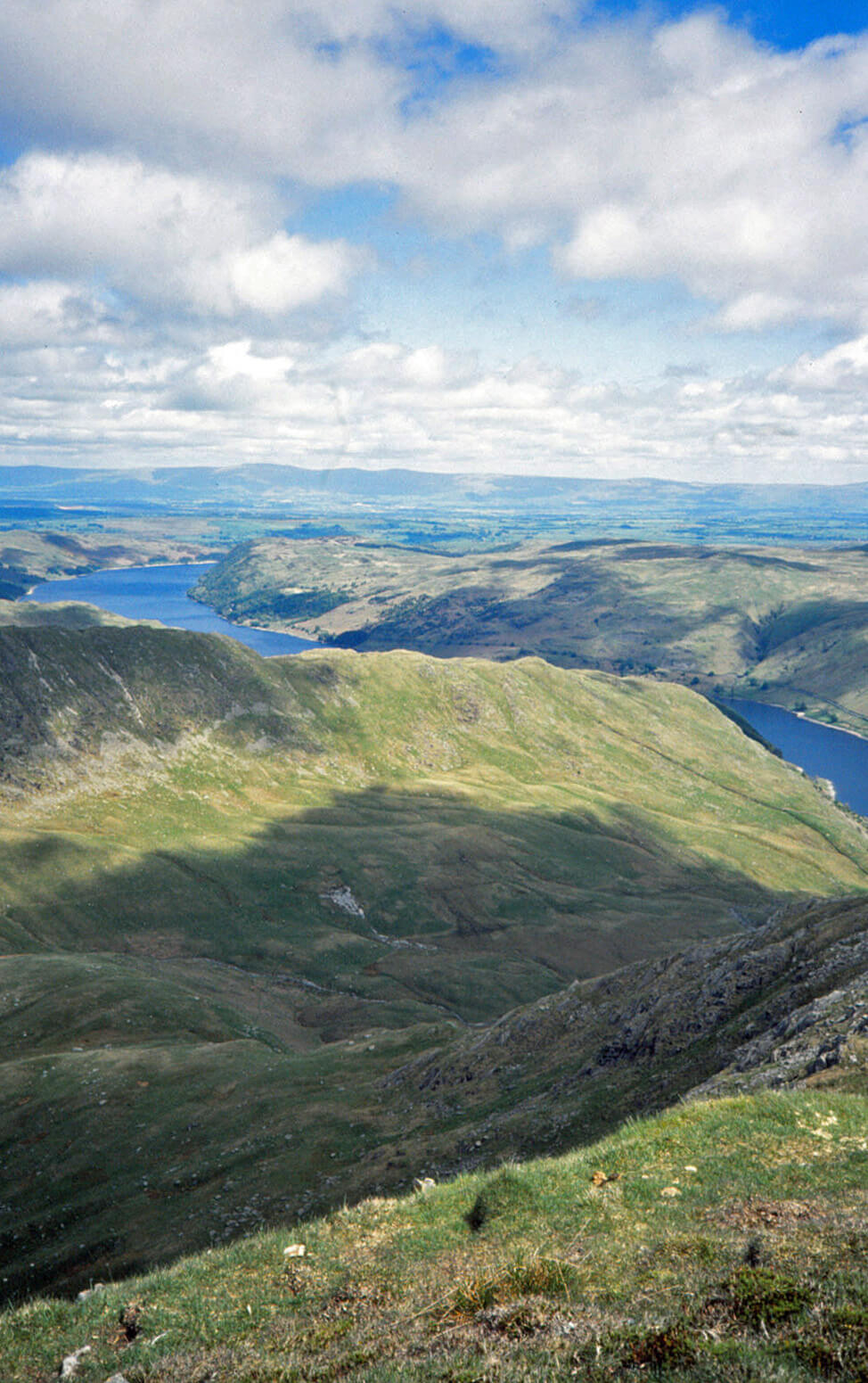 As we climbed the ridge from Froswick towards Thornthwaite,
the others were irresistibly drawn to the large beacon, where
crowds had gathered for their midday snacks. But they did
not know the route: I did. I led them around to the right, to
Mardale Ill Bell, where we found a fine perch above Blea Water
for our own lunch.
Thomas proudly introduced the lunch-time offerings,
which had been distributed evenly among our backpacks.
And, yes, I have to concede, he had done us proud, and,
with the cloud having lifted, we amused ourselves searching,
unsuccessfully, for the famous Riggindale golden eagle, and in
spying upon the activities in the Mardale car-park.
As we climbed the ridge from Froswick towards Thornthwaite,
the others were irresistibly drawn to the large beacon, where
crowds had gathered for their midday snacks. But they did
not know the route: I did. I led them around to the right, to
Mardale Ill Bell, where we found a fine perch above Blea Water
for our own lunch.
Thomas proudly introduced the lunch-time offerings,
which had been distributed evenly among our backpacks.
And, yes, I have to concede, he had done us proud, and,
with the cloud having lifted, we amused ourselves searching,
unsuccessfully, for the famous Riggindale golden eagle, and in
spying upon the activities in the Mardale car-park.
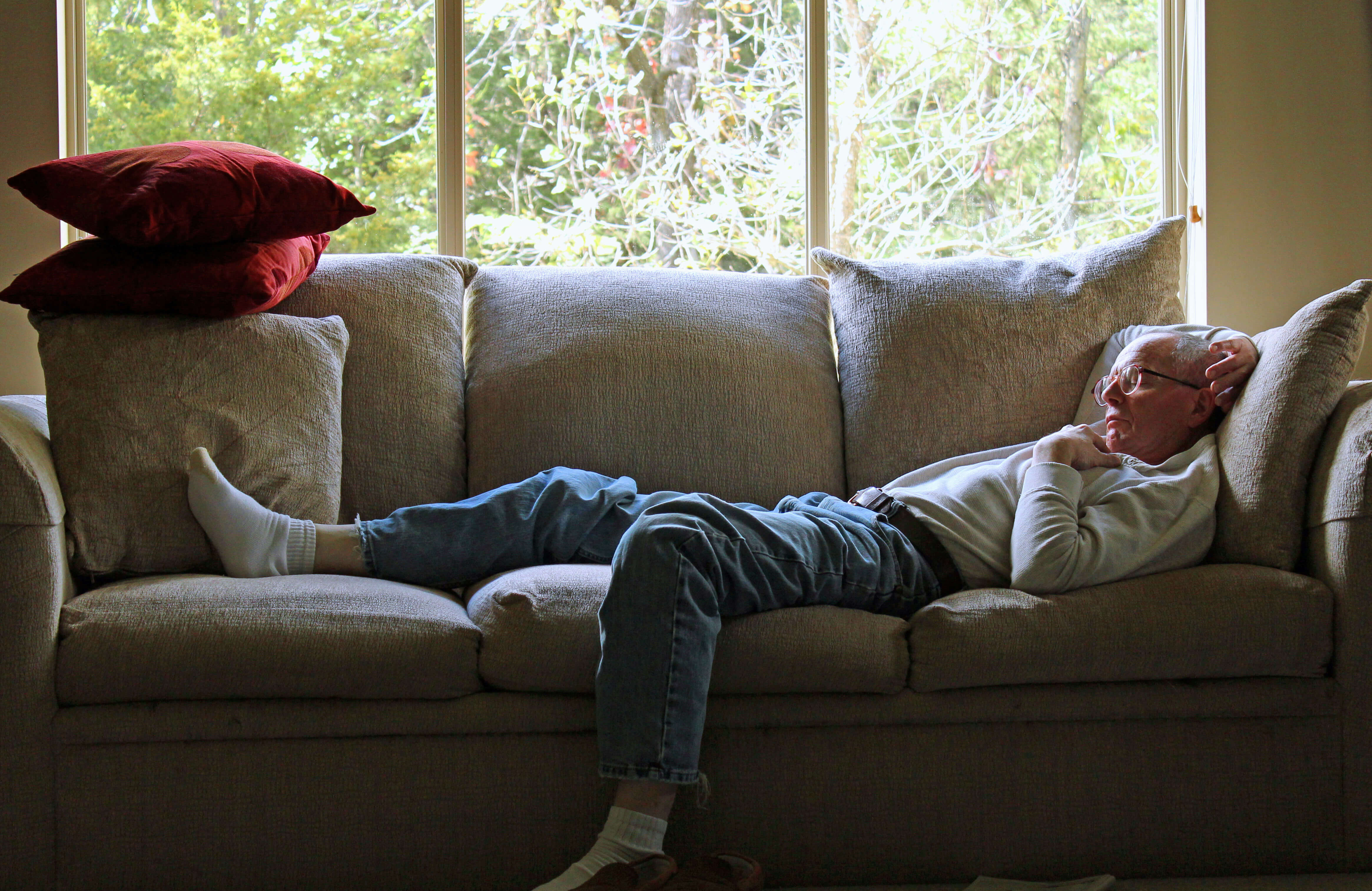
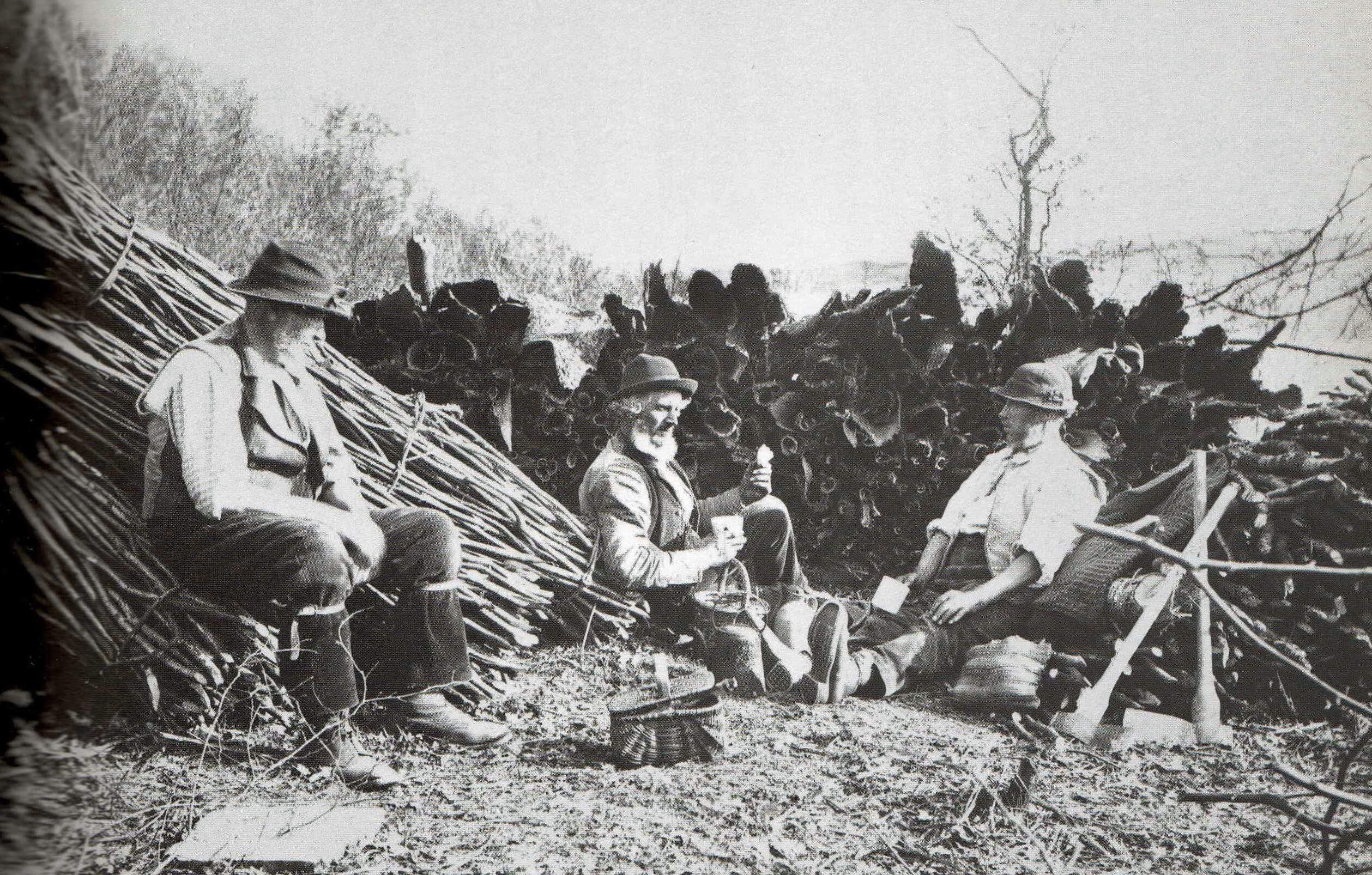
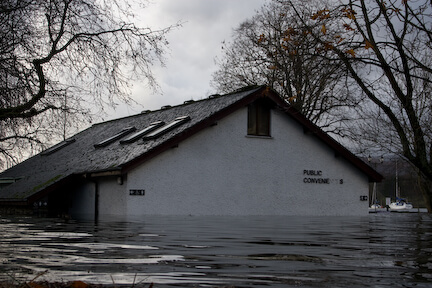
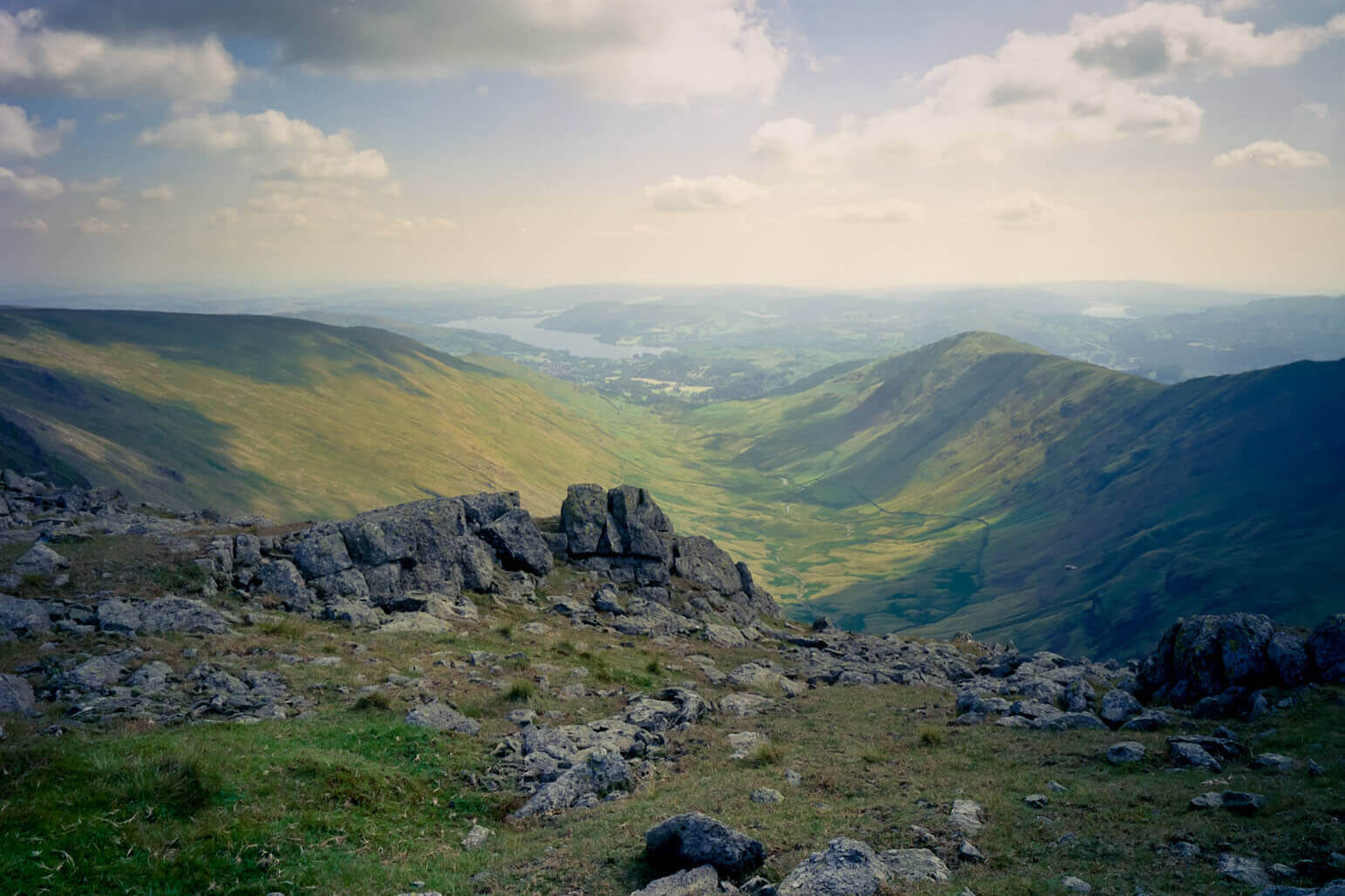 Disclaimer: The following details are given in good faith and the author cannot be held
responsible for any calamities that may arise. The details were correct yesterday.
Disclaimer: The following details are given in good faith and the author cannot be held
responsible for any calamities that may arise. The details were correct yesterday.
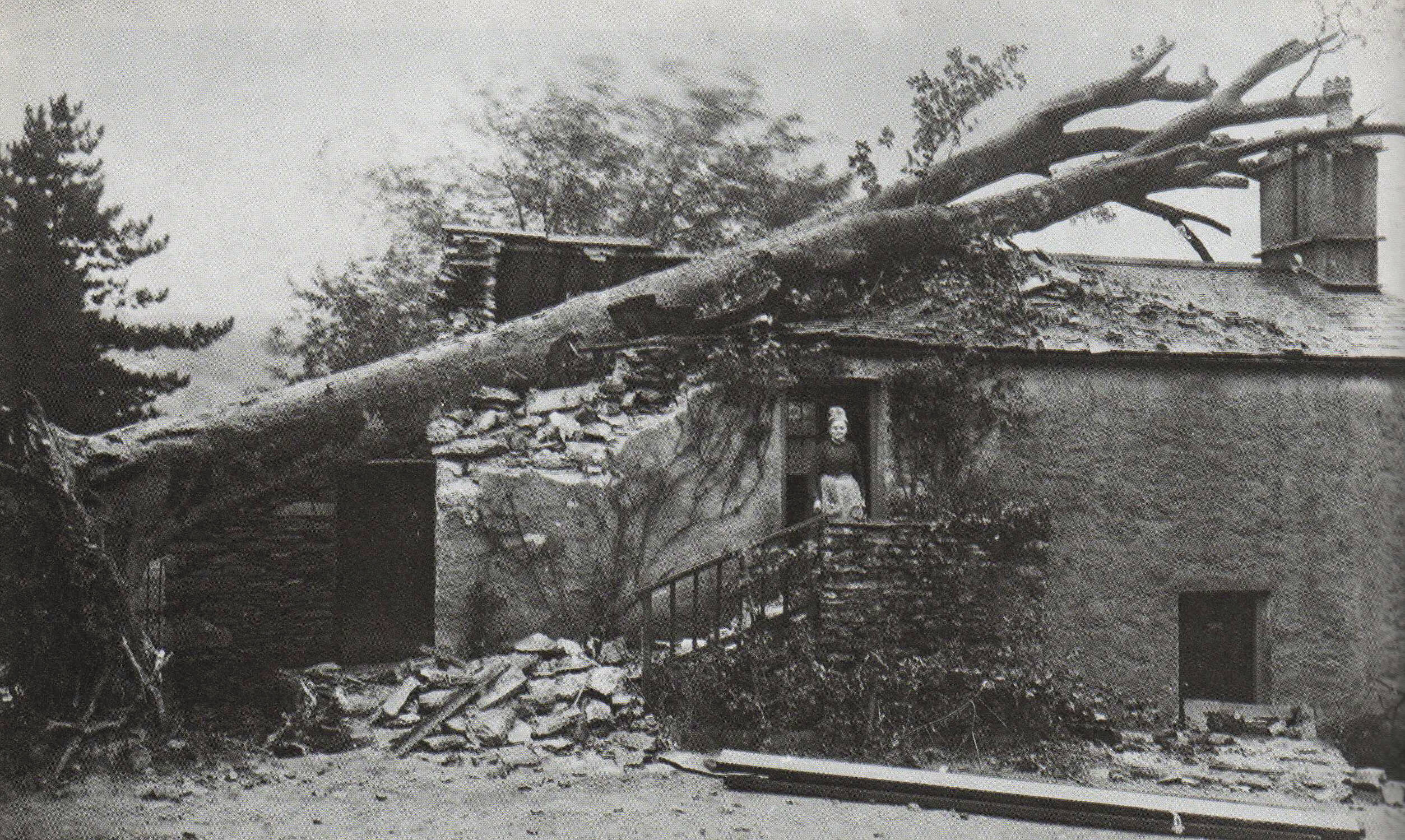
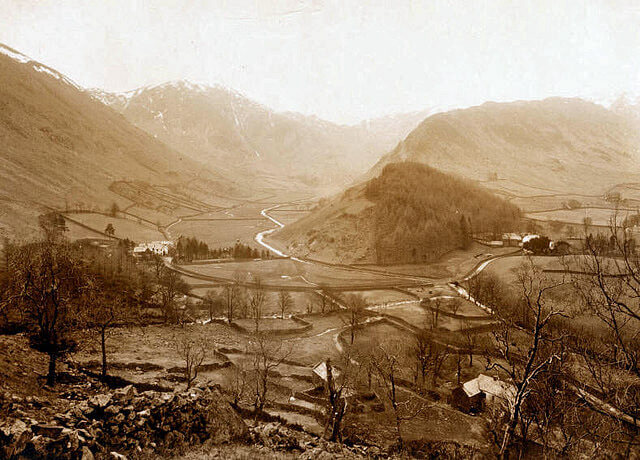
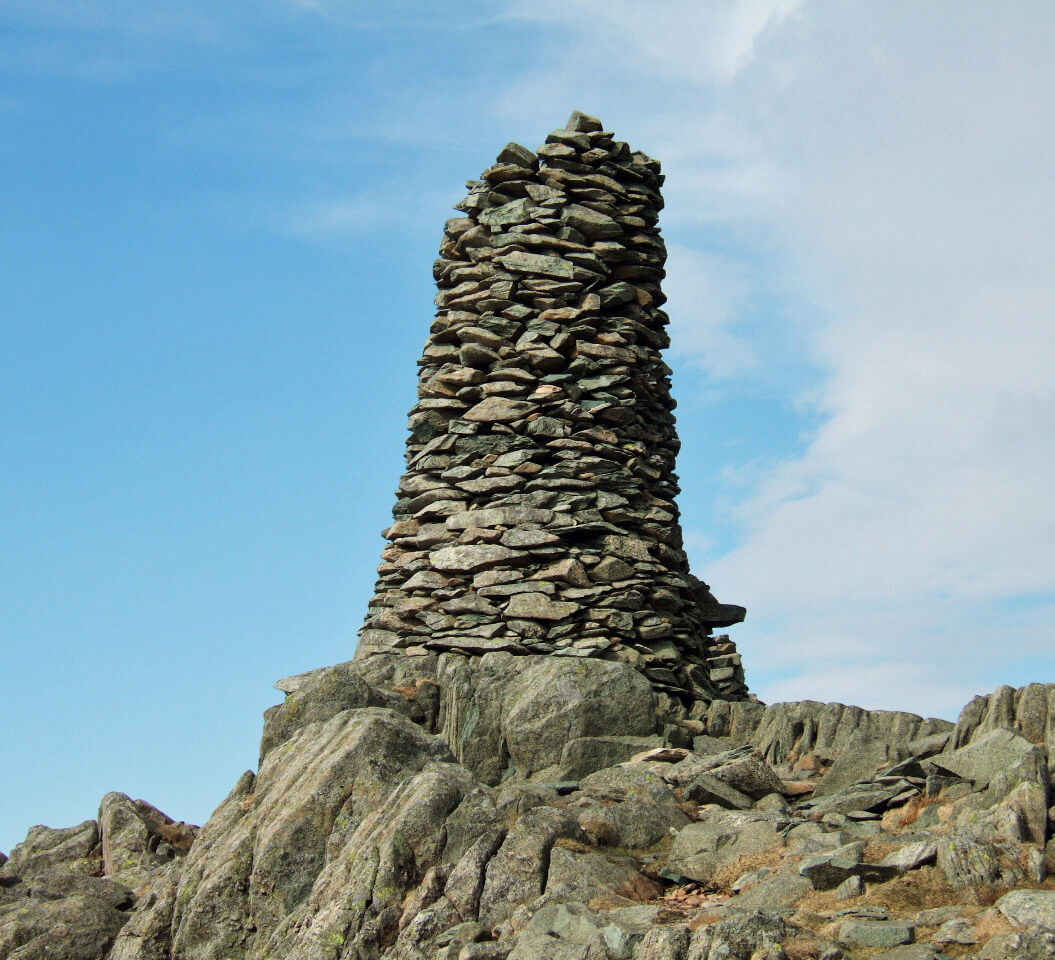 We strode south along High Street and in what seemed no
time we reached Thornthwaite Beacon, which we had skirted
past the day before. This time I allowed the team a rest and,
as is his custom, Harry was soon on first-name terms with
all the other walkers resting there, thankfully not as many as
yesterday, which was a Sunday.
We strode south along High Street and in what seemed no
time we reached Thornthwaite Beacon, which we had skirted
past the day before. This time I allowed the team a rest and,
as is his custom, Harry was soon on first-name terms with
all the other walkers resting there, thankfully not as many as
yesterday, which was a Sunday.
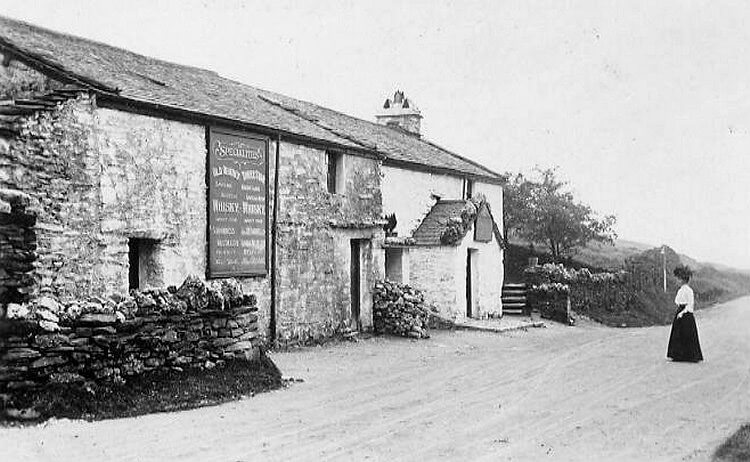
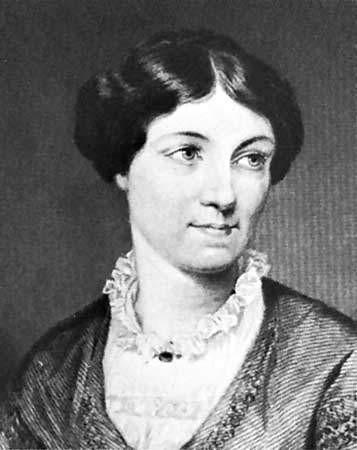 The annual Harriet Martineau Lecture to the Assembly of
Cumbrian Women’s Institutes was this year given by Dame
Mary Merewether, the eminent environmentalist and emeritus
professor at the University of Cumbria. She gave an absorbing talk,
much appreciated by the members, on recent changes to Lakeside
flora caused by the multitude of people trampling upon it.
The annual Harriet Martineau Lecture to the Assembly of
Cumbrian Women’s Institutes was this year given by Dame
Mary Merewether, the eminent environmentalist and emeritus
professor at the University of Cumbria. She gave an absorbing talk,
much appreciated by the members, on recent changes to Lakeside
flora caused by the multitude of people trampling upon it.
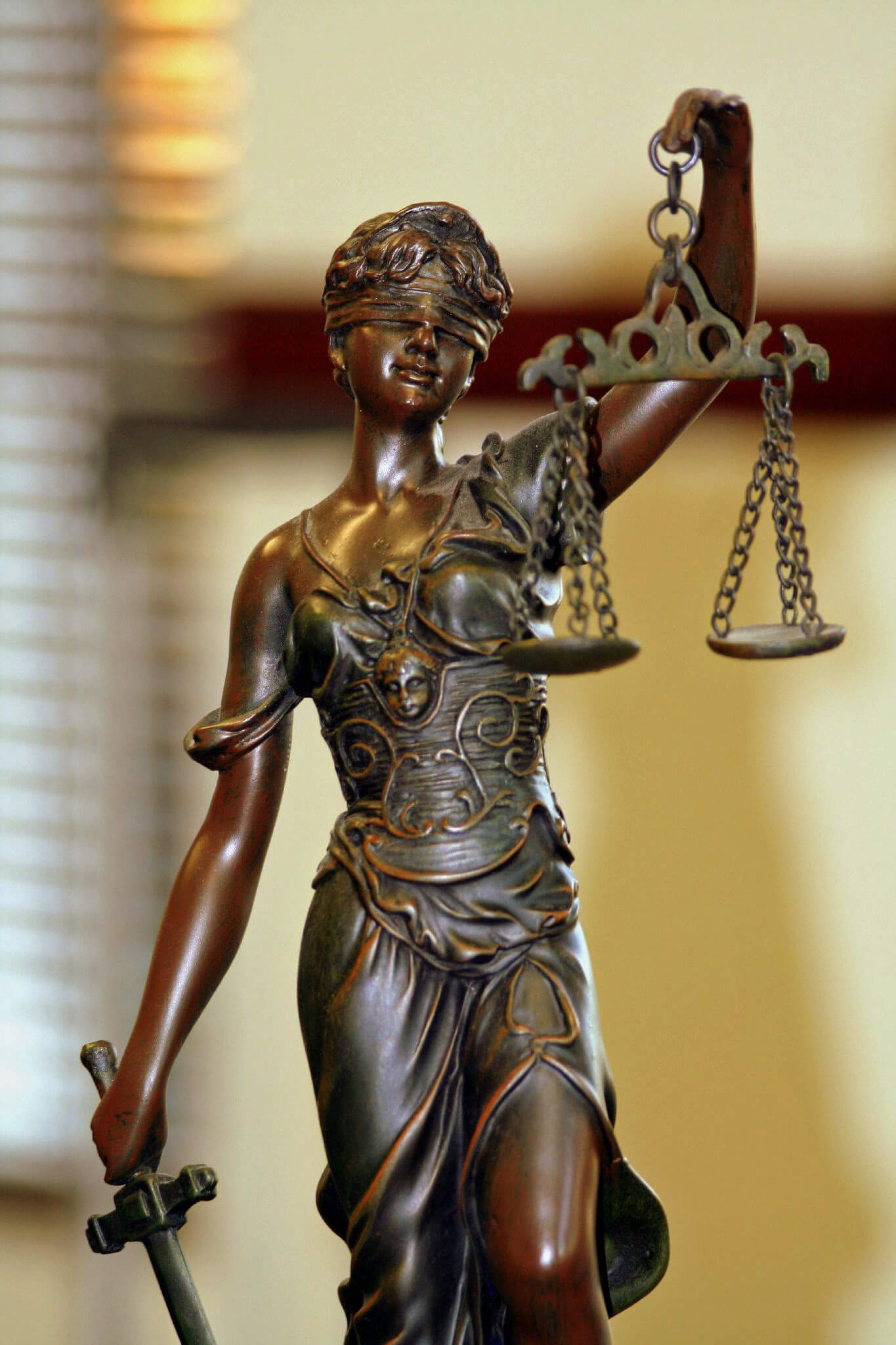
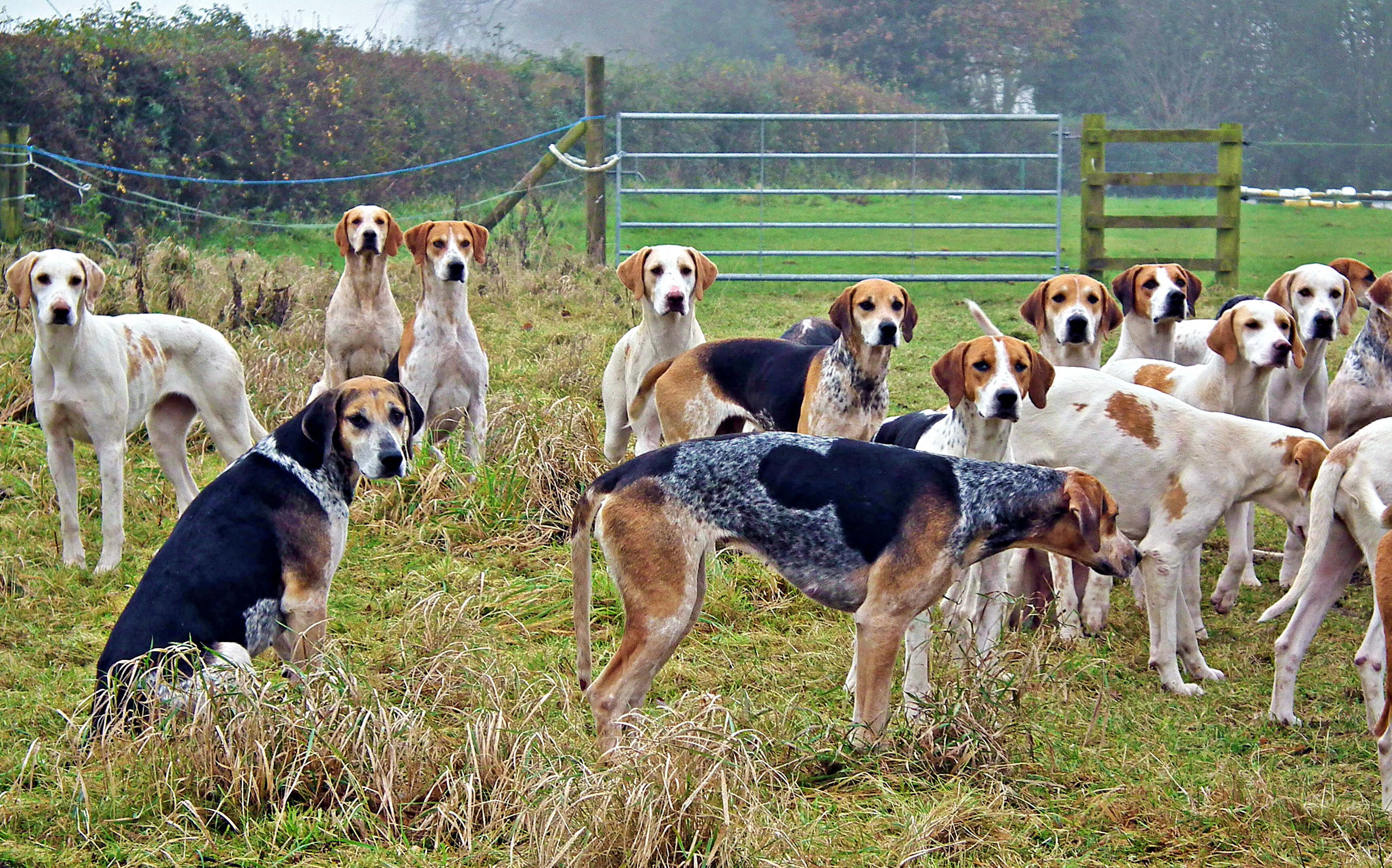 Last week the Cumberland Courier reported that (and I quote)
“foxes are never seen on a Sunday”. Isn’t that amazing! -
amazing that some man should be so obsessed with foxes as to
record their sightings and then carry out an analysis to uncover this
fundamental truth. I say ‘man’ because, in my limited experience,
women do not have such obsessions.
Last week the Cumberland Courier reported that (and I quote)
“foxes are never seen on a Sunday”. Isn’t that amazing! -
amazing that some man should be so obsessed with foxes as to
record their sightings and then carry out an analysis to uncover this
fundamental truth. I say ‘man’ because, in my limited experience,
women do not have such obsessions.
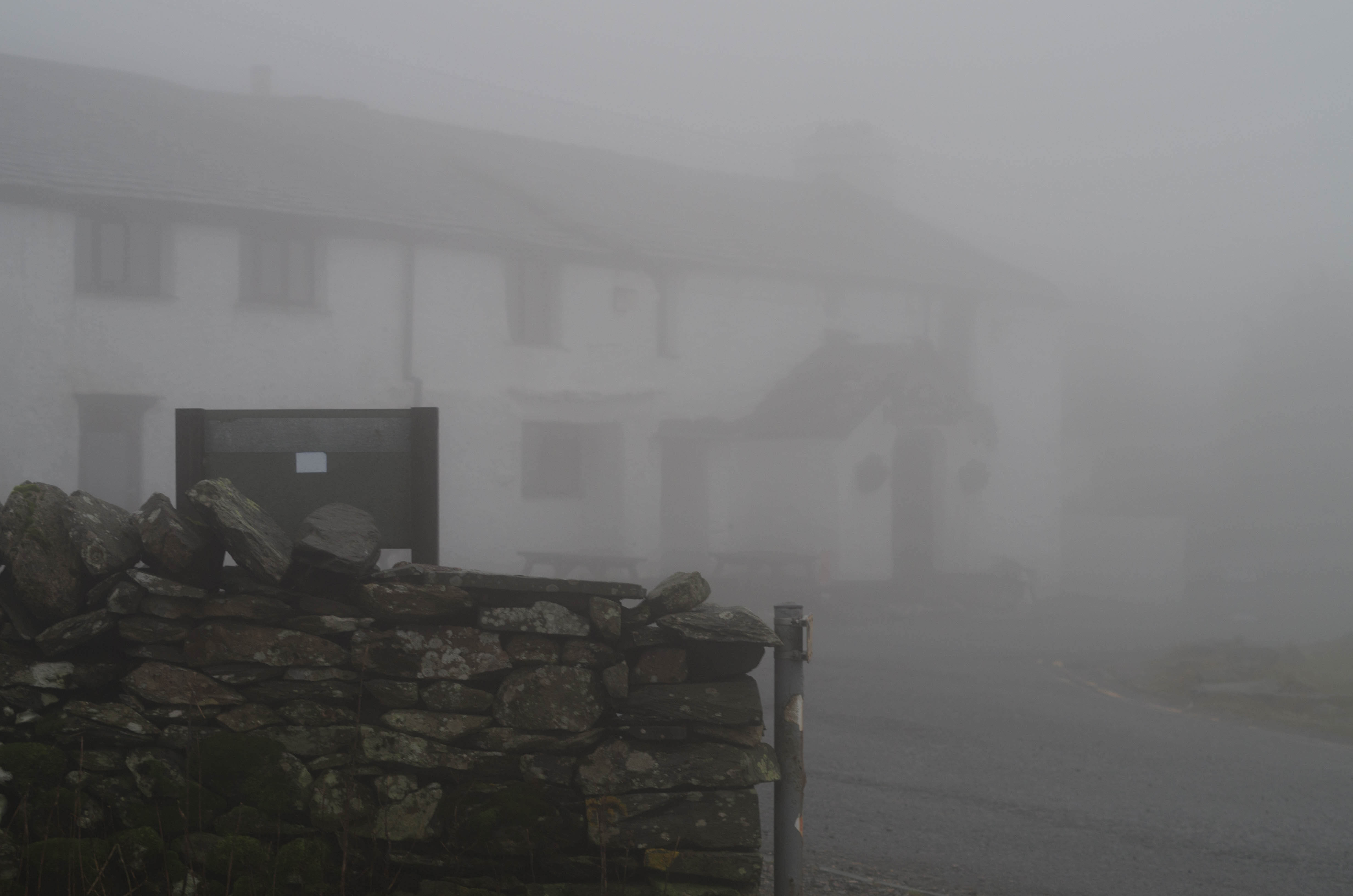
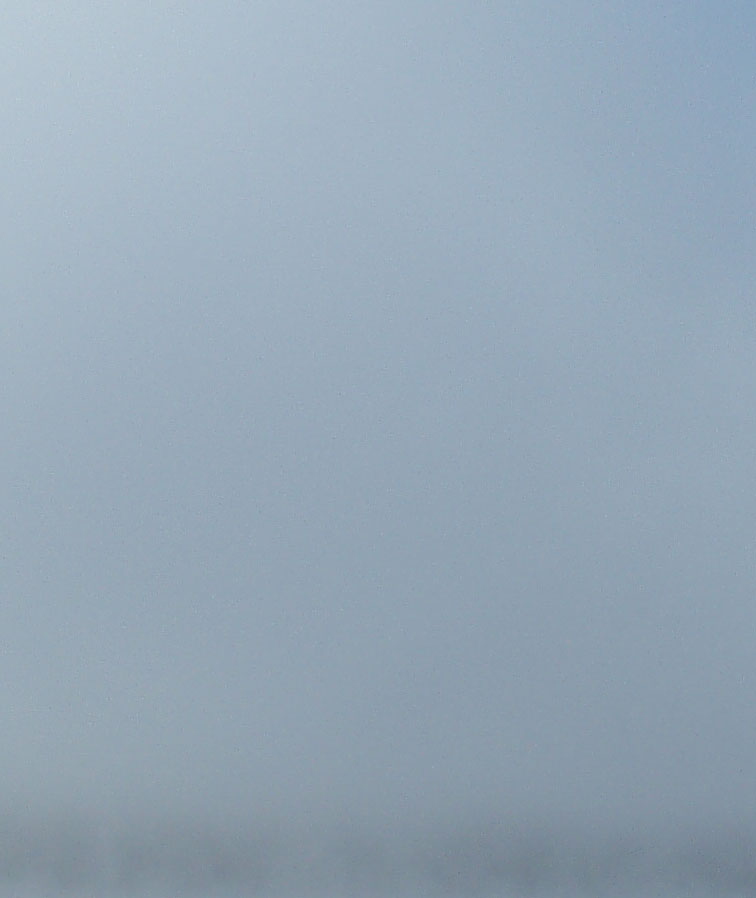
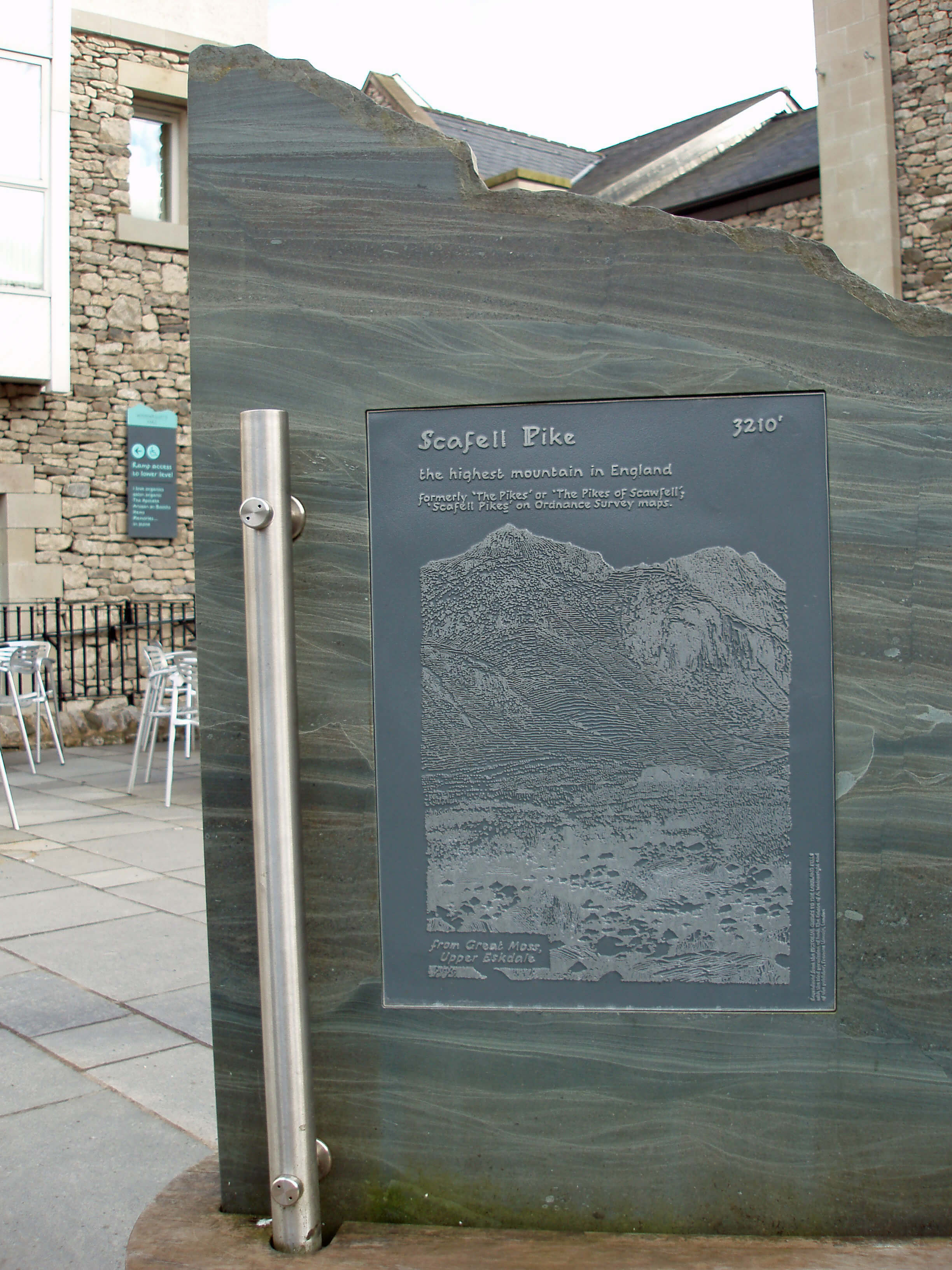 Mary Clough (secretary): Yes. John Burthwaite would like to apologise for the confusion
he caused by referring to ospreys over Blea Tarn, without
saying which one. And Seamus Donnybrook has written
an excruciatingly long letter to apologise for his disgraceful
behaviour with respect to our guest speaker at the Christmas
dinner. Too late: we have expelled him from the Society.
Mary Clough (secretary): Yes. John Burthwaite would like to apologise for the confusion
he caused by referring to ospreys over Blea Tarn, without
saying which one. And Seamus Donnybrook has written
an excruciatingly long letter to apologise for his disgraceful
behaviour with respect to our guest speaker at the Christmas
dinner. Too late: we have expelled him from the Society.
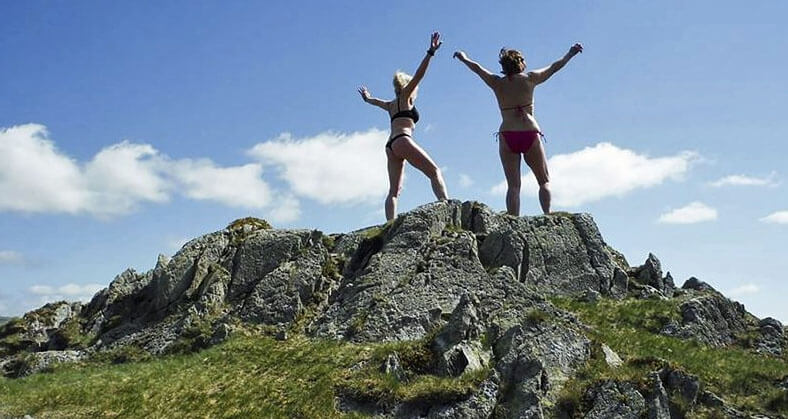
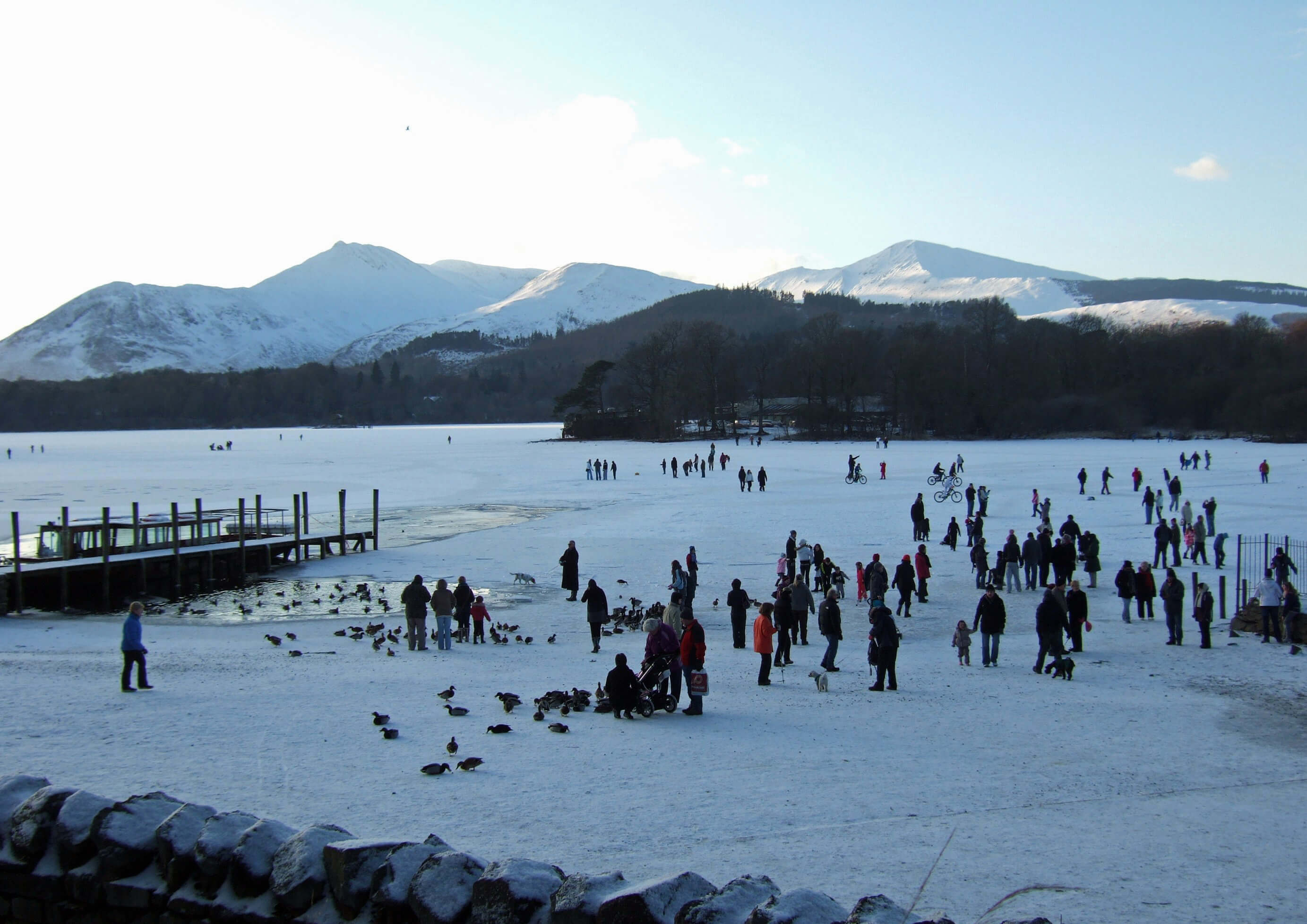
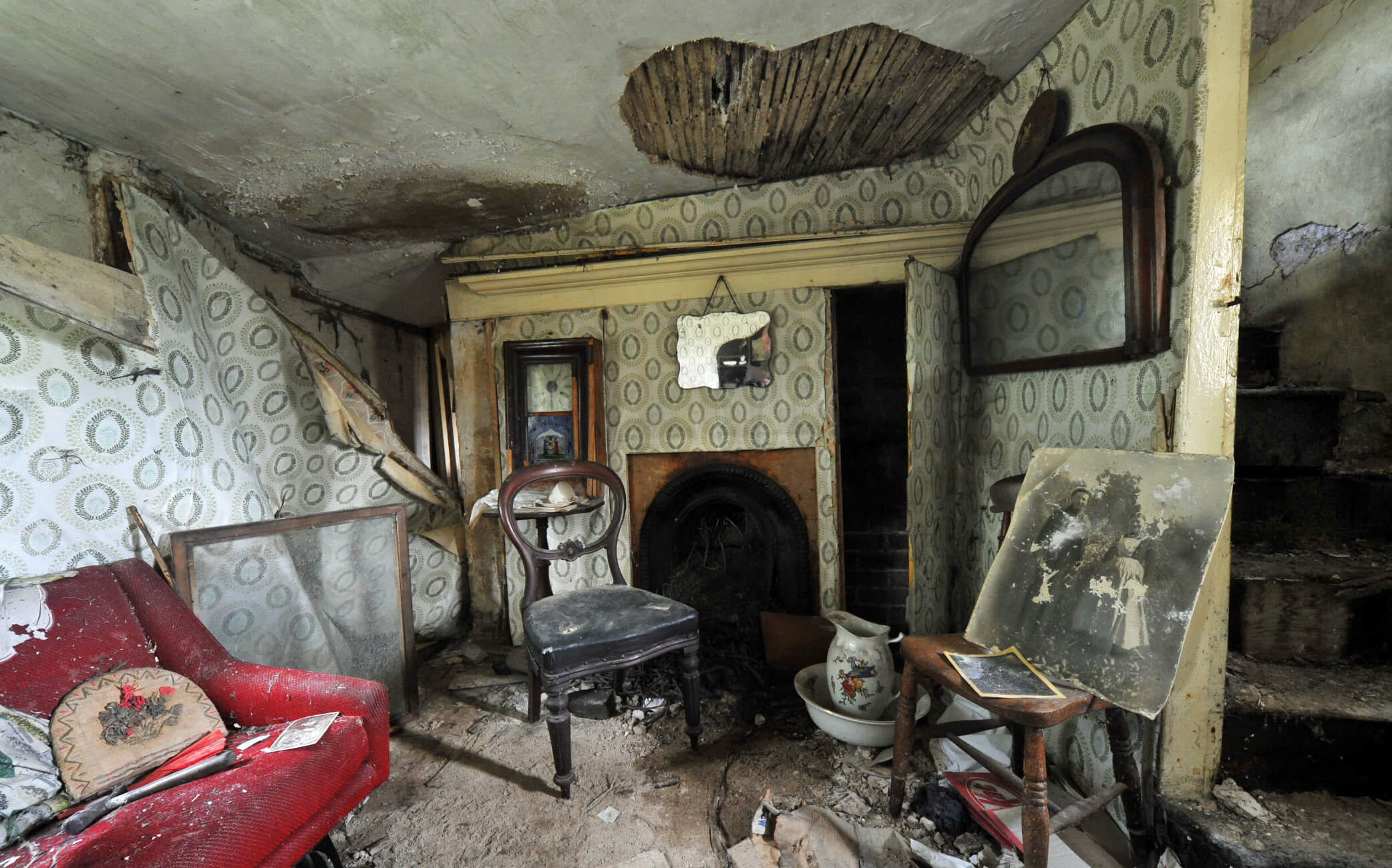
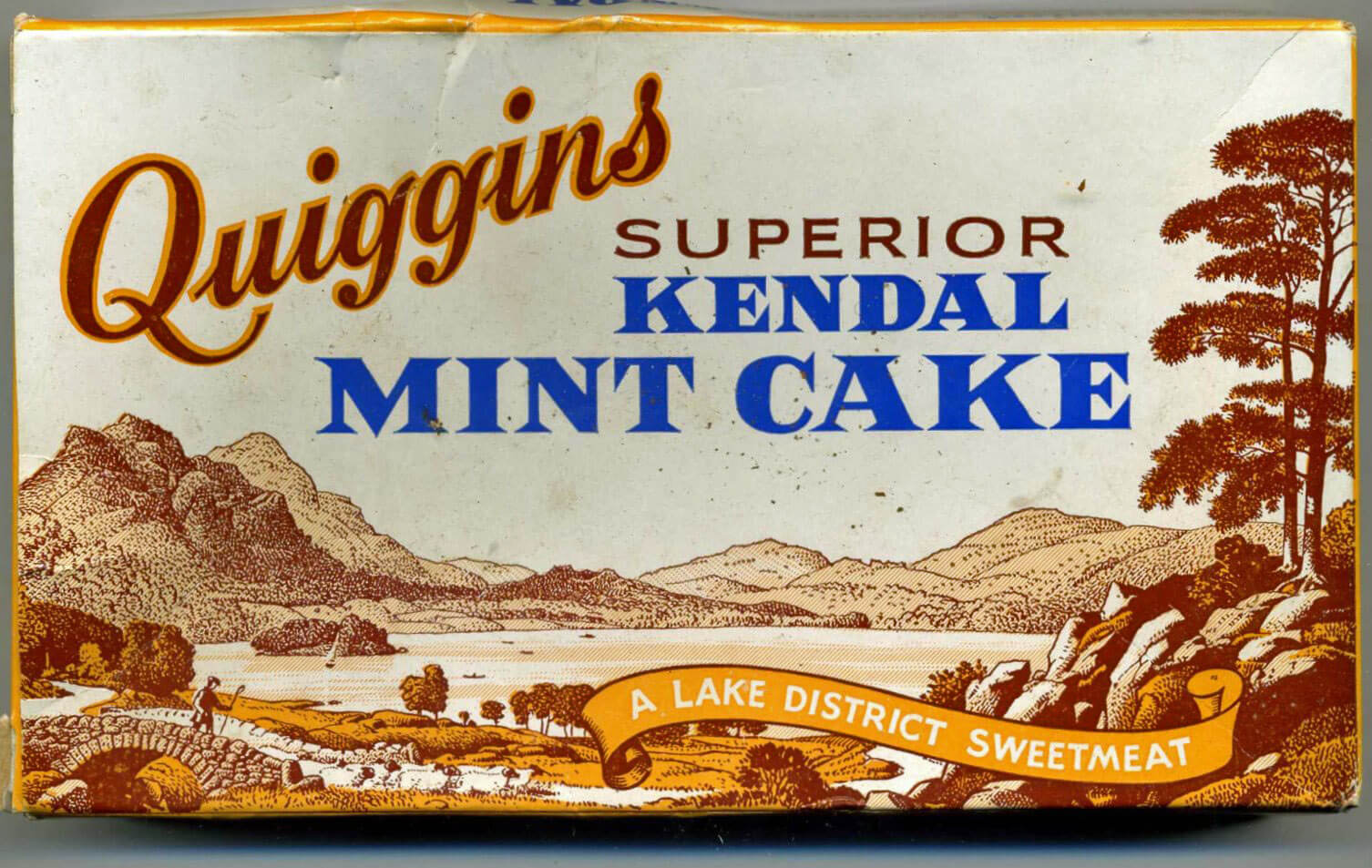
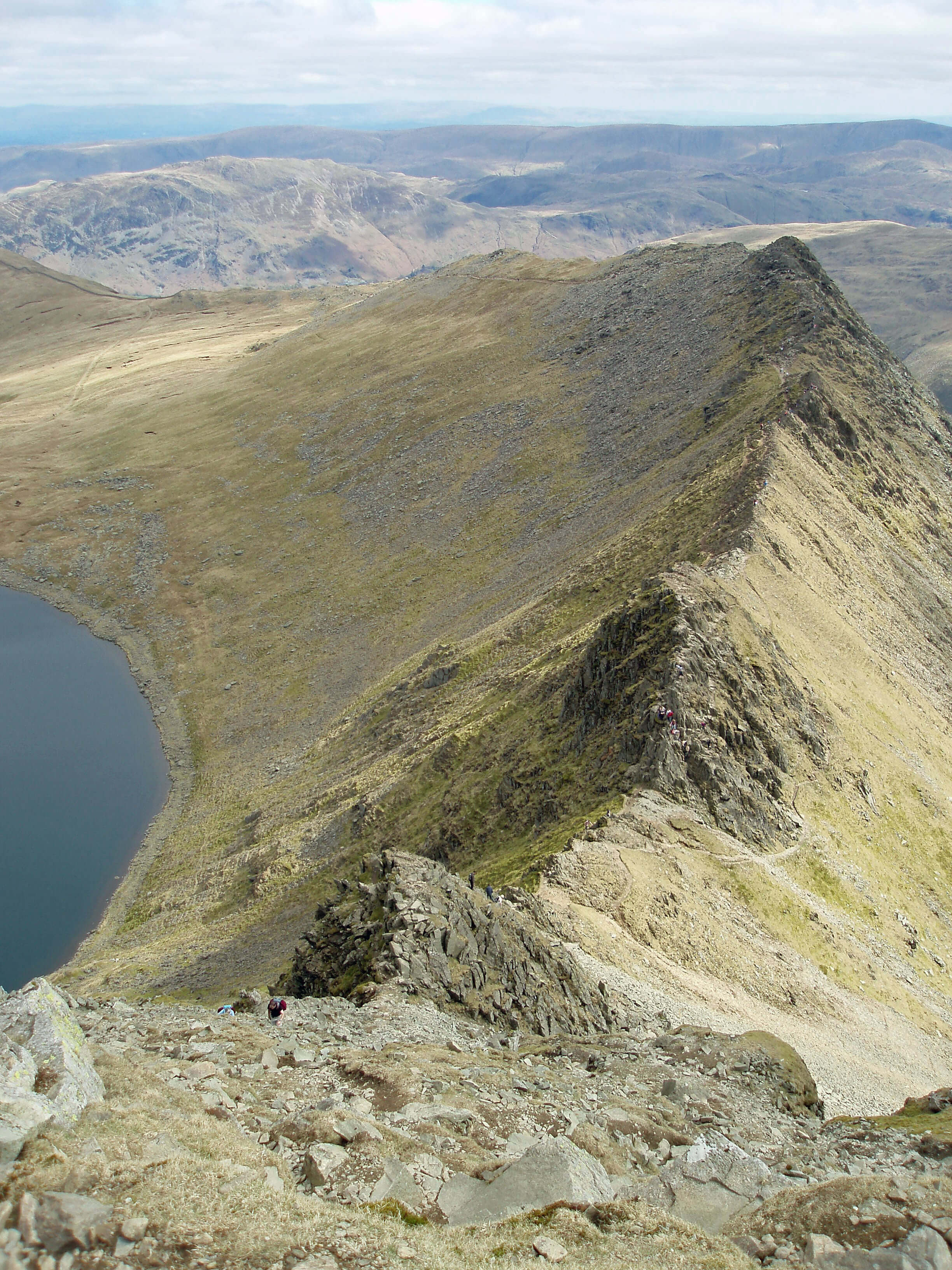
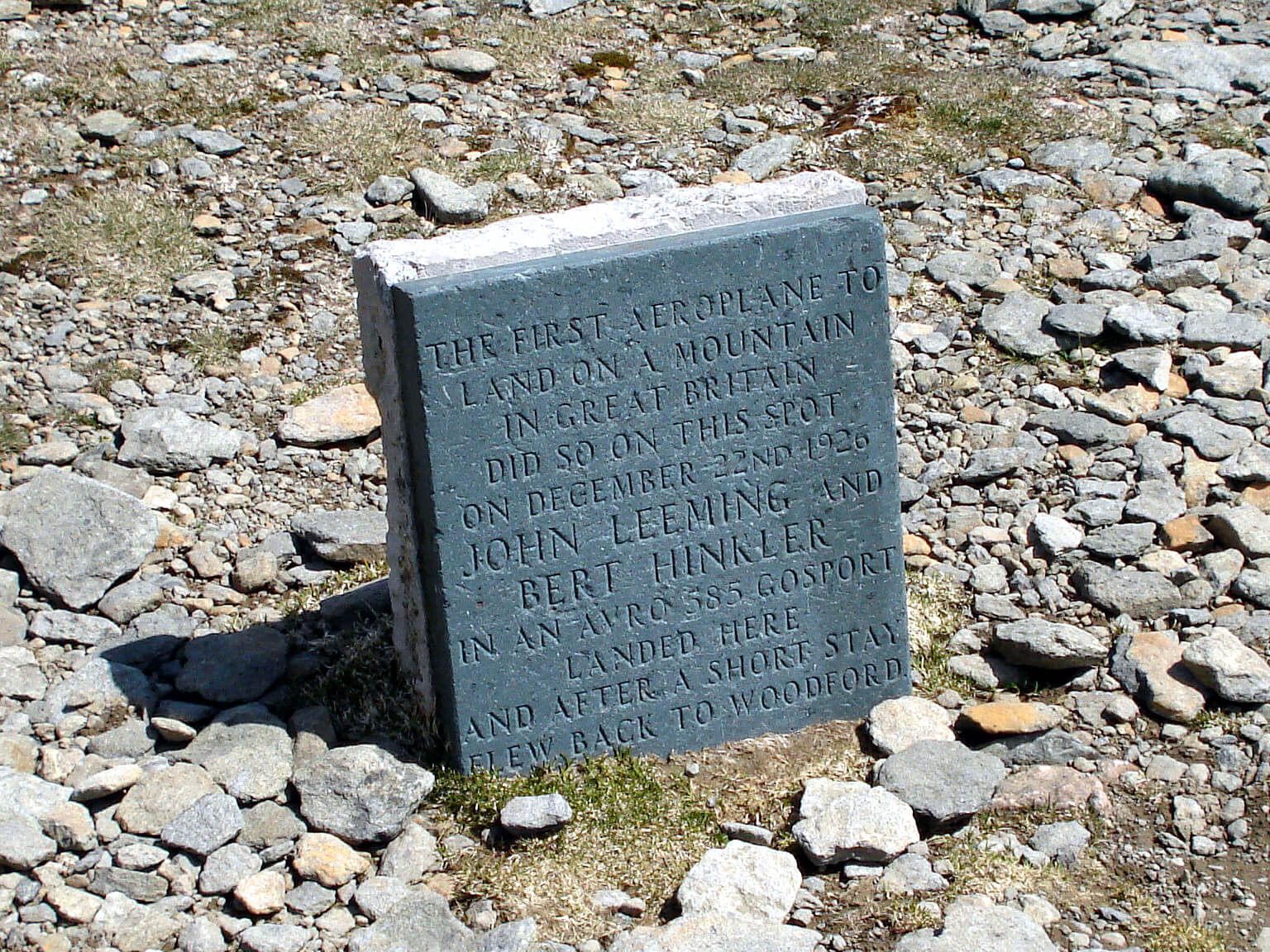 A second memorial marks the landing of a plane on
Helvellyn on December 22nd 1926. The pilots are named as
John Leeming and Bert Hinkler. The latter achieved fame in
1928 for the first solo flight from England to Australia, but,
not being a woman, not as much fame as Amy Johnson did for
her flight in 1930.
A second memorial marks the landing of a plane on
Helvellyn on December 22nd 1926. The pilots are named as
John Leeming and Bert Hinkler. The latter achieved fame in
1928 for the first solo flight from England to Australia, but,
not being a woman, not as much fame as Amy Johnson did for
her flight in 1930.
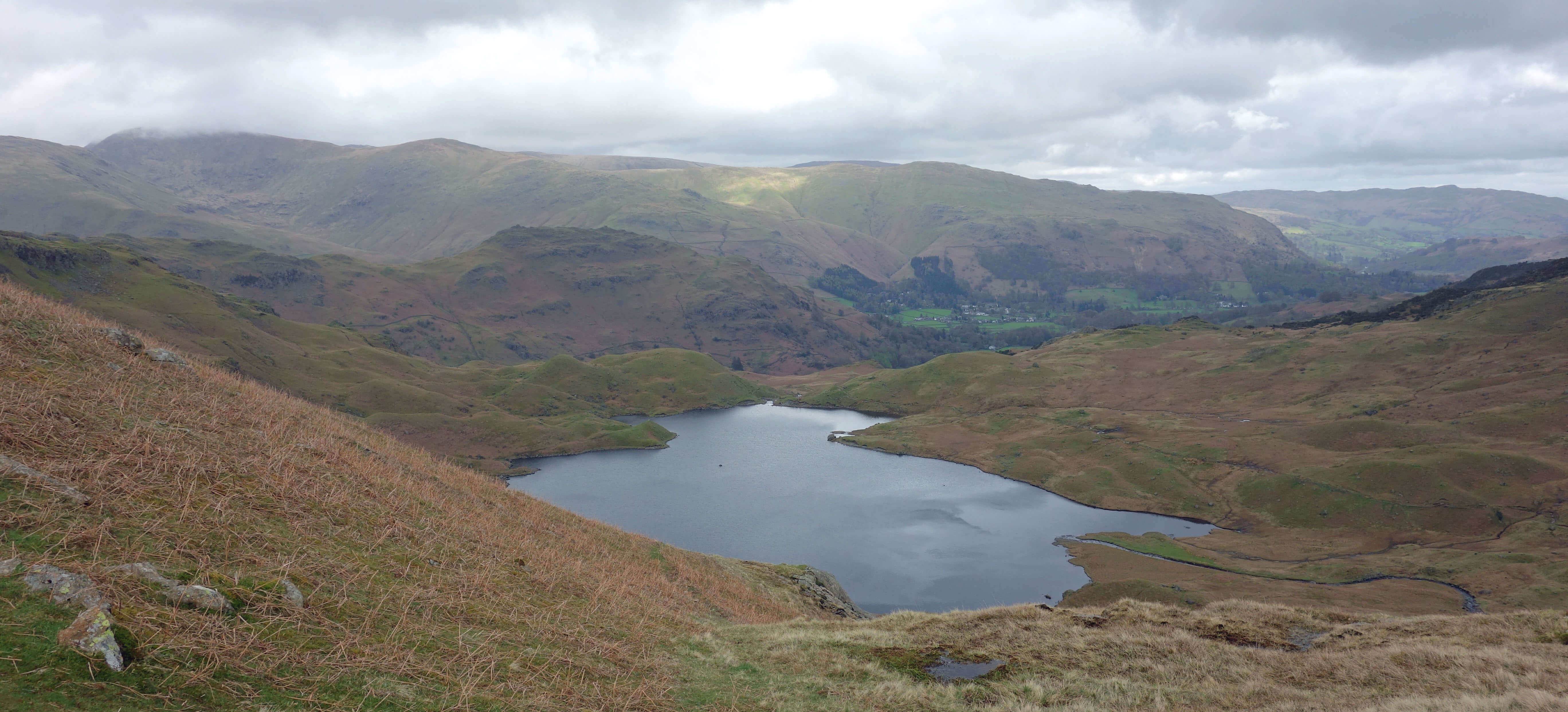 Diana Dubble-Barrell (chair):
For the next item on the agenda we have with us Mr Charles
Smarm who, as you will recall, is the head of Cumbria Tourism
Services. Over to you, Charles.
Diana Dubble-Barrell (chair):
For the next item on the agenda we have with us Mr Charles
Smarm who, as you will recall, is the head of Cumbria Tourism
Services. Over to you, Charles.
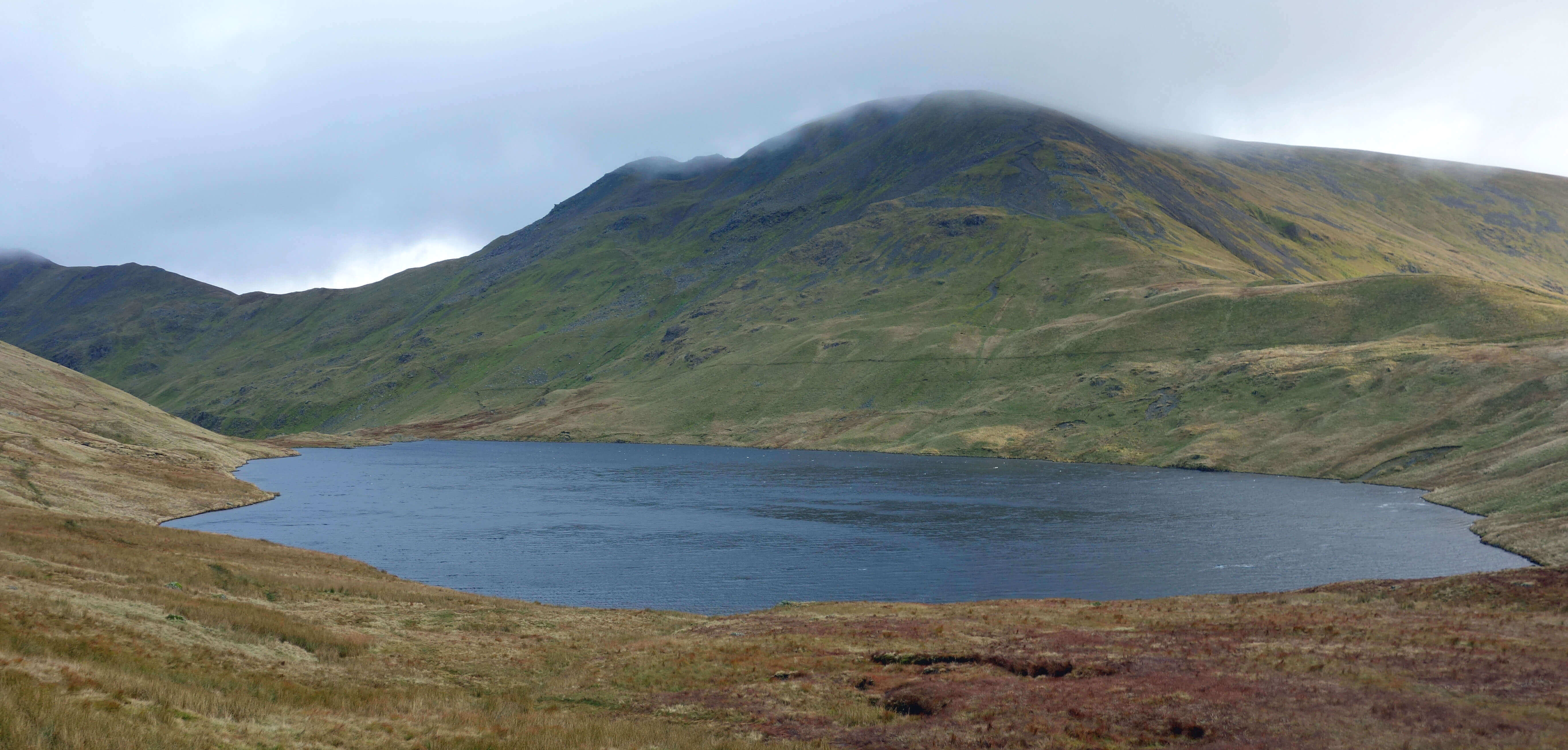
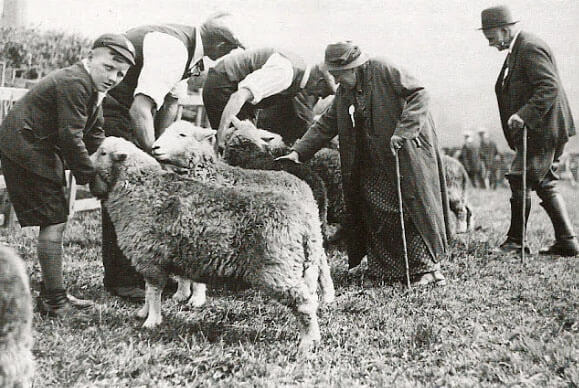 PC Penistone dropped in again today. We all call him Copper.
Sweet man. He asked about the Herdwick as usual. I think he’s
more fond of our sheep than Tom is, but then he doesn’t have to de-maggot them every summer.
PC Penistone dropped in again today. We all call him Copper.
Sweet man. He asked about the Herdwick as usual. I think he’s
more fond of our sheep than Tom is, but then he doesn’t have to de-maggot them every summer.
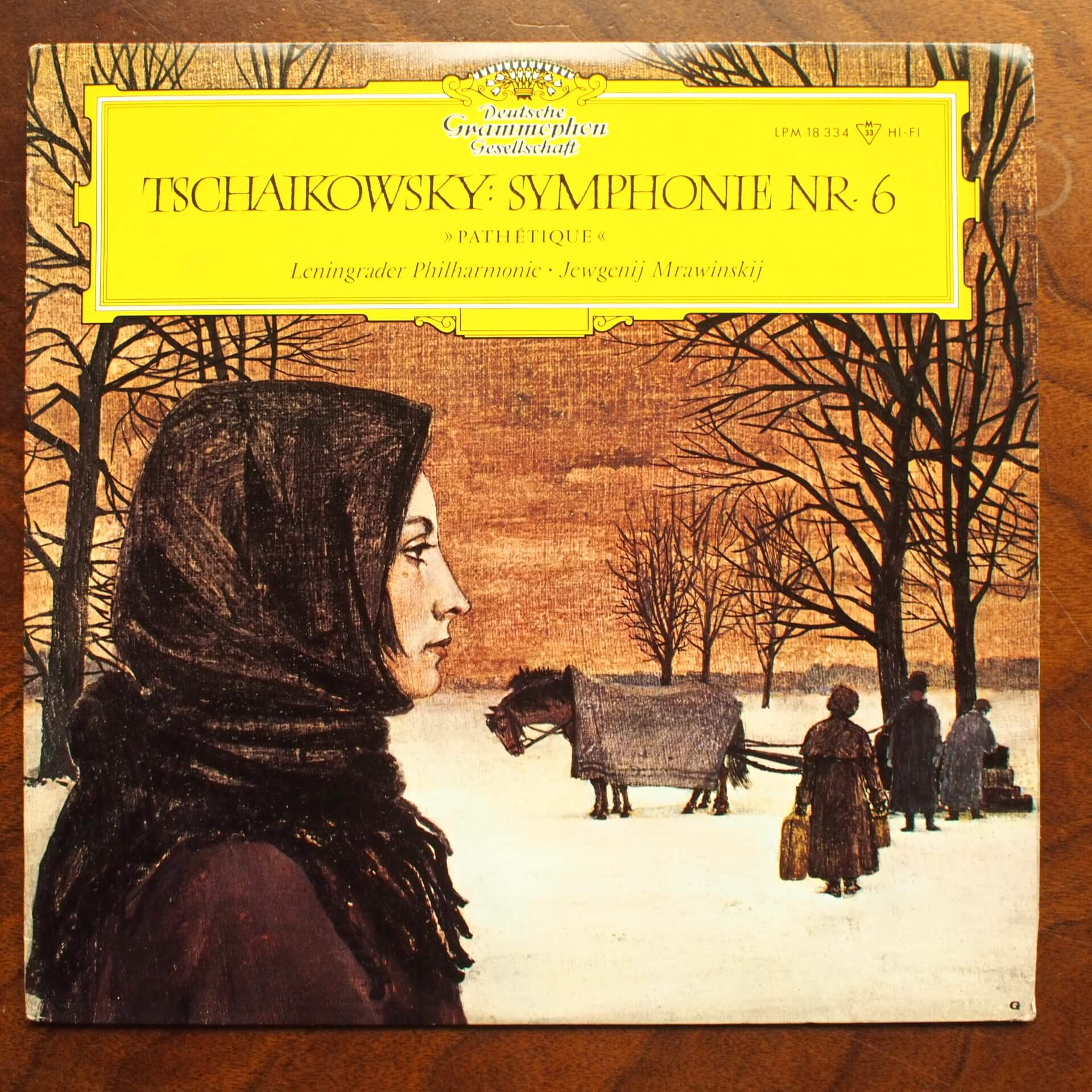 “What’s it about?” - a reasonable question to ask before
committing oneself to sitting through a long symphony,
don’t you think? Serious musicians, schooled in the conservatoires
of Europe, imbued with a lifetime’s experience of the theory and
practice of classical music, and dedicated to superciliousness, will
reply “It’s about fifty minutes”. A symphony, it seems, should just
be itself and not be about anything.
“What’s it about?” - a reasonable question to ask before
committing oneself to sitting through a long symphony,
don’t you think? Serious musicians, schooled in the conservatoires
of Europe, imbued with a lifetime’s experience of the theory and
practice of classical music, and dedicated to superciliousness, will
reply “It’s about fifty minutes”. A symphony, it seems, should just
be itself and not be about anything.
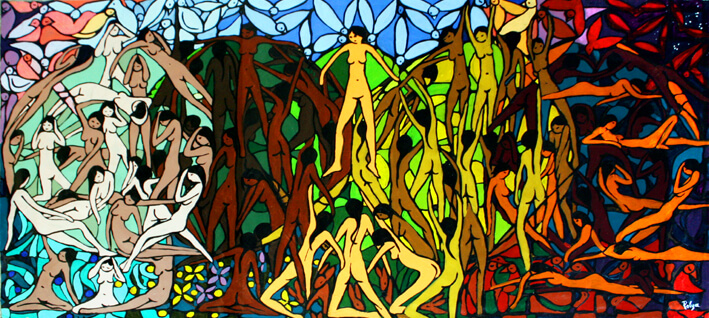
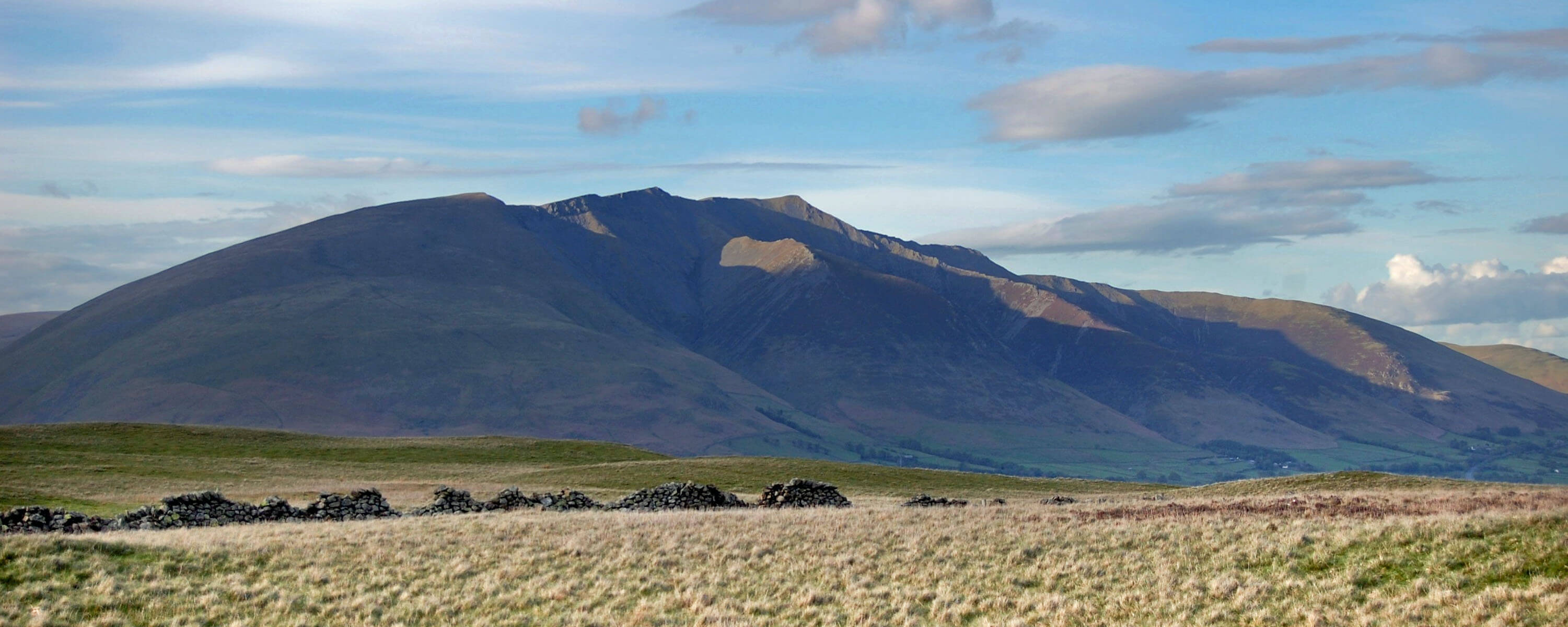 Richard walked along studying the map intently. He suddenly
stopped and said “The Ordnance Survey has got this wrong”.
The Ordnance Survey never gets anything wrong but I
thought that I had better humour him, as he was such a novice
at map-reading. “Where?” I asked.
Richard walked along studying the map intently. He suddenly
stopped and said “The Ordnance Survey has got this wrong”.
The Ordnance Survey never gets anything wrong but I
thought that I had better humour him, as he was such a novice
at map-reading. “Where?” I asked.
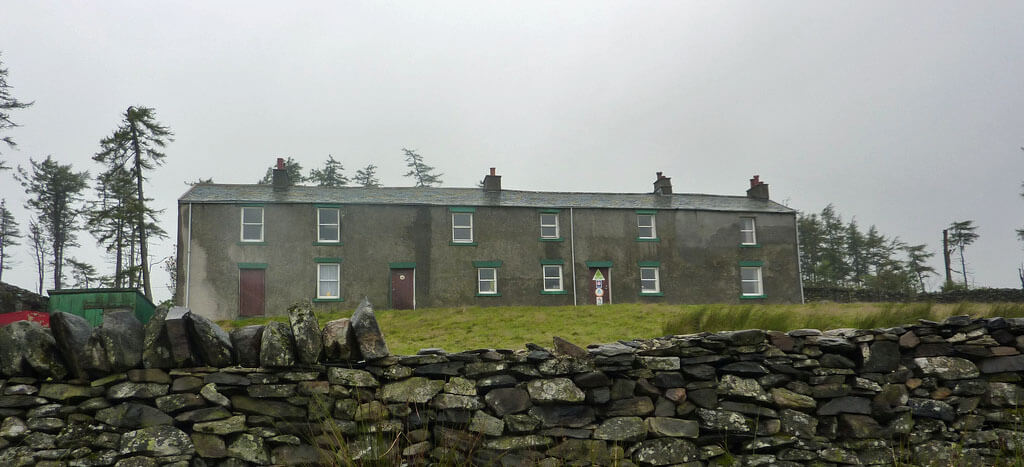 The slightly soggy peat of Mungrisdale Common soon turned
into deep boggy pools, submerging all traces of a path. We
floundered along, in the downpour, heading for Skiddaw
House, which was dimly perceivable ahead, where we hoped to
find shelter from the cloudburst.
The slightly soggy peat of Mungrisdale Common soon turned
into deep boggy pools, submerging all traces of a path. We
floundered along, in the downpour, heading for Skiddaw
House, which was dimly perceivable ahead, where we hoped to
find shelter from the cloudburst.
 Mr Sowerbutts:
I am clerk of the court. Can I be in contempt of my own court?
Anyway, Barf is a hill, overlooking Bassenthwaite Lake, or, as
the locals call it, Barf Water.
Mr Sowerbutts:
I am clerk of the court. Can I be in contempt of my own court?
Anyway, Barf is a hill, overlooking Bassenthwaite Lake, or, as
the locals call it, Barf Water.
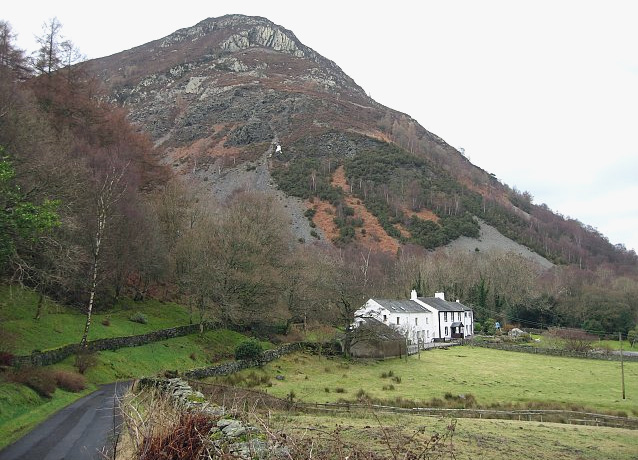
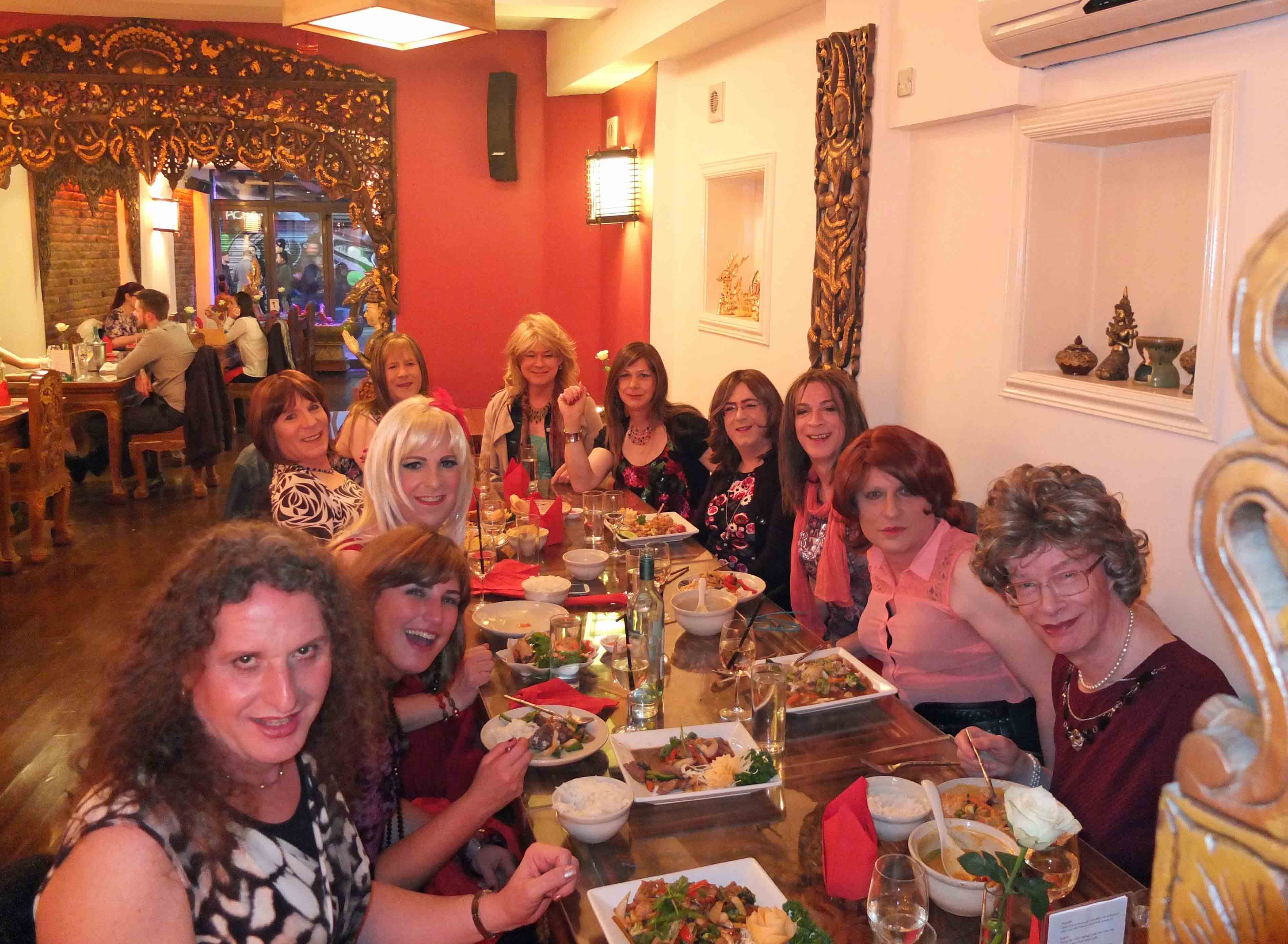 Mrs Clapperclowe:
I don’t take all the credit. My dear friends here all helped. We
painted it as part of the Campaign for Lakeland Feminisation,
which is aiming to bring sexual equality to the Lake District. The
so-called Bishop had stood there for unknown centuries. We
thought it was time he was frocked. We painted him black so
that he, or she, will from now on be known as the Nun of Barf.
Mrs Clapperclowe:
I don’t take all the credit. My dear friends here all helped. We
painted it as part of the Campaign for Lakeland Feminisation,
which is aiming to bring sexual equality to the Lake District. The
so-called Bishop had stood there for unknown centuries. We
thought it was time he was frocked. We painted him black so
that he, or she, will from now on be known as the Nun of Barf.